EXPLORER
LET US SHOW YOU THE ART OF EXPLORING
Revel in the magic of the Mediterranean

Uncover the secrets of Ancient Egypt
Our newest itineraries to inspire wanderlust

Revel in the magic of the Mediterranean

Uncover the secrets of Ancient Egypt
Our newest itineraries to inspire wanderlust
Viking guests across the globe are making their travel dreams a reality. Here’s some inspiration to help with your planning. Connect with Viking on social media and don’t forget to hashtag your Viking journey and share with us: #VikingCruises #MyVikingStory


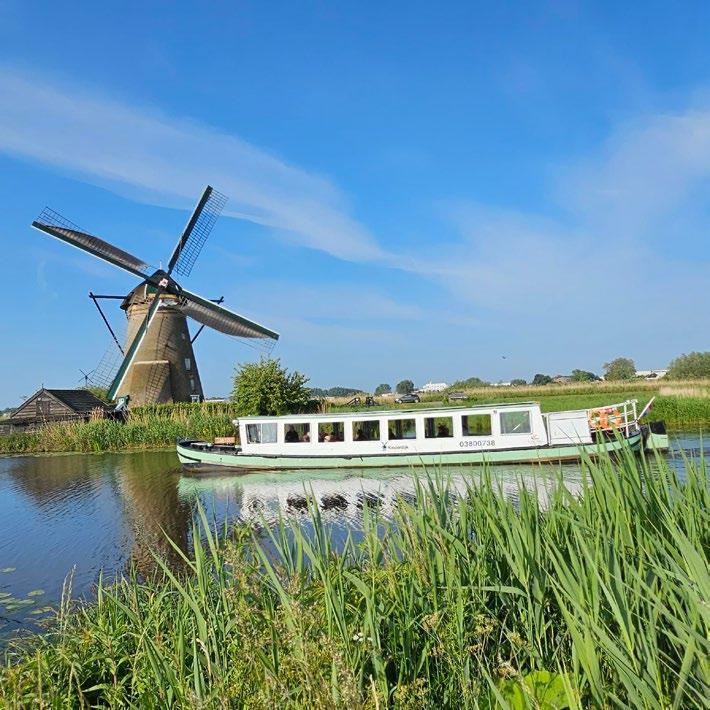
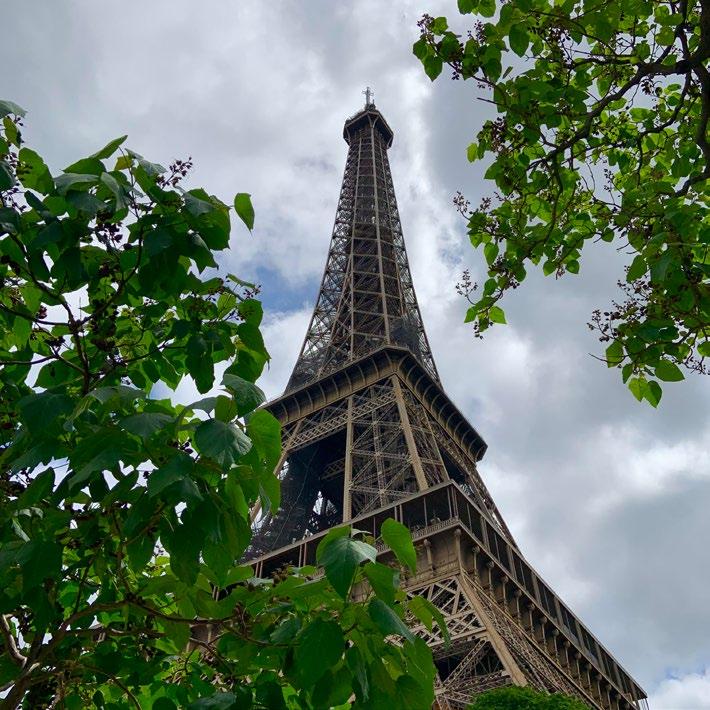
VIKING.TV
VikingAUNZ
VikingCruises
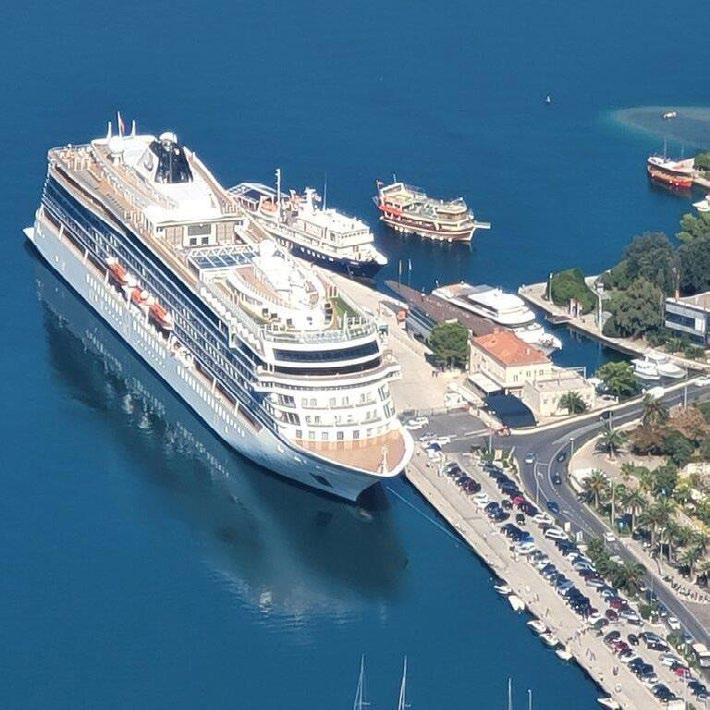
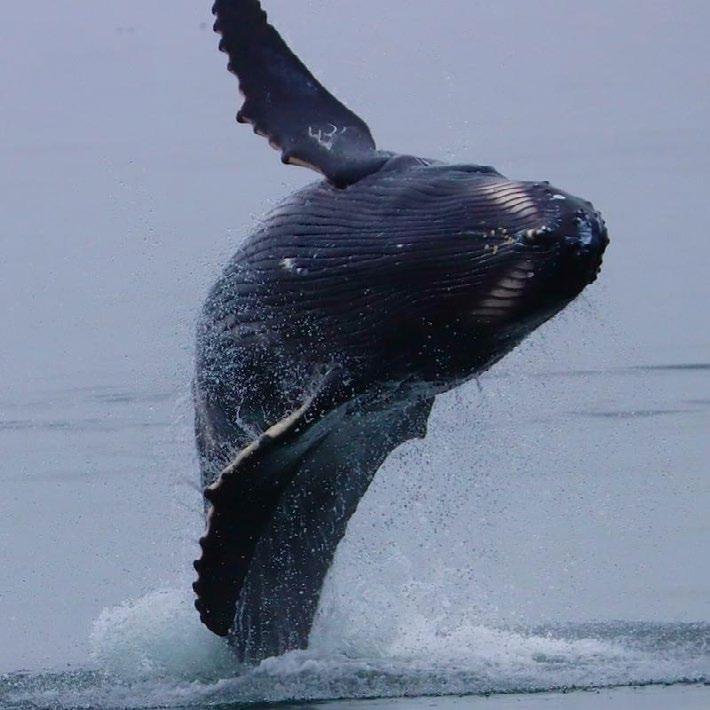
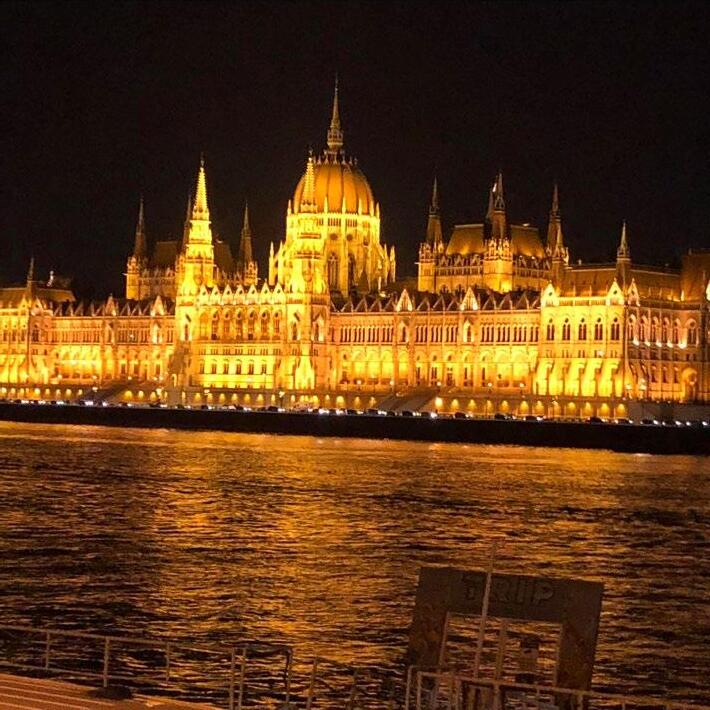
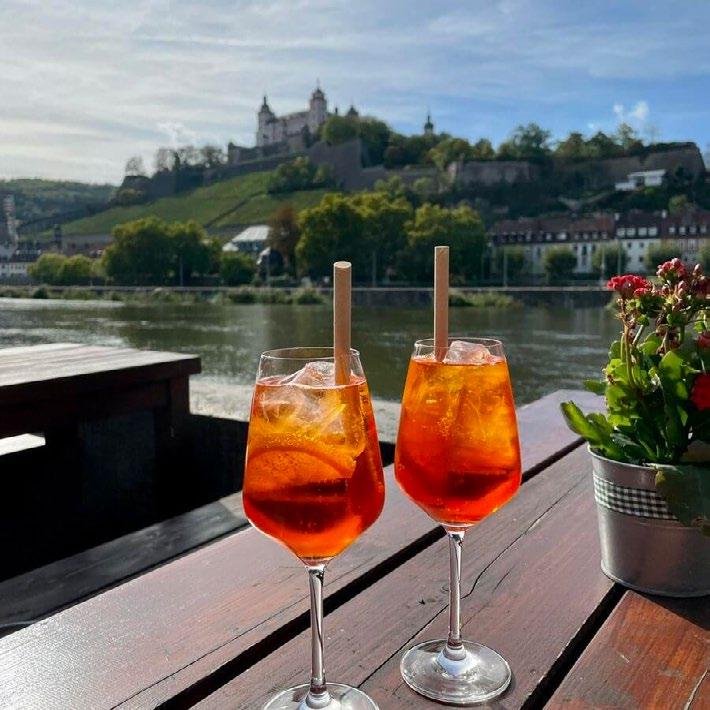
VikingRiverCruises
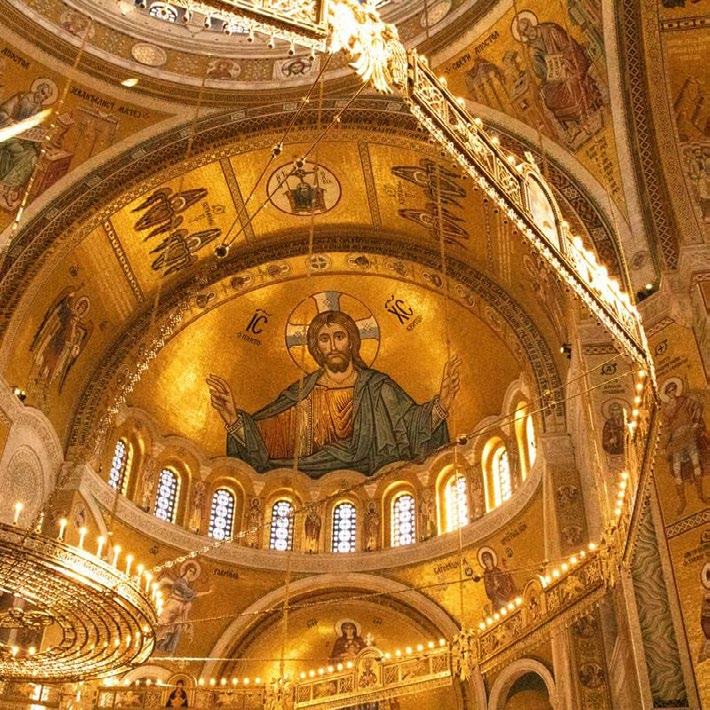 @ERIMEGSMOM
@HELENCURTIS
@KENGROGAN
@MARJOREGELUS
@WELOVEVIKINGUK1
@MARYAILEENJAVELLANA
@WILLIAMANDANNES
@TOMPEACH
@ERIMEGSMOM
@HELENCURTIS
@KENGROGAN
@MARJOREGELUS
@WELOVEVIKINGUK1
@MARYAILEENJAVELLANA
@WILLIAMANDANNES
@TOMPEACH
The original Vikings were extraordinary explorers who achieved astonishing feats, pushing the boundaries of travel and discovery for more than 300 years. Not only were these Norsemen fishermen, traders and settlers, but they were also exceptional innovators, developing sophisticated boat-building and seafaring techniques that were years ahead of their time. Much of our inspiration is drawn from the ancient Vikings and we are proud to be a company that has made exploring an art form, providing comfort and contentment for modern-day explorers.
Everything we do at Viking is designed to make your time with us as comfortable and memorable as possible. We work hard to reveal the very heart of each destination you visit, from the history, culture and cuisine to the remarkable people who call these places home.
In this issue of Viking Explorer Society Magazine, we introduce you to our new expedition voyages that journey into the Canadian High Arctic, we uncover curiosities along Egypt’s Nile River and showcase the sun-drenched island of Rhodes, one of the longest-inhabited medieval cities in the world. Be sure to read more about our partnership with Monet in Paris – The French Impressionist Alive. This exceptional multi-sensory experience has just started a national tour of Australia and provides a wonderful opportunity to see the master impressionists’ work from a new perspective.
We hope these pages will provide inspiration anew for your next voyage of discovery. To help you plan ahead, be sure to take advantage of our special $2,000 flight credit offer on 2024 and 2025 ocean voyages when you book by 28 August. We can’t wait to welcome you on board a Viking ship and show you the heart of exploring.
Warmest regards,
We are pleased to announce that Travel + Leisure readers have voted Viking to the top of its categories for river, ocean and expedition in the 2023 World’s Best Awards.
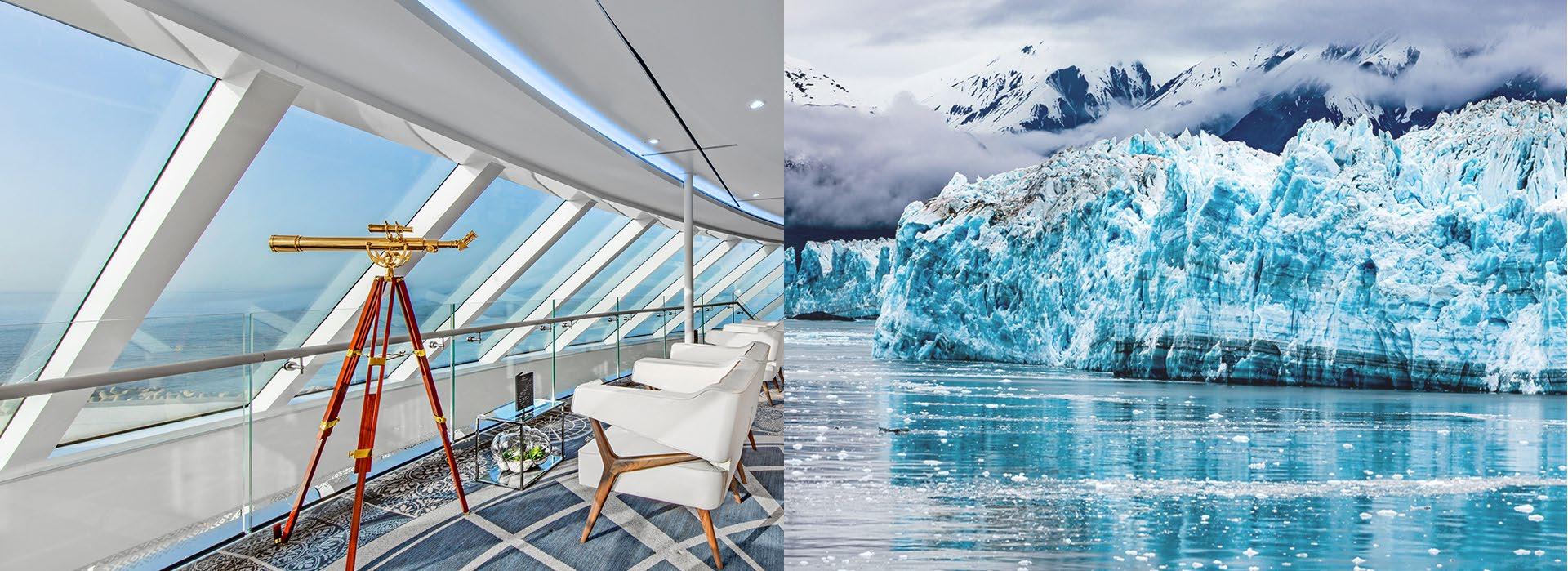 MICHELLE BLACK MANAGING DIRECTOR, VIKING AUSTRALIA & NEW ZEALAND
MICHELLE BLACK MANAGING DIRECTOR, VIKING AUSTRALIA & NEW ZEALAND

On the cover: Lindos, Acropolis in Rhodes, Greece

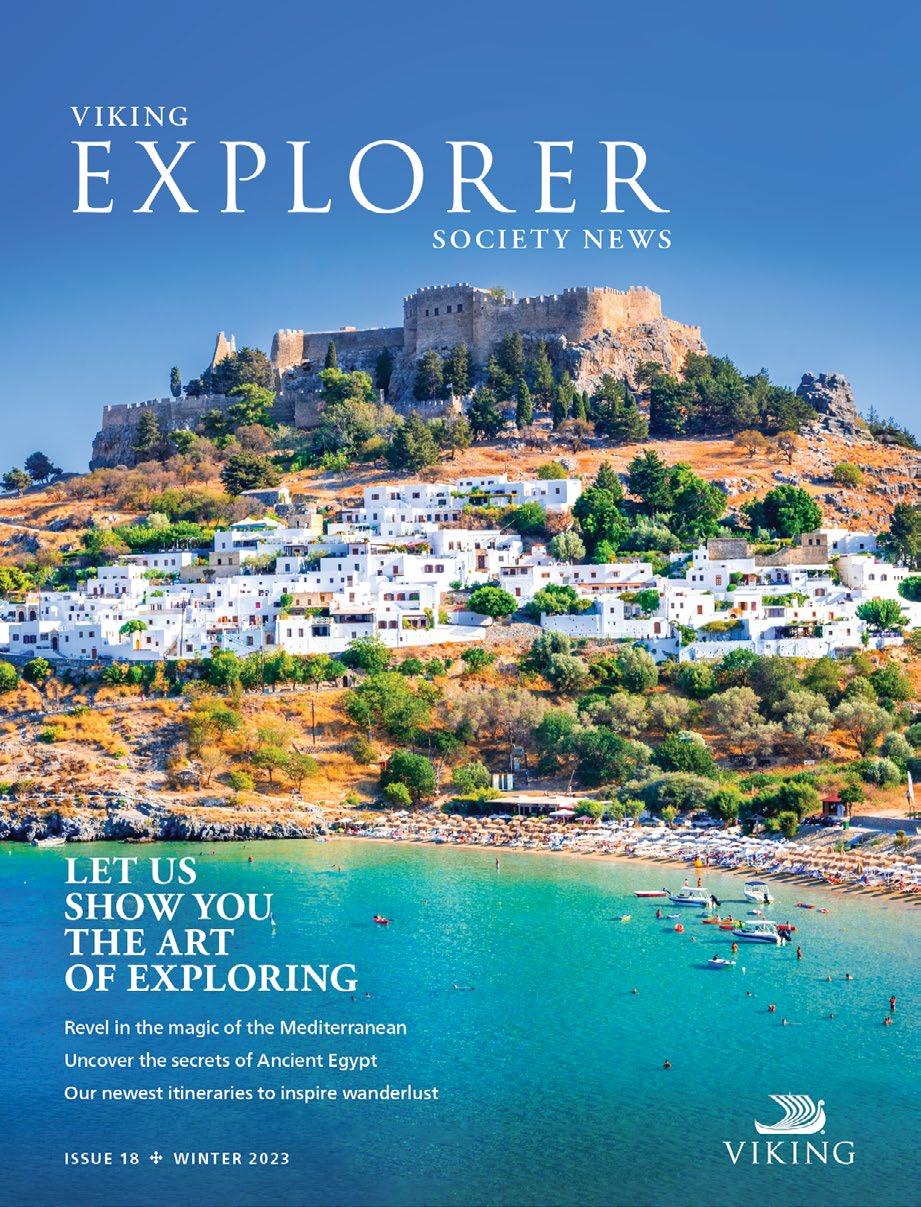
8 NEW ITINERARIES
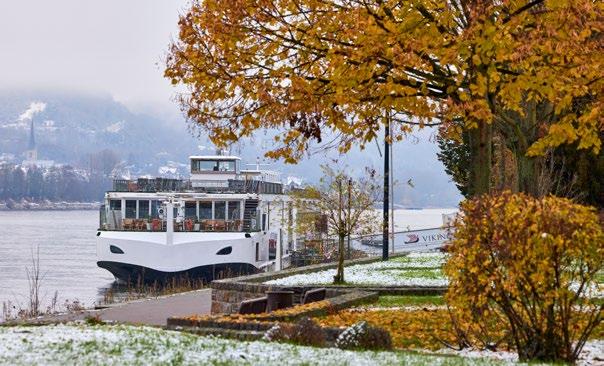
Our newest voyages to inspire wanderlust
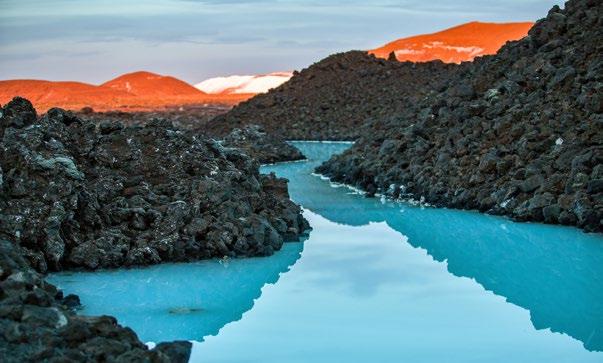
10 THE MAGIC OF THE MED
Uncover the enchanting destinations of the Iconic Western Mediterranean
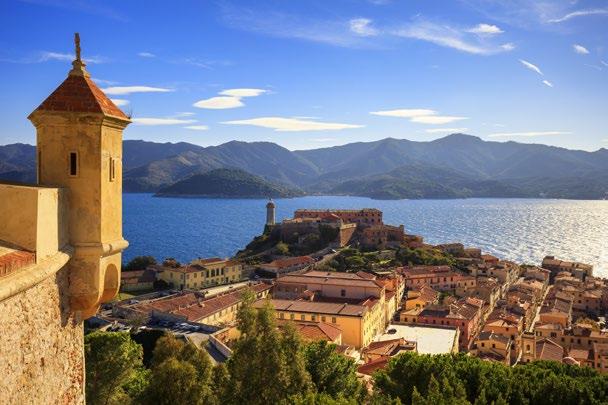
14 5 THINGS TO DO IN SPAIN
Discover must-see highlights in this vibrant destination on the Mediterranean
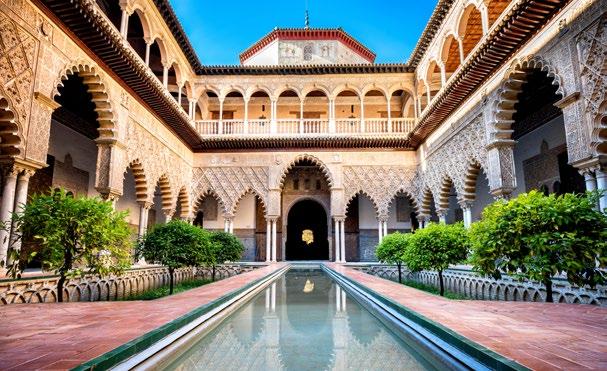
16 SECRETS OF ANCIENT RHODES
Unearthing ancient history hidden in one of the longest-inhabited medieval cities in the world
24 FINDING AWE
Moments of awe that will stay with you for a lifetime
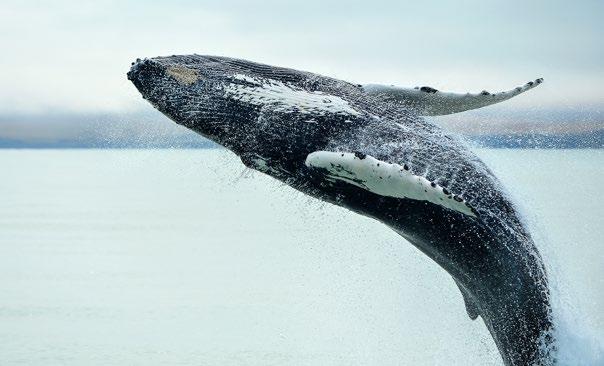
26 ONE DAY IN REYKJAVIK
World-class museums vie with amazing street art in this cultural northern capital
28 HYGGE
Incorporate the cozy Nordic tradition in your way of life
30 CURIOSITIES ABOUND ON THE NILE

The possible discovery of a Kangaroo in ancient hieroglyphs
34 TOP 10 DESTINATIONS IN EGYPT Highlights from the ancient world

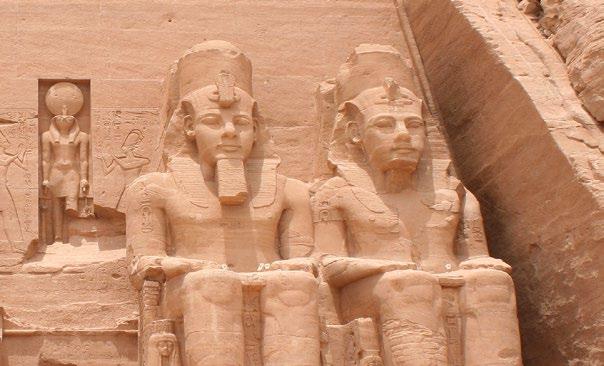
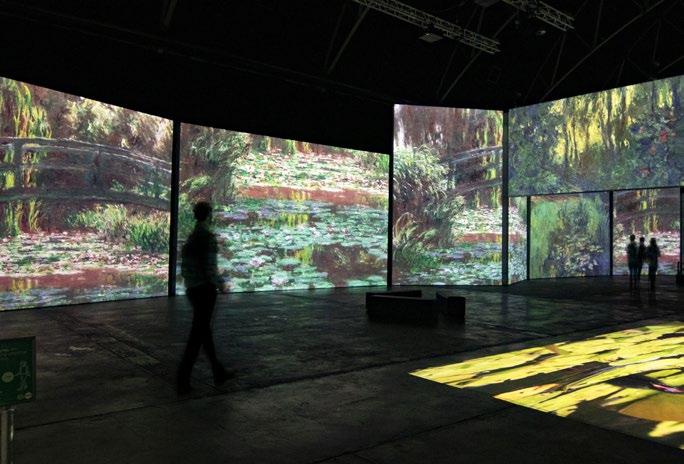
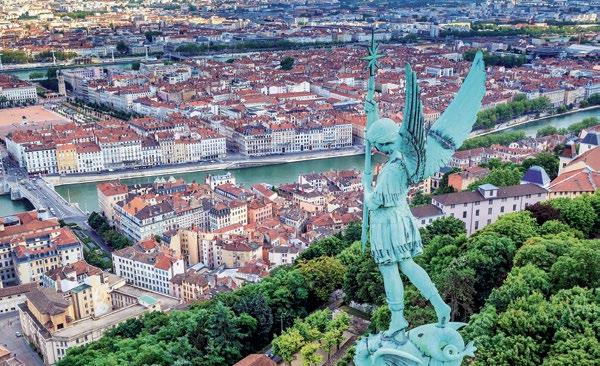
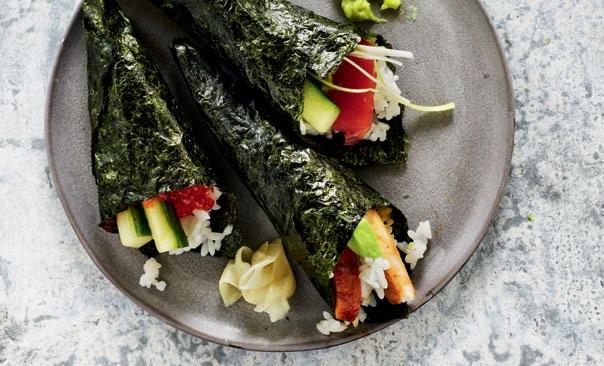
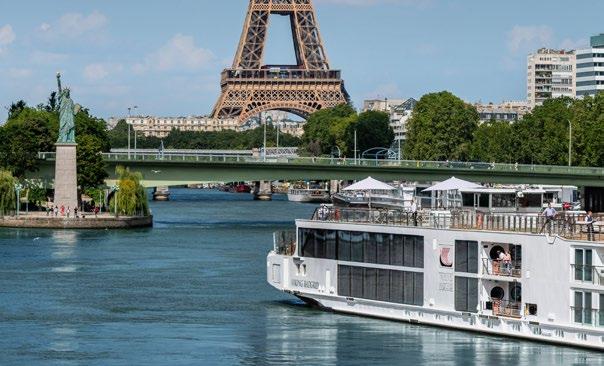
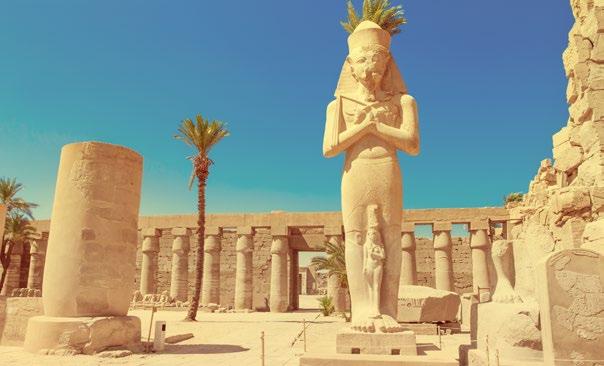
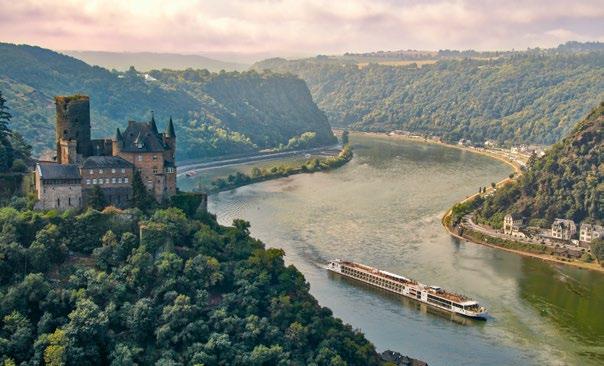
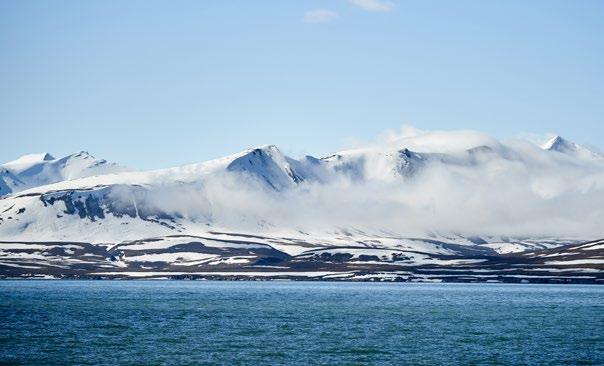
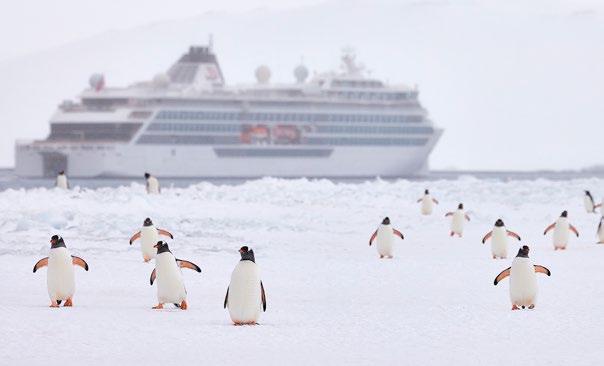
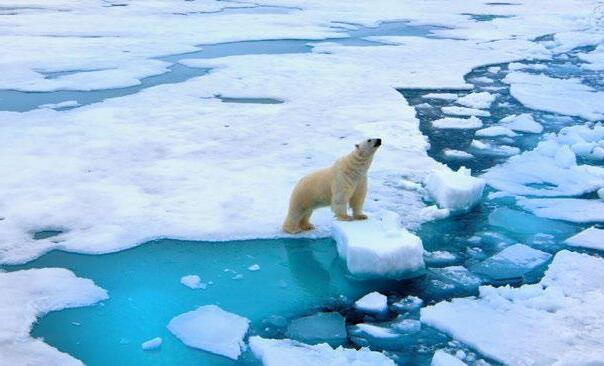
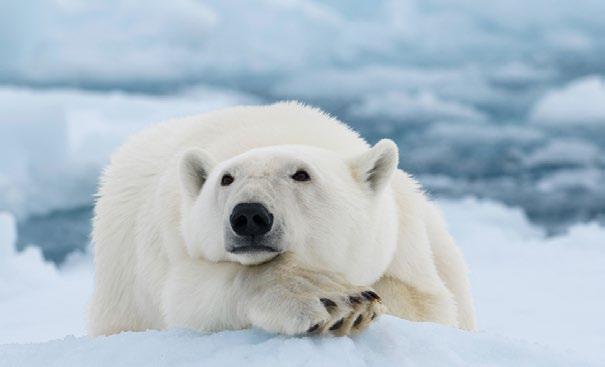
 48 MONET IN PARIS A national multi-sensory experience celebrating art and culture
40 SUR LE PONT D'AVIGNON A journey on the rivers of France links the most spectacular cities
56 A CULINARY JOURNEY A collection of tantalising recipes from around the world
46 PARIS & D-DAY 80TH ANNIVERSARY Our new itinerary honouring a historic World War II milestone
38 ONE DAY IN LUXOR
Discover the riches of Egypt's oldest city and the centre of magnificent ruins
50 BLACK FOREST FAIRYTALE
A captivating journey reveals the untold stories of the Rhine
64 MY ARCTIC Jørn Eriksson discusses his unbreakable bond to the Arctic, his cherished "home" 68 VIKING POLARIS ANTARCTIC CRUISE Luxury meets science on the white continent
60 THE ARCTIC OCEAN
The coldest and northernmost of the world’s seas, the Arctic Ocean enchants
66 THE WILDLIFE OF THE ARCTIC
48 MONET IN PARIS A national multi-sensory experience celebrating art and culture
40 SUR LE PONT D'AVIGNON A journey on the rivers of France links the most spectacular cities
56 A CULINARY JOURNEY A collection of tantalising recipes from around the world
46 PARIS & D-DAY 80TH ANNIVERSARY Our new itinerary honouring a historic World War II milestone
38 ONE DAY IN LUXOR
Discover the riches of Egypt's oldest city and the centre of magnificent ruins
50 BLACK FOREST FAIRYTALE
A captivating journey reveals the untold stories of the Rhine
64 MY ARCTIC Jørn Eriksson discusses his unbreakable bond to the Arctic, his cherished "home" 68 VIKING POLARIS ANTARCTIC CRUISE Luxury meets science on the white continent
60 THE ARCTIC OCEAN
The coldest and northernmost of the world’s seas, the Arctic Ocean enchants
66 THE WILDLIFE OF THE ARCTIC
At Viking, curiosity is in our DNA. So we’ve made exploring an art form. Our modern fleet and dedicated crew take you deeper into the world’s greatest destinations, offering a new level of comfort and contentment for true explorer spirits
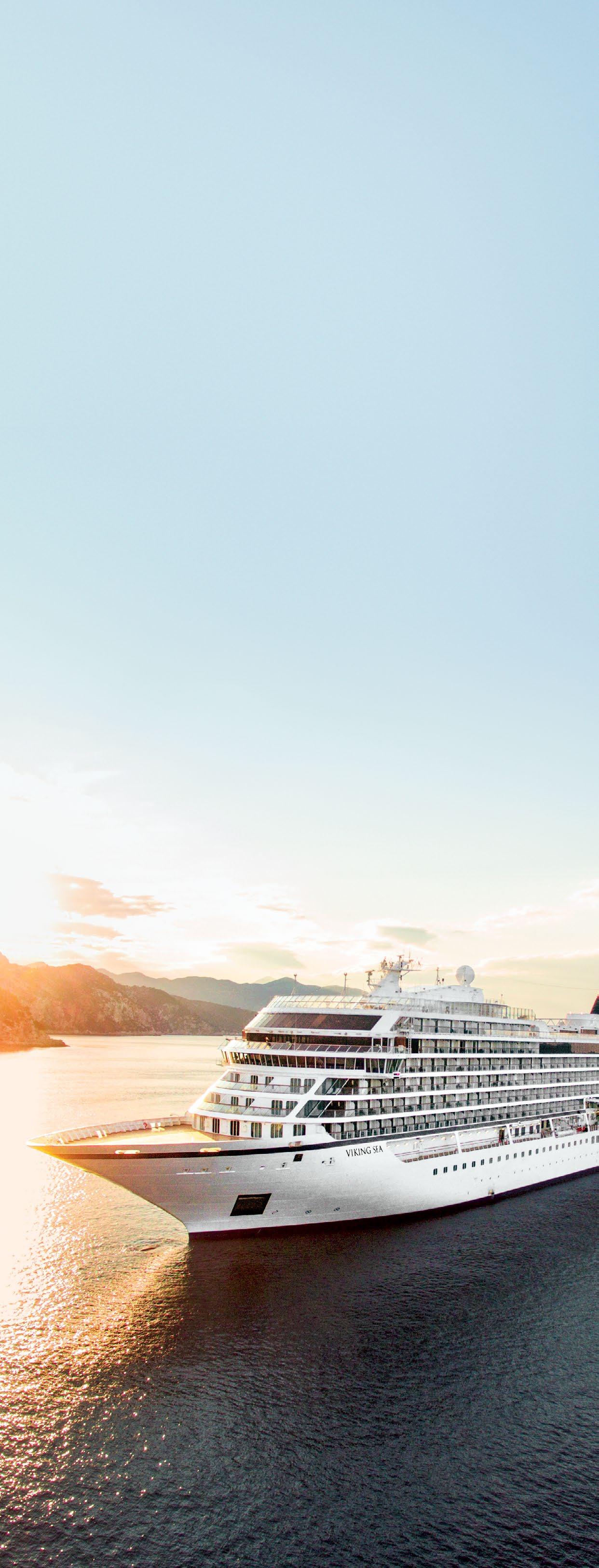
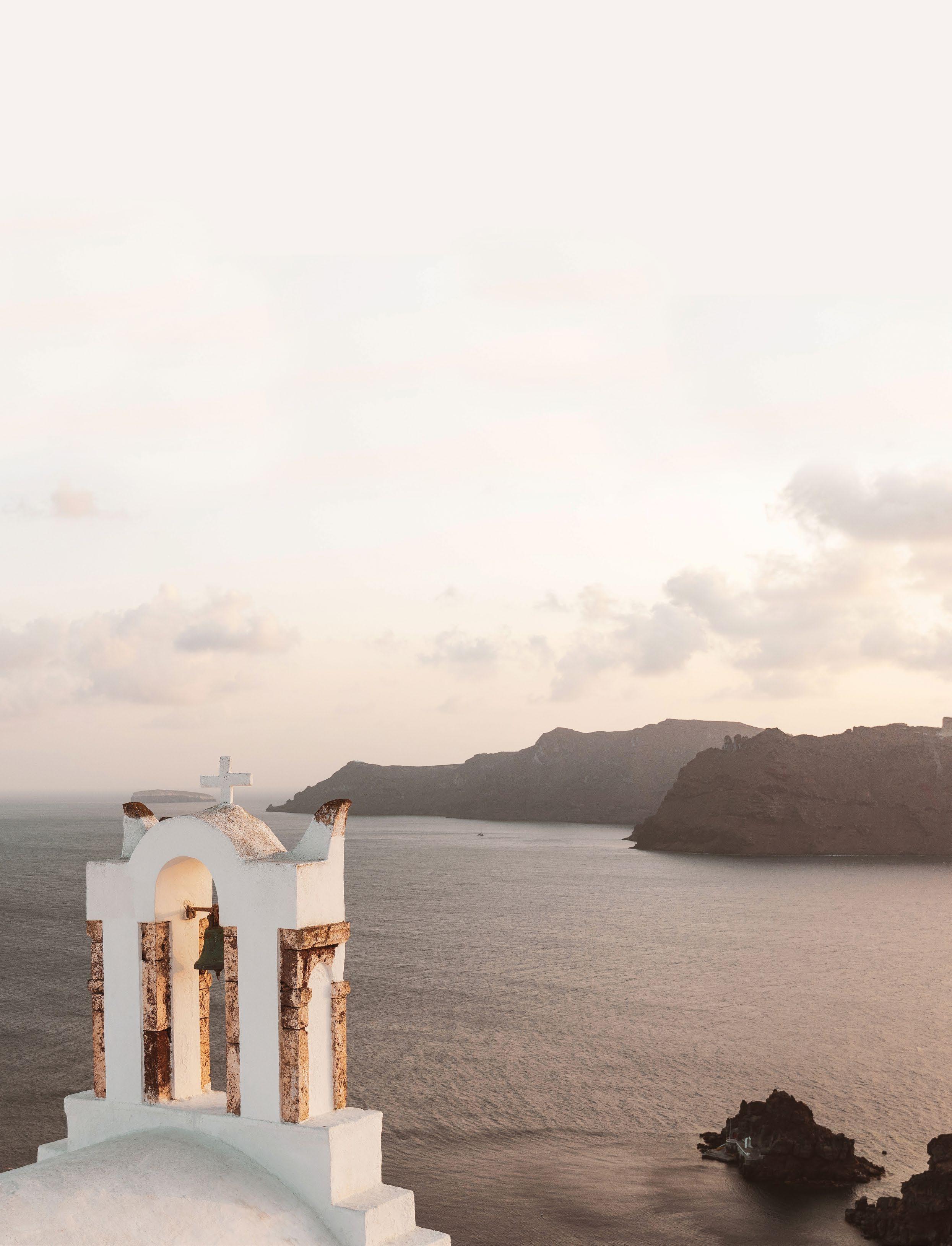
We’re all born to be explorers. Curiosity is in our DNA.
From the first moment we open our eyes, we look towards the future. Over centuries, we’ve pursued this quest, finding new ways to push further, to see and feel what’s beyond reach. As the world’s greatest explorers, at Viking we’ve honed our craft, making the path to discovery less “travelled” and offering comfort and contentment for curious minds. It’s an art form, yes. But it runs deeper than that. It’s in our blood.
Our dedicated crew care more deeply, and our modern state-of-the-art ships are a sanctuary of comfort with a multitude of spaces for relaxing quietly and contently as you reflect on days spent exploring the history, culture and cuisine of your destination.
With Viking, the coastlines of the Mediterranean, Scandinavia and Asia, the rivers of Europe, Egypt and the USA or the pristine wilderness of the Arctic and Antarctica are within your reach.
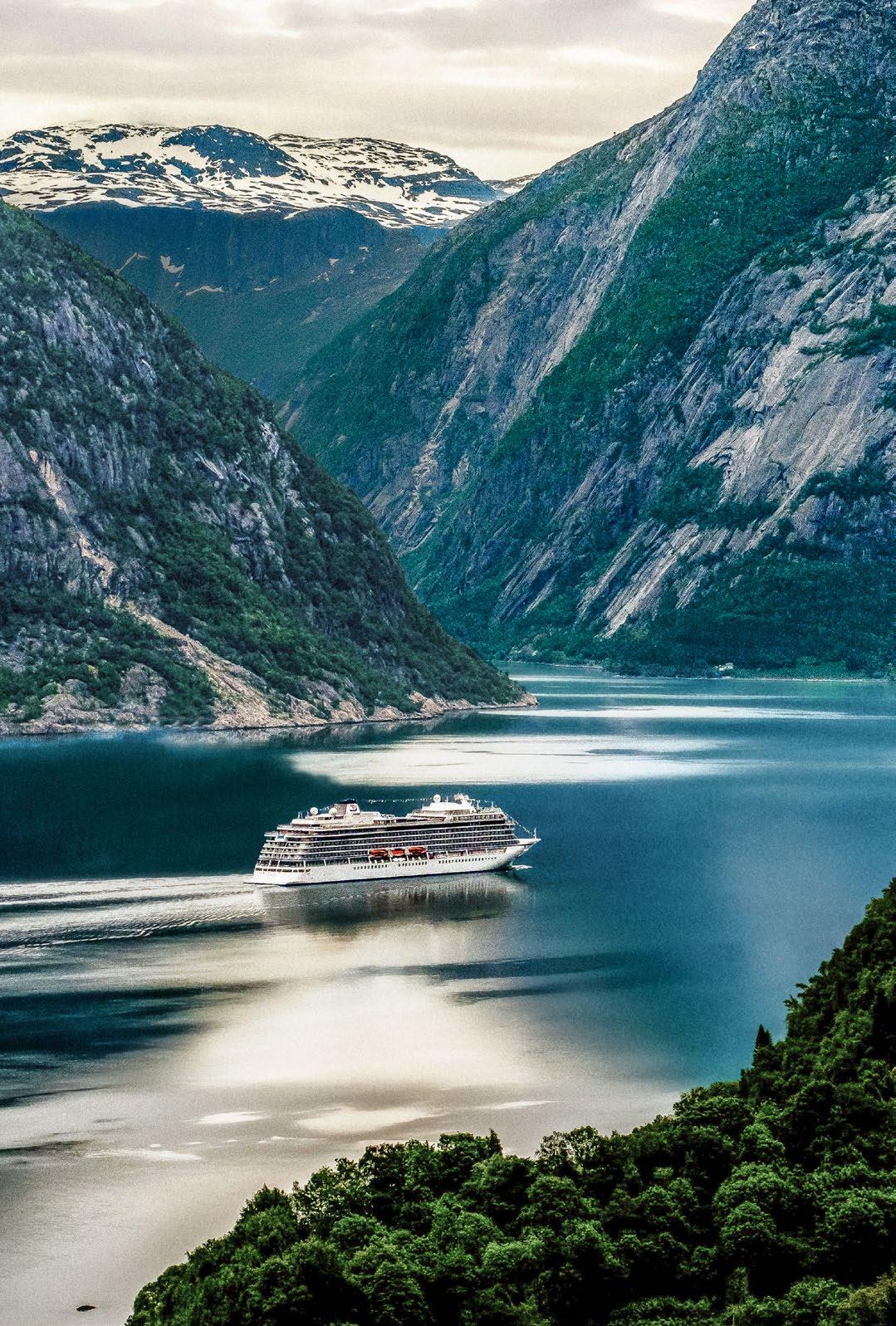
Join us, and we’ll show you the heart of exploring.
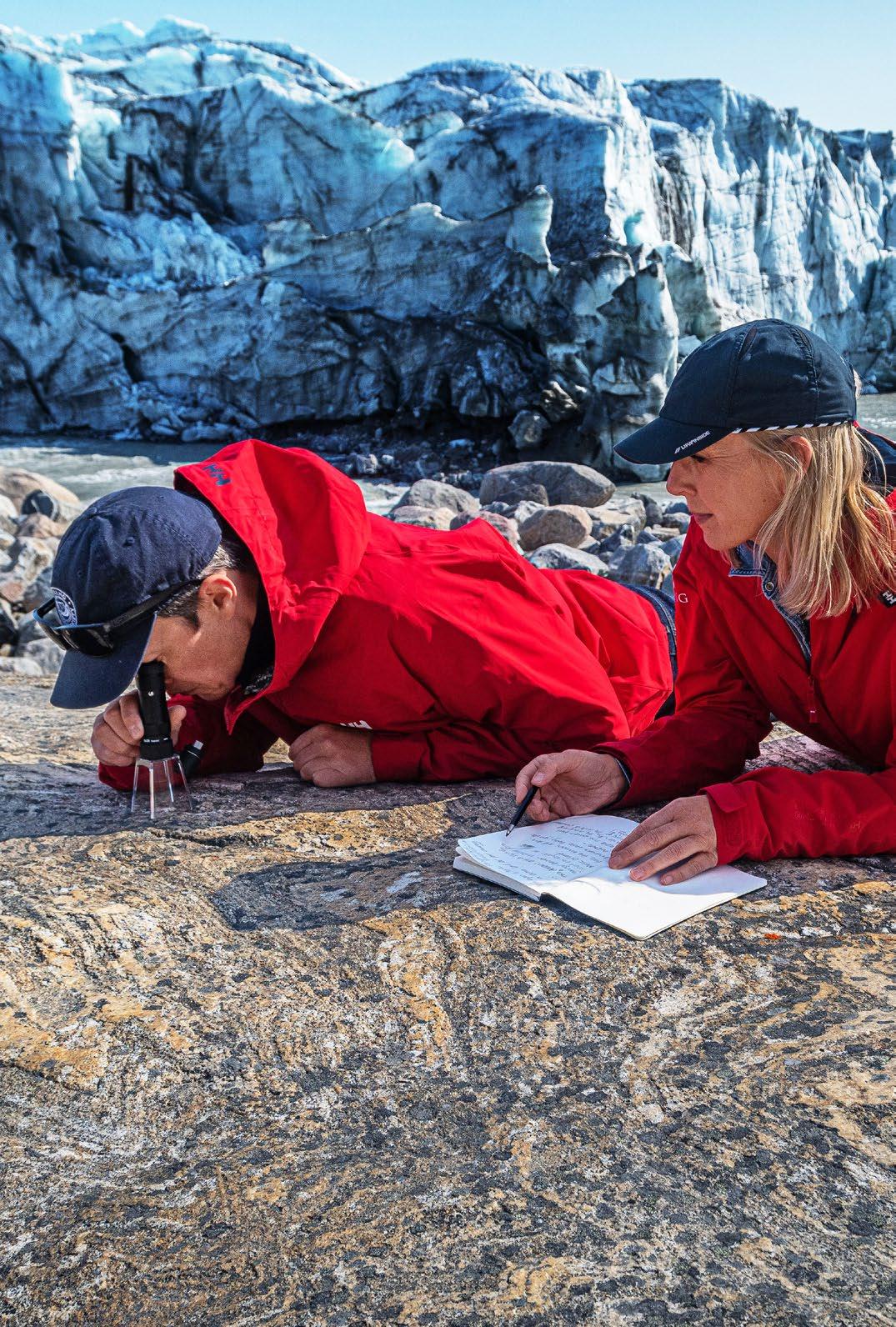
Allow us to inspire a profound connection with your destination, immersing you in the history, culture and local ways of life.
After 25 years of crafting itineraries for The Thinking Person, we have developed a deep understanding of our guests' unique, inquisitive nature. We know that uncovering the unique art, heritage, traditions, and architecture that define each destination is important to you, so we focus our energy on creating meaningful experiences that linger long in the mind after you’ve returned home. That’s why we’re known as The Thinking Person’s cruise line.
Our meticulously crafted range of included and optional excursions serves as your gateway to understanding each destination's iconic landmarks, captivating history, and vibrant cultures. We go beyond the ordinary, offering exclusive behind-the-scenes insights and extraordinary experiences that distinguish us from other travel companies. While we ensure you experience the expected and renowned, such as visits to iconic museums and notable landmarks, we also strive to unlock hidden gems with privileged access and introduce you to the remarkable people who call these places home.
We’ve recently released a range of new itineraries taking you further and deeper into some of the world’s greatest destinations. We hope these new itineraries will inspire your wanderlust
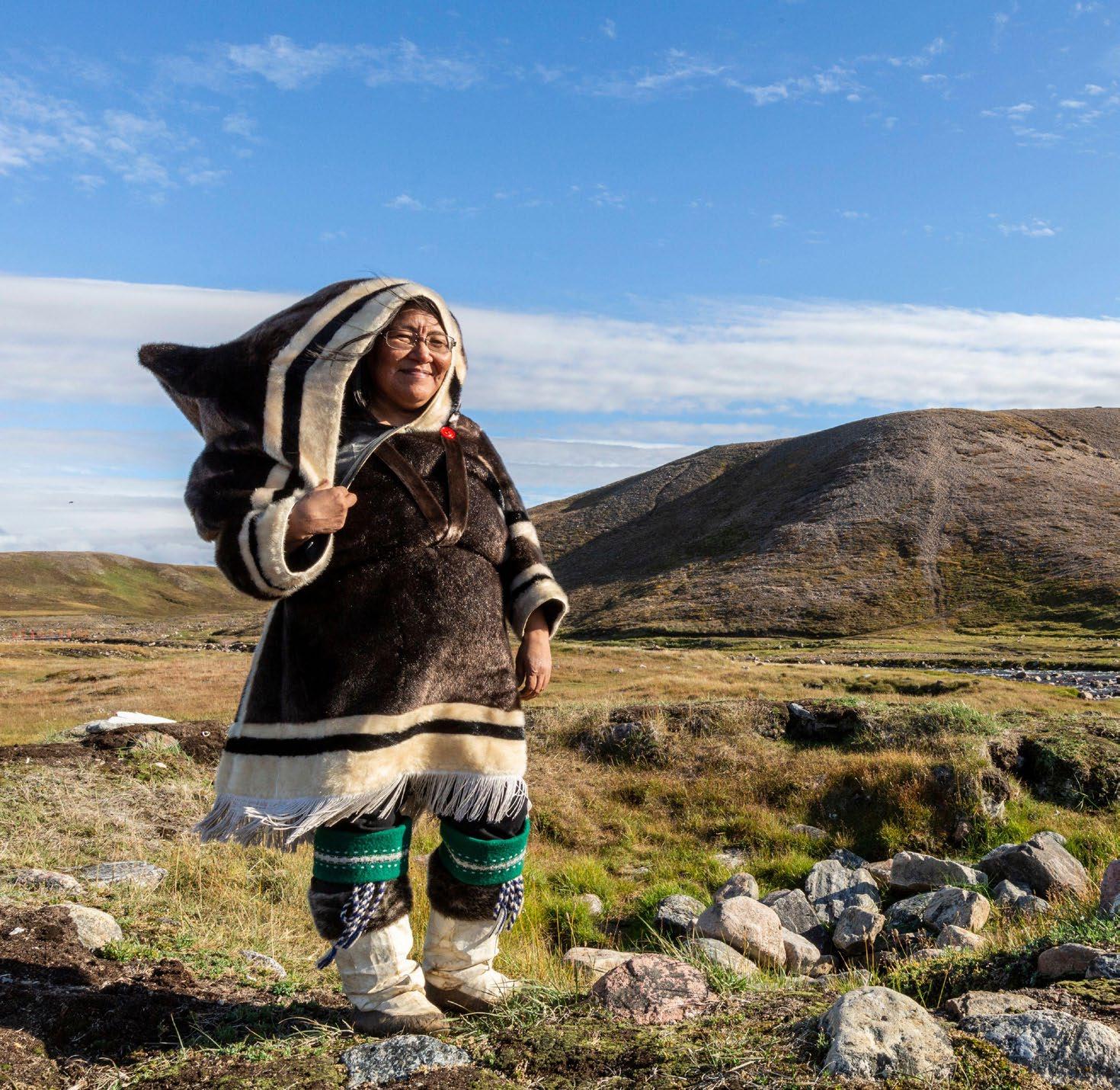
Debuting in July 2025 explore the pristine wilderness of the Arctic with three new summer season voyages on our state-of-the-art expedition ships. Ranging from 13 to 27 days, explore the polar north in Canada and Greenland, with two of the three voyages visiting the Canadian High Arctic. The 13-day Into the Northwest Passage itinerary sails roundtrip from Nuuk, Greenland and features destinations including the pristine waters of the Ilulissat Icefjord and the eastern entrance of the famed Northwest Passage in Pond Inlet, Canada. You can also discover stunning natural beauty and dramatic landscapes during the 15-day Canada & Greenland Explorer itinerary, which sails between Toronto and Nuuk, or for those interested in more in-depth exploration the new 27-day Canada & the Northwest Passage itinerary, combines the above two itineraries into an in-depth exploration of the Arctic.
This new river voyage along one of Europe’s most famed rivers, provides the opportunity to experience Europe’s rich culture during winter. Discover the enchanting landscapes and rich cultures of the Middle Rhine, a UNESCO Site boasting turreted fortresses, grand cathedrals, medieval towns and stunning scenery. Admire the terraced vineyards dating back to the Romans and taste the region’s renowned red and white wines. An ideal time to visit, winter offers smaller crowds, easier access to landmarks and extended stays in both Amsterdam and Basel.
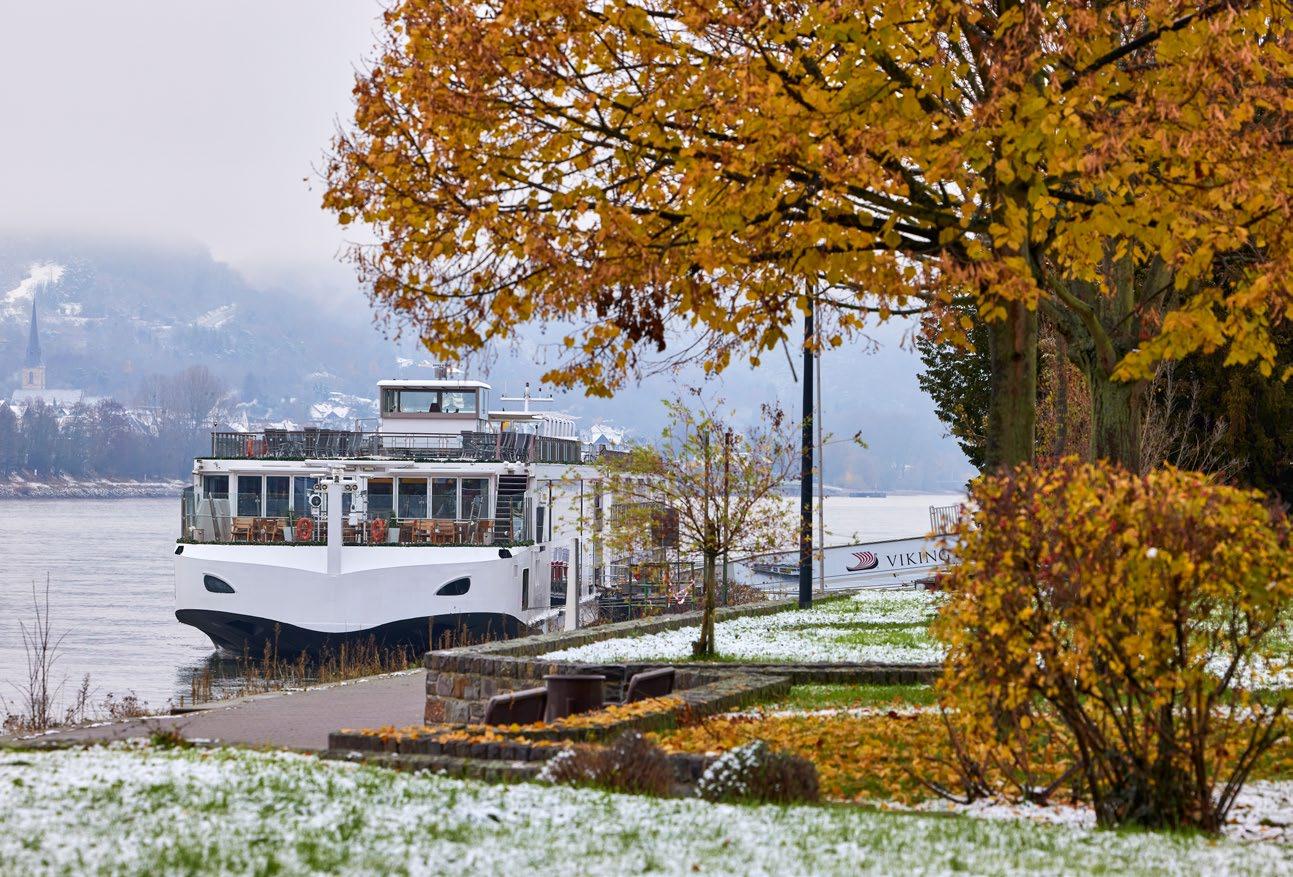
With departure dates running from March through November 2024, this special 12-day voyage from London to Paris will commemorate Operation Overlord and the historic battles of Normandy, which took place nearly 80 years ago and served as the catalyst for the liberation of Western Europe from German occupation.
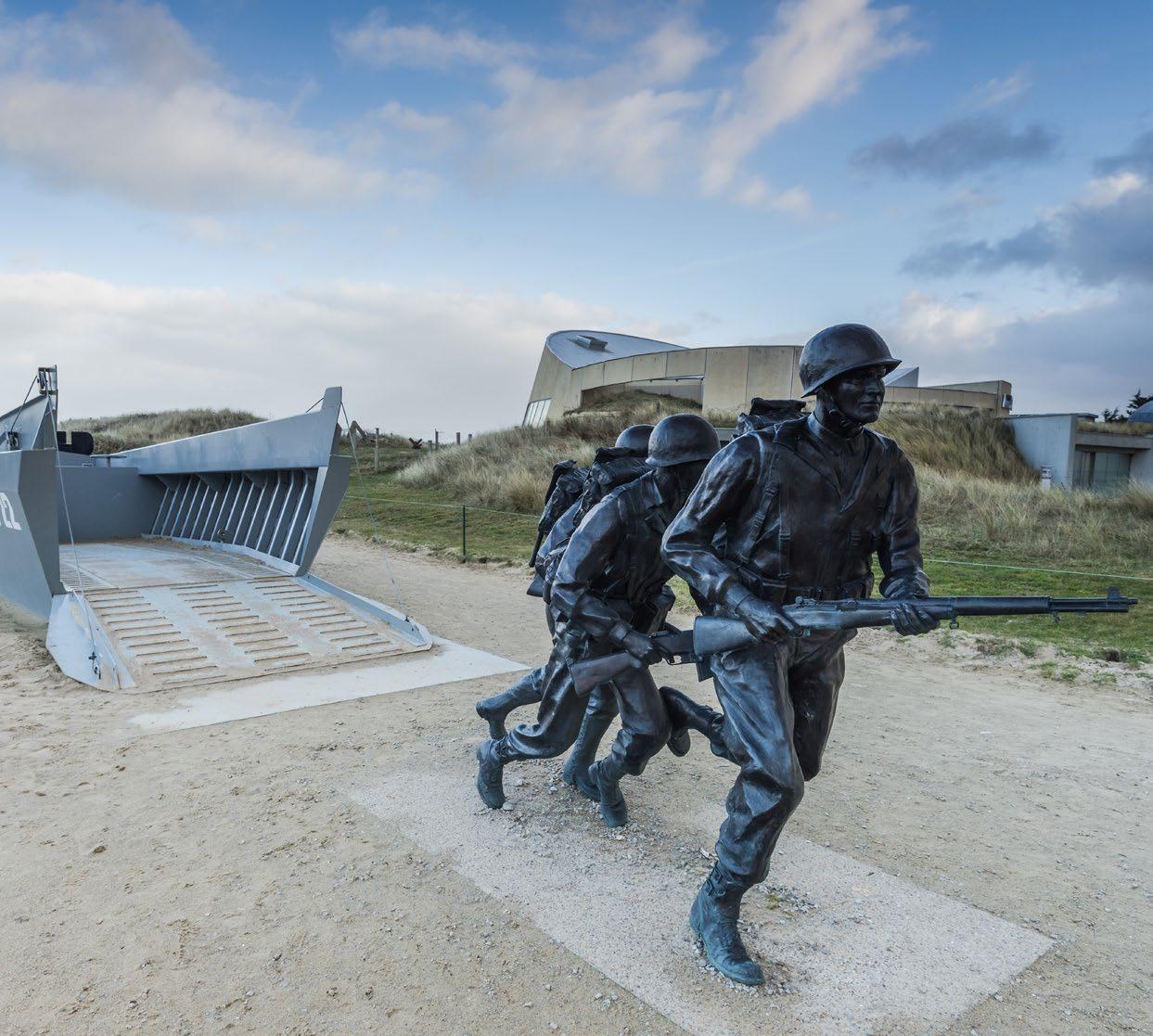
Begin your journey in London to visit historic World War II sites—including the Churchill War Rooms, Bletchley Park and the Imperial War Museum. Then continue to Paris for your voyage along the Seine. Sail through Normandy, visit D-Day sites including the Pegasus Memorial Museum and walk the hallowed ground at Normandy’s Commonwealth Cemetery and World War II beaches.
22 DAYS FROM NEW ORLEANS TO ST. PAUL
On this fascinating 22-day journey from New Orleans to St. Paul you can delve into America’s Civil War history in Louisiana, sample world-famous barbecue in Tennessee and visit Mark Twain’s childhood home with its iconic white picket fence in Missouri. Unpack once and let us take care of the rest as you immerse yourself in the distinctive music, cuisine and history of this vibrant region.

Previously sold out, we have just released new 2025 sailings of our highly popular Rhine & Viking Shores and Fjords. Combining the best best of both our award-winning river and ocean cruises into one seamless journey, this is a truly exceptional way to explore the world in comfort. Discover Nordic wonders by sea, then tour the highlights of the legendary Rhine River.
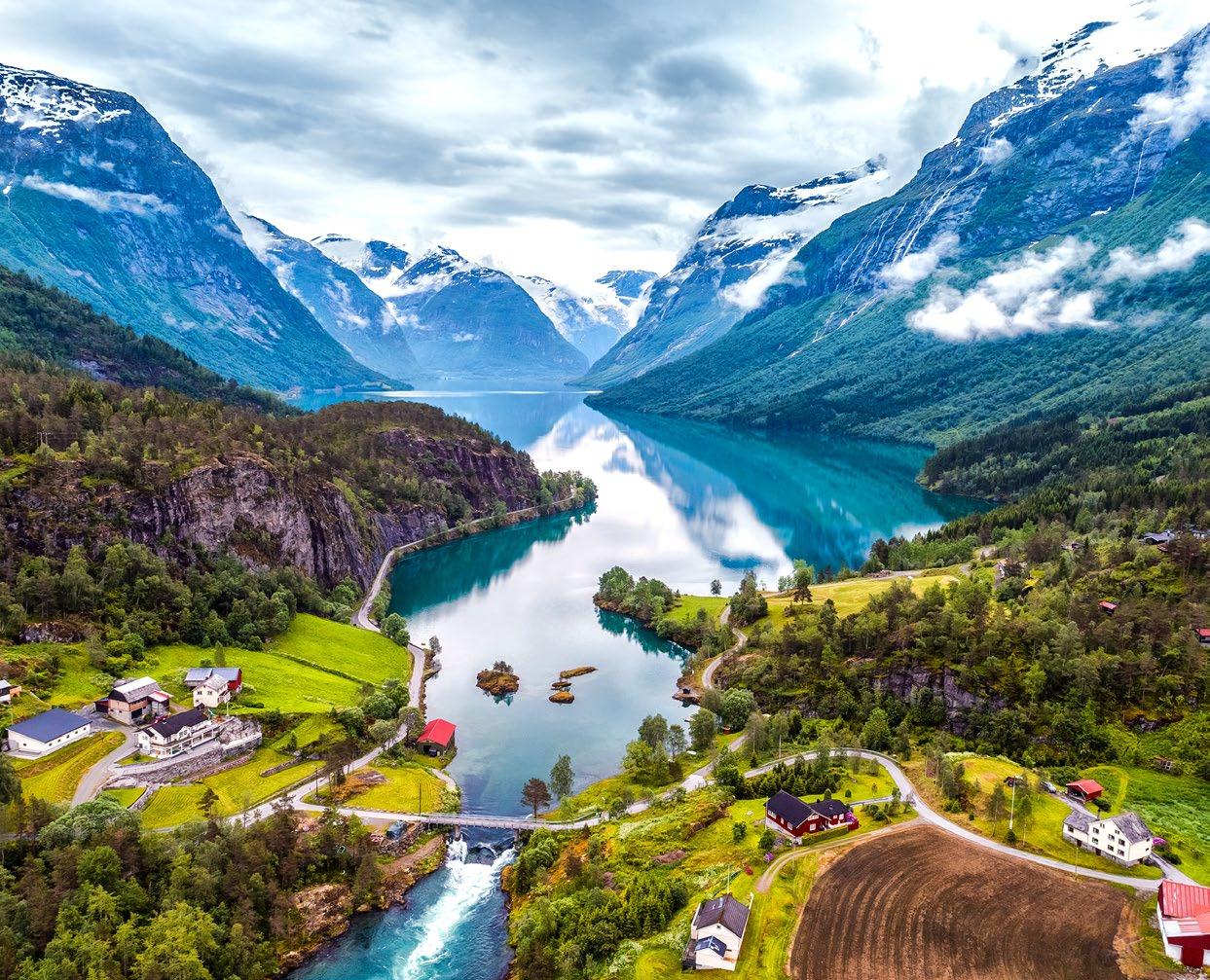
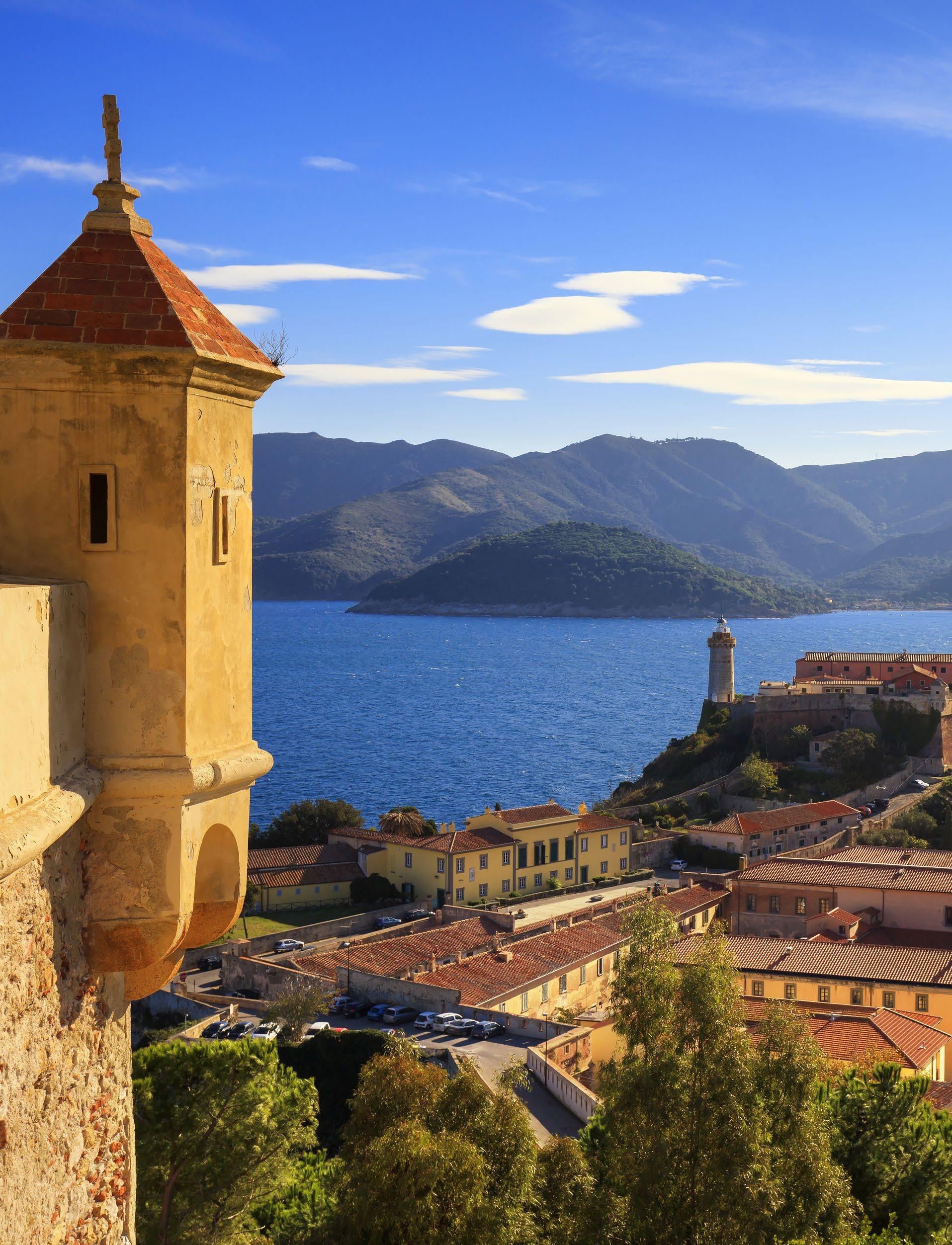
Where else can you admire fantasy architecture in a city one day and wild white horses on a vast delta the next? Embrace jet-set glamour then drift peacefully along a bucolic canal? View revered artworks before discovering the link between Michelangelo and London? With a dazzling choice of activities on offer in each port, Viking’s eight-day Iconic Western Mediterranean itinerary offers a splendid opportunity to indulge in your passions or create a richly varied experience. Starting in Catalonia, your ship dips in and out of destinations along the French Riviera, concluding its journey in Italy.

When I saw that this cruise commences with an overnight stay in Barcelona, my thoughts turned to the Sagrada Família, the incredible basilica designed by Antoni Gaudí. I like to periodically check on the progress of this remarkable structure, which is nearing completion 138 years after the first stone was laid. However, if you are already familiar with the Catalan capital, I can recommend an excursion to the Benedictine abbey of Santa Maria de Montserrat up in the mountains. It is not just the formidable abbey that is glorious, but the surrounding landscape too – a surreal gallery of soaring rock domes and pinnacles. Entering French waters, the

port of Sète is an enchanting place set between the sea and a large lagoon, the two connected by picturesque canals. The options here are tremendous and the trips to the ancient university town of Montpellier or medieval, walled Carcassonne have much appeal. For something different, consider a 4x4 safari across the Camargue, the wild delta of the Rhône, roamed by beautiful white horses, some of which are used by traditionally-hatted cowboys to herd bulls.
Alternatively, the chance to try French delicacies with paired wines on a gentle cruise on the tree-lined, UNESCO-listed Canal du Midi could well be my first choice. Marseille looms next on the
horizon. France’s oldest city, crowned by the handsome Notre-Dame de la Garde basilica, is a maritime delight and a couple of hours wandering its waterfront will not be forgotten. This could be your chance, though, for a wine tasting and
summer, the Roman amphitheatre and picture-perfect cafés of the former and the magnificent Palace of the Popes of the latter can be enjoyed without the hordes of crowds. Nowhere on Earth is as glamorous as the next destination, Monte Carlo.
Viking’s typically immersive offering is sampling Bandol vintages in a charming 11th-century hill village.
A huge advantage of this cruise is that there are departures throughout the year, which makes a visit to Arles or Avignon from Marseille tempting. Outside
The city of the tiny principality of Monaco, it attracts high rollers to its historic casino, sleek private yachts and supercars galore. Grace Kelly and her husband, Monaco’s ruler Prince Rainier III, are buried in the cathedral and Viking offers a Privileged Access tour of the 800-year-old Prince’s Palace. Many guests will head to nearby Nice, the city that inspired impressionist Henri Matisse, but I would suggest you consider an excursion to two wonderful Monaco
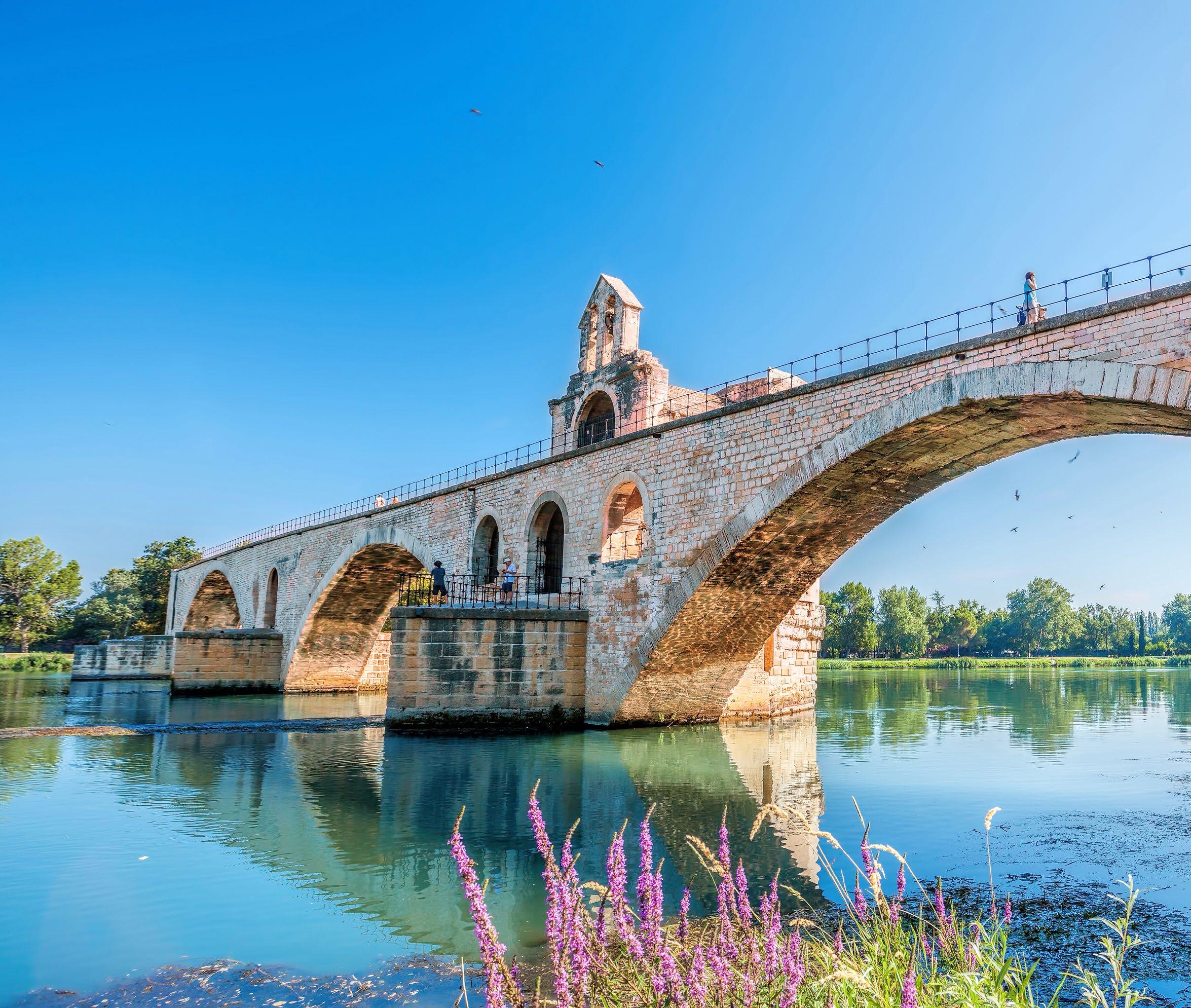
With a dazzling choice of activities on offer, Viking’s eight-day itinerary offers a splendid opportunity to indulge
gardens, one with more than a thousand cacti – and superb views – and the other with a Japanese theme.
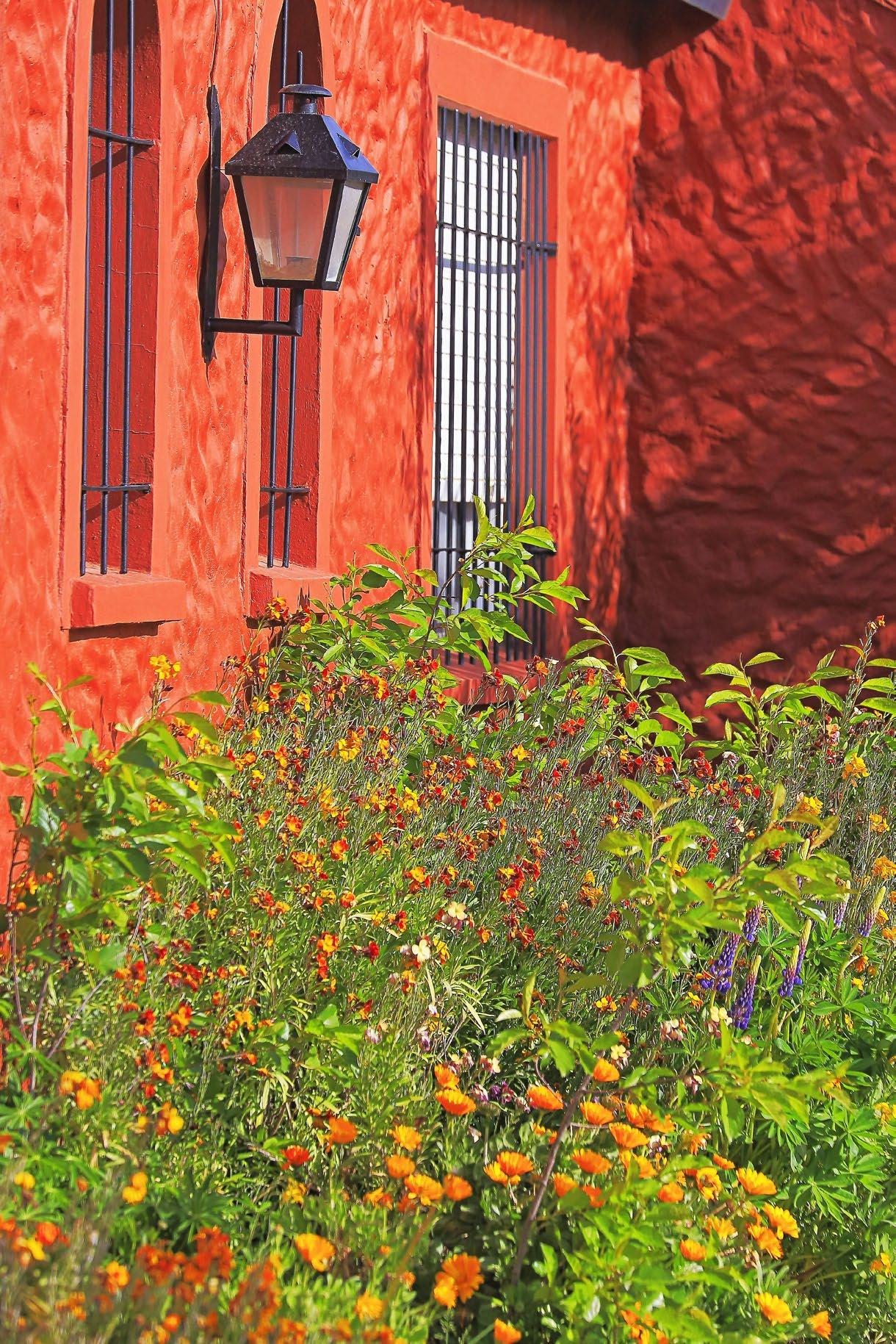
Sailing round to Italy, there’s the benefit of an overnight stay in Livorno, the gateway to Tuscany.
Deservedly popular is Florence, the powerhouse of art treasures from the likes of Michelangelo and Leonardo Da Vinci as well as astonishing architecture. The Duomo cathedral, its green, pink and white marble recently cleaned and polished, is one of my favourite buildings in Europe.
Talking of marble, with two days to explore, an admiration of the city can be combined with a trip to the quarry where the glistening Carrara marble used by the great architects and sculptors is mined.
If you prefer, a fun drive in a classic Fiat 500 and a Chianti wine tasting in a quaint Italian village are among the other enticing options.
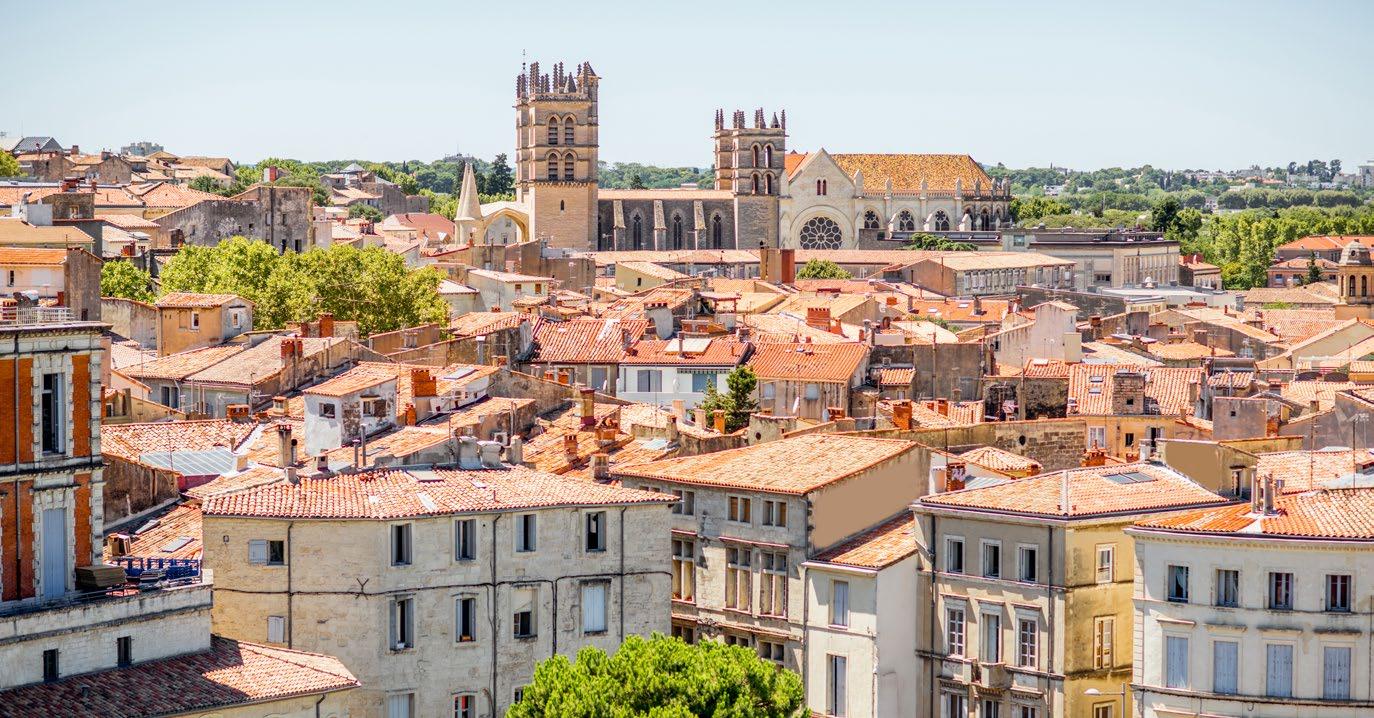
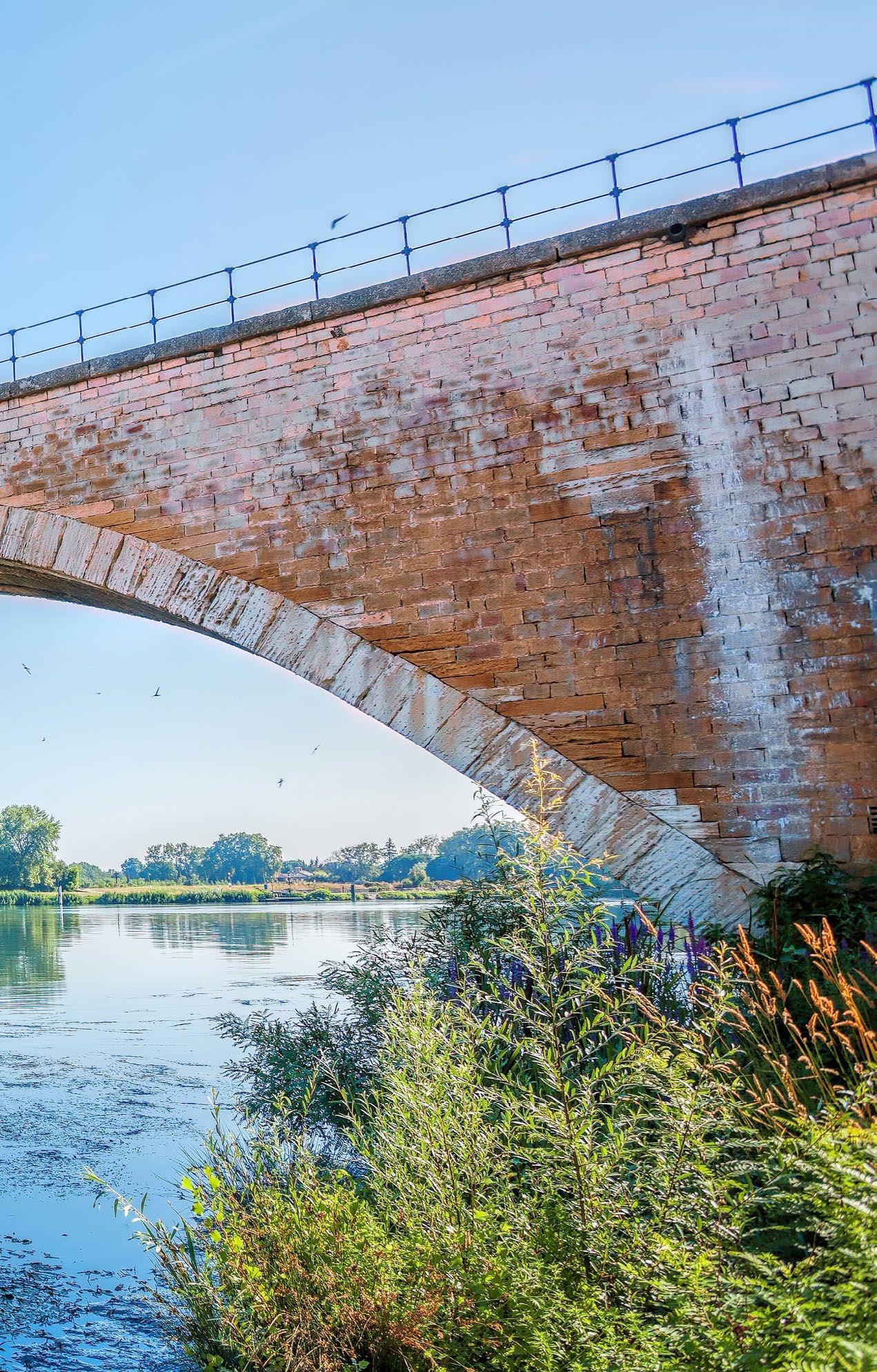
Be sure to see Pisa. The Leaning Tower is the emblem of the Piazza dei Miracoli (Square of Miracles) and the other buildings here are treats too, including the splendid Piazza dei Miracoli.

The cemetery, the Camposanto Monumentale, has courtyards lined with carved Roman sarcophagi, or stone coffin, surrounding a meadow. It’s said to be the most beautiful cemetery in the world. Your journey ends in Civitavecchia near Rome, where you can extend your stay. Here, if you enter the Pantheon Roman temple, gaze up at its spectacular ceiling and reflect on the marble used in its
construction – the very same Tuscan Carrara that Michelangelo used to create
GETTING THERE: The 8-day Iconic Western Mediterranean voyage from Barcelona to Rome or vice versa, starts from $4,995pp in Veranda stateroom
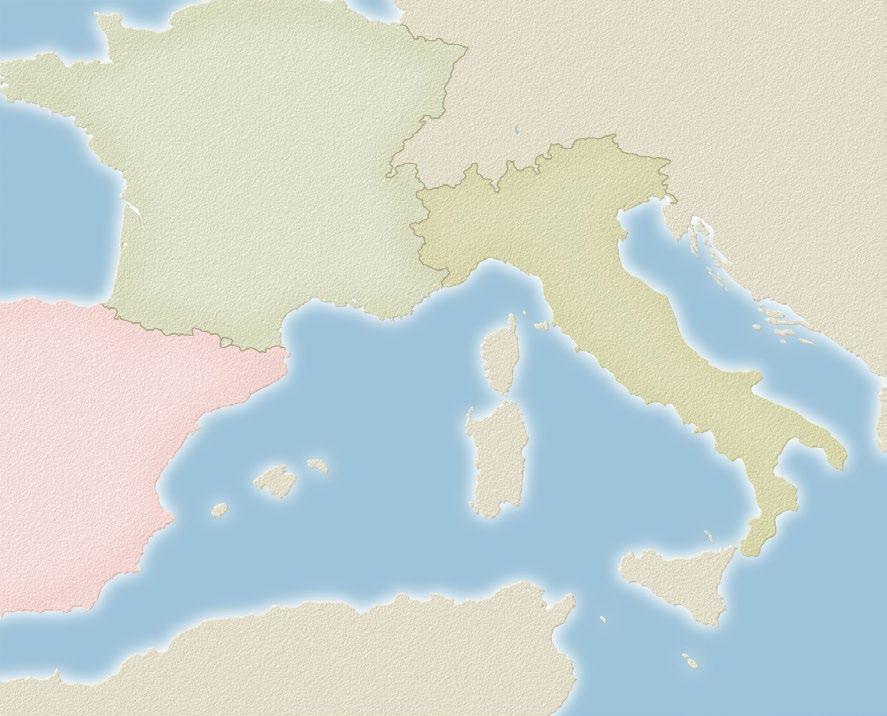

Spain offers a captivating blend of rich history, vibrant culture, unique landscapes, and culinary delights to keep even the most avid foodies satisfied. Whether you're a history buff, a beach lover, or a food enthusiast, Spain has something to offer all walks of life. Here are our top five things to do when you’re in Spain
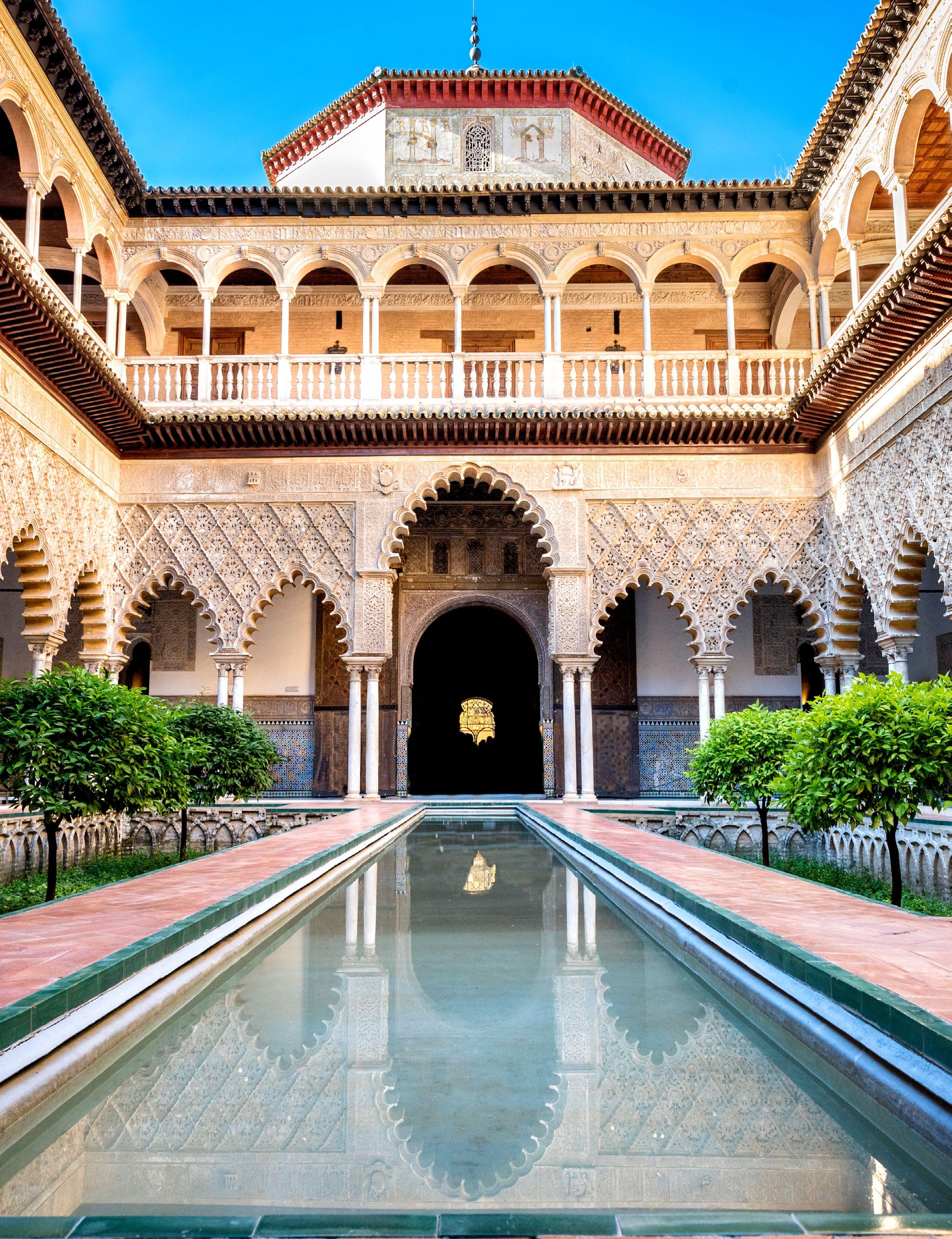
Art admirers will be in heaven at the Prado Museum in Madrid, home to an extensive collection of European art, including works by renowned artists like Velázquez, Goya, and El Greco. Or learn more about the lives and works of Barcelona’s three most famous artists, Miró, Picasso and Gaudi. Catalan painter and sculptor Joan Miró’s works are on display at the Joan Miró Foundation, visit the Picasso Museum and marvel at Antonio Gaudi’s Casa Batlló and Casa Milà.
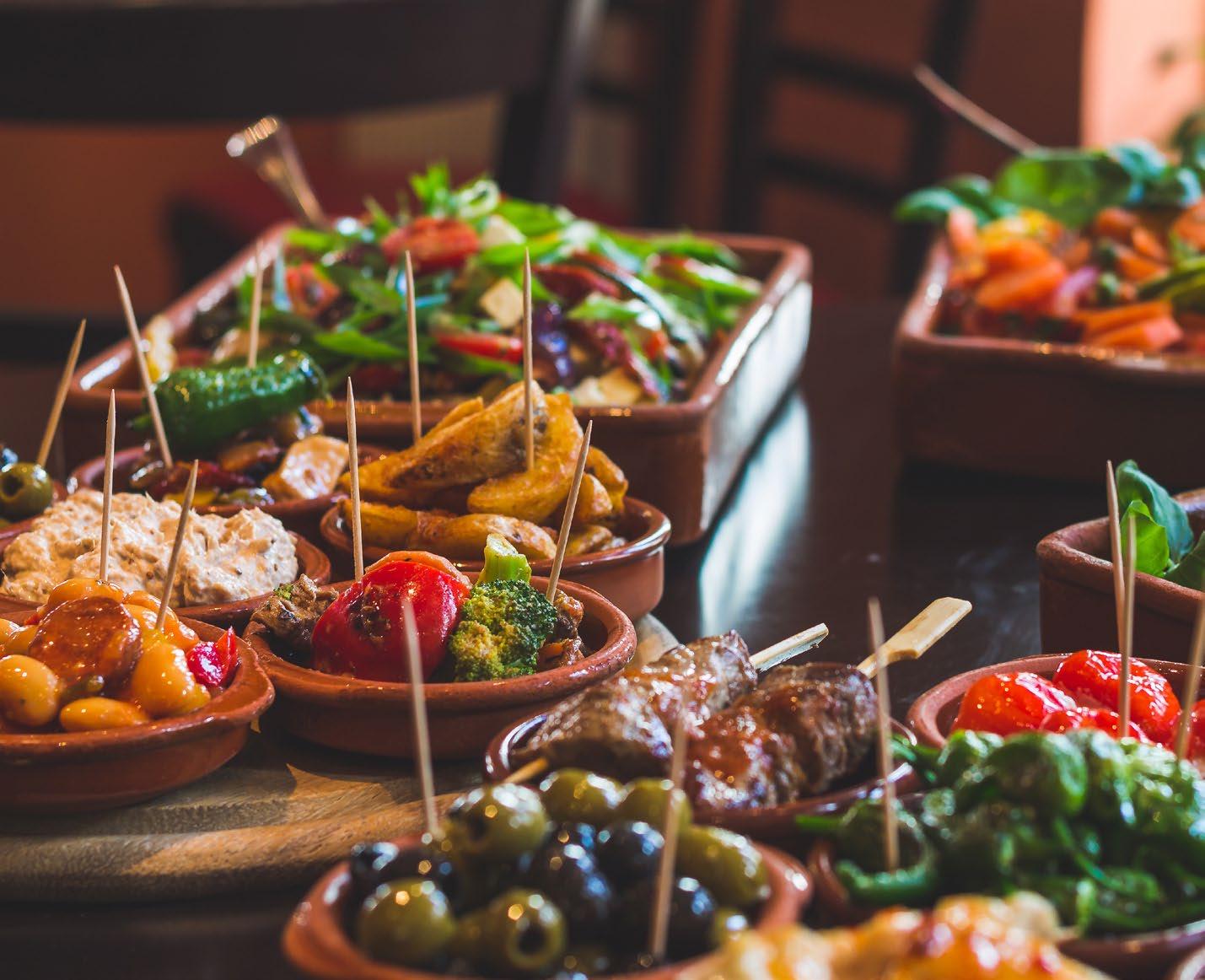
Indulge in the vibrant culinary culture of Spain by enjoying an age old tradition of tapas. These small, flavourful dishes are meant to be shared, allowing you to sample a variety of flavours. Whether in bustling cities like Barcelona or quaint towns like Granada, savouring tapas accompanied by a glass of Spanish wine or sangria is a must-do activity.
Discover the enchanting Moorish architecture and lush gardens of the Alcazar in Seville. This UNESCO World Heritage site showcases intricate tilework, stunning courtyards, and magnificent halls. Explore the beautiful gardens, take in the tranquil atmosphere, and imagine the lives of the rulers who once walked these halls.
Immerse yourself in the passionate world of Flamenco, a traditional Spanish dance form. Experience the soul-stirring performances featuring powerful footwork, expressive gestures, and melodies. From intimate venues in Seville's Triana neighbourhood to renowned tablaos in Madrid, witnessing a Flamenco show is an unforgettable cultural experience that brings Spain's rich heritage to life.
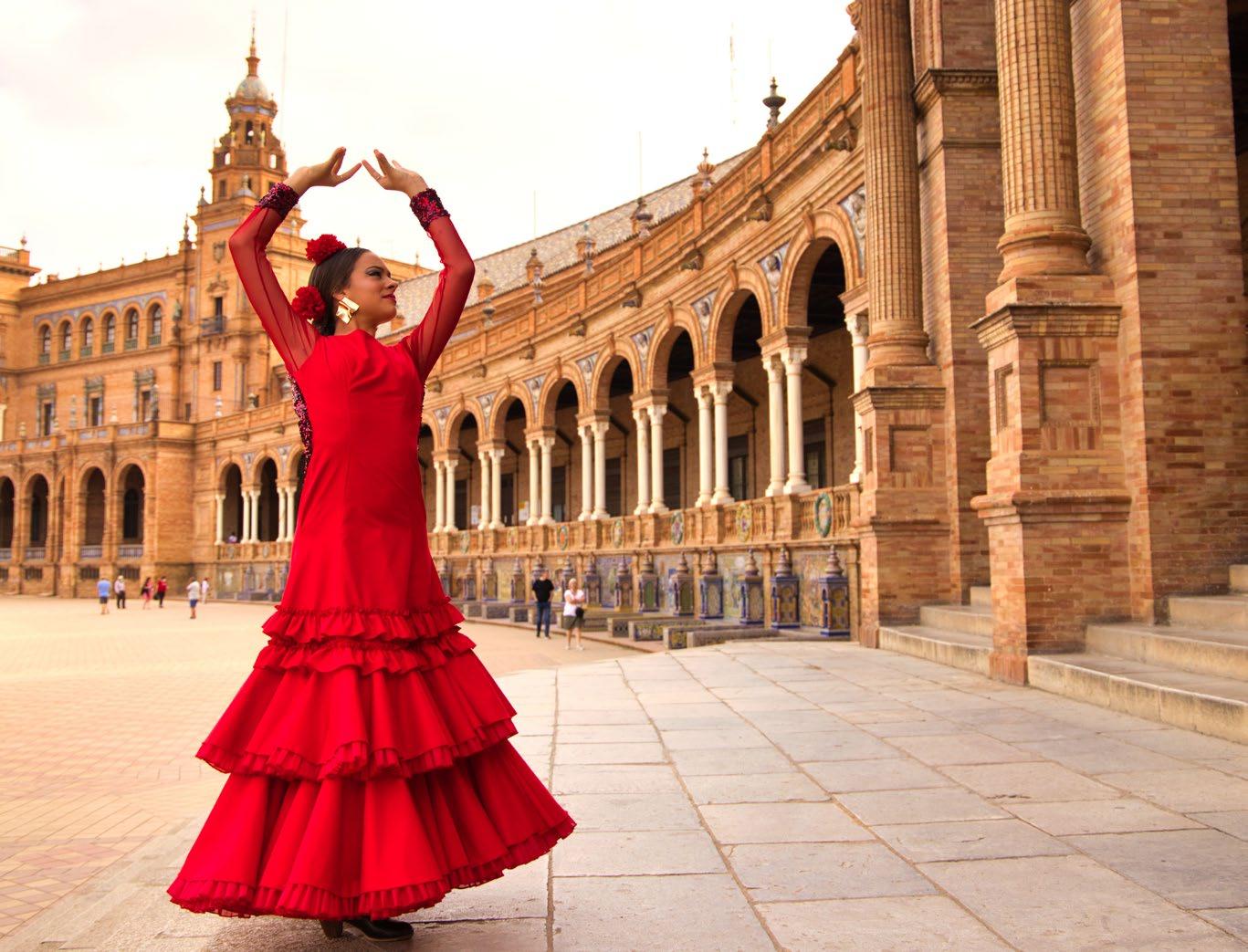
Learn about the viticulture of Spain in Valencia, where you can delve into the renowned wine-producing areas of the region. Despite its challenging growing climate, Valencia is celebrated for its exceptional wine production, cultivating the native Bobal grape. This grape variety is renowned for yielding fruity wines characterized by deep colours, robust tannins, and rich flavours.

Unearthing ancient history hidden in one of the longest-inhabited medieval cities in the world
WORDS NICOLE TRILIVAS


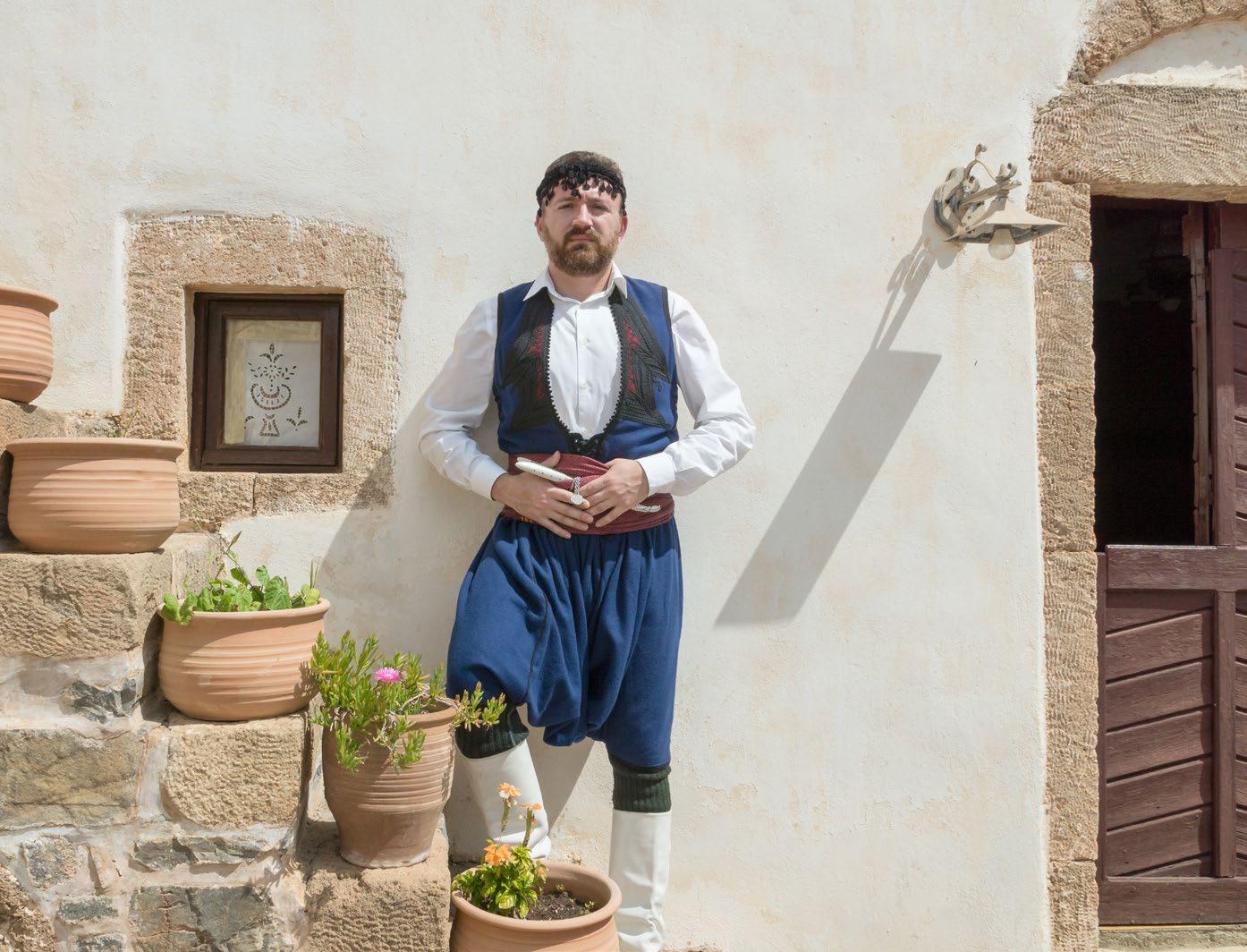
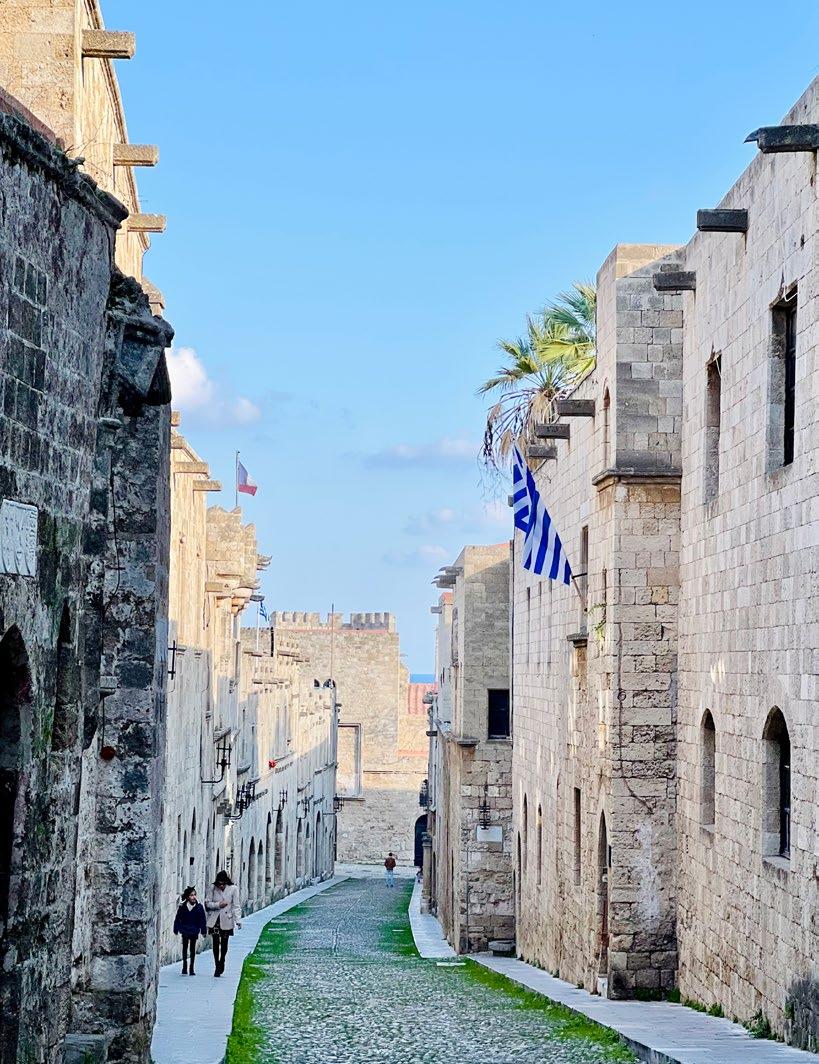
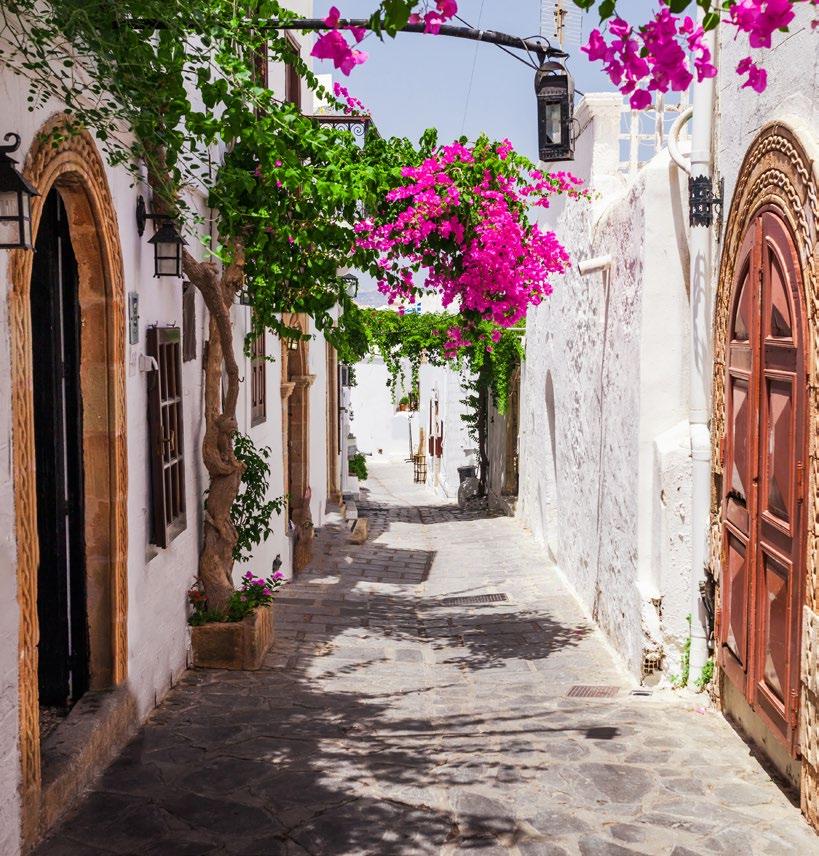

This page Windmills line the coast
Opposite page, clockwise Rhodes
Old Town; a pretty alleyway; the harbour from the stateroom veranda; Street of Knights; a Cretan man in traditional clothes
As far as ports go, it doesn’t get much more romantic than Mandraki Harbour right at the foot of Rhodes’ medieval quarter. I sweep the curtains of my veranda stateroom aside and gasp – literally gasp – when I first set eyes on it. Dawn’s rosy fingers have pinked the sky and gilded the edges of the clouds above the port and the UNESCOlisted city centre, and the light-strewn Aegean twinkles like spilt glitter. Byzantine towers and stone walls coil from the water’s edge, and a lone lighthouse stands proudly on a fifteenth-century fortress. It looks like something from another time period. It looks like something from a dream.
Not all harbours are so charming. I’m on Viking’s Ancient Mediterranean Treasures voyage – an eight-day, history-themed spin around the Aegean – and our ship, the Viking Sky, has just come from Athens and Crete, whose beauty and treasures lie beyond the harbour. After a day in Rhodes, the ship will go on to sail to Ephesus, Troy and Istanbul. But the sun-splashed island of Rhodes immediately steals my heart – even before I have a chance to set foot off the ship.
As one of the world’s only continuously inhabited medieval cities and as a one-time bastion for Christendom, the well-preserved old town of Rhodes (also called Rhodes’ medieval city or medieval quarter) has objective, postcard-worthy appeal that only gets more remarkable with
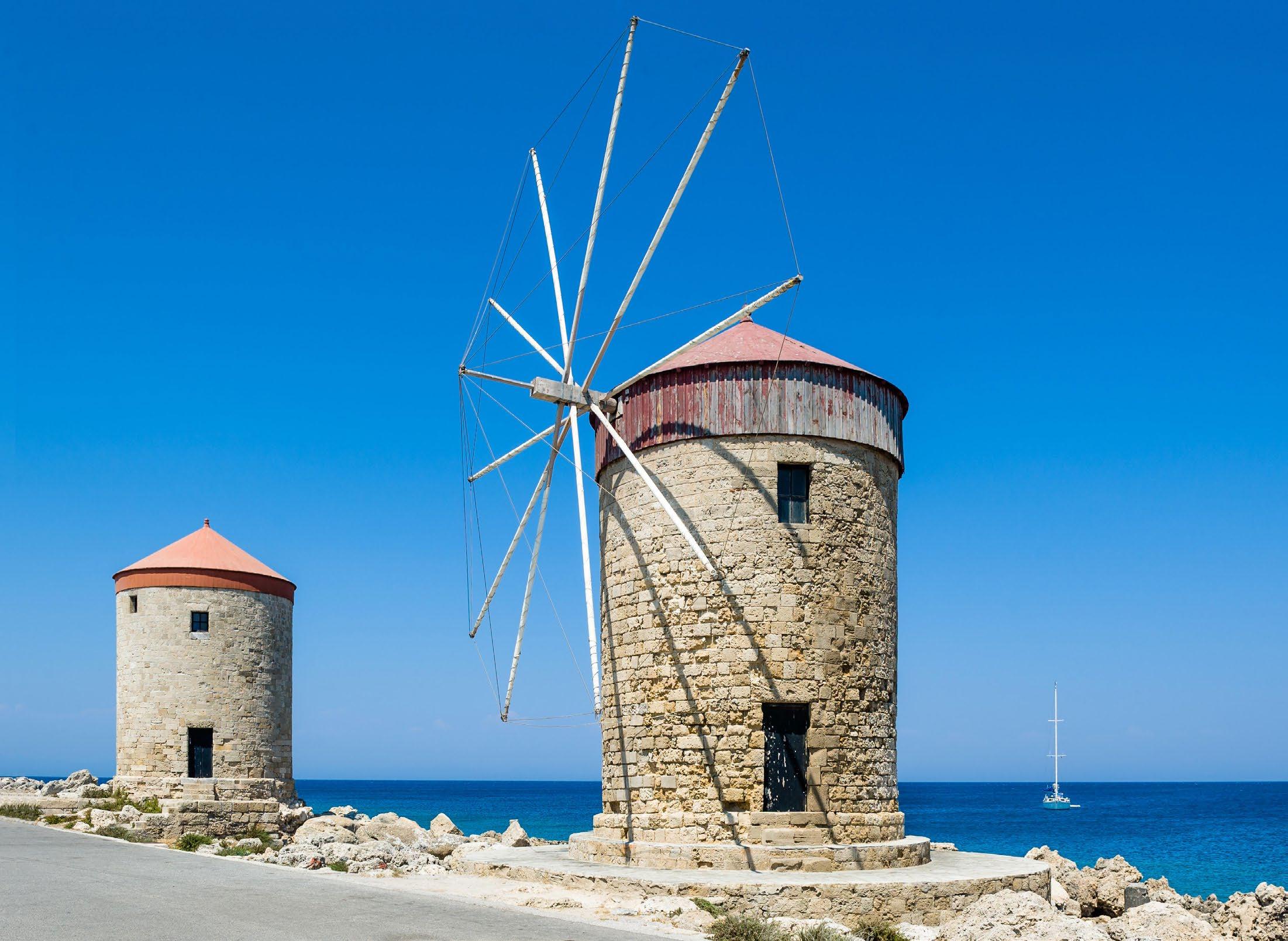
historical context. Born and raised on the island of Rhodes, Viking’s on-the-ground guide Georgios has a knack for spinning stories and pointing out history hidden in plain sight. Rhodes is one of those handy destinations where you can simply stroll off the ship and be in the heart of the action; and in the short walk from the gangplank to the city walls, Georgios gives our small group a little overview of the island’s long and lustrous heritage.
According to Greek mythology, Rhodes is the birthplace of the king of the gods Zeus. (My love-at-first-sight response is immediately validated; I just knew there was something special about this place!) As the largest of the Dodecanese islands and the fourth largest island in Greece, Rhodes was also a one-time maritime power in the Hellenistic period; however, much of its legacy is connected with the Order of the Knights of Saint John, also called Knights Hospitaller and the Knights of Rhodes. The Knights ruled Rhodes from 1310 until 1522 when they were forced to depart after a successful six-month siege by the Ottomans. Later, the Knights would go on to set up their base on the island country of Malta, where they would eventually be known as the famed Knights of Malta.
Georgios guides us into the sand-hued ramparts of the city, and the air immediately shifts once we’re inside the city’s walls – it’s like you can taste the past on the fresh sea air. The city is a tangle of narrow lanes studded with wrought-iron lanterns

and umbrellaing Ficus trees. Ottoman influences abound: closed wooden balconies cling to the sides of buildings and minarets spire the sky.
Cats doze on windowsills like gargoyles. “The cats have the run of the place,” says Georgios, as I chase a calico kitten down an alley garlanded with purple vines of bougainvillaea. “We don’t have crime here, and no mafia – only cats.”
Georgios brings the city to life as we walk: see this stone pavement? This was designed to force invaders from their horses because the horses’ hooves would slip on the small polished stones. See these massive granite balls that line the pathways? They were once used in catapults in one of the many sieges on the island. It’s not all so grim. See those plants growing from the old stone walls? Those are capers, which we pick and eat. See these traditional mosaic pebble floors? They keep the houses cool in the summer, and they feel good on your feet, “like reflexology”, Georgios declares.
It’s all impossibly picturesque. Everyone has their camera phones out when we get to the cobblestoned Street of the Knights, which starts from the Knights’ Hospital, one of three hospitals built by the Knights of Rhodes. The street is lined with sixteenth-century “inns”, each representing the Knights’ territories of origin. The stone walls are lined with imposing crests and ornate inscriptions. Georgios points up to show us a stone carving that looks suspiciously like a crocodile. He explains: “The story goes that a crocodile escaped from a ship from Egypt and washed ashore in Rhodes, terrorising the city.” Allegedly, the head of the knights at the time, called the Grand Master, “killed it and saved the city,” Georgios tells us as we start walking again, passing under the stone crocodile, which has been carved in tribute to the Grand Master.
The Street of the Knights leads to the Gothic Palace of the Grand Master of the Knights of Rhodes, which was first built as a Byzantine citadel in the seventh century before going through several makeovers across the centuries. Though there are plenty of stories originating within the palace walls, we can’t talk about Rhodes without talking about one of the Seven Wonders of the Ancient World, the Colossus of Rhodes, which has an unexpected connection to the palace. Stick with me…
Perhaps Rhodes’ most famous association, the Colossus of Rhodes was a massive, 32-metre bronze statue built in honour of the sun god Helios, patron god of Rhodes, after the island survived a siege in 280BC. The statue only stood for 56 years and fell in an earthquake in 224BC. No traces of it exist today.
Georgios is quick to right common misconceptions about the Colossus, the most prominent being its location. While countless artists’ renditions place it at the mouth of the harbour – where the Viking Sky is docked, archaeological evidence suggests the location of the statue was actually on the top of the hill – right where the Palace is now located. The remains of a temple of Helios were discovered in this spot, and ancient writings insist that when the statue fell, houses were crushed, which would have been impossible if the statue was located in the harbour.
As the tour starts to wind down and the blinding Mediterranean sun starts to slip closer to the horizon, I can’t help but feel like I have just been trusted with all these wonderful secrets, like I wandered into a looking glass to the past (even though the tour was only a few hours long). “A cruise is like a wine tasting, a little bit here
GETTING THERE: The 8-day Ancient Mediterranean Treasures voyage from Istanbul to Athens or vice versa, starts from $4,995pp in Veranda stateroom.
This page, clockwise A cobblestone alley in Rhodes; a bronze deer guards Mandaraki harbour; Rhodes’ vineyards produce many varieties of grapes; The Palace of the Grand Master; bougainvilleas grow everywhere;
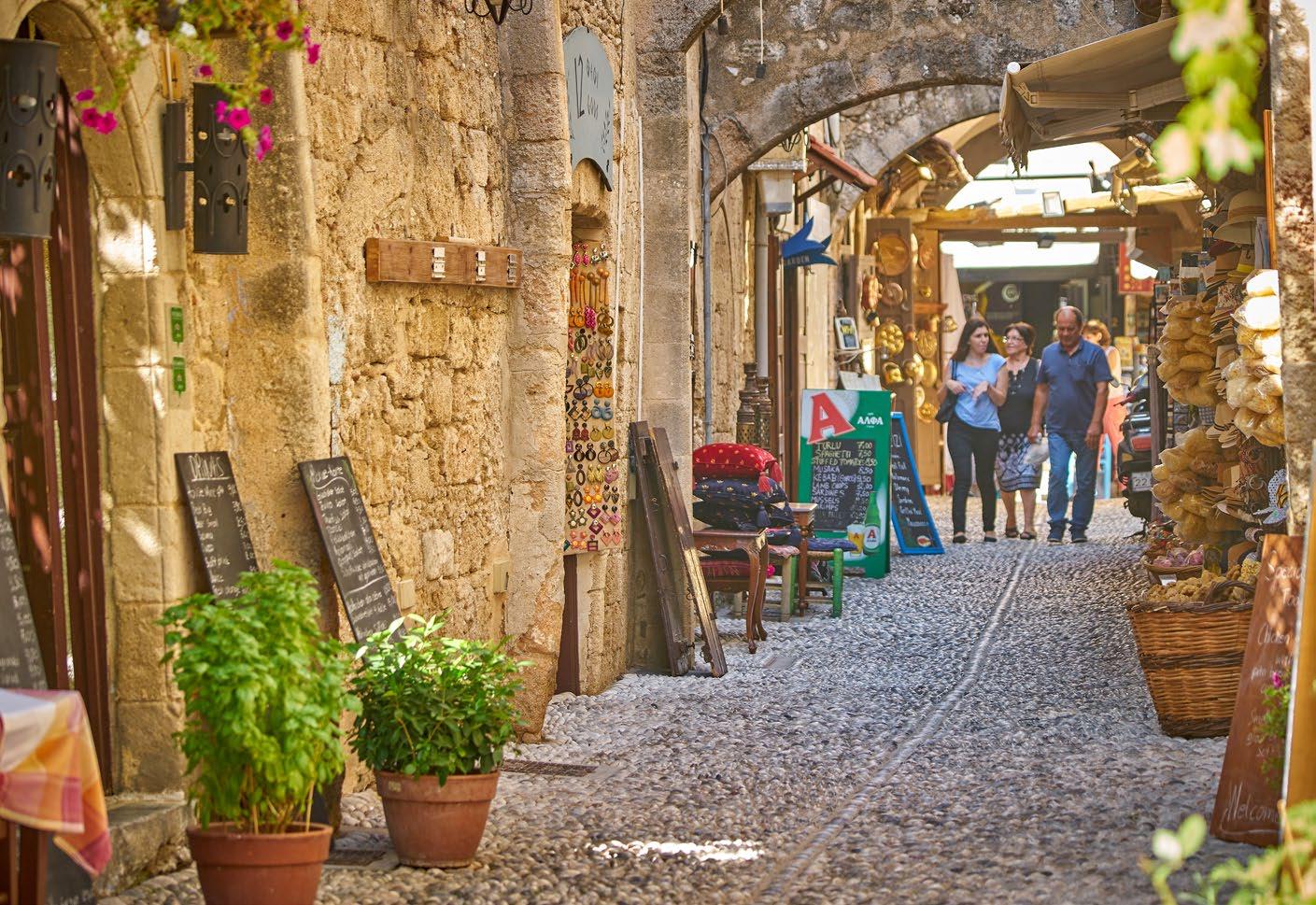
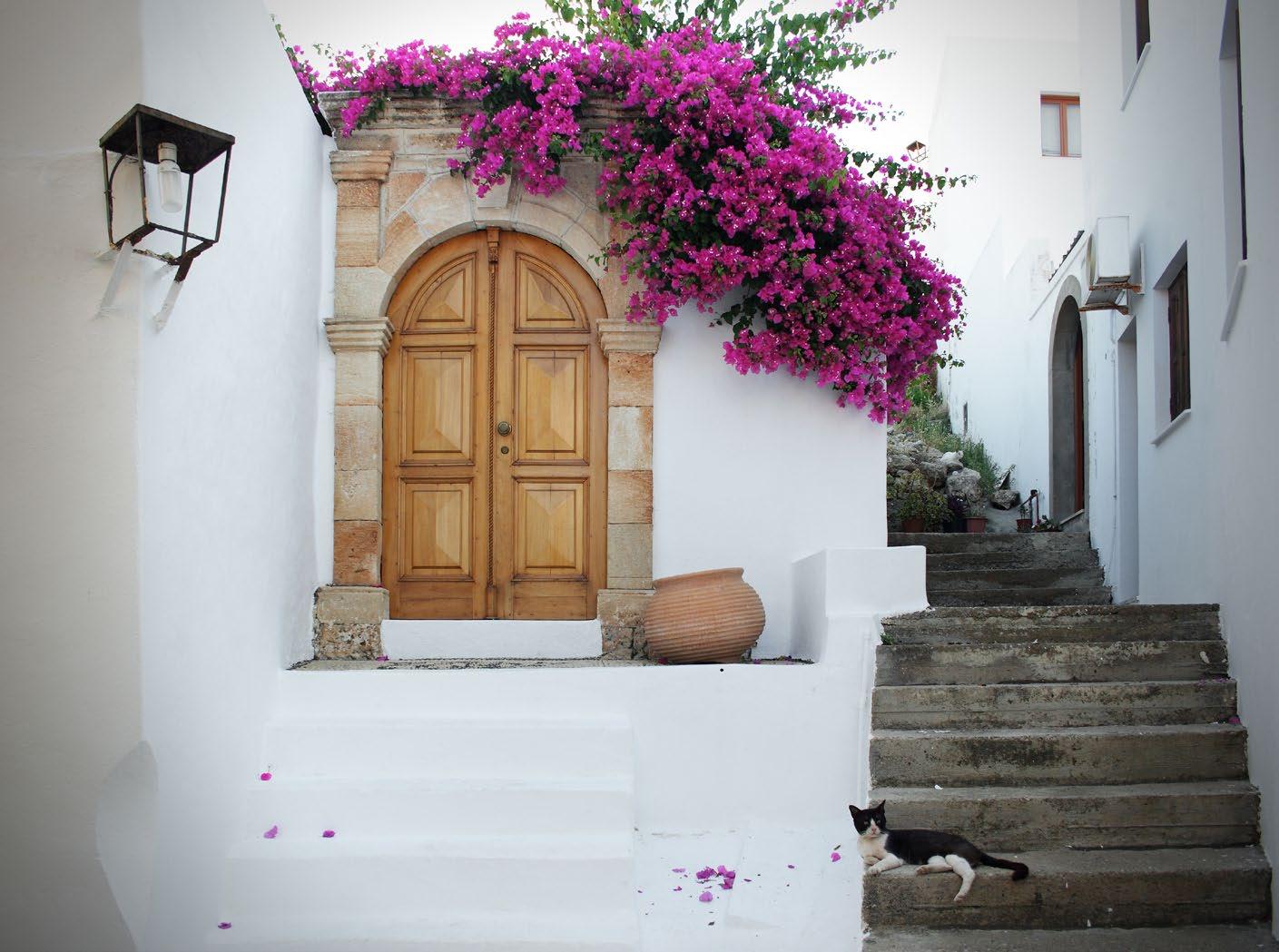


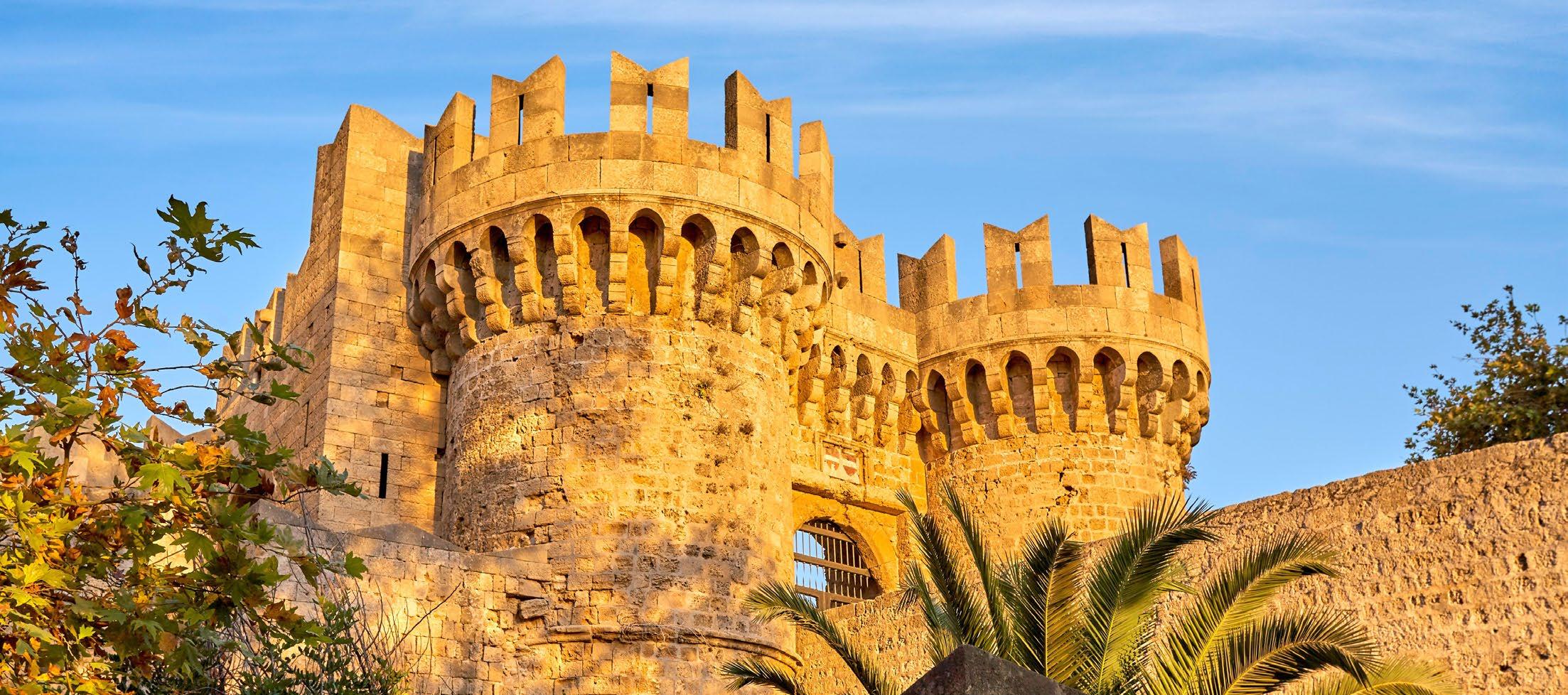
8 DAYS | 4 COUNTRIES
5 GUIDED TOURS
SET SAIL: JAN–JUL & SEP–DEC 2024; JAN–MAY & JUL–AUG 2025
FROM $4,995PP IN VERANDA
ANCIENT ADRIATIC TREASURES
Venice to Istanbul or vv
15 DAYS | 5 COUNTRIES
12 GUIDED TOURS
SET SAIL: FEB – JUN, AUG – OCT 2024; APR – AUG 2025
FROM $10,695PP IN VERANDA STATEROOM SAVE UP TO $1,600 PER COUPLE
MEDITERRANEAN ODYSSEY
Barcelona to Venice or vv
13 DAYS | 6 COUNTRIES
10 GUIDED TOURS
SET SAIL: APR – OCT 2024; SEP 2025
FROM $8,795PP IN VERANDA STATEROOM
MEDITERRANEAN & ADRIATIC SOJOURN
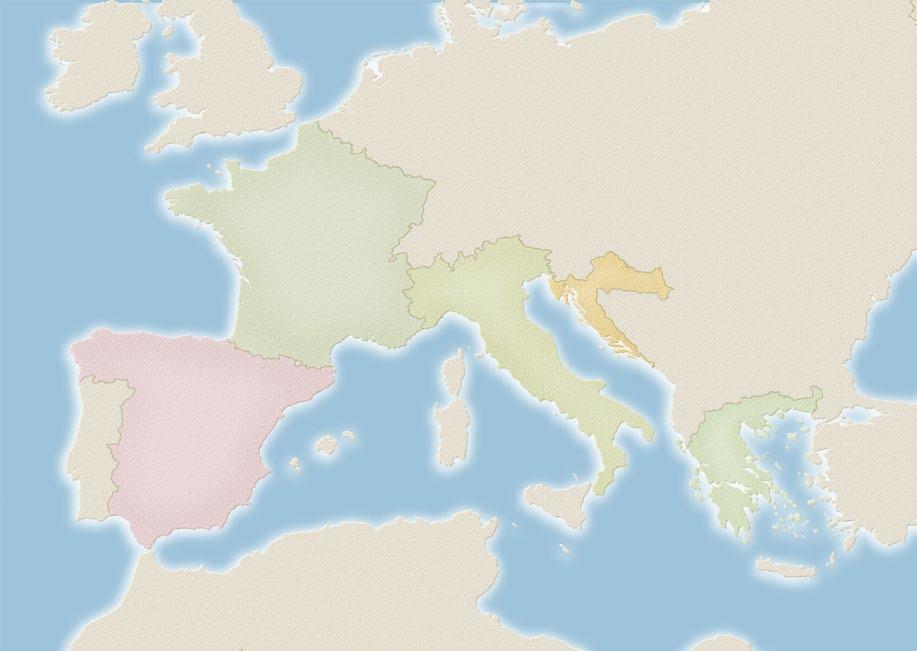
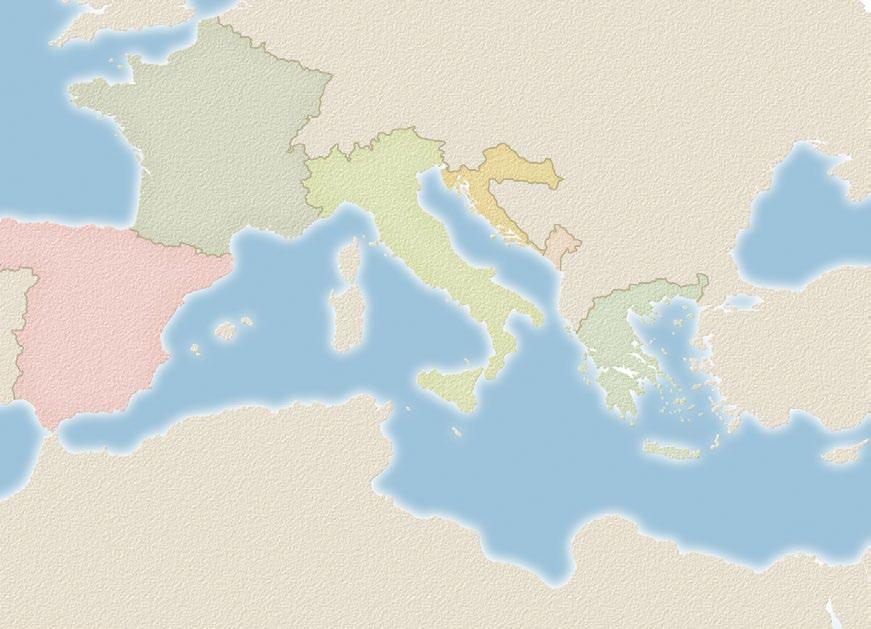


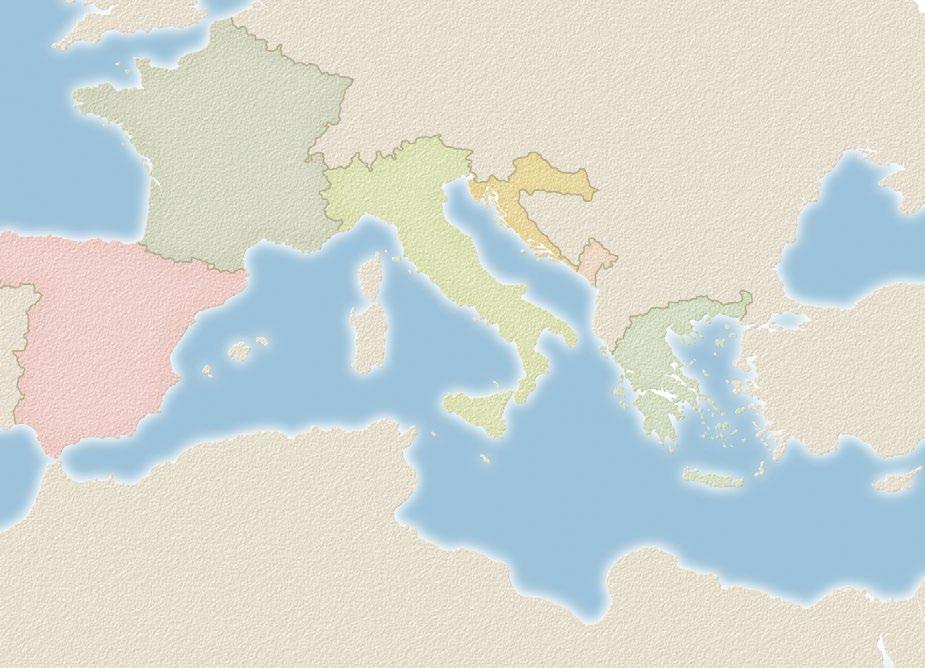
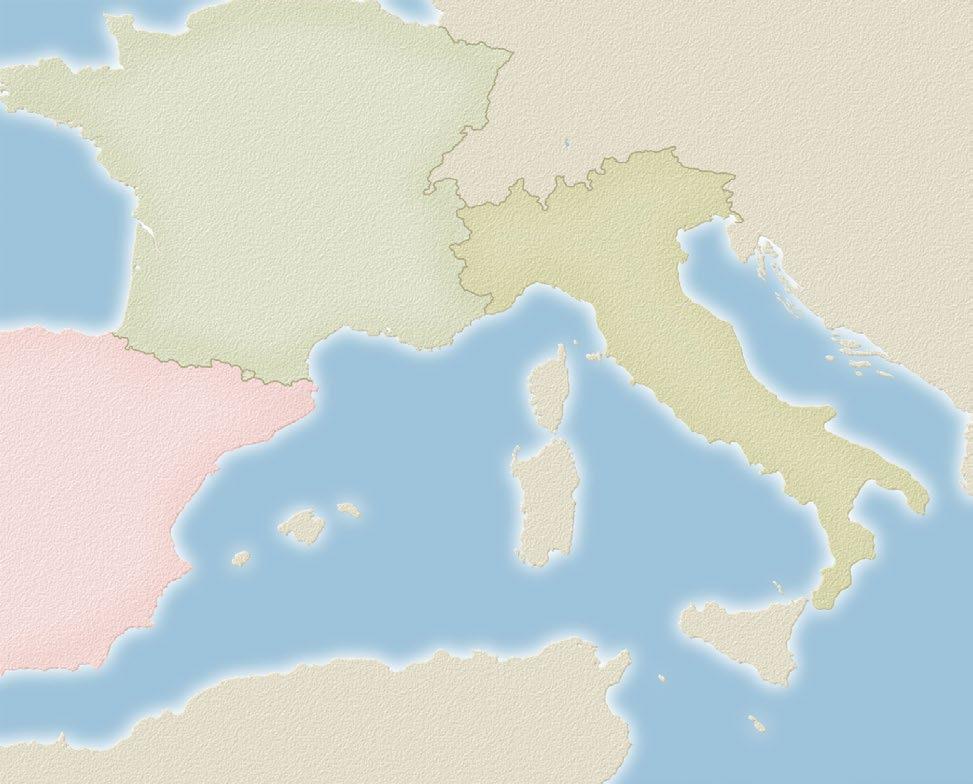
Barcelona to Athens or vv
22 DAYS | 7 COUNTRIES
17 GUIDED TOURS
SET SAIL: FEB –JUL & SEP–OCT 2024; JAN, MAR –AUG 2025
FROM $12,795PP IN DELUXE VERANDA STATEROOM SAVE UP TO $1,600 PER COUPLE
*Conditions apply. Prices are per person, in Australian dollars, based on double occupancy, subject to availability, includes all advertised discounts, and correct at time of printing. A partially refundable deposit is required at the time of booking. Iconic Western Mediterranean based on 06 January 2025 departure. Mediterranean Odyssey based on 31 July 2024 departure. Ancient Adriatic Treasures based on 31 October 2024 departure. Mediterranean & Adriatic Sojourn based on 13 January 2025 departure. Included flight credits are to be used towards flights booked by Viking, are subject to availability and are only valid if booked in conjunction with selected Viking Ocean cruises. All offers only valid on new bookings made between 01 June and 28 August 2023 unless sold out prior. For full terms and conditions including flexible deposit and flight credit offer visit viking.com.
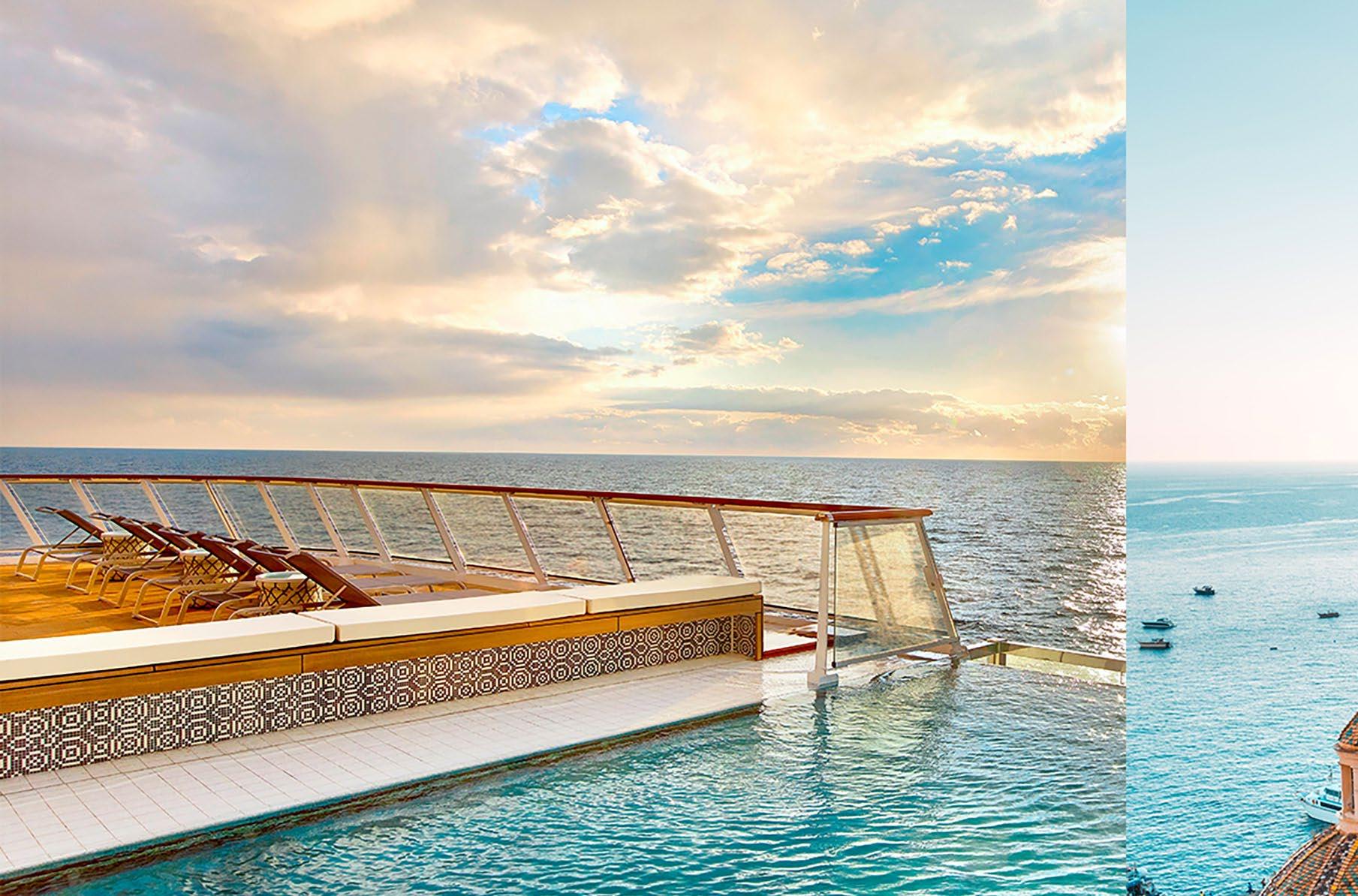
Moments of awe that will stay with us for a lifetime WORDS LESLEY BELLEW
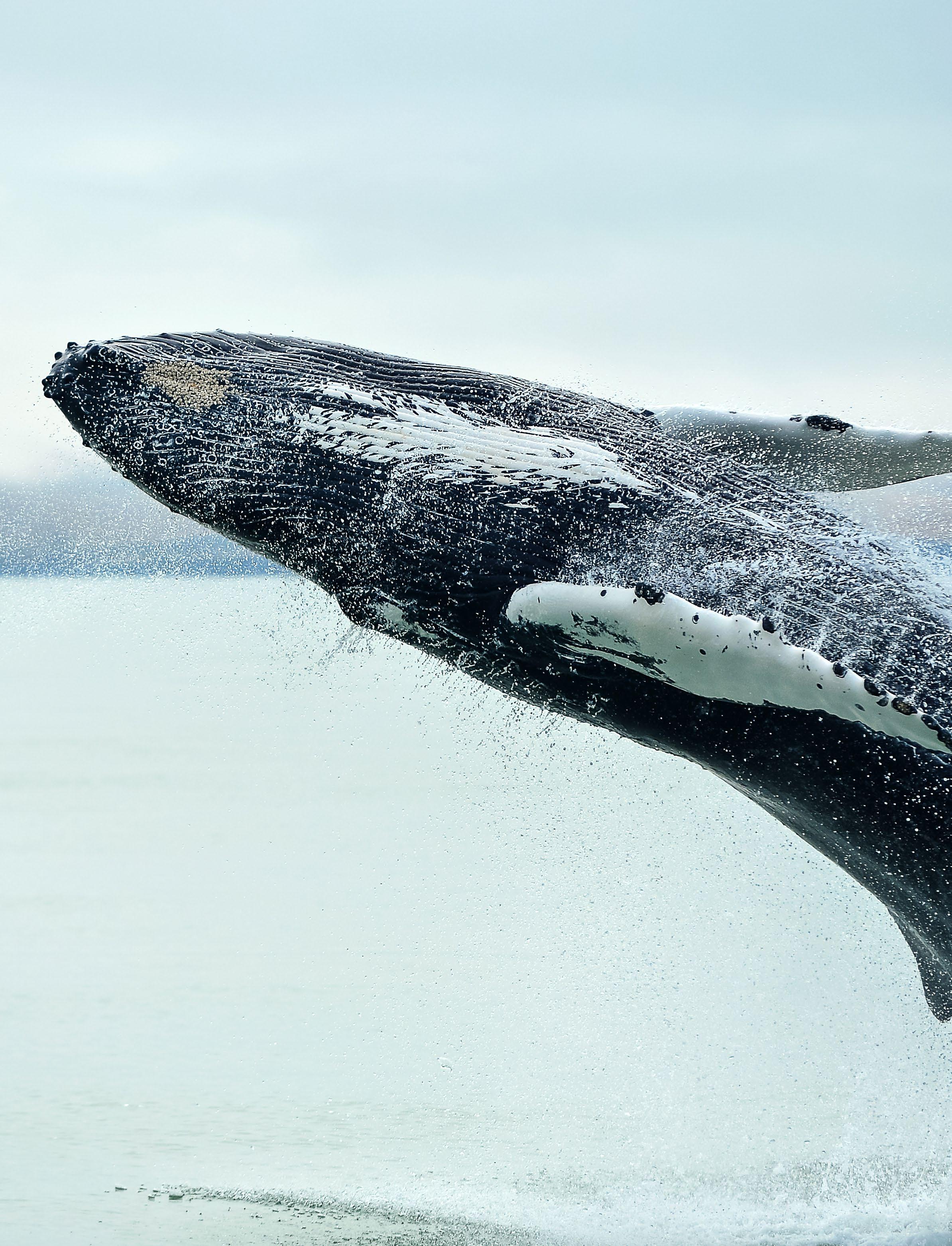
Psychologists say a moment’s awe plays a big role in our health, happiness and wellbeing. After 90 minutes of watching humpback whales play alongside our inflatable RIB in the deep, clear waters of the Westfjords, in Iceland, I can safely say they are right. Awe changes us.
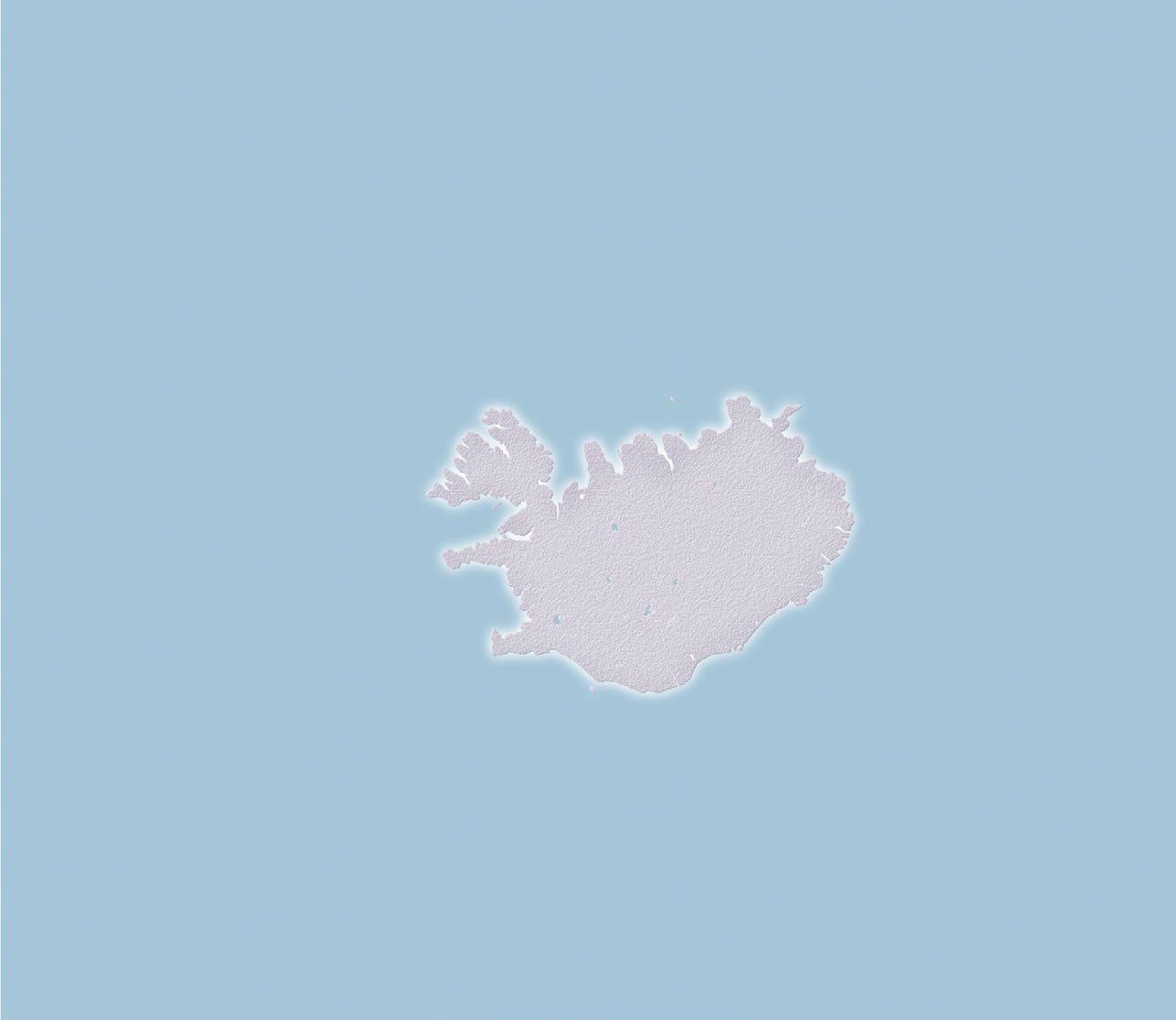

Local boat owner Sigurour whizzed our group of eight Viking Jupiter passengers from sleepy Ísafjörður into the Denmark Strait and within 15 minutes we saw the distinctive spray of humpback whales. Not just one but two, three, four, five and more. And that's when the distinction between the emotion of awe kicked in (rather than inspiration or surprise). Awe makes us feel small – and when these playful, gentle giants surrounded us it was the most humbling connection with ocean life that anyone could experience. We were in the whales’ hands so to speak, and they embraced us in their social harmony, singing to each other (or maybe us) in choruses of deep, low moans alongside plenty of huffing and puffing. Segurour explained that the pod
spot every year, it would not take much to remember Sigurour’s boat! Up close we could distinguish the humpbacks’ different sizes, their markings and colour variations from pure white to solid black on their tail fluke, each one unique, like a fingerprint said Sigurour as we counted up to 12 humpbacks within our view.
The whales glided through the water, each one the size of a single decker bus, powerful swimmers skimming our boat in a guard of honour before breaking off to flex their butterfly-shaped flukes up, then down, to dive deep for shrimp feast on the sea bed. They would sometimes be down for more than five minutes and we sat silently wondering where they would come up, often rising some way ahead and letting out air with a triumphant noisy blow creating their giant signature spray of mist. Here, on the edge of the Arctic Circle, where waterfalls create rainbows as they run down the side of flat-top mountains, we sat stunned by the spectacle we had just witnessed. This was not just a moment of awe but 90 minutes of pure magic. Back on Viking Jupiter we celebrated with a strong aquavit, raising our glasses to ‘Good Health’, revelling in the knowledge that such a close encounter was not only a rare privilege but these priceless moments of awe will stay with us forever.
Awe makes us feel small – when these playful gentle giants surrounded us it was humbling
Reykjavík, the world’s most northern capital city and one of the cleanest and most eco-friendly cities in the world, is very much the hub of this geographically stunning country. Although it’s home to over half the national population, Reykjavík still manages to ooze a certain amount of small-town charm. But don't think that this means the options for a day out are sparse - quite the contrary. There is no lack of culture in this cool northern capital; world-class museums recounting the fascinating history (the Vikings settled here in 870 AD) vie with amazing street art (the concrete architecture calls out to be decorated with high-class commissioned graffiti) and just outside of the city the natural beauty of Iceland is dramatic and abundant.
Take the Panoramic Reykjavík excursion where you begin with a drive up Öskjuhlío Hill to the Perlan vantage point, also known as “The Pearl”. This glass-domed building was constructed upon old hot-water storage tanks and today offers sweeping city views. Descend into the city and pass the Kjarvalsstadir Art
Museum, a fine example of Nordic modernism. You will also see the fantastic Hallgrímskirkja church, a towering vision in white designed by architect Guðjón Samúelsson. It's tower points dramatically up to the sky and is worthy of the trek to the top (there is an elevator) to see the sweeping views of the city below. Journey through the city centre passing the pond and the all-glass Harpa concert hall. Then continue to the old harbour and pier where you can take a peek at the Sólfar statue. See the National Museum, the university and the Höfði House, the sight of the meeting between Ronald Reagan and Mikhail Gorbachev that marked the beginning of the end of the Cold War. It's also worth heading off into the side streets for a spot of artisan shopping. There is a refreshing lack of chain stores: instead a creative mix of independent enterprises vie for your attention.
Head back to the ship for a lovely dinner or if you want to stay out a bit longer, all swimming pools in the city are open into the evening. And of course, on crisp winter evenings you might even get to see the Northern Lights!
Geothermal spa Billed as an otherworldly wonder in the heart of a volcanic landscape, the rejuvenating powers of the geothermal seawater are unlikely to disappoint. You can always elevate the experience into the next level and have an in-water massage.
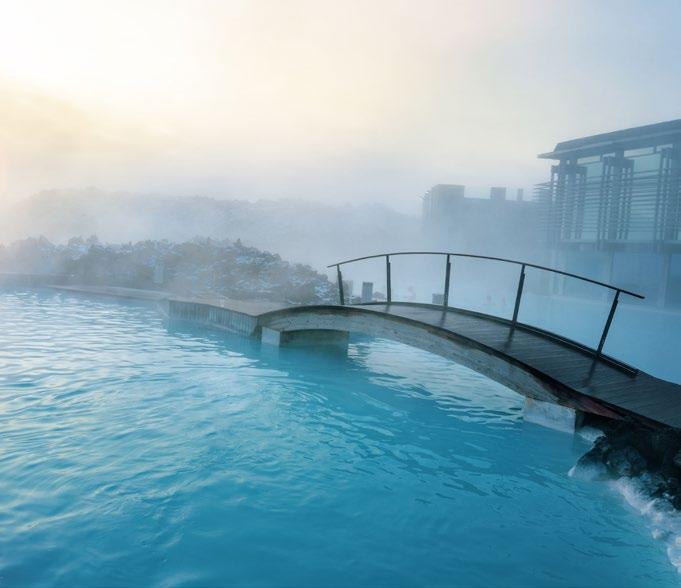
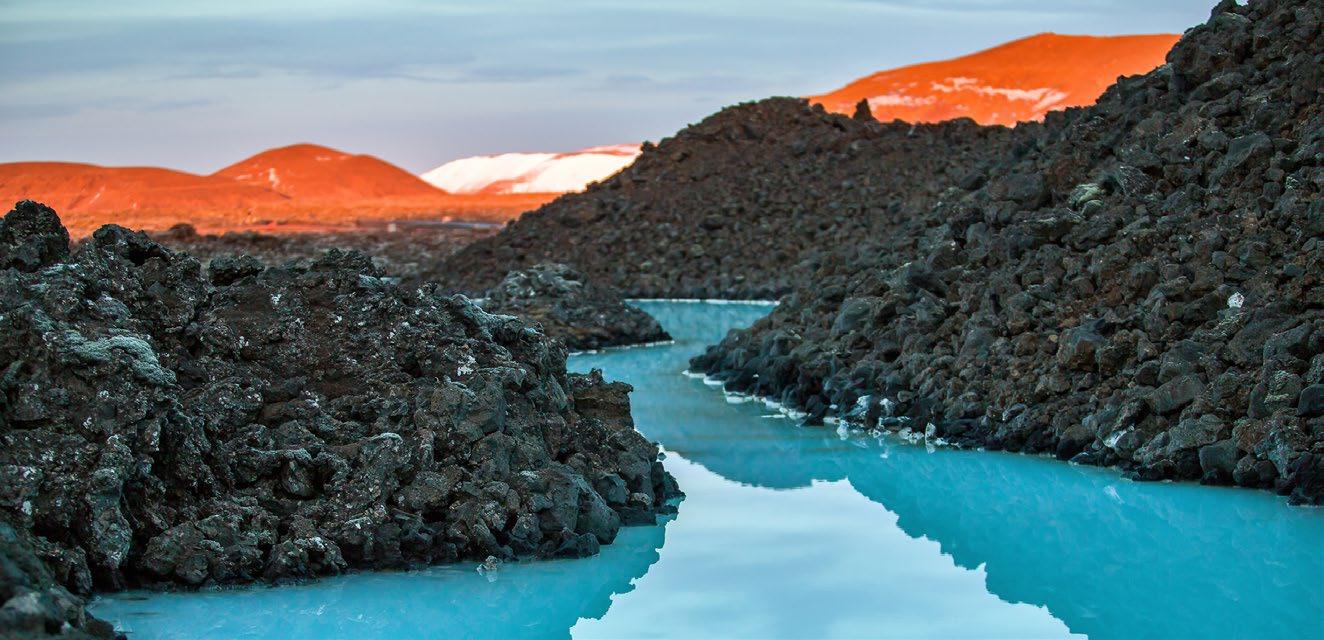
Lava cave For those concerned about cramped conditions in the lava caves look no further than Raufarhólshellir. It's the fourth longest lava cave in Iceland, but is also comfortingly spacious with 10-metre ceiling heights.
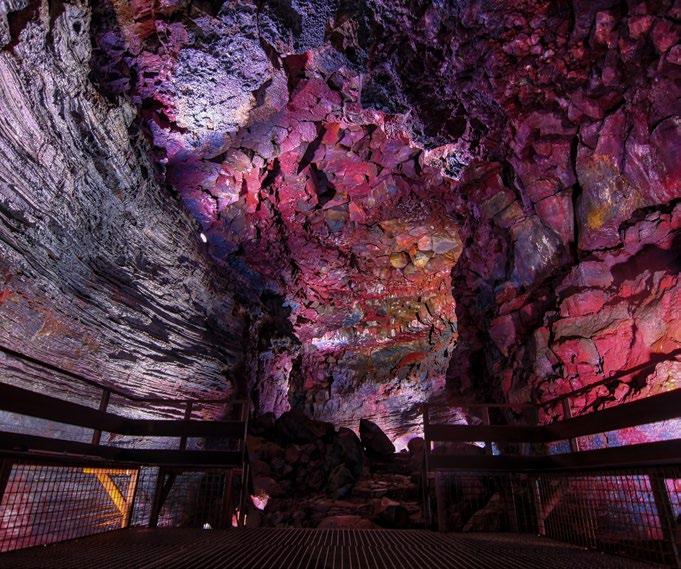
Exhibition Sitting atop the highest hill in the city, this glass-domed landmark not only offers incredible views but houses an interactive exhibition about the wonders and nature of Iceland.
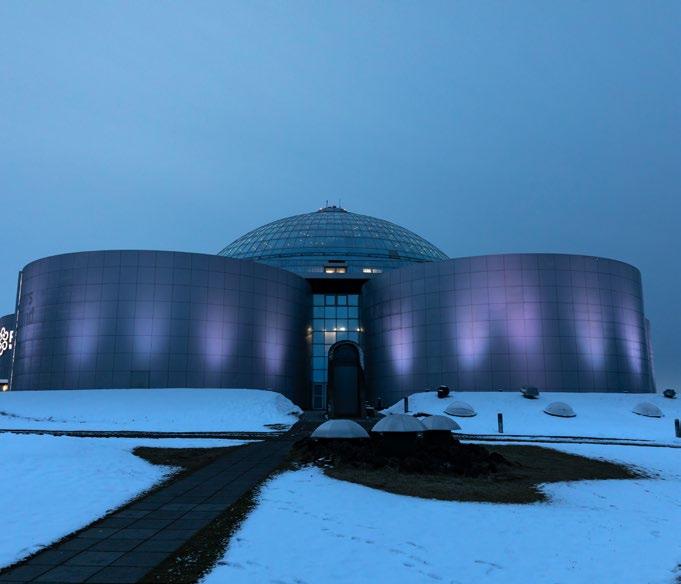 03 THE PERLAN
01 BLUE LAGOON
03 THE PERLAN
01 BLUE LAGOON
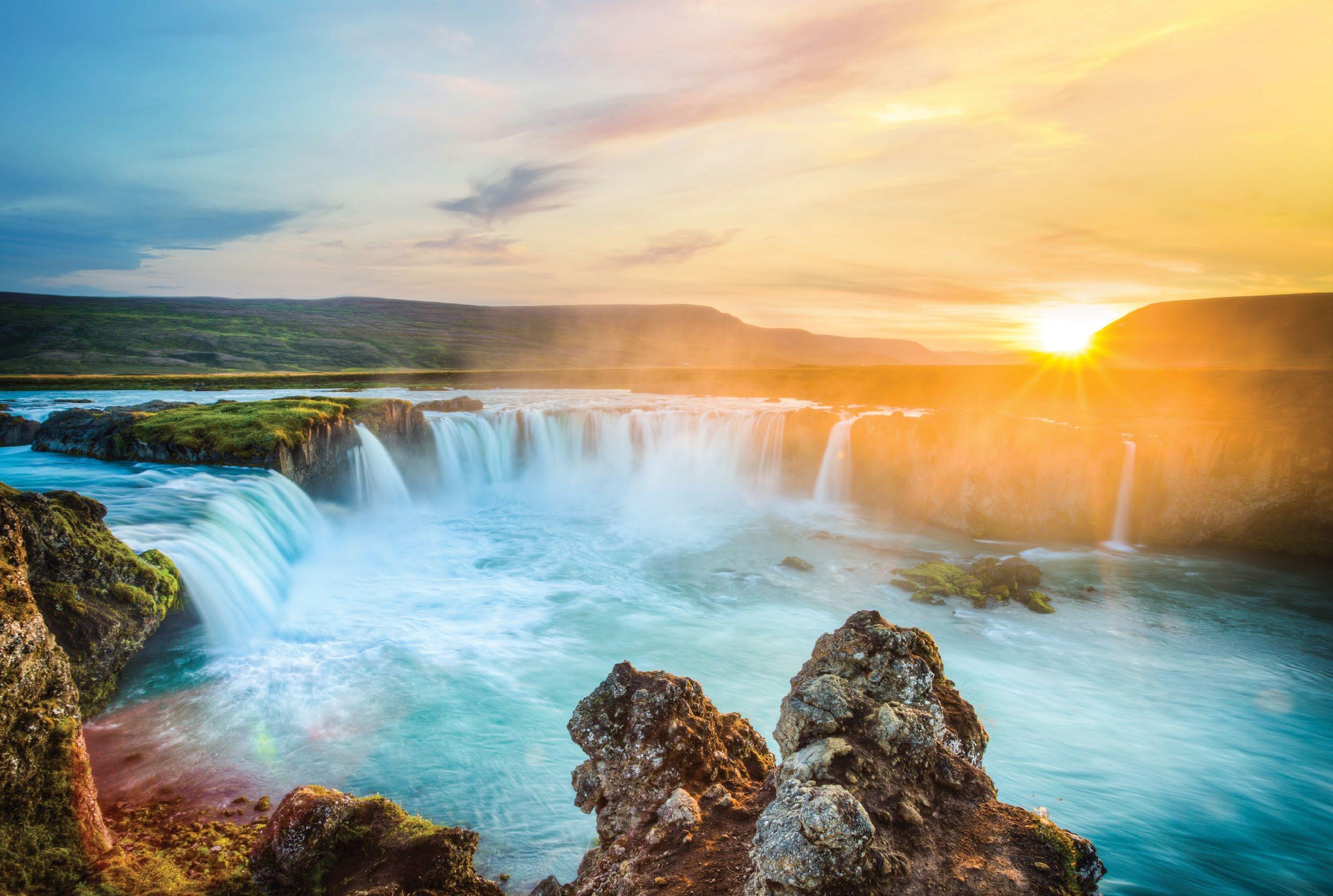
BERGEN TO REYKJAVIK OR VICE VERSA
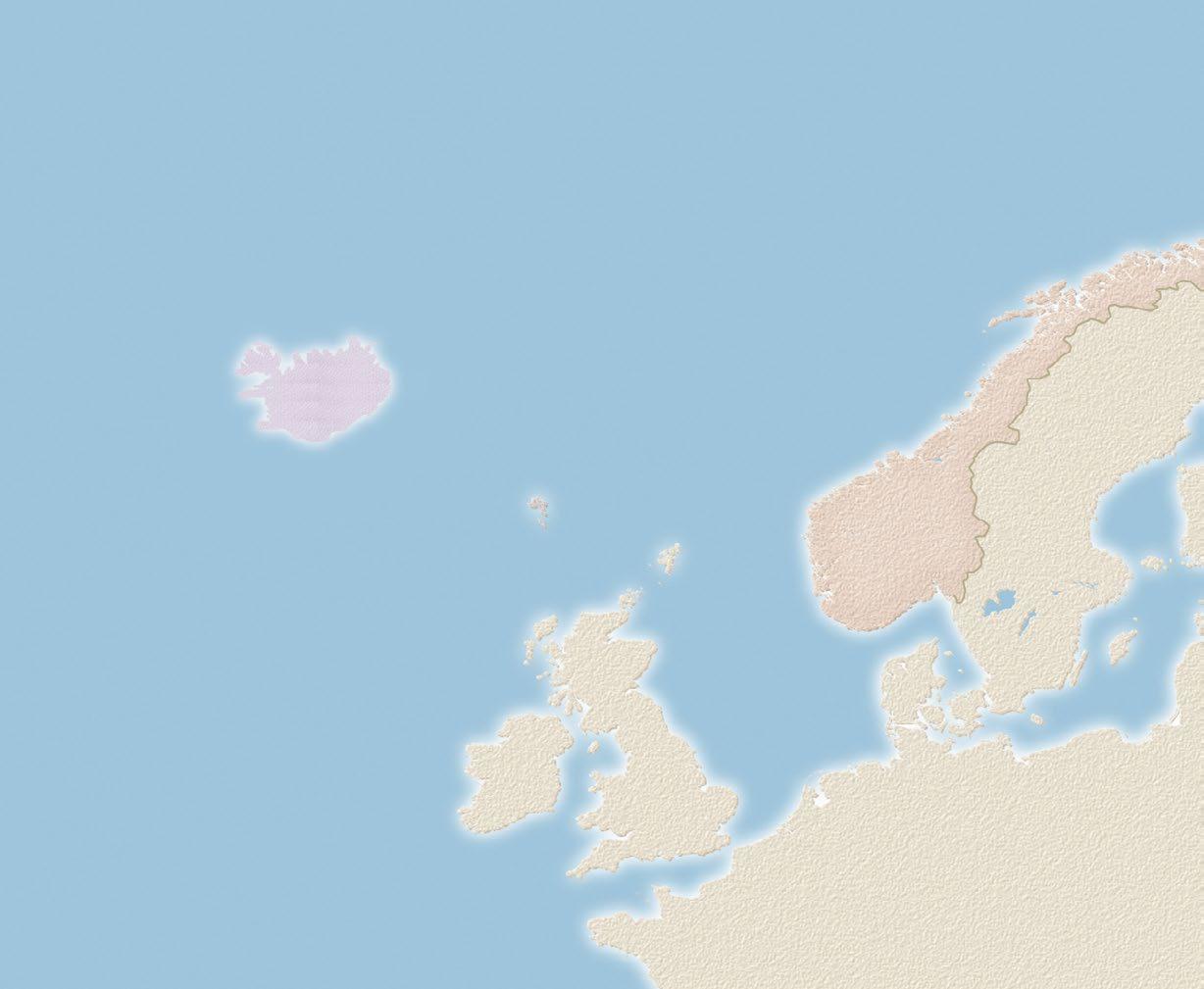
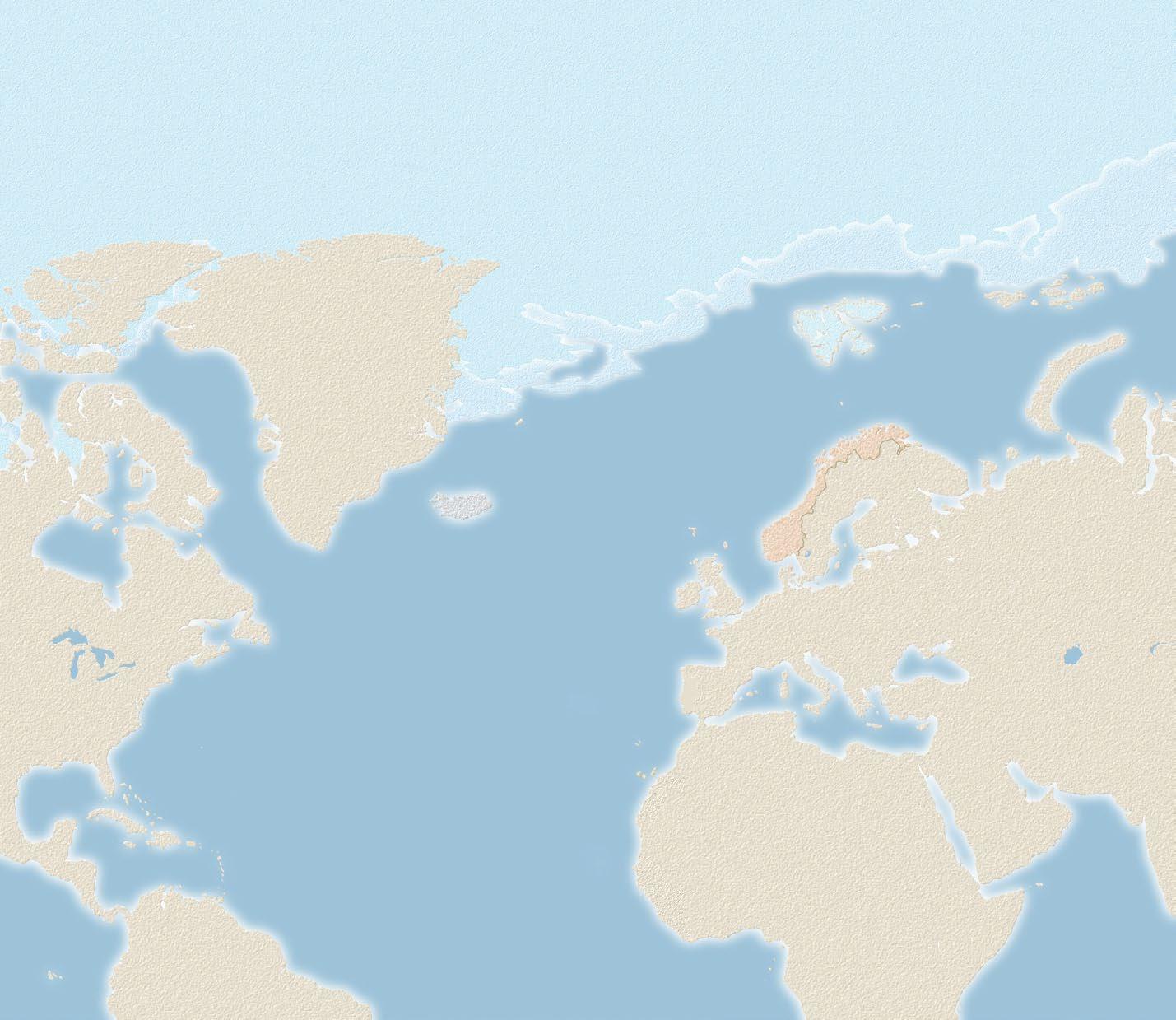
15 DAYS | 2 COUNTRIES | 8 GUIDED TOURS
SET SAIL: MAY, JUL, AUG 2024; MAY–AUG 2025
Discover life in the far north during a voyage across the Arctic Circle and along the distant shores of Norway and Iceland. Marvel at the rugged beauty of Geiranger, visit the former Hanseatic League city of Bergen and admire Honningsvåg’s remote North Cape. Enjoy an overnight stay in Longyearbyen, home to more polar bears than people, and call at Tromsø, Norway’s most northernly city.
13 DAYS | 3 COUNTRIES | 9 GUIDED TOURS SET SAIL: JUL & AUG 2024; JUN, AUG & SEP 2025
Unlock some of the mysteries of the far north in Norway and discover its Viking past. Experience the beauty of Geiranger and the contrasting urban setting of Ålesund. Meet the people who thrive on the Faroe archipelago. Witness the gentle giants of the sea in Iceland’s majestic north, or immerse yourself in tradition and take a dip in a thermal bath.
$9,195PP IN VERANDA STATEROOM UP TO $1,600 PER COUPLE INCLUDES $2,000 FLIGHT CREDIT PER COUPLE
Hygge (pronounced ‘hoo-ga in Danish, ‘hyh-geh’ in Swedish and Norwegian) is the Scandinavian art of happiness, living well, and enjoying each other’s company, and it’s a very easy concept to incoporate into day-to-day living
Although it’s often associated with Denmark, the concept of hygge actually originated in Norway. In all Scandinavian countries, the notion has been part of life since the dawn of time (or so many of them would say anyway). Hygge is best described as the feeling of being content in any particular moment, and it’s something many Scandinavians strive for in life rather than success and wealth. A gathering of friends can be described as hygge, as can a bike ride through fresh Autumn leaves, or reading a book wrapped up nice and warm in front of a roaring fire, or drinking tea from your favourite cup. Hygge is making everyday events special, not necessarily by putting them on show, but by appreciating them in their simplicity.
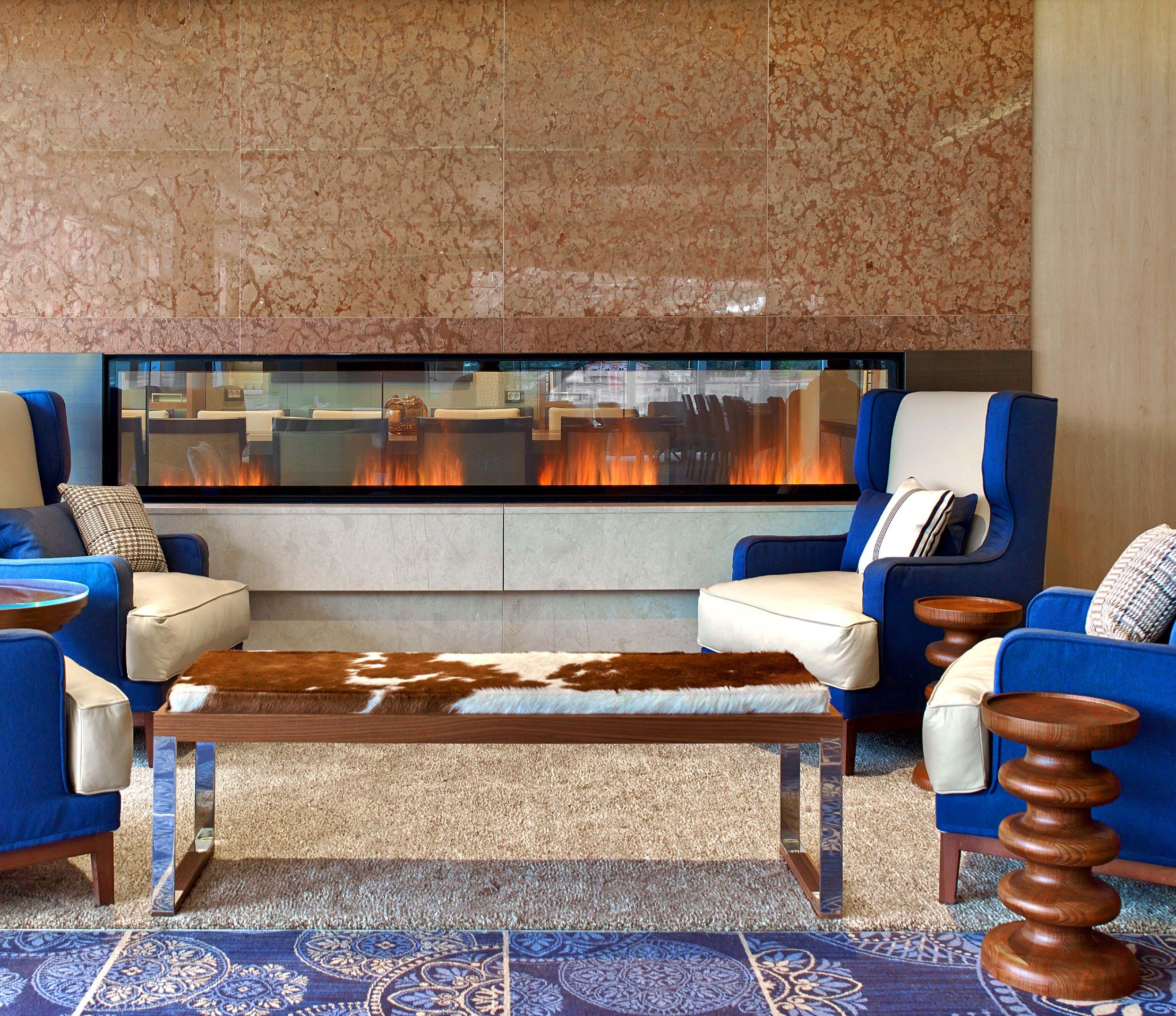
The word hygge is believed to derive from an old Norse word meaning wellbeing. It’s a way of life, all about simple pleasures such as log fires, candlelight and fresh flowers,
which all help to bring light into the darkness of a long Scandinavian winter.
Explore local woods to recharge your batteries and reconnect with the simple things in life. Keep an eye out for wildlife and enjoy the pleasure of breathing in fresh air and trampling on autumn leaves or smelling the fragrance of spring flowers as you walk.
A home with hygge is cozy and homely. Strive to create a warm atmosphere, and any home can exude hygge simply with candles and a soft blanket draped over the sofa. Dress hygge-like in an overside (knitted of course) jumper and scarf (also knitted and oversized). If you are warm and cozy, are enjoying hygge.


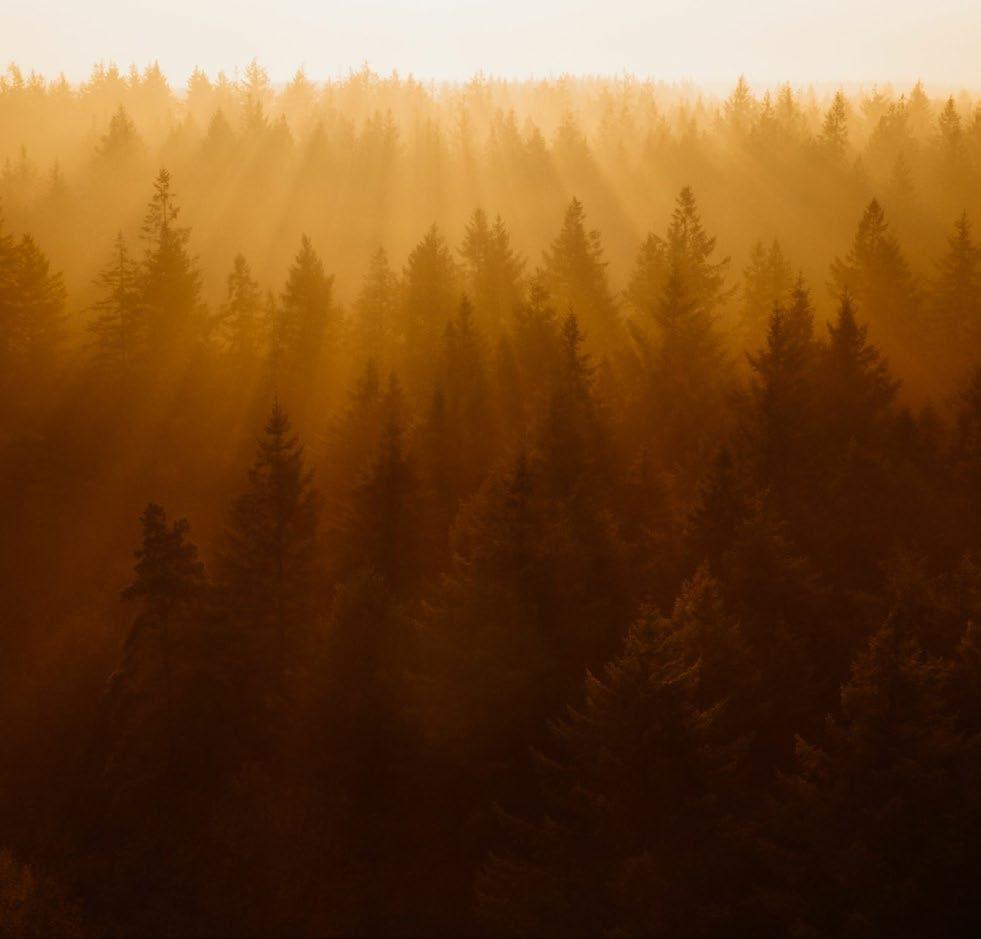
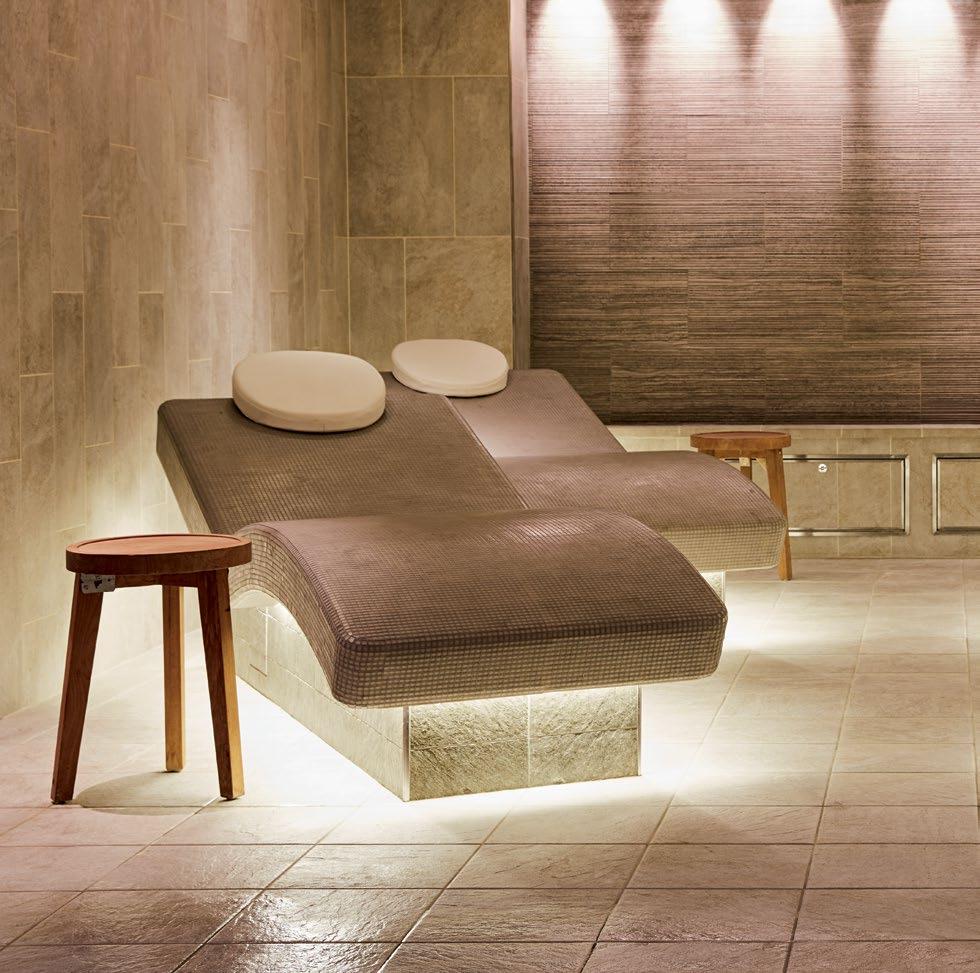


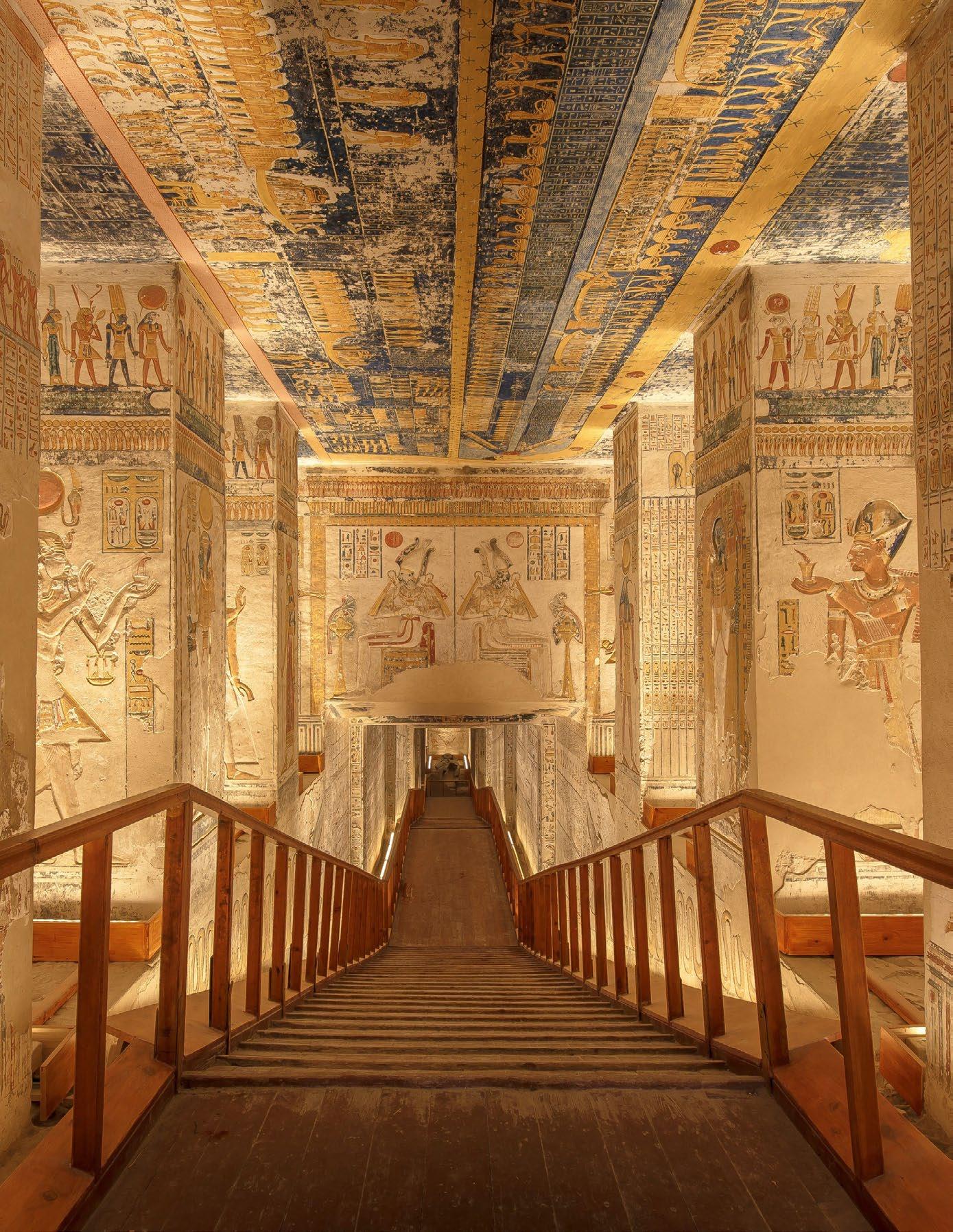
It jumps out at me. The kangaroo hieroglyph, inside the tomb of Ramses III, would only be spotted by an Australian. Among thousands of other inscriptions on the wall, it has never been noticed by our Egyptologist guide, Walid El Bhaouty, in his 30 years of exploring the Valley of the Kings. For the first time this week, he is speechless.
It could also be a wallaby, or more than likely, this ancient anomaly is simply a bad drawing of an animal that did exist in Egypt 3000 years ago. Walid sends my photo of the mysterious creature to another eminent colleague, who is similarly stumped, and says this sighting will make me famous. “She thinks I’m joking but I’m serious,” he tells our small group of Viking cruise passengers.
Significant discoveries, from hundreds of coffins to an entire “lost golden city of Luxor”, occur with astounding regularity in these desert regions. Earlier this year, at Saqqara, near Cairo, archaeologists unearthed five tombs, estimated to be 4200 years old, and a rare complete sarcophagus, believed to belong to Ptah-em-wia, King Ramses II’s treasurer.
Our visit to Saqqara is a brief stop to see its main attraction, the first pyramid ever built by Egyptians, known as the Step Pyramid of Djoser. Following these recent finds, Walid predicts this vast necropolis will become “the new Valley of the Kings” by next year. He mentions another important tomb that was found yesterday. “You’ll hear about it in two or three months,” he teases.
To think that priceless antiquities may be hidden centimetres beneath our feet adds a sense of excitement to every walking tour. Our sponge-like minds absorb endless facts and stories that connect Egypt’s ancient history to these latest breakthroughs, and within days we have learned to recognise the gods and goddesses carved on colourful temple walls.
The Great Pyramid of Giza is the oldest of the Seven Wonders of the Ancient World and the only one still standing. When it appears in view as we drive to the site, everyone starts taking pictures out of the bus window, unable to wait any longer after anticipating this moment for a lifetime.
Dropped off within a two-minute walk of these huge pharaohs’ tombs, we explore the base from every angle and climb upon the lowest limestone blocks that are accessible to tourists. There are no crowd, no queues, but plenty of camels and security guards, including a discreetly armed escort provided to Viking by the government.
Only one person from our group decides to venture inside. The passageway is claustrophobically narrow and hot on this 40C day, and it leads to an empty chamber. We move on to the Great Sphinx, about 1km away, which is very busy by late afternoon. Most people come to pose for the classic photo, nose to nose with the gigantic sculpture, but it’s still an unforgettable spectacle. The souvenir vendors are out in full force; however, our guides do an admirable job of waving them away.
After three days based at the Fairmont Nile City hotel in Cairo, our contingent of 80 guests takes a flight to Luxor to board Viking Osiris. Launched in August, the newest ship on the Nile is a calming haven staffed by local crew, with spacious ensuite cabins and two restaurants.
The decor displays Viking’s signature sleek, Scandi style, and communal areas include a huge shaded sundeck, elegant lounge where passengers converge for ice-cool drinks after a day’s sightseeing, and an indoor-outdoor dining terrace. Wrapping the stern, a curvaceous pool offers respite from the heat.
Docked next to Karnak Temple, our first shore excursion could not be more convenient. Karnak is the largest religious complex in the world and one of the finest examples of ancient Egyptian architecture, constructed and extended over two millennia from 2050 BC until the Roman period. For the first time, restoration works are removing layers of dust and mud from the 134 towering columns, revealing their original colours. It’s one of the many sites that have been impressively restored in the past two years, prompted by a slump in tourism.
At sunset, we visit Luxor Temple, beautifully lit up and accompanied by evocative chanting from a mosque. Then, we are fortunate to stroll along the adjacent Avenue of Sphinxes, which has finally reopened after decades of delays.
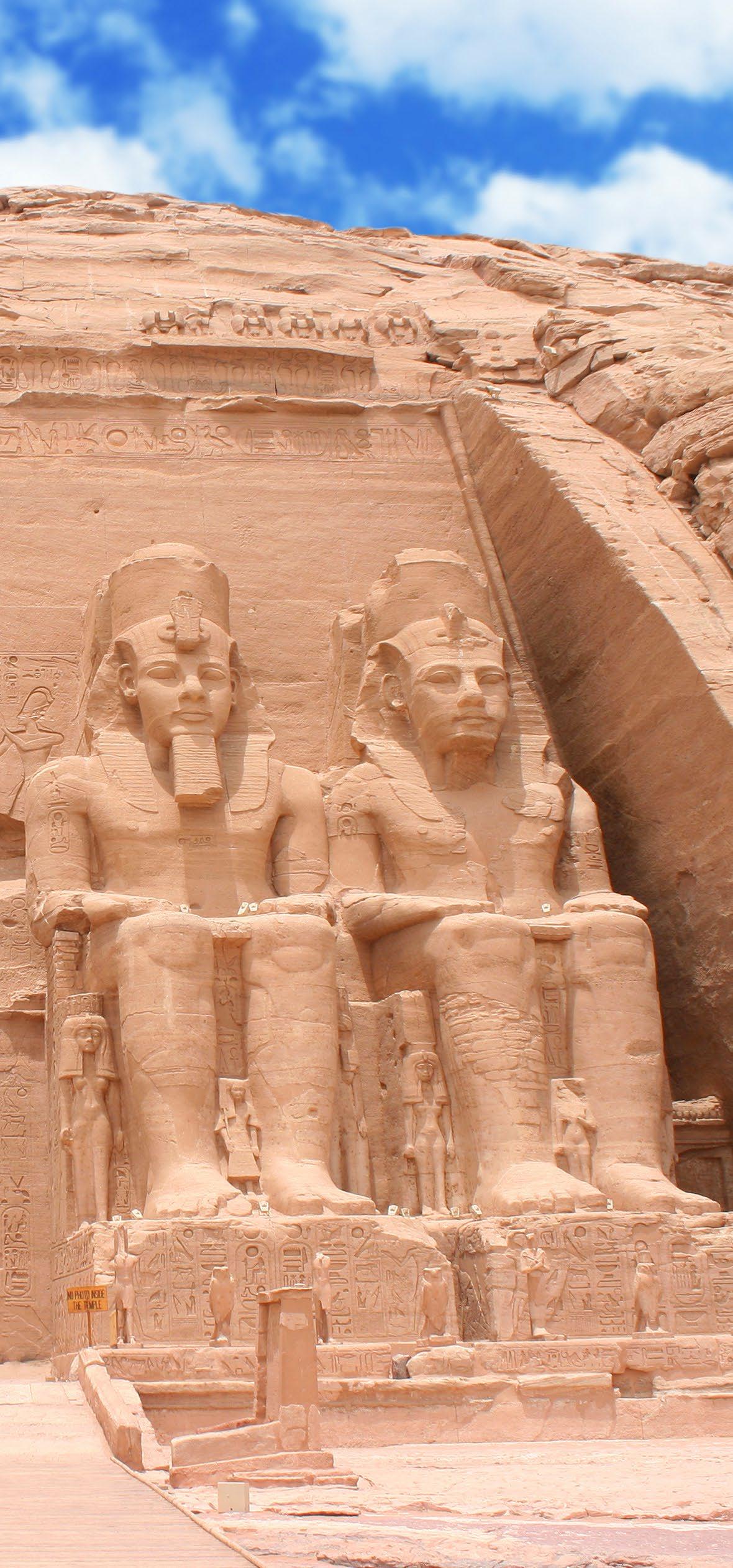
Flanked by more than a thousand statues, the spectacular road was buried under sand until 1949, and efforts to excavate were repeatedly interrupted by political upheaval.
Another site given new life is Tutankhamun’s tomb in the Valley of the Kings. This month marks the 100th anniversary of its discovery by British archaeologist Howard Carter. It was November 26, 1922, when he and his sponsor Lord Carnarvon opened the 3000-year-old tomb, renowned as the only royal burial chamber found intact in modern times. When we descend the steps into the crypt, we find it in exceptional condition. The wall paintings, once covered by centuries of dirt and damage, are clean and vibrant.
The mummy of the young king lies under white fabric in a climate-controlled glass case, his face and feet in full view. In another room is the sarcophagus, which once contained the legendary pharaoh’s three nested coffins. More than 5000 treasures contained in Tut’s tomb have been transferred to the new Grand Egyptian Museum in Giza, which is expected to open in 2023 after several postponements.
The most exquisite tomb is dedicated to Nefertari, in the less-visited Valley of the Queens. Room after room is filled with remarkably well-preserved art in vivid colours and details. Adorning more than 500sqm are scenes from the Book of the Dead that depict Queen Nefertari being guided by gods to the afterlife through ceremonies and tests. Due to the cost of the entry ticket (about $95) and a time limit of 10 minutes a person, fewer tourists flock to this lavish lair, so it’s worth the detour.
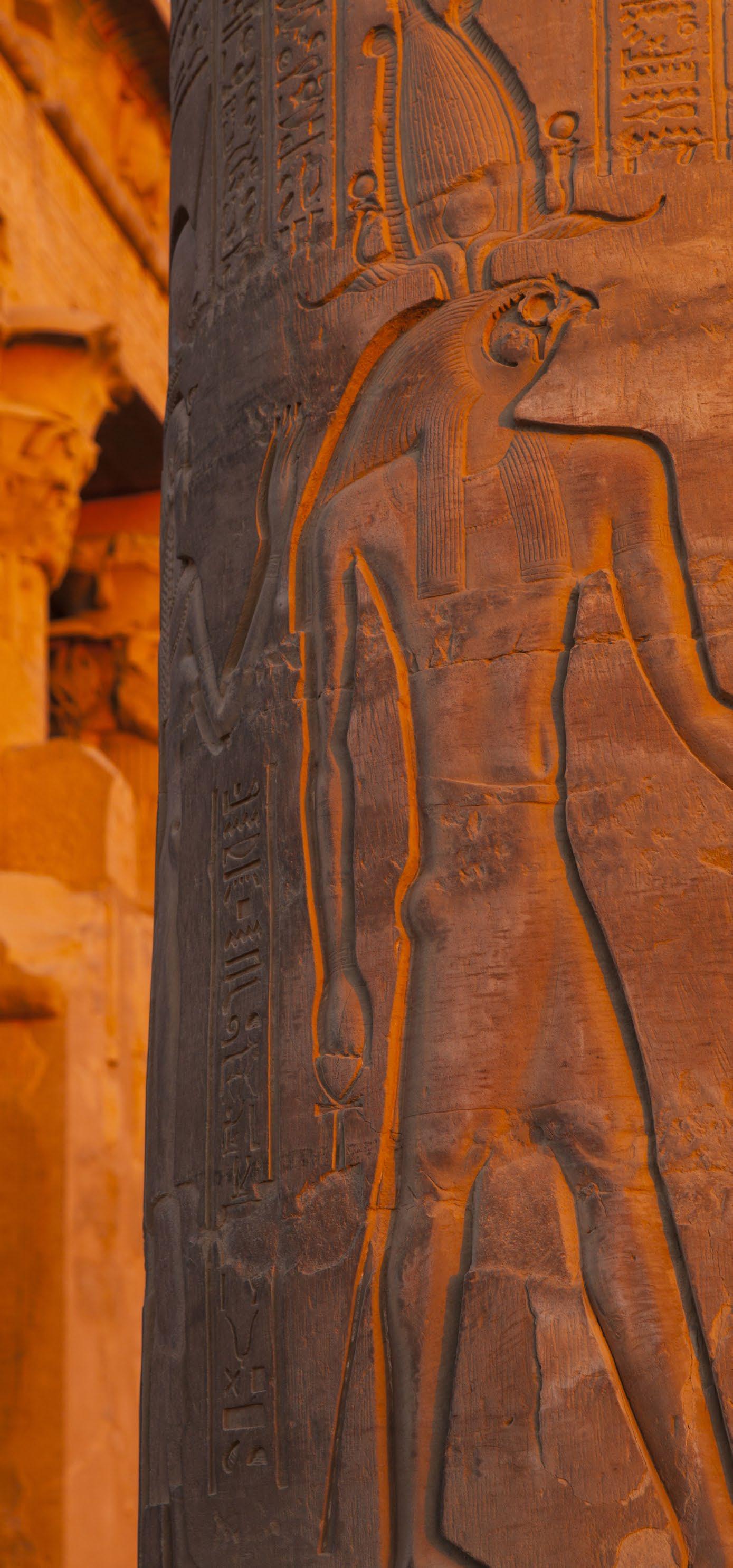
Arriving in Aswan, some passengers take the option of a day trip to Abu Simel. Originally cut into a mountainside, these twin temples were dismantled in 1964 and reassembled, piece by piece, in a less flood-prone location. The UNESCO-led project rescued the complex from the Nile’s rising waters and made way for the Aswan High Dam. Other guests spend the day visiting the dam before sailing down the river on a traditional felucca.
To travel back in time, cruise passengers need only observe the passing sights of the Nile, which continues to support communities along its fertile banks. Farmers and fishermen carry on the daily grind, while children play in the water and wave at boats.
Date palms line the shores, like the idyllic scene of a tropical island. Beyond the rich soil is the Sahara, with mountains rising in the south and the Mediterranean Sea to the north. The ever-changing view is best enjoyed from the stern of Viking Osiris, with feet dangling in the pool, or in a lounge on the sun deck.
One morning, vendors in rowboats appear alongside our slowly sailing ship to sell scarves, beach towels and tablecloths. Much to our amusement, they throw us their goods with the precision of professional American footballers. Passengers catch the items, haggle on the price, and then place cash in a plastic bag to toss back down. Another fun event is the Egyptian night, when we dress up and dine on a banquet of local cuisine and wines before a performance by Nubian dancers.
At the end of the week, Viking Osiris returns to Luxor for our flight back to Cairo, where we see the new exhibition of 22 royal mummies at the National Museum of Egyptian Civilisation.
Pharaohs and wives are displayed in an underground hall, with X-rays showing what lies beneath their wrappings. Despite these advances in technology, archaeology and restoration, so many of Egypt’s secrets remain shrouded in mystery – much like the unsolved case of the random kangaroo.
Viking has operated Nile cruises since 2004, but the new 82-passenger Viking Osiris is the first Egypt-based ship owned and operated by the company. Suites have balconies, queen beds, walk-in wardrobes, living room and bathroom with shower and bathtub.
This article was originally published in The Australian on Saturday 19 November 2022.
GETTING THERE: The 12-day Pharaohs & Pyramids cruisetour roundtrip from Cairo, starts from $9,595pp in Standard stateroom

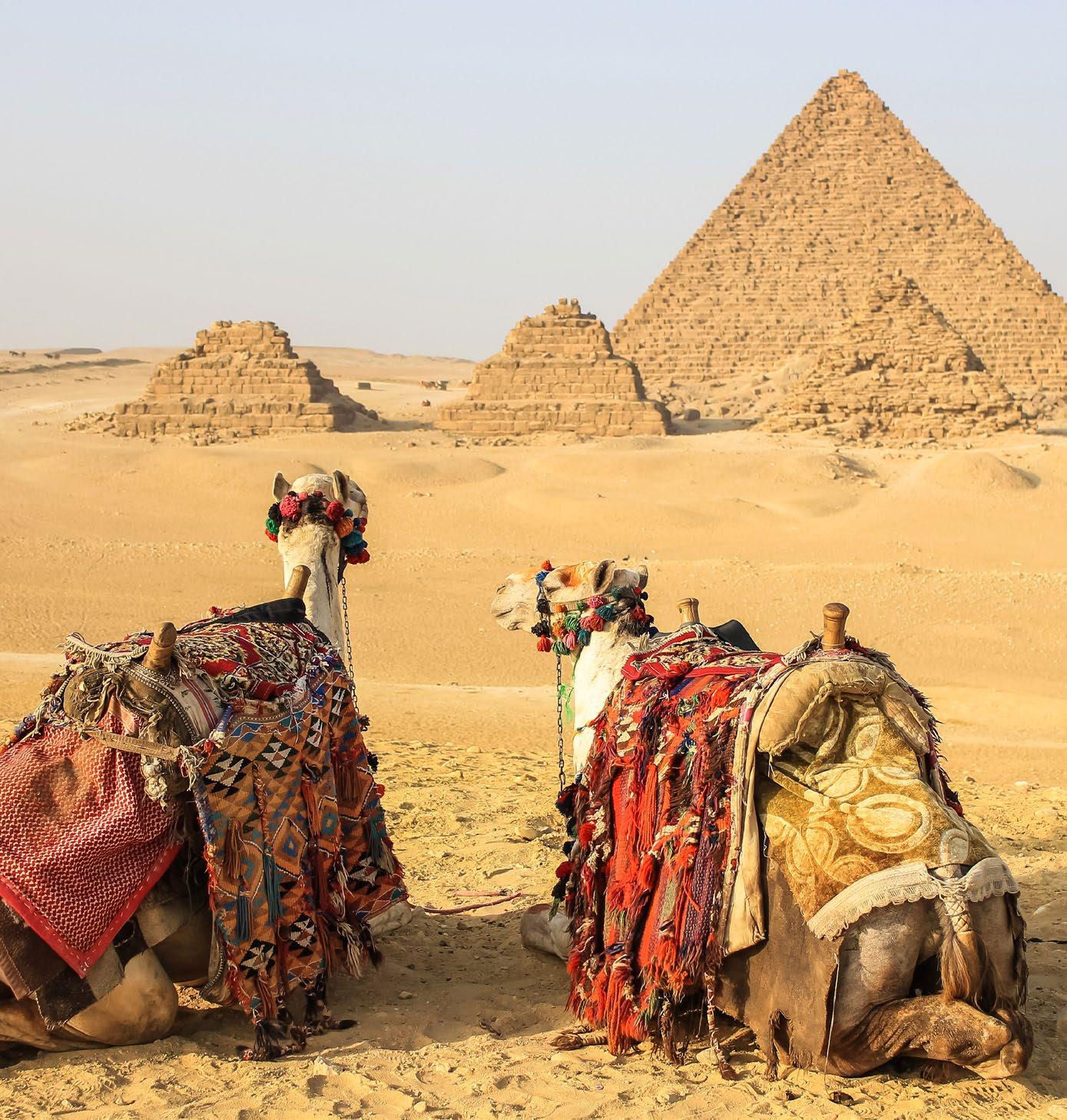
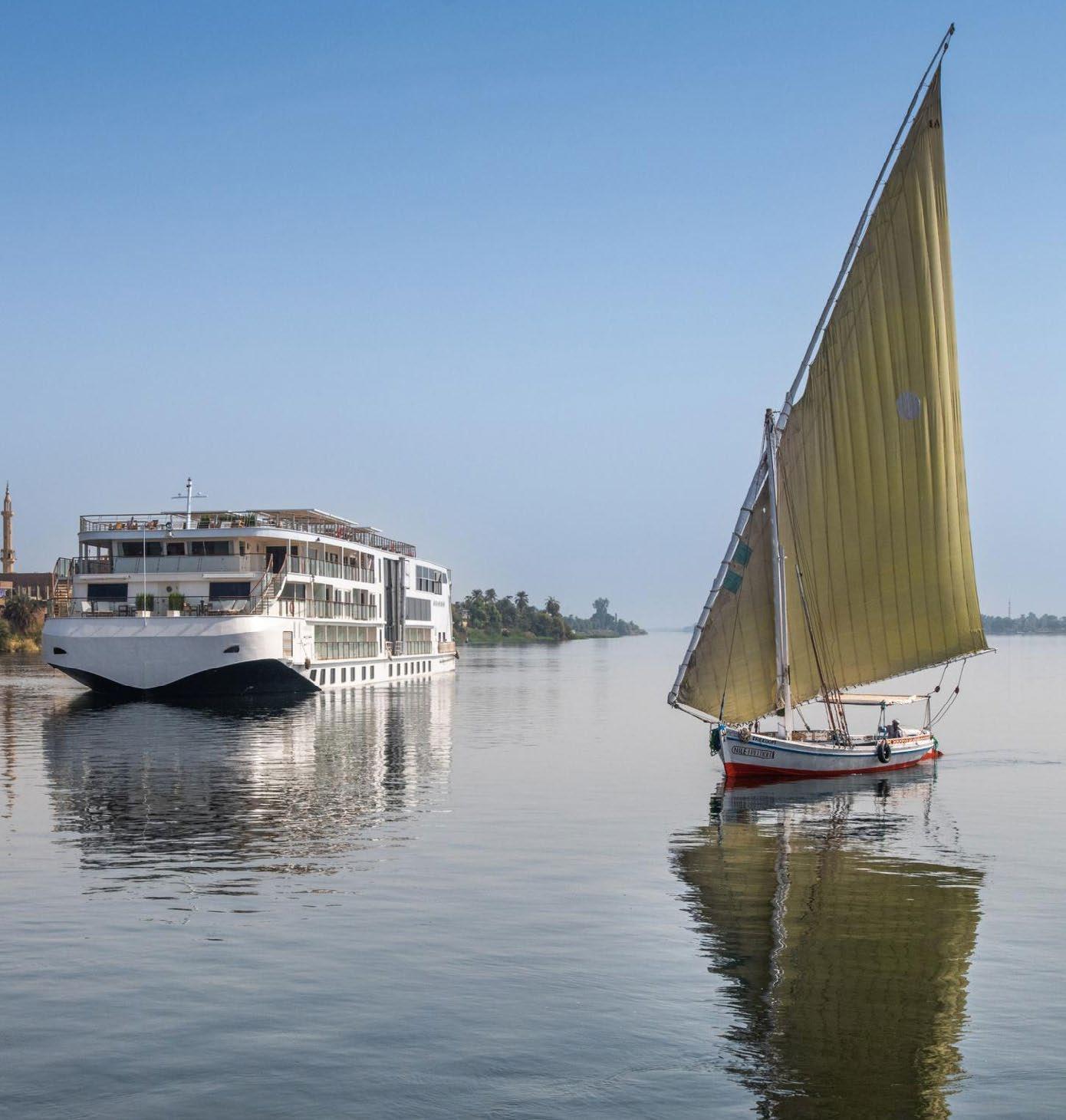
We’ve rounded up the highlights of this ancient land, a place where the remains of an ancient civilisation blend with the hustle and bustle of modern-day life
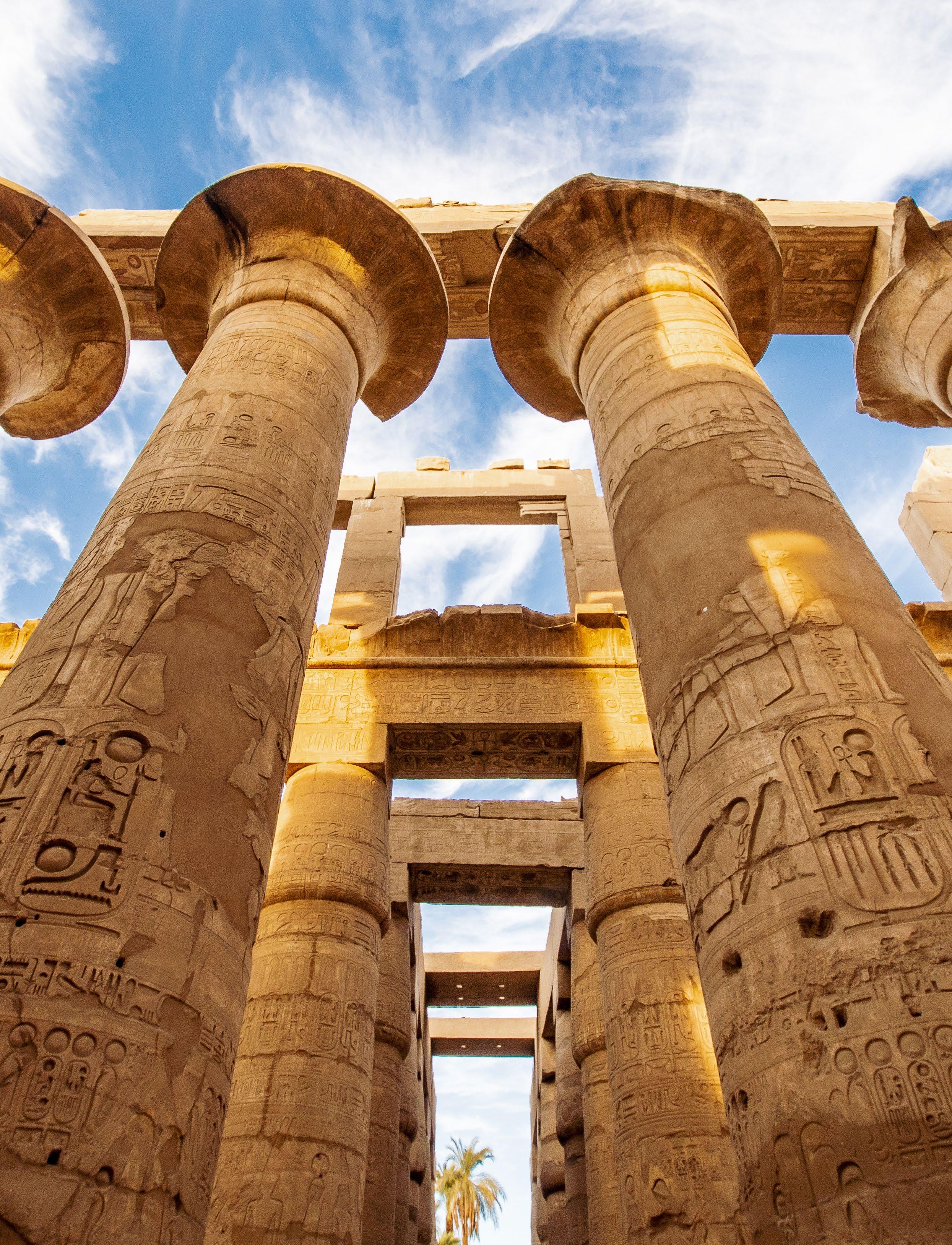
The medieval Islamic-era fortification in Cairo is perched on a hill that looms over the city. Its spectacular dome and minarets shoot up to dominate the capital city’s skyline while its imposing gateways and high defending walls show its purpose during a time of warfare. The citadel is one of Cairo’s main attractions and one of the most popular non-pharaonic monuments – along with the Mohamed Ali Mosque – it today houses various museums, and is the most prominent and photographed spot within the complex.
The complex of Dendera is one of Egypt’s best-preserved sites and is situated on the west bank of the Nile. It dates all the way back to the mid-4th century BC and is thought to be a shrine to the goddess of love, Hathor. Inside, the temple boasts examples of Ptolemaic Egyptian art, and a replica of the Dendera Zodiac – a sculpture from the Greco-Roman period that charts stars in the ancient sky.
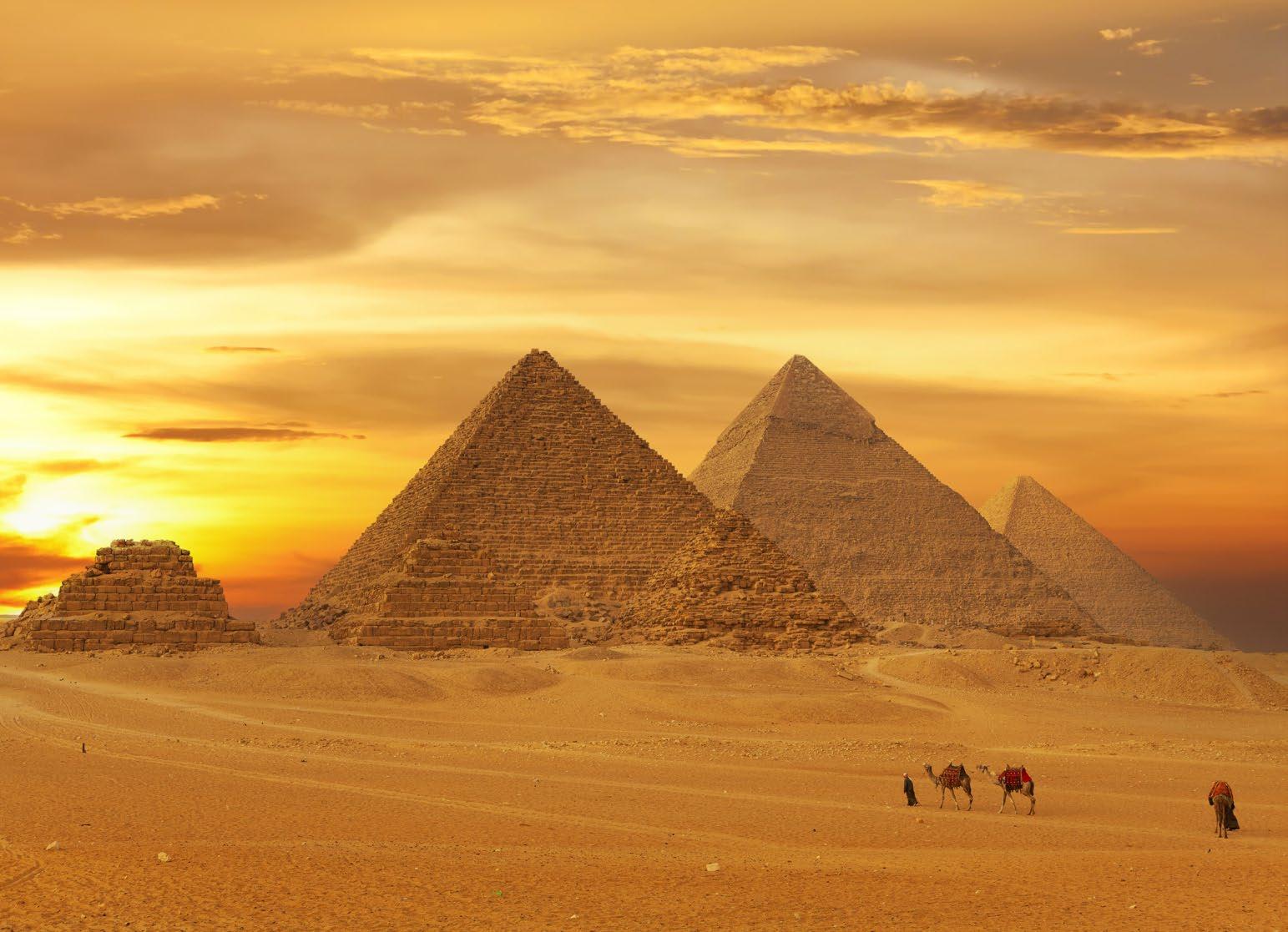
Egypt’s pyramids are its most iconic treasures. Discover the necropolis of Sakkara, thought to be the first pyramid built in ancient Egypt. At Giza Plateau, the most spectacular are the Great Pyramids of Khufu, Khafre and Menkaure. Also on the list is Abu al-Hol – the Sphinx that guards the entrance to the tombs.
This striking temple sits on the fringes of the modern town of Luxor. Known as the Southern Sanctuary, the interiors boast ancient hieroglyphs telling of the festival of Opet which was held annually in ancient Egypt. Visit the Great Court of Ramses II, whose walls are adorned with the names and titles of his 17 sons.
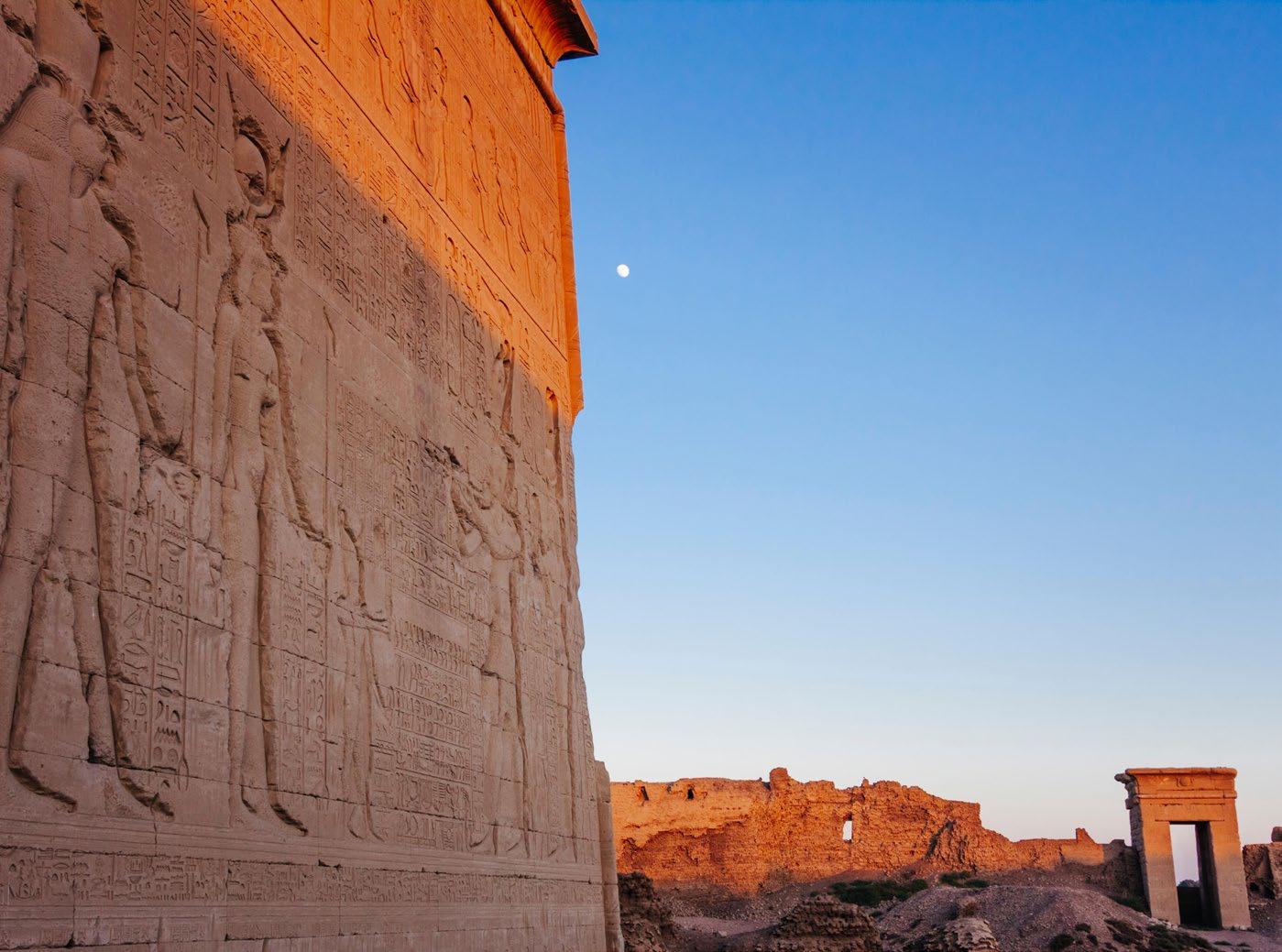
Founded around 280 BC, the Temples of Philae were an important centre for the cult of Isis, and later were of great significance to the Greeks and Romans. The temples are now a UNESCO site, and have been moved, block by block, to Agilka Island. Discover the sites of the temples, staying for the evening to catch the light show that creates a dramatic kaleidoscope of light and shadow, bringing the figures displayed on the walls to life.
Egypt’s pulsating souks are feasts for all the senses where you’ll find everything from crafts and intricate jewellery to aromatic and unusual spices and foods. A trip to Cairo isn’t complete without a visit to the famous Khan El-Khalili market where visitors wander its narrow walkways on a quest for that ultimate souvenir. The souk sits on the site of what was once an ancient trade route and so today’s atmosphere isn’t unlike what it was during the times of the Berbers and Turks who would trade after journeying on camelback.

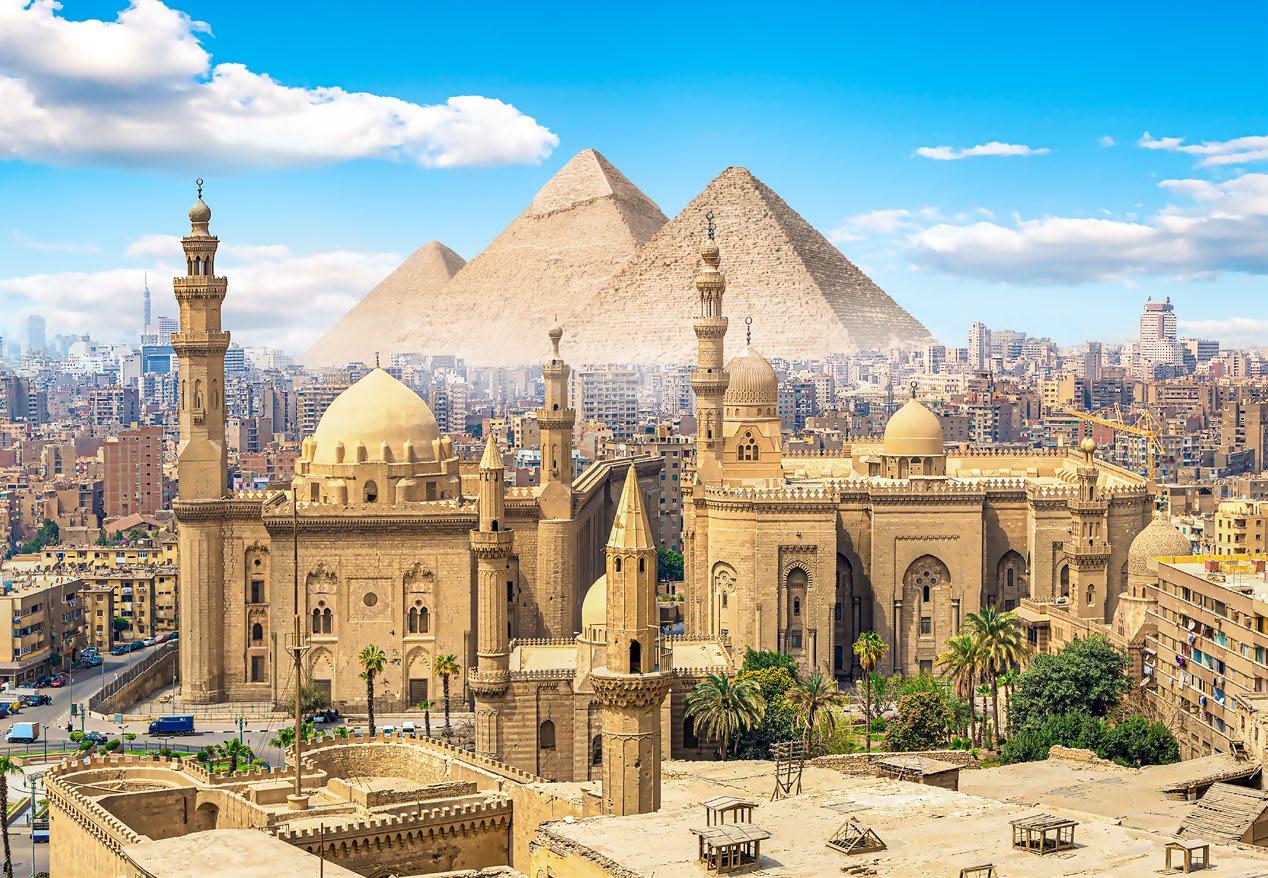
Discover the narrow alleyways of Coptic Cairo – the final stage of ancient Egypt that can be characterised by its Christian faith. Visit the Christian Quarter of Cairo, the Coptic Museum, which holds the largest collection of Christian artifacts in the world and is built on the ruins of the Roman Babylon Fort. Old Cairo is also home to the Ben Ezra Synagogue, originally a Coptic church until it was sold to the Jewish community.
A charming town off the beaten track that offers its own fascinating quirks. Along the waterfront sit quintessential 19th-century houses with traditional mashrabiya – wooden lattice screens. Esna was once the site of Latopolis, and its ancient temple remains, devoted to the guardian of the source of the Nile, Khnum. The temple is thought to be one of the last built by the Egyptians, and it is here visitors will find the last-known hieroglyphic inscriptions recorded by the Roman emperor Dios in 250AD. Towering columns are still adorned with intricate carvings that tell Khnum’s story.
This particular temple was built in Edfu, on the west bank of t he Nile, during the Ptolemaic Dynasty. Totally submerged by desert sands for two centuries, the temple remains one of the best preserved of all Egypt’s temples. A shrine to the falcon-headed god of light, the entrance is flanked by two falcon statues. Inside, you’ll spot a colonnad ed courtyard, hieroglyphics and rows of lotus columns. The stairway to the roof was once used in the annual New Year’s festival when priests carried a statue of Horus so it could be revitalised by the year’s first sun.
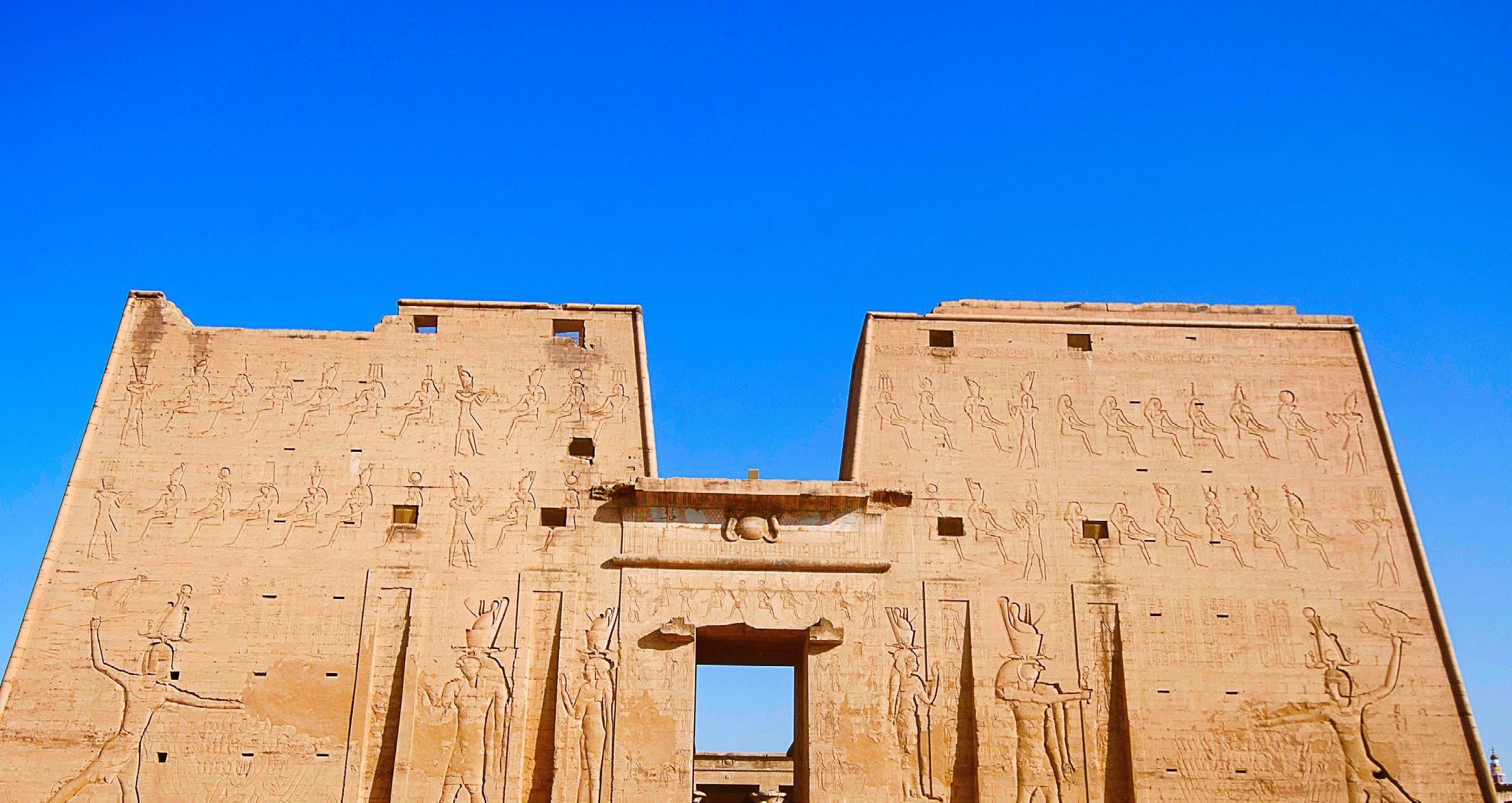
The Aswan High Dam is a masterpiece of engineering that protects the Nile’s surrounding fields. A modern undertaking finalised in the 1960s, its damming established the 300-mile-long Lake Nassar which now provides electricity and water for all Egypt.
It's little wonder so much has been written about the ancient city of Sybiz luxol. Everywhere you look, you are bound to be inspired to majestic architecture to landscapes and what can be a different era. Also, the shopping and bargain hunters will find their match in the Old Market, where you can pick up unusual souvenirs and clothes or fabrics made from renowned Egyptian cotton. Wherever you seek this ancient city will have something for every type of explorer, visit one of the most breathtaking temples in Luxor, the spiritual capital of Egypt for 15 centuries. The Temple of Luxor is a magnificent, ancient Egyptian complex that we built in approximately 1400 BC by Amenhotep three, and Rancis to enter through its massive pylons. As you explore your guide will interpret the ancient hieroglyphs, some of which illustrate the extravagant OPEC festival held to ensure a good harvest. You will also see remains of the Avenue of the sphinxes which links works or to Carnac.
Beyond was the Great Court of Rancis to whose walls are adorned with the names and titles of his 17 sons in 1989. During the period of restoration, a case of 26 statues was found here, very high priests in Roman times.
Visit the Temple of Karnak, among the world's largest ancient temple complexes. Marvel at its great Hypostyle Hall, a forest of 136 ancient columns that once supported a towering ceiling, and its huge sacred lake. This massive complex, embellished over centuries by every major pharaoh, could fit the equivalent of 10 cathedrals within its walls. After time here, continue to the Luxor Heritage Centre, the aim of which is to enlighten visitors on Egypt's long and rich history. Explore the centre's interactive showcase documenting the country's history from ancient times to the present on nine connected flat-screen televisions, offering a 180-degree panorama. Tour the Forsan al-Sama’a Hall, with its exhibits featuring astrological equipment and the 3D Show Hall, home to selected archaeological pieces from the Pharaonic, Coptic and Islamic eras. Afterwards visit the library which houses more than 10,000 books on Egyptian history in several languages and features a dedicated map room.

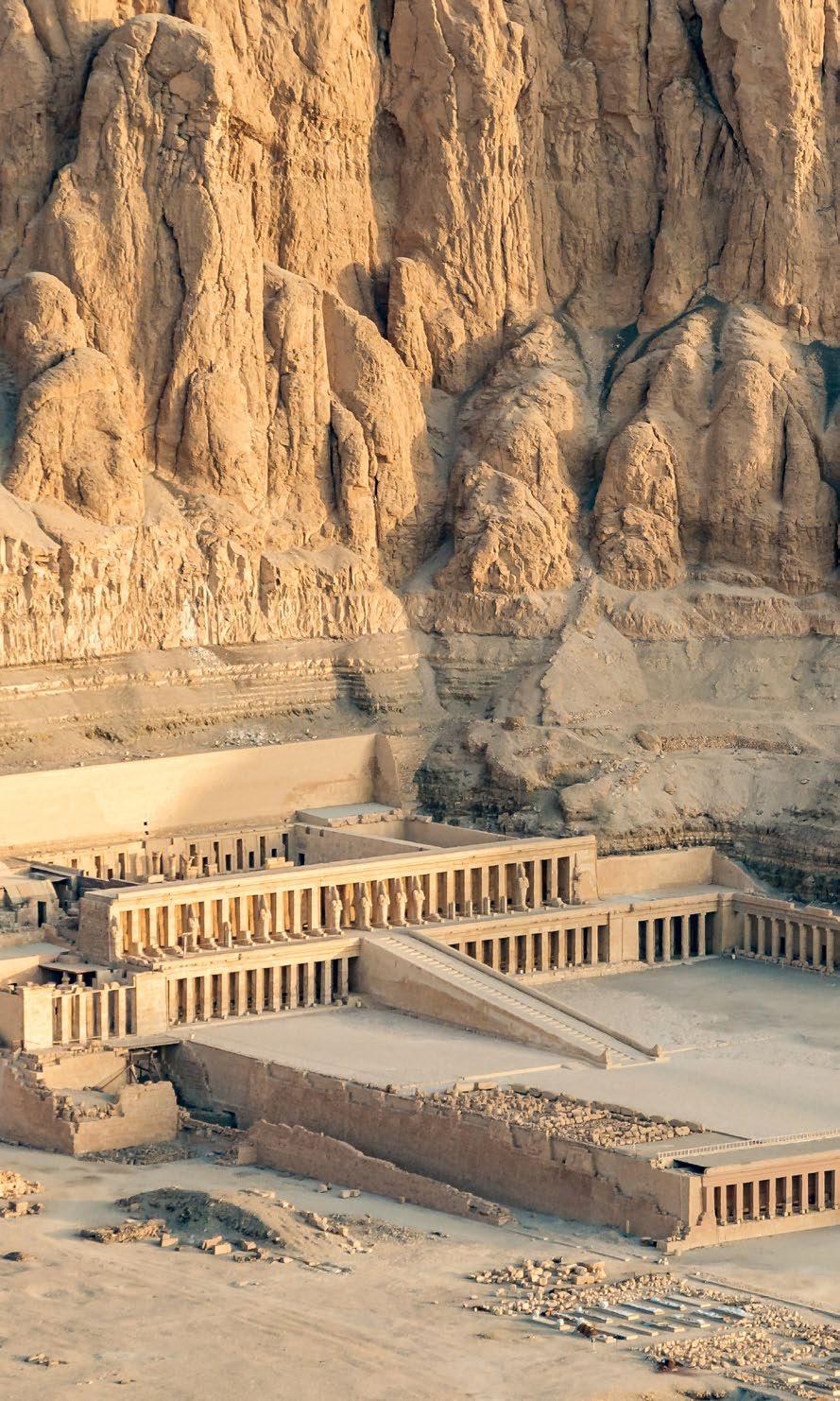
Once you've explored the city to your heart's content, be sure to make your way back to your ship for a delicious dinner and entertainment featuring regional music.
 From top left Market in Luxor, The Temple of Karnak, The Valley of the Kings.
From top left Market in Luxor, The Temple of Karnak, The Valley of the Kings.
CAIRO TO CAIRO
12 DAYS | 1 COUNTRY | 11 GUIDED TOURS
SET SAIL: JAN–MAY, AUG–DEC 2024; 2025
Uncover the ancient secrets of Egypt amid the welcoming culture of today. See the pyramids from astride a majestic camel. Explore the Temple of Karnak’s 136 soaring pillars. Visit Queen Nefertari’s tomb in the Valley of the Kings. Skim the waters of the Nile by traditional felucca. Enjoy the fragrances of Aswan’s spice market. Join our expert Egyptologists on a 12-day cruisetour through Egypt on board our modern Nile ships, owned and operated by Viking.
FROM $9,595PP IN STANDARD STATEROOM SAVE UP TO $2,000 PER COUPLE
Day 10
Day 11-12
CAIRO, EGYPT
Admire the Sakkara Step Pyramid, and in Giza, witness the Great Pyramids and Great Sphinx.
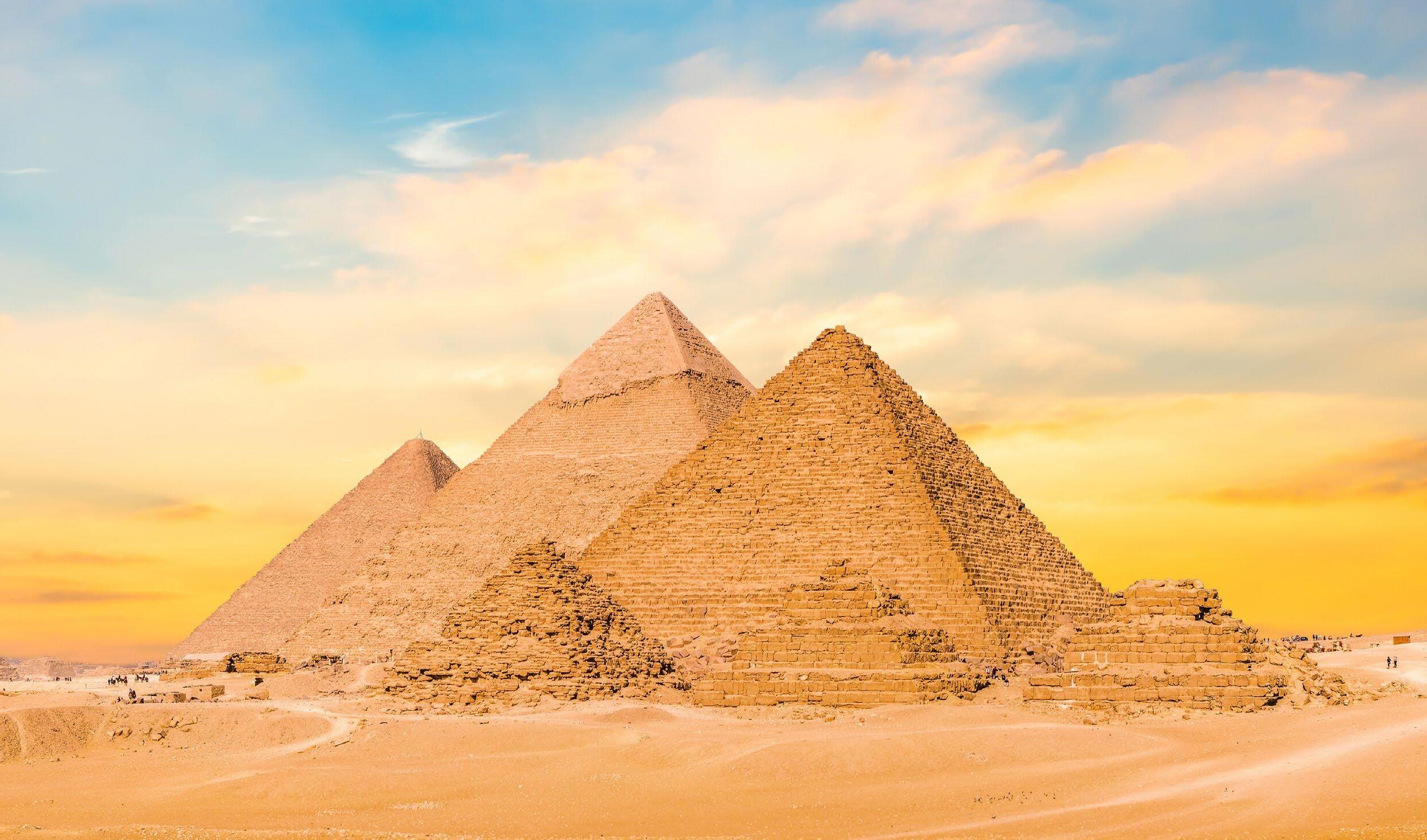
LUXOR, EGYPT
Walk among the monumental peristyles and obelisks at the Temples of Luxor and Karnak.
QENA, EGYPT
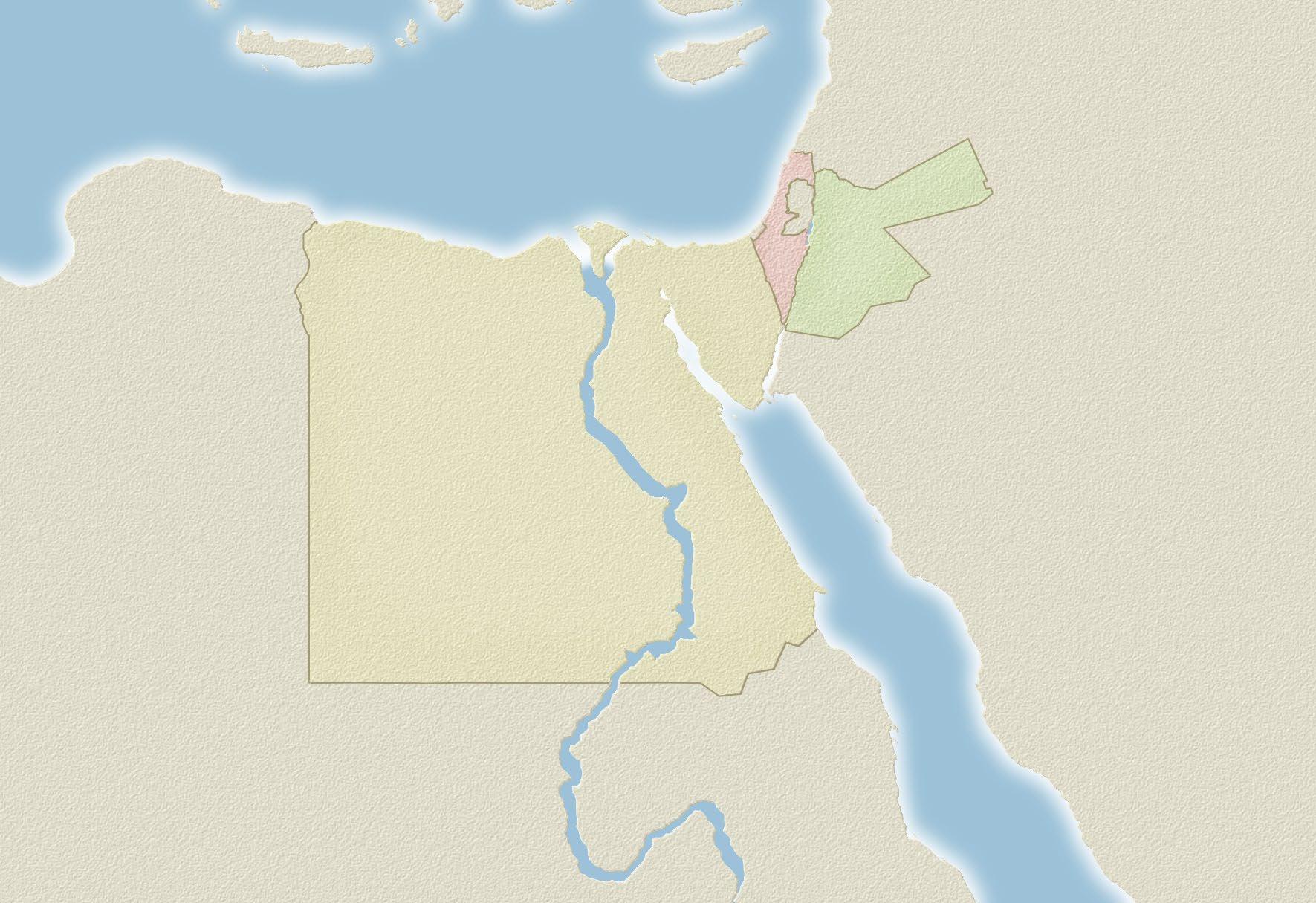
View columns and hieroglyphics at the Dendera Temple complex, set on the Nile’s west bank.
LUXOR, EGYPT
See the Valley of the Kings, Queen Nefertari’s tomb and Queen Hatshepsut’s mortuary temple.
ESNA, EGYPT
Stroll the Temple of Khnum’s well-preserved Hypostyle Hall, with its intricate columns.
ASWAN, EGYPT
Meet locals in a Nubian village, explore the Temples of Philae and discover how papyrus is made. Encounter Kom Ombo Temple, dedicated to two gods, with both sides being identical.
EDFU, EGYPT
Discover the ancient Temple of Horus and see the multiple statues of its namesake falcon god.
CAIRO, EGYPT
Explore the city of ancient monuments, many of which have stood for thousands of years.
If you recognise the first line of the French children’s rhyme that commemorates the bridge at Avignon, you may remember the chorus is ‘On y danser,’ which means ‘They are dancing.’ You will certainly want to dance for joy several times during this informative journey down the Rhône on a trip that awakens the senses, feeds the soul – and stomach too. I was fortunate to spend a week in October on the Lyon and Provence trip in Southern France. The trip was full of everything I would expect from Viking and an all-consuming experience.
My trip began in Lyon – France’s third largest city – which is a few hours’ drive to the French Alps. Lyon was founded by the Romans in 43 BC who built a military base high on the hill above the town. The excursion on the morning of the second day included a drive up past the Roman ruins of two amphitheatres and forum and on to the Church of Notre Dame de Fourvière. The church is a beautifully restored Basilica filled with intricate, gilded mosaics floor to ceiling which are dedicated to the Virgin Mary and are illuminated by the sunlight filtered by the magnificent, stained windows. The church was built with public funds after the ‘miracle’ that rescued Lyon from the invasion of the Prussian army in the 1870 when the locals’ fervent prayers to be saved were answered.
A statue of Pope John Paul II, stands directly in front of the Church, marking his visit in 1997. Standing adjacent to the church and providing a stark contrast of the old and new is another Lyon landmark, a replica of the Eiffel Tower’s topmost section. ‘La Tour Métallique’ was previously a restaurant but is now a communication tower. All along the promenade, linking the church and the tower, there is an amazing panoramic view of Lyon and its two rivers. It is possible to imagine the passing of two thousand years of history laid out below as the Romans firstly built down by the banks
of the Rhône and Saône and then in subsequent centuries Lyon expanded across both rivers.
The second part of the tour descended into an older part of the town where a walking tour directed me through the cobbled streets, past the quaint shops selling pastries, silk scarfs, lavender soaps and into the secret passageways that are concealed behind closed doors. Originally, they were built and used by the 19th Century Lyonnaise silk weavers ‘canuts’ to keep their bolts of silk dry on the way to market. There is an estimated 500 of these ‘traboules’ but only around 43 are open for public use today with the rest remaining for private use by residents. Stepping inside a secret passage I walked through a hidden internal courtyard into the building which offered a tableau vivant of the Lyonnaise at home, at work or in a café, which felt almost intrusive. Some traboules pass through and under the building to arrive in a completely different street. Lyonnaise families will bring their children at the weekend and make a game of finding the doors and secret passageways – what a wonderful pastime to create an appetite for lunch!
During the afternoon’s onboard lecture I heard about Lyon’s complicated history of resistance and loss during the Second World War. About 20 percent of the resistance were women and their bravery led to women being able to vote in France for the first time.
Further down the Rhône, I visited the town of Vienne, surrounded by steep hills and one of the oldest cities in France, it was founded by Romans under Pontius Pilate in 121 BC. It is rich in Roman ruins which seem to appear on every street and around which the modern city has grown up incorporating parts of the ruins into new buildings. Perched above the centre is the remains of the Roman Theatre, which is still used for music festivals today.
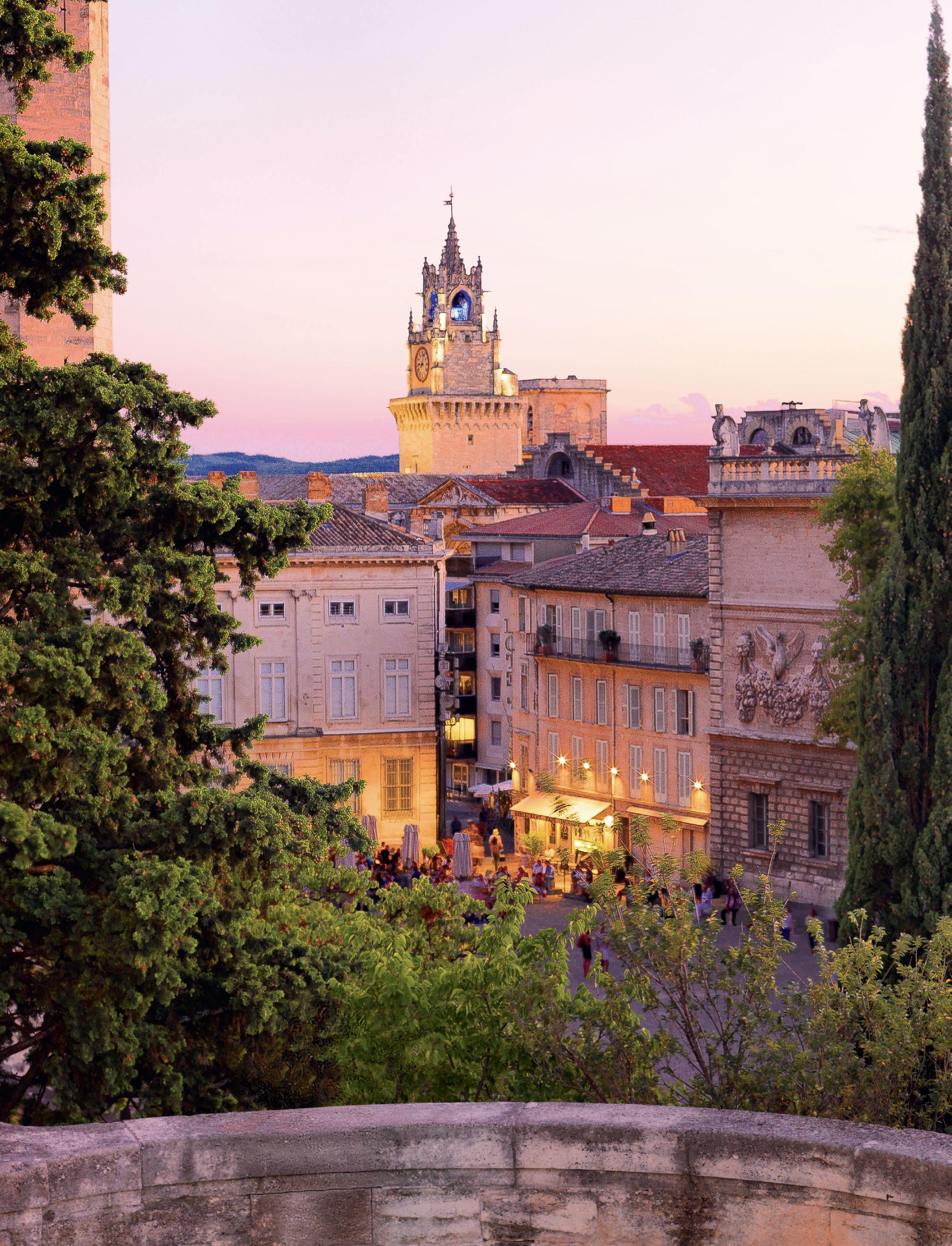
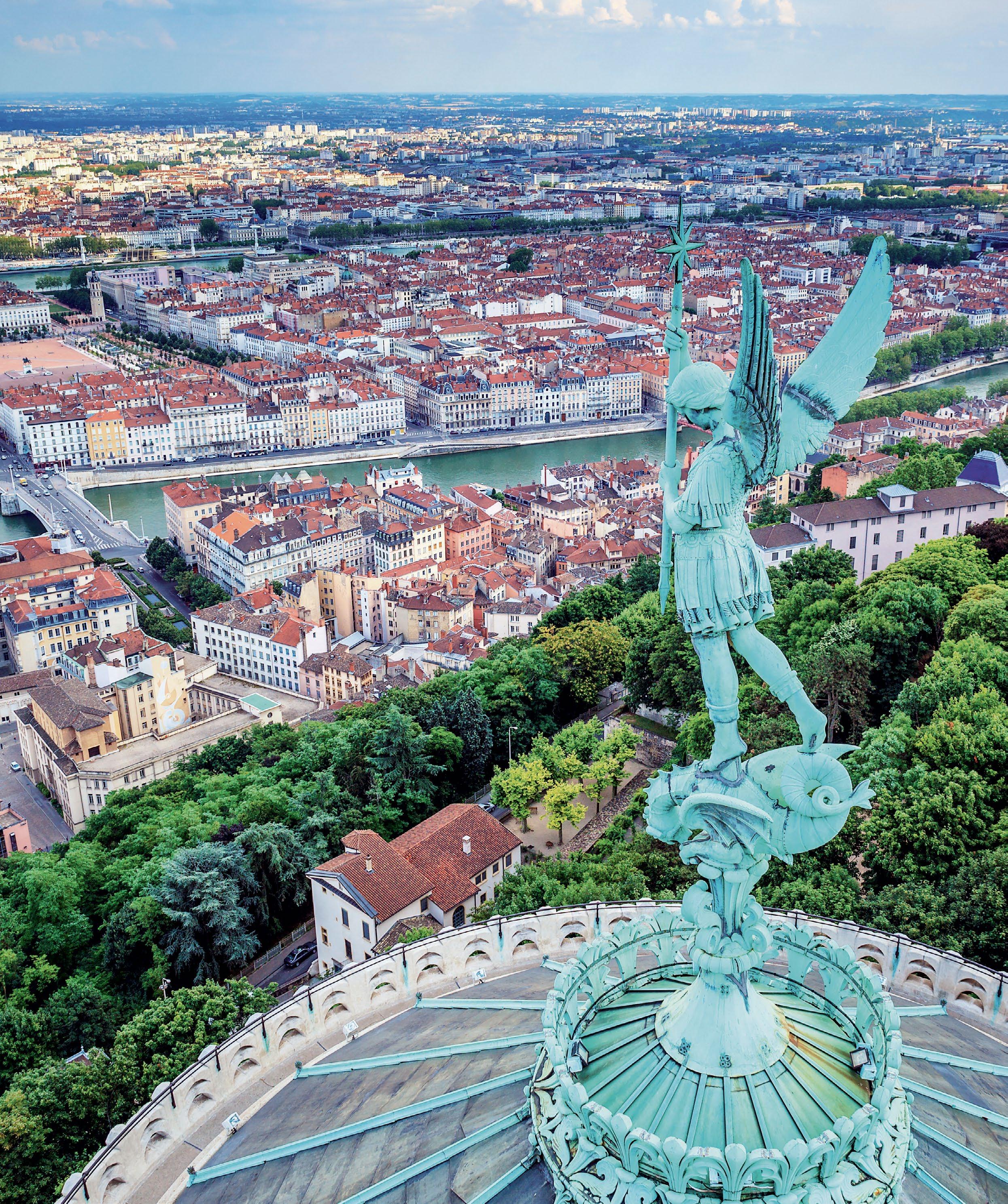
The included walking tour led me to view the old town square where a restored temple to the first Emperor of Rome, Augustus, and his wife Livia, dominates the surrounding buildings and remains marvellously intact. It even survived conversion to a Christian church in the 5th Century.
Arriving at Viviers, known for its well-preserved medieval town, I had the opportunity for a night tour which was to take guests up the steep cobbled streets up to the top of the hill for a panoramic view, after another delicious three-course dinner with wine earlier that evening onboard Viking Helmad. Our guide, Frances, had lived in the town for over thirty years and had inherited her house from her aunt. She was one of around 32 residents who lived at the top of the hill near the 12th century St Vincent, the smallest active cathedral in France. The walking tour began with a stroll along a lovely, tree-lined boulevard which was lit with the orange glow of lamplight. It was a quiet and eery night which gave the city centre a sense of timelessness. I walked through a narrow street which had been the old Jewish quarter of the town. Viviers had been one of the few towns which had shown tolerance to its Jewish residents in renaissance times. I passed into the medieval old part of the town, through cobbled squares and narrow lanes twisting and turning and increasing in incline as I neared the top. I passed the lavish façade of the 16th century ‘Maison des Chevaliers’, decorated with men on horseback and built by a rich salt merchant. At the summit of the hill, I paused to view the town at night, which was enchanting with the lights of the river, twinkling in the distance down below.
Our guide showed me a plaque commemorating Pope Julius II, who later commissioned Michaelangelo to paint the Sistine Chapel in Rome, who was previously the Bishop of Viviers. Perhaps he got his sense of grandeur during his time at Viviers which remains the smallest city in France to have a cathedral, with only a population of around 3,000 inhabitants. On the way back down the hill our guide pointed out the street where she lived next to St. Vincent’s wall and how when she was renovating, she found a secret room where her aunt had hidden allied airmen during the war. She also mentioned how she had attended part of the trial of the infamous Klaus Barbie, in 1987, to stand witness to him receiving his just deserts on behalf of her aunt and her fellow resistance fighters. It is this
kind of personal insight into the history that make the Viking guides unique and unforgettable. Onwards to Arles, a UNESCO World Heritage Site, and there was an option to see more famous Roman ruins, but I opted instead for a Van Gogh workshop. Along with a small group of other guests, I visited the studio of a local artist and teacher, and I spent the morning attempting to emulate painting in the style of the gifted and tragic Vincent Van Gogh. Van Gogh lived in Arles for one year from 1888 and it is where he became friends with fellow artist Gaugin. The superlative golden light that bathes the town and beautiful countryside created perfect conditions for artists and it is where Van Gogh painted over 200 paintings including some of his most famous including, Vincent’s Chair and Starry Night Over the River Rhône. Their friendship was volatile and after a heavy confrontation Vincent famously cut off part of his left ear. The artist leading our session required no such gory trophy and after pleasant hours mixing colours and recreating a small part of ‘Almond Blossom,’ the original was painted for Van Gogh’s namesake nephew, I happily left with both ears intact. The workshop had both complete beginners and accomplished painters, and we all enjoyed the experience.
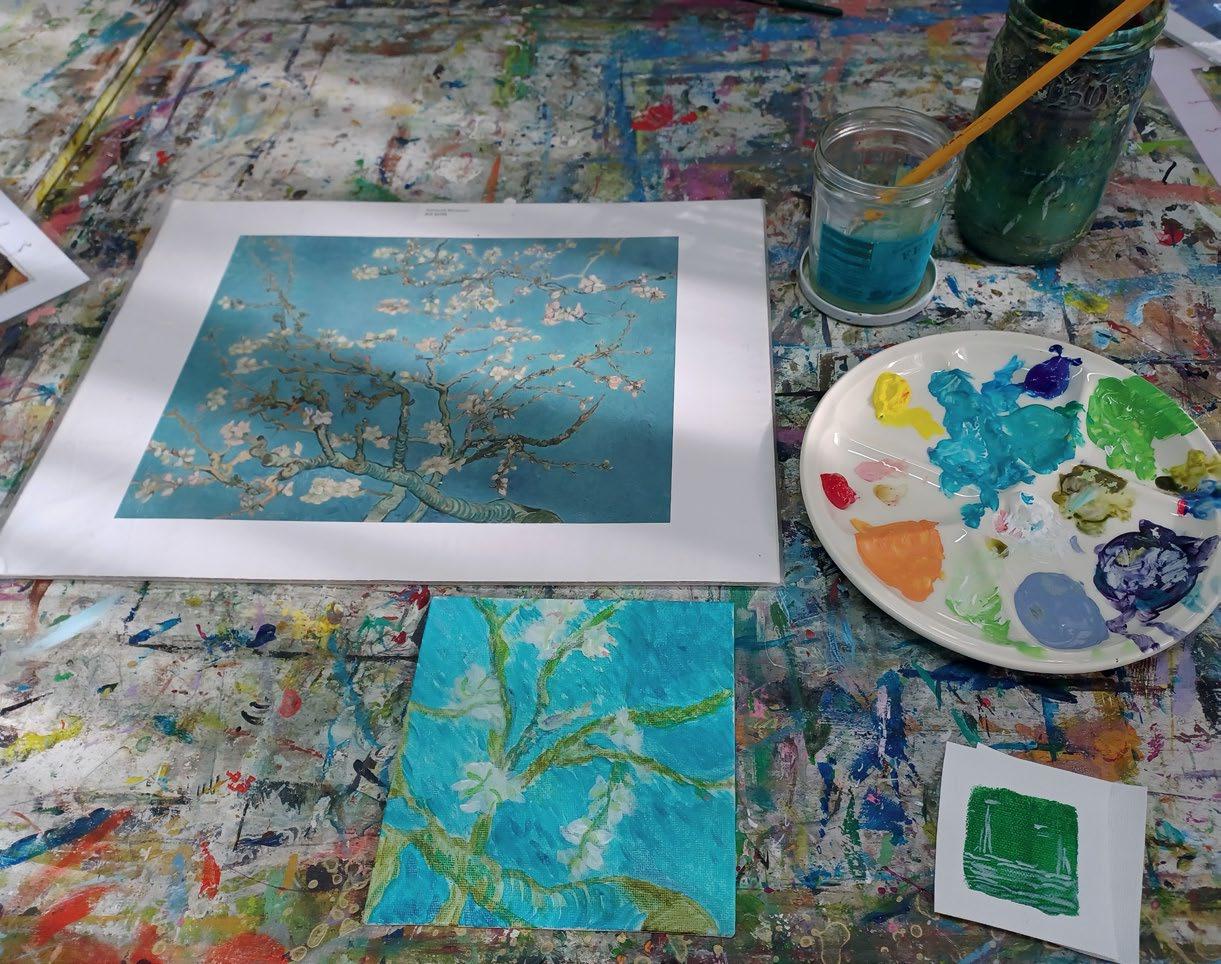
It is this kind of personal insight into the history that make the viking guides unforgettable
The next destination was the walled city of Avignon, ‘City of Popes,’ and viewed from the river it is a breath-taking site with the palace towers spanning high above the medieval walls that encircle the city centre. The included tour took us through a city gate a few minutes’ walk from the ship and around the city centre. The focus of the tour was a visit inside the ‘Palais des Papes,’ Palace of the Popes, which is part church, part fortress which dominates the centre. In 1309, following conflict with the papacy and the French crown, which culminated in King Philipp IV forcing the election of a French pope, the Holy Vatican decamped to Avignon and remained there until 1376. There were subsequently a further six French Popes who spent their time building and rebuilding the Palace Vieux and the Palace Neuf and cultivating a more palatable wine than the local vin, the famous Châteauneuf-de-Pape. Their collective efforts were justified as the scale of the Palaces is immense with large, cavernous rooms, vaulting arches and impressive windows. Several popes are buried within the Palace, their tombs laid out in a row in one of the anterooms, so I thanked them personally for their wonderful vineyards and world-famous wine.
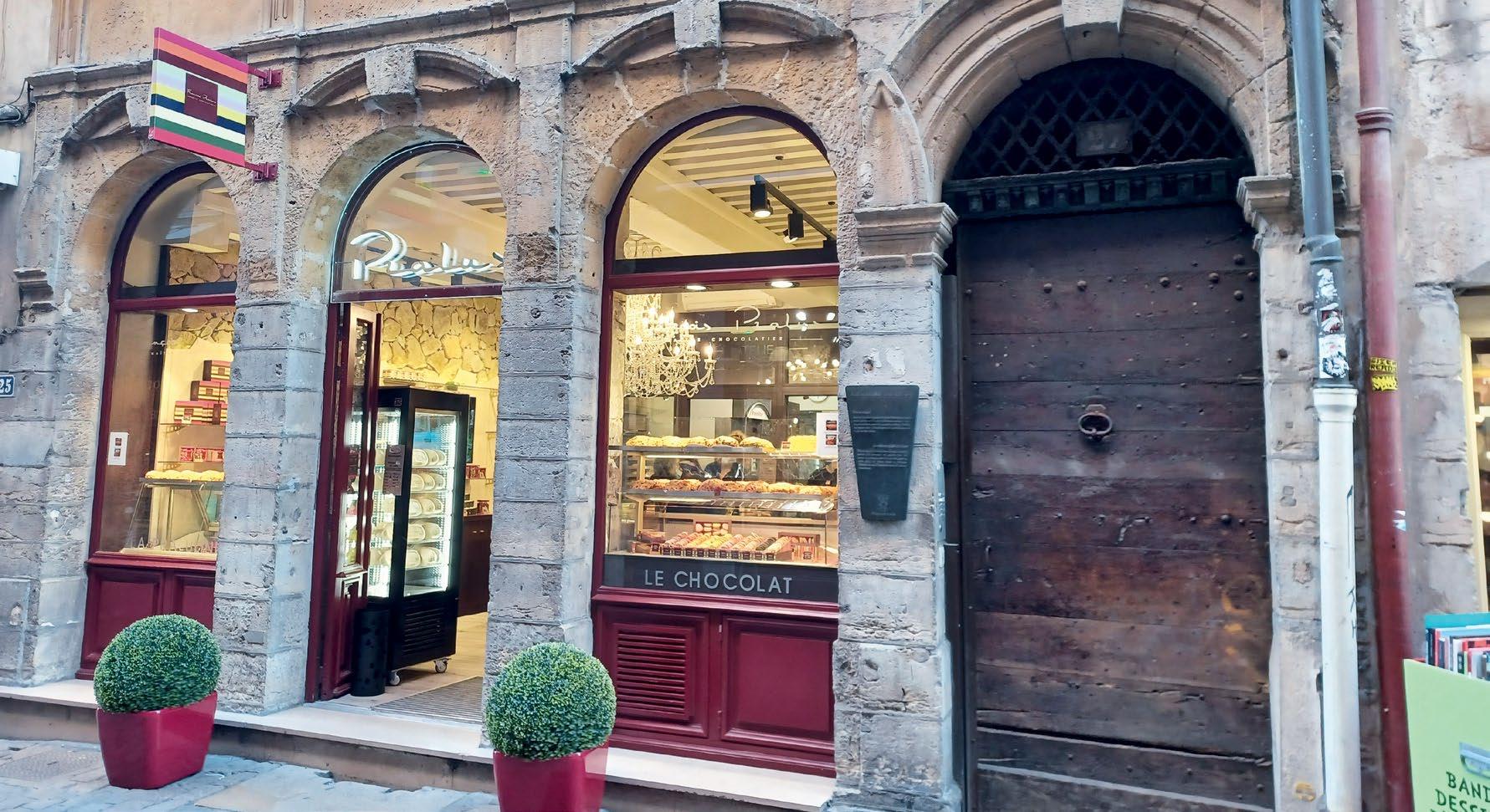
Finally, I enjoyed a solo walk along the river to the Pont d’Avignon, the 12th-century bridge immortalised in the rhyme and another interesting UNESCO World Heritage Site. I was able to walk on the bridge and find out about its history and how it was constructed. Once it was the only bridge that crossed the Rhône, was over 900 metres long and barely 5 metres wide with 22 arches. Due to its narrowness, people and animals frequently slipped off the bridge into the water. Dancing on the bridge
as in the rhyme, ‘tous en rond’, in a circle, was impractical and it is more likely that any dancing took place on one of the islands under the bridge. By the 17th century it was all but destroyed by the ravages of sieges, floods, building costs and dancing and all that remains is four arches which end abruptly in the river. However, it was still an impressive historical site and a treat for me to at last see this bridge that I used to sing about in French lessons at school, ‘Sur le Pont, d’Avignon’. On the Lyon and Provence trip you will want to dance literally and figuratively at the sheer joy of such a marvellous and experience packed adventure! But, you will need to return several times to really be
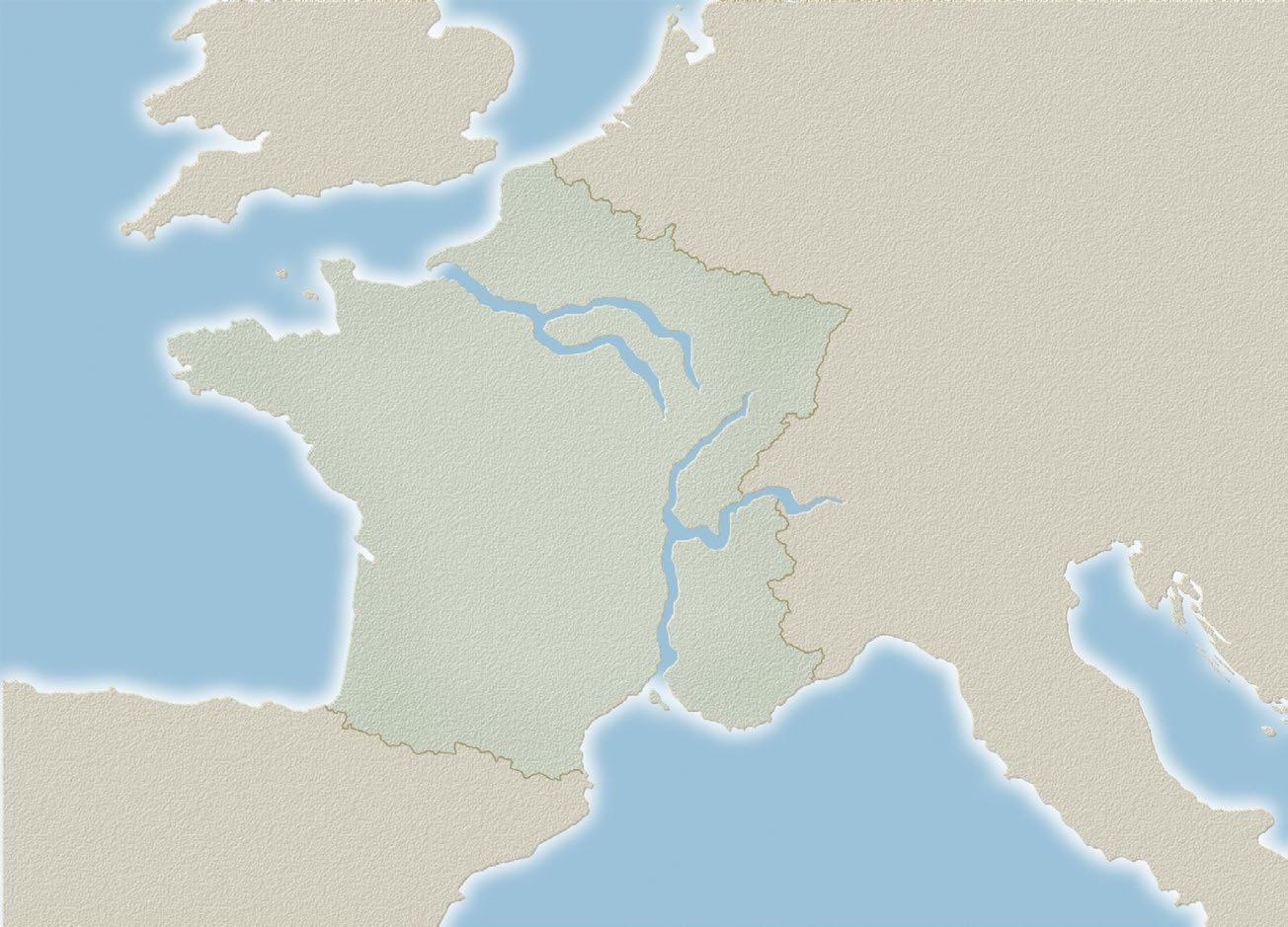
on the lyon and provence trip you will want to dance literally and figuratively at the sheer joy
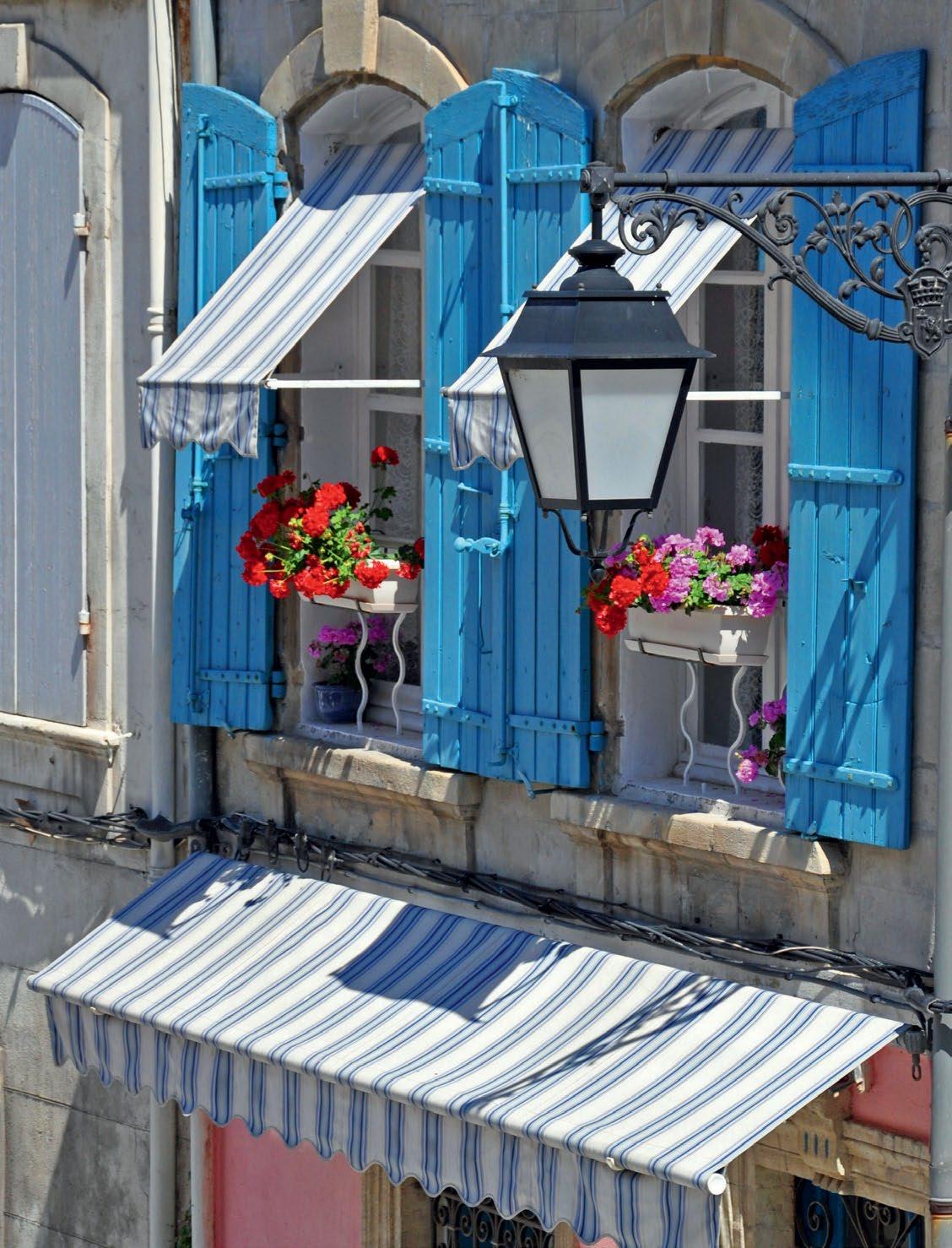

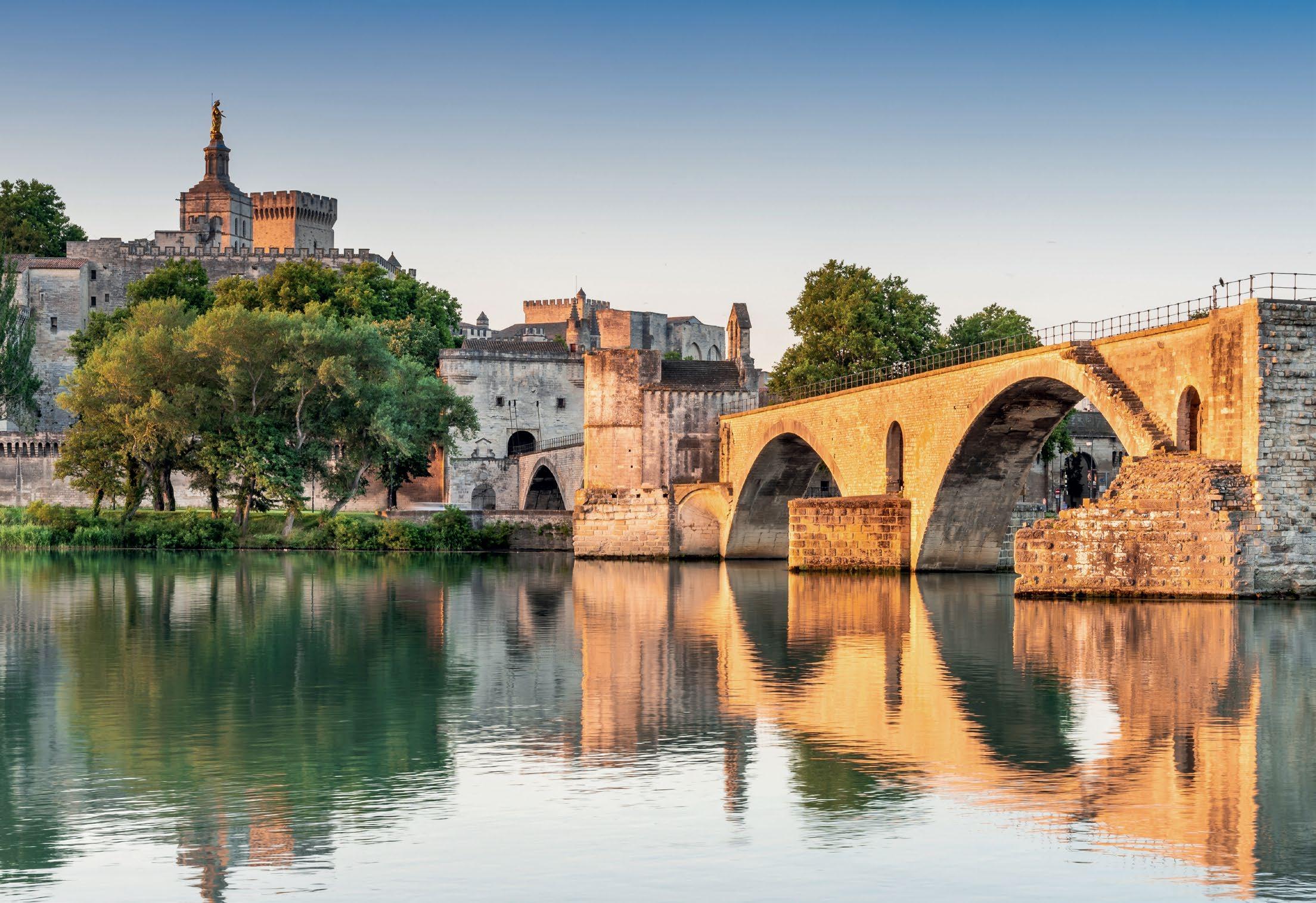 Clockwise from top An entrance to a Traboule; The famous bridge at Avignon; Colourful shutters adorn many buildings in Arles; A carnival atmosphere in the streets of Arles
Clockwise from top An entrance to a Traboule; The famous bridge at Avignon; Colourful shutters adorn many buildings in Arles; A carnival atmosphere in the streets of Arles

With departure dates running from March through November 2024, this special 12-day cruisetour from London to Paris will commemorate Operation Overlord and the historic battles of Normandy, which took place nearly 80 years ago and served as the catalyst for the liberation of Western Europe from German occupation.
“Many of our guests, particularly those with family members who served in the armed forces, have a keen interest in World War II history. In keeping with our commitment to offer experiences for The Thinking Person, we are pleased to unveil this special voyage that commemorates the 80th Anniversary of D-Day - one of the most significant milestones in modern history.” Torstein Hagen, Viking Chairman.
Begin your journey with four days in London to visit historic World War II sites including the Churchill War Rooms, where the D-Day landings were prepared in England, and Bletchley Park, home of the World War II codebreakers. Visit the Imperial War Museum London and experience Gunwharf Quays, the D-Day Museum and Southwick House.
Then continue to Paris to board a Viking Longship for your voyage along the Seine River. Sail through Normandy, explore Giverny and visit the beautiful gardens and charming farmhouse where Claude Monet lived and worked, trace the footsteps of Joan of Arc in Rouen. Visit D-Day sites including the Pegasus Memorial Museum and walk the hallowed ground at Normandy’s Commonwealth
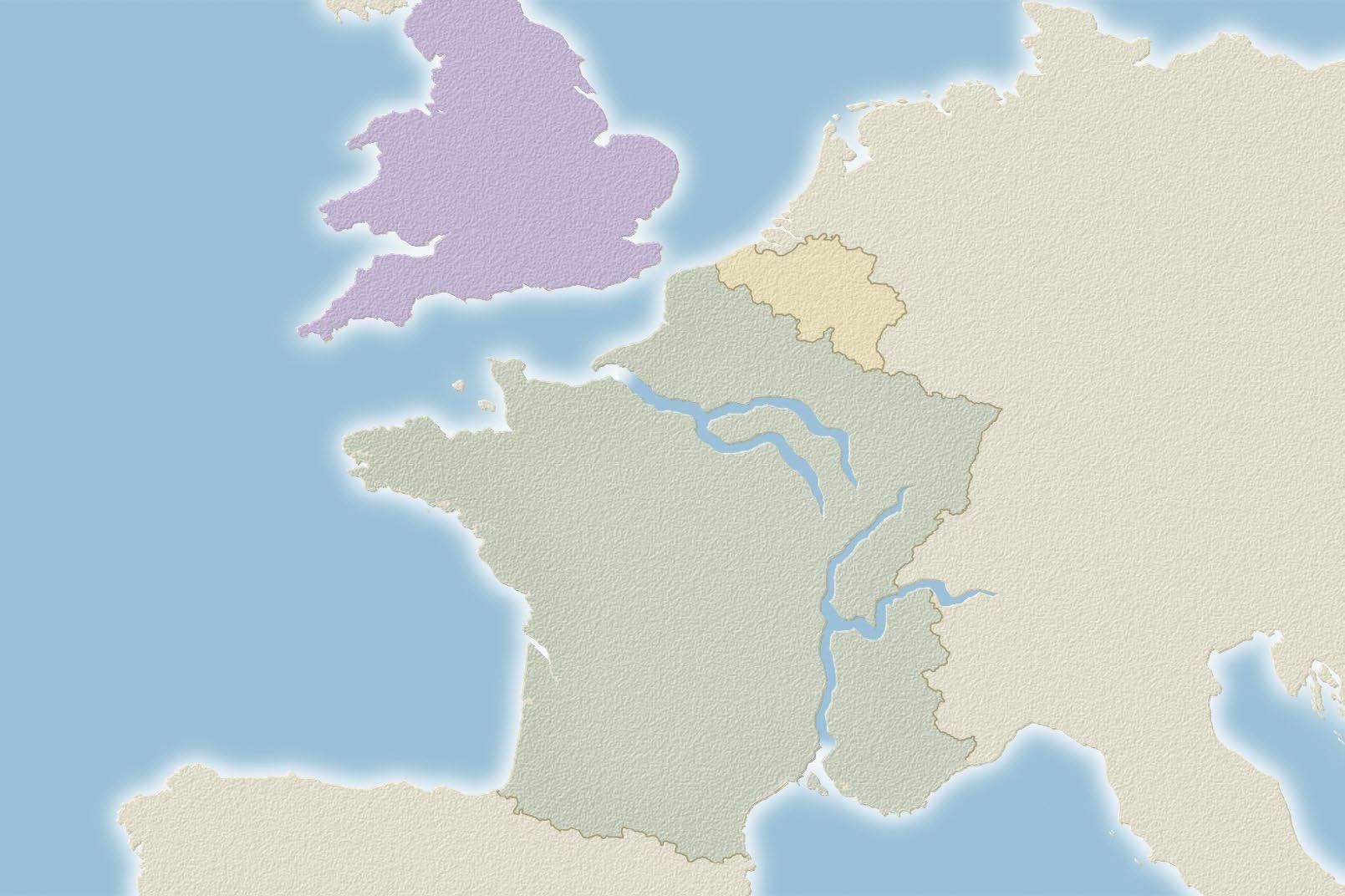
PARIS TO AVIGNON OR VICE VERSA
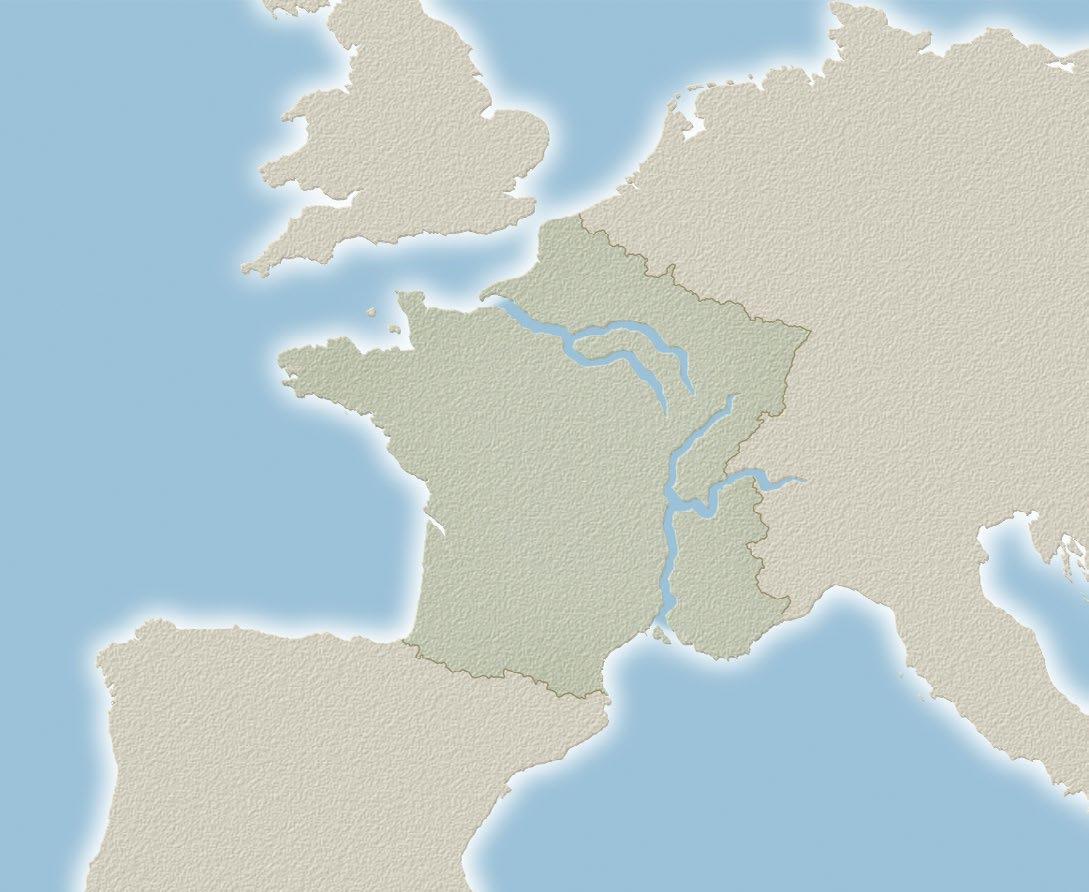

15 DAYS | 1 COUNTRY | 13 GUIDED TOURS | SET SAIL: MAR–NOV 2024; 2025
Explore Avignon’s Palace of the Popes and savor Lyon’s culinary heritage. Toast centuries-old vineyards and luxuriate in Paris’s sophistication. Walk in Joan of Arc’s footsteps at Rouen. Pay your respects at Normandy’s World War II beaches. Art, cuisine, style, joie de vivre—if you love everything Français, this is for you: a 15-day journey that combines our popular Lyon & Provence and Paris & the Heart of Normandy cruises into one tour de force.
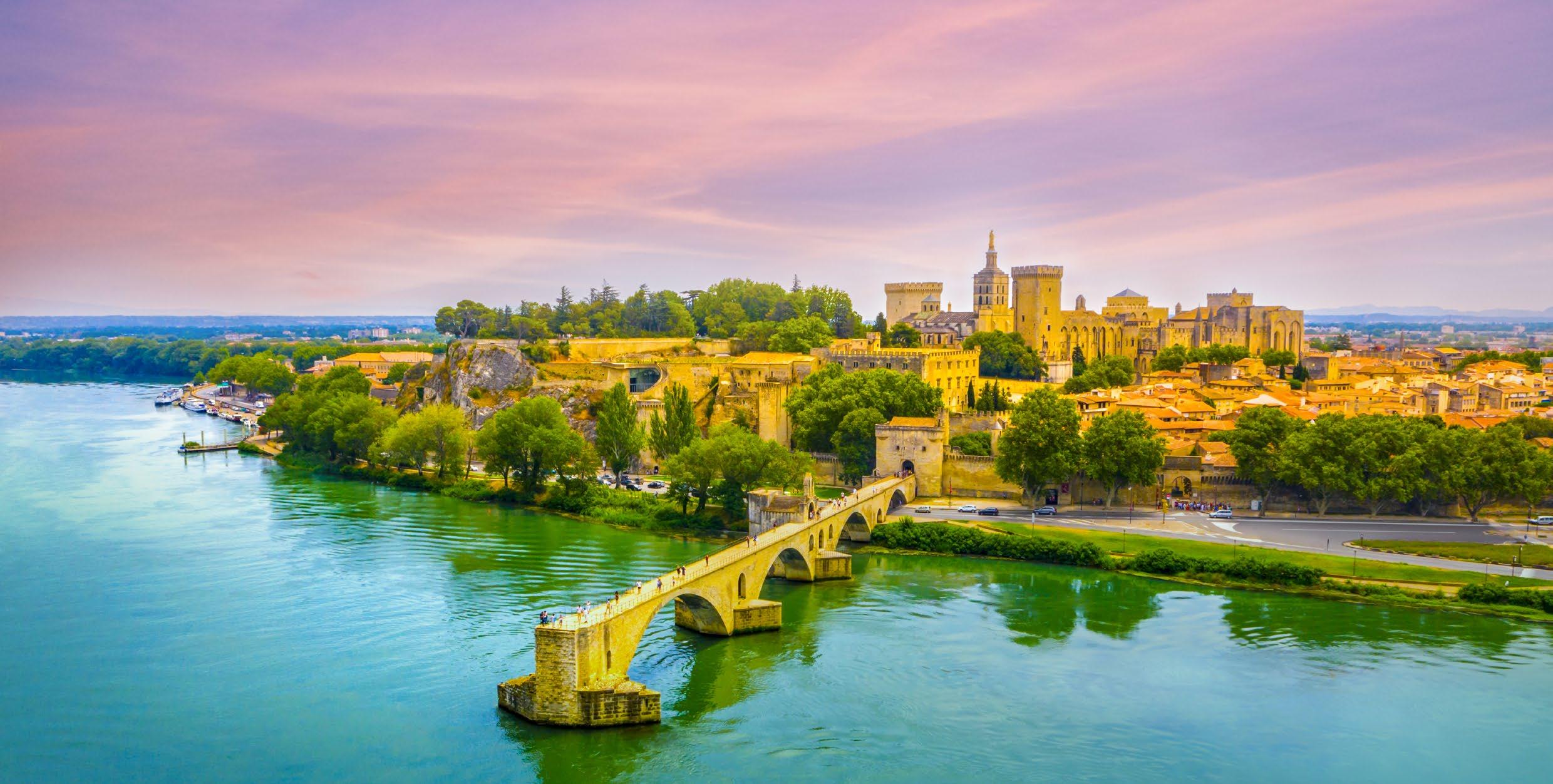
FROM $6,995PP IN STANDARD STATEROOM SAVE UP TO $4,600 PER COUPLE
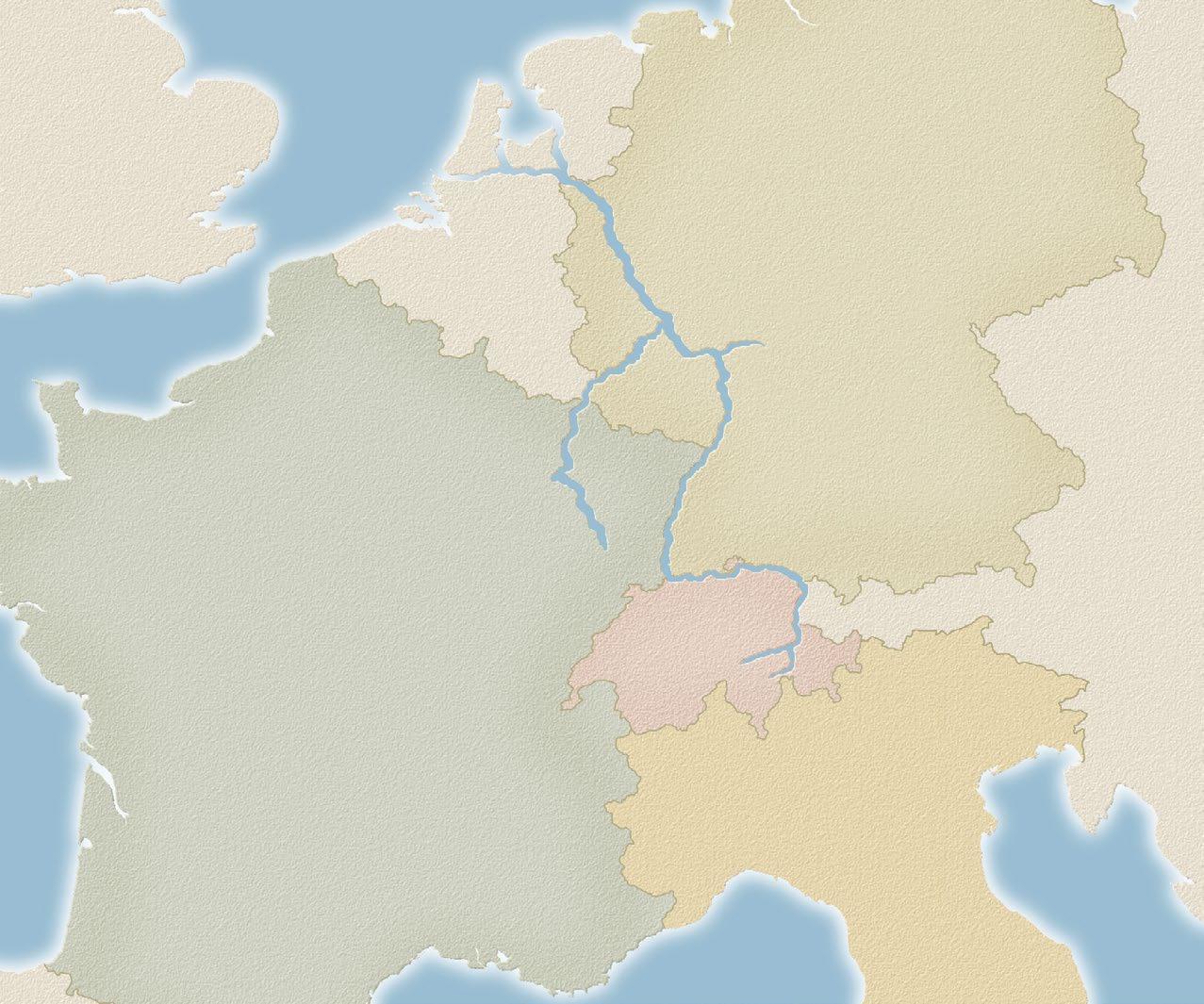
PARIS TO ZURICH OR VICE VERSA
12 DAYS | 4 COUNTRIES | 10 GUIDED TOURS | SET SAIL: MAR–NOV 2024; 2025
Visit fascinating Worms and the university town of Heidelberg. Enjoy scenic cruising past the town of Sankt Goar, home of the Lorelei Rock, and through the Rhine Gorge, a UNESCO Site. Taste Moselle Rieslings and visit the wine town of Bernkastel-Kues. Discover Roman Trier. Pay your respects at the Luxembourg American Cemetery. Vineyard-flanked slopes and historic cities, along with hotel stays in Zürich and Paris, make this 12-day cruisetour irresistible.
FROM $5,495PP IN STANDARD STATEROOM SAVE UP TO $2,000 PER COUPLE
PARIS TO PARIS
8 DAYS | 1 COUNTRY | 6 GUIDED TOURS | SET SAIL: NOV–DEC 2024; 2025
Embrace the holiday season with a taste of Joyeux Noel. Explore Paris, France’s twinkling “City of Light.” Sail through the snow-covered landscapes of Normandy’s countryside and admire the scenes of fairy-tale villages along the way. Enjoy the scented aroma of mulled wine and roasted chestnuts amid a festive backdrop of Christmas markets. Onboard festivities include regional dining specialties, seasonal treats and more to celebrate the holidays.
FROM $3,795PP IN STANDARD STATEROOM SAVE UP TO $2,000 PER COUPLE
We are proud to partner with the new multi-sensory Monet in Paris experience celebrating French Impressionist artist Claude Monet.
From the team that brought Van Gogh Alive to Australia, Grande Experiences and Andrew Kay present Monet in Paris, a multi-sensory experience celebrating Claude Monet and the world’s most renowned artists of the Impressionist era. Housed in the purpose-built Le Grand Palais this new immersive event made its global debut in Brisbane in June, ahead of a national tour.
In an explosion of life, light and colour, the super-scale arts and entertainment experience see’s visitors accompany some of the world’s most fearless artists of their time on an exhilarating adventure across 19th century bohemian Paris and the lush countryside of France. Young and old will be plunged into Monet’s water lilies and dance with Degas’ ballerinas. Art meets technology as breathtaking paintings are projected on an enormous scale, illuminating the loose brushwork of Claude Monet, Camille Pissarro, Pierre-Auguste Renoir, Paul Cézanne, Edgar Degas, Berthe Morisot, Mary Cassatt and many more.
Housed in the spectacular Grand Palais, a 250-metre square custom designed marquee, featuring six transformative
breakout spaces, bars, a café and a gift shop, you can experience a 360-degree immersion into Monet’s world.

Designed by Australian theatre designer, Anna Cordingley, Le Grand Palais is one of the biggest portable exhibition buildings in the world.
At the centre of Le Grand Palais and the heart of Monet in Paris is Grande Experiences' state-of-the-art SENSORY4™ technology; an immersive gallery combining with a tailored exhibition space to allow the projection of enormous crystal-clear images. Set to a powerful classical score and showcasing the full breadth of the Impressionist movement, a stunning display of iconic, inspirational images transforms the world around you as you lose yourself in the vibrant colours and intricate details of the Impressionists’ works. Visitors will also have an opportunity to experience the Viking Way of cruising through this digital experience.
“We are thrilled to be an official partner of Monet in Paris. Our cruises are centred around cultural enrichment, so this partnership really resonates with Viking’s connection to and immersion in art and culture.” Said Michelle Black, Viking Managing Director ANZ.
Several of Viking’s itineraries have the opportunity to visit Monet’s House and Garden in Giverny, France, where Monet lived and worked for nearly 40 years, and what became the subject of so many of his paintings. The Monet in Paris experience provides a wonderful opportunity to see some of these works of art come to life here in Australia.
Monet in Paris - Tickets now on sale at monetinparis.com.au
A national multi-sensory
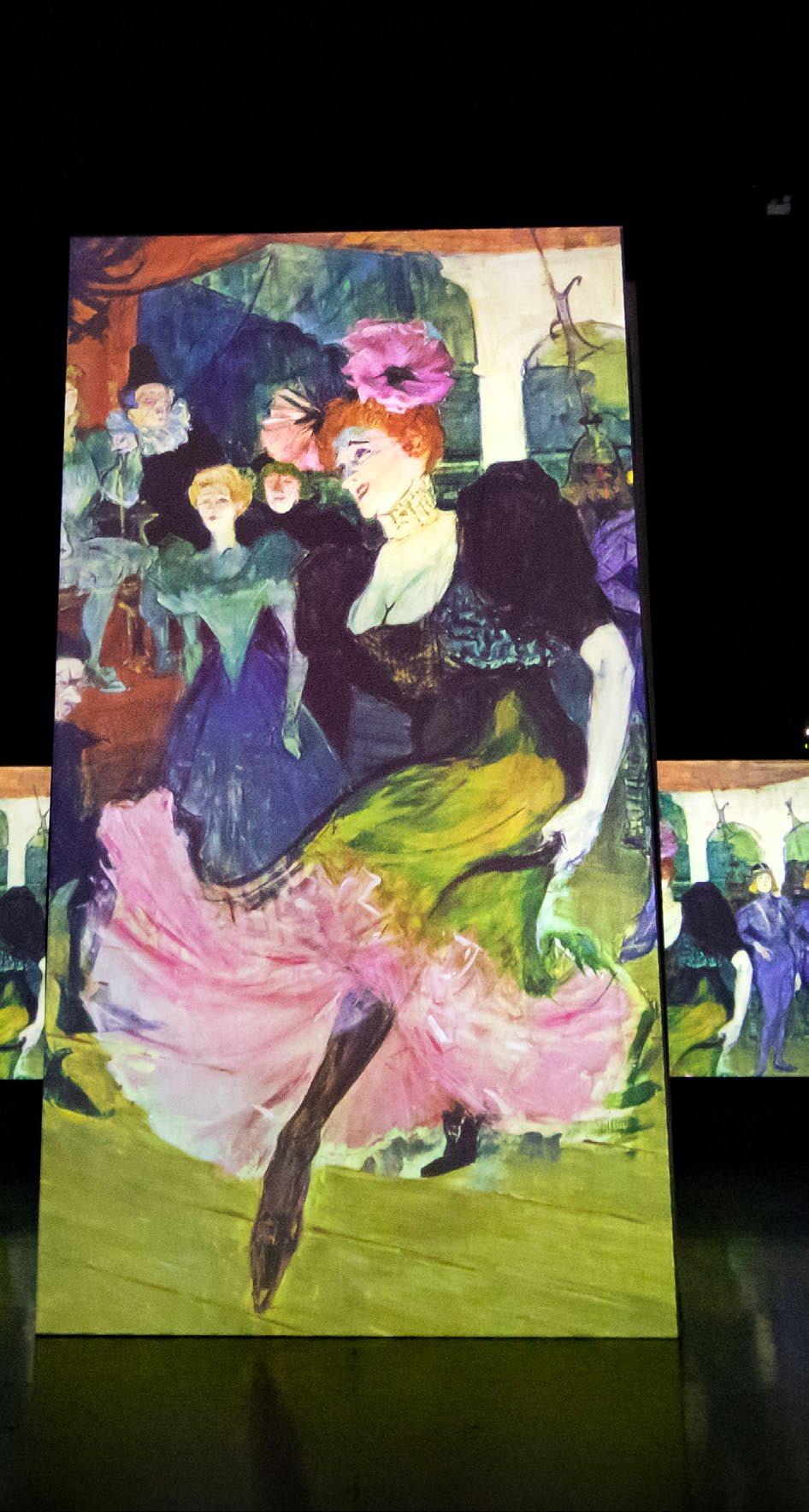
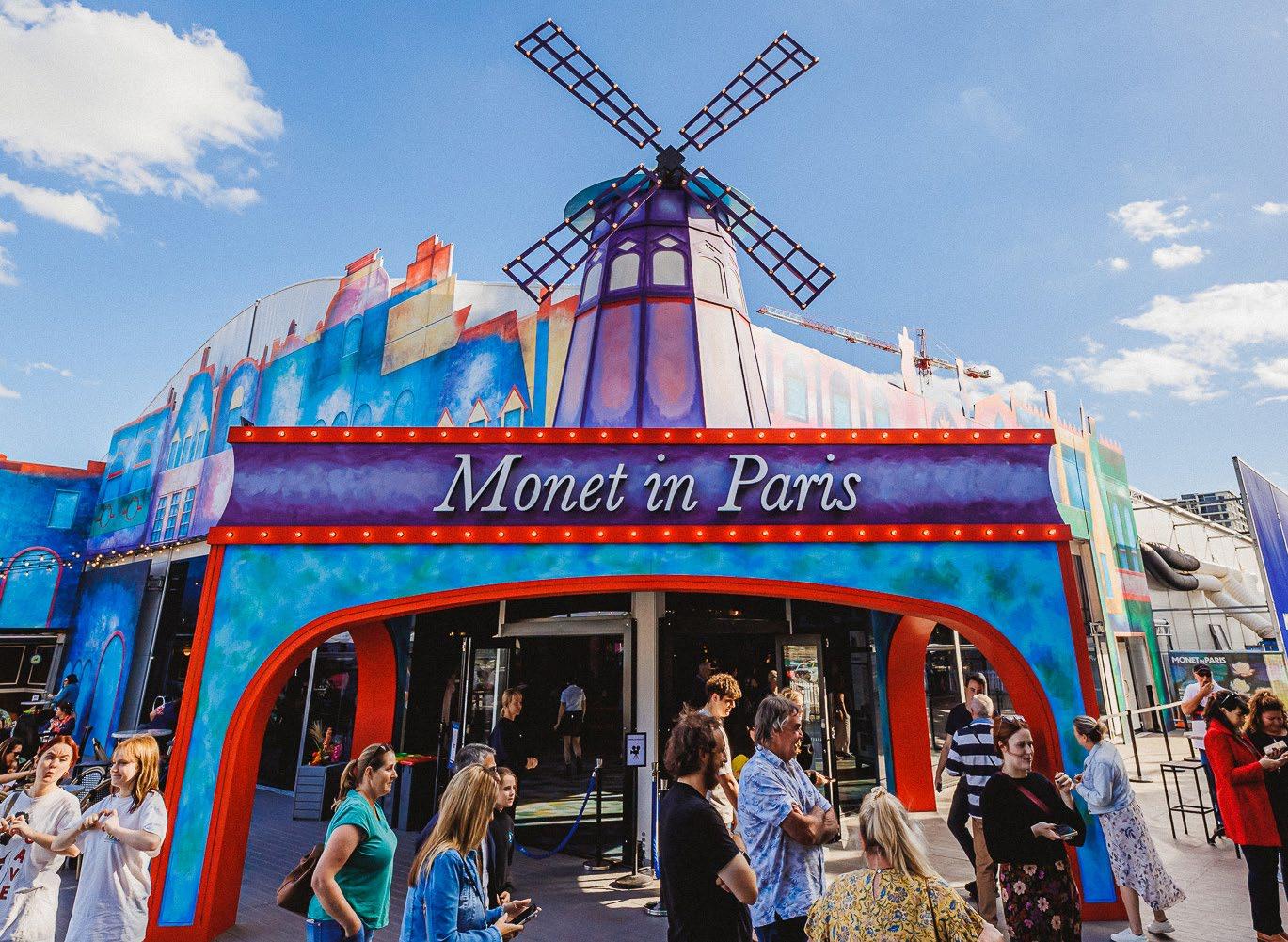
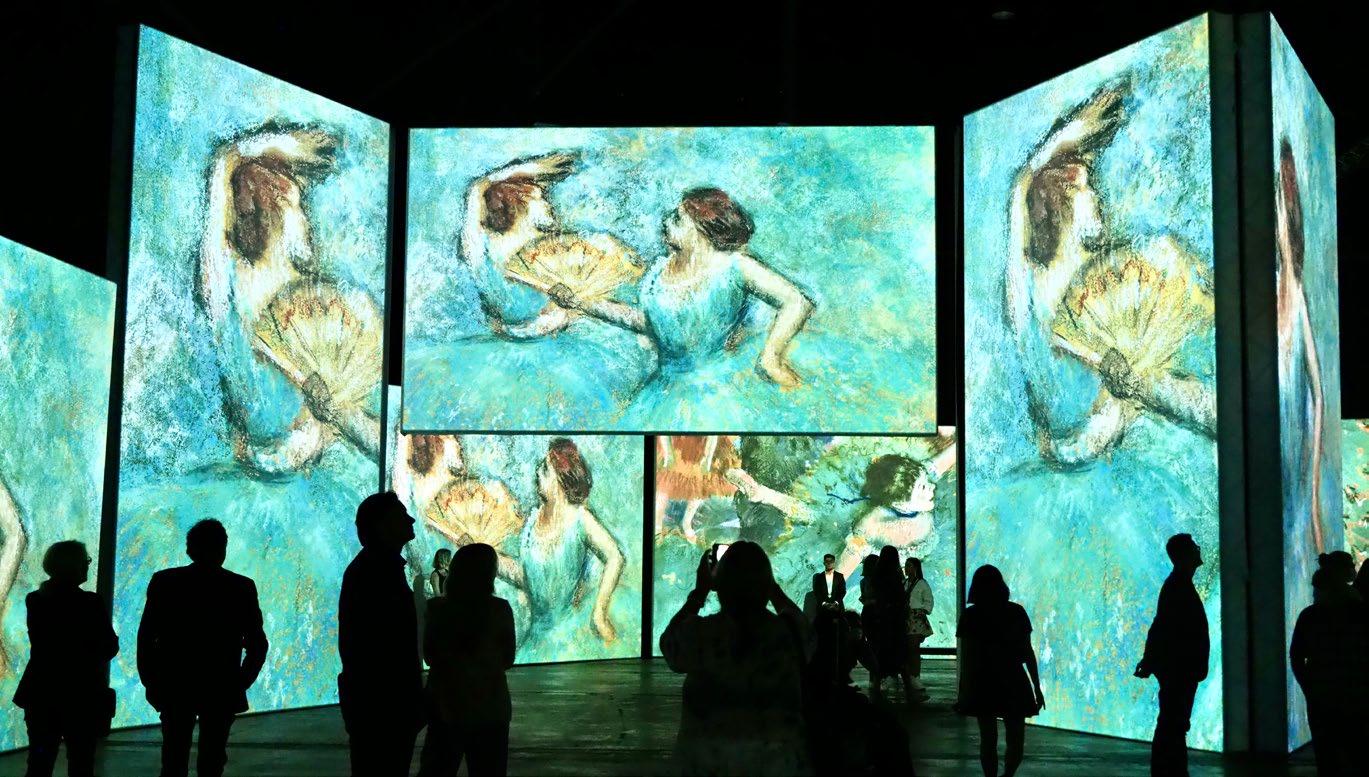
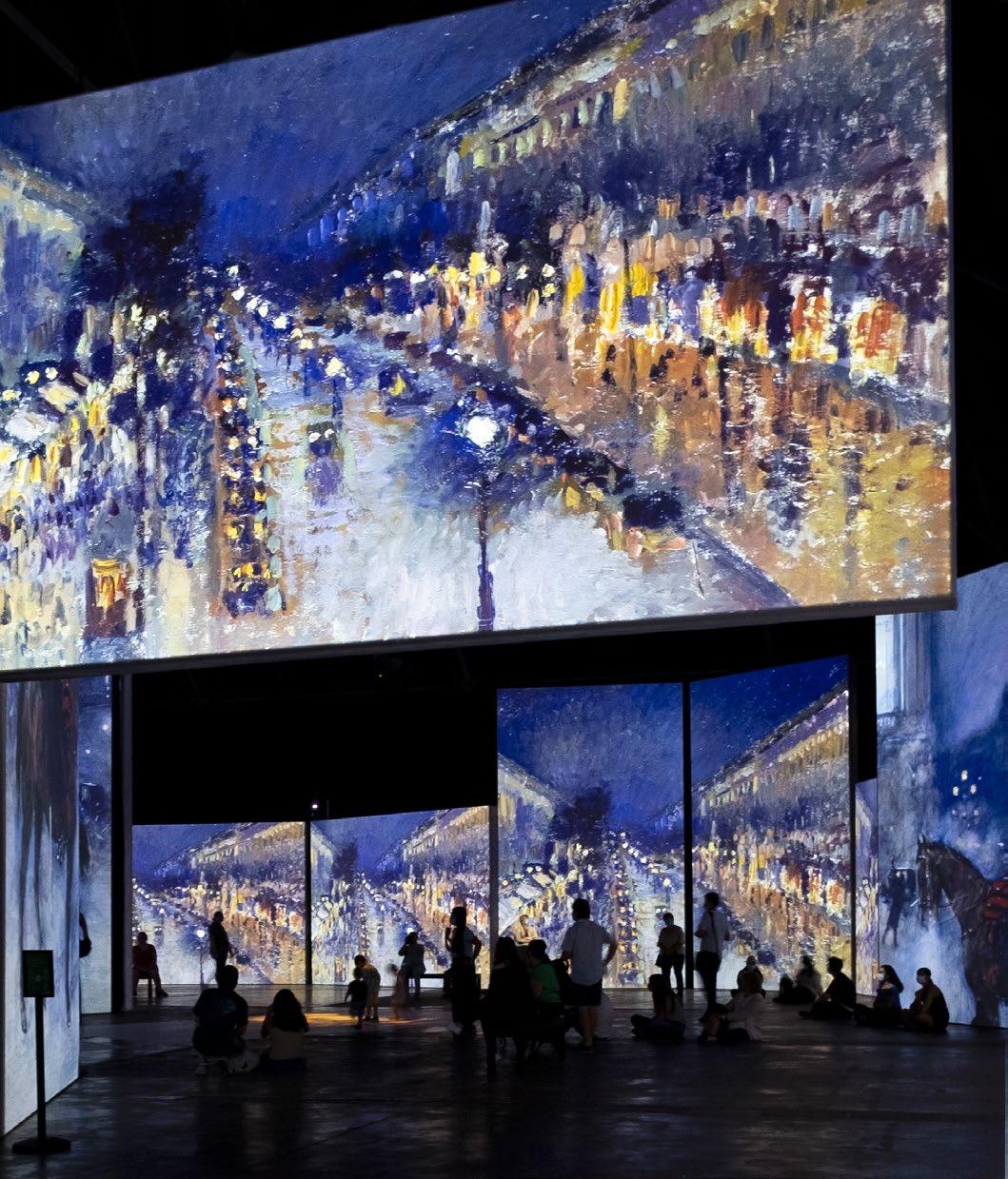
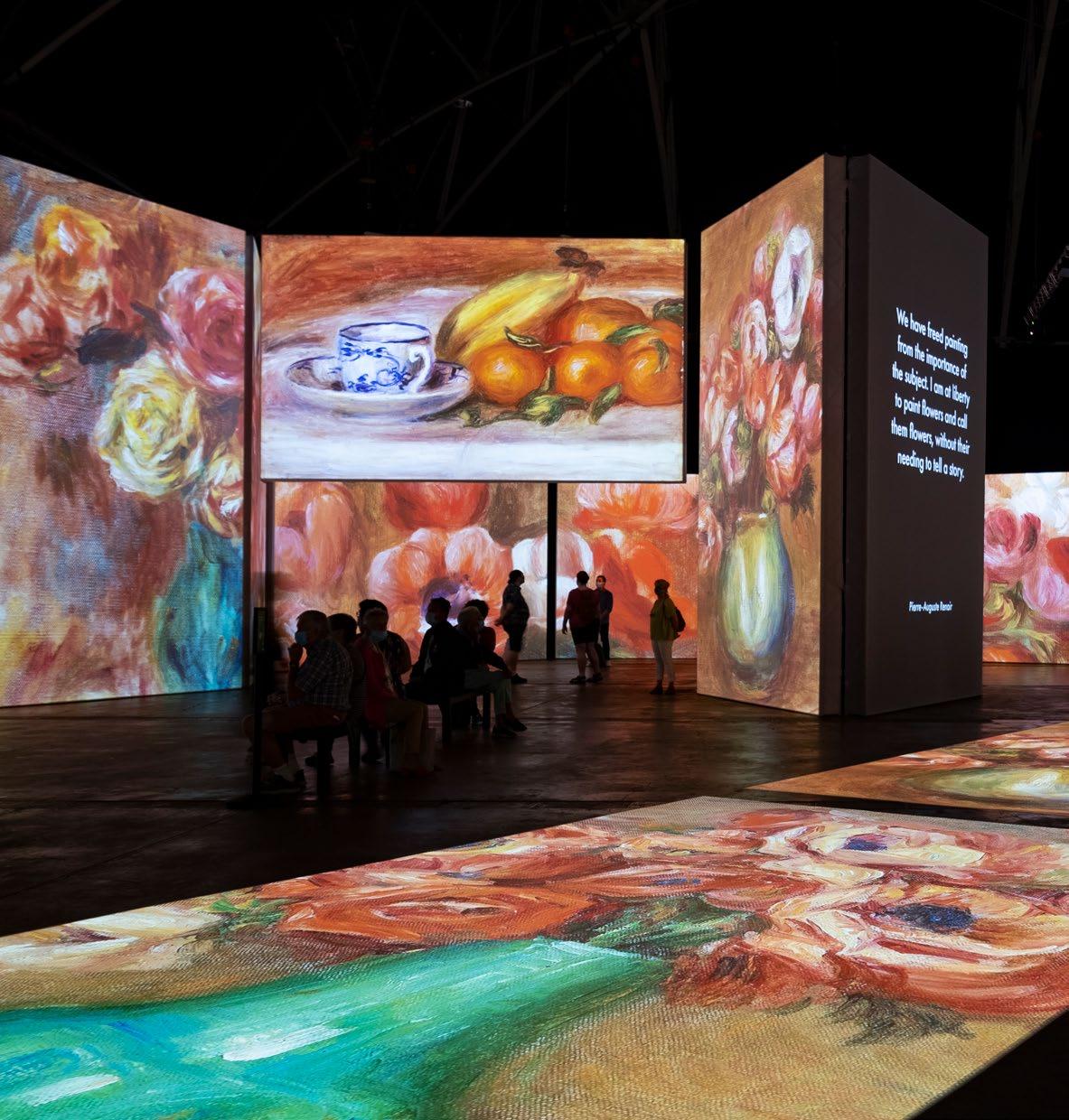
For travel writer Gabrielle Sander, exploring the region – and its food – on an epic 41km cycle ride, was the highlight of her journey on the Rhine
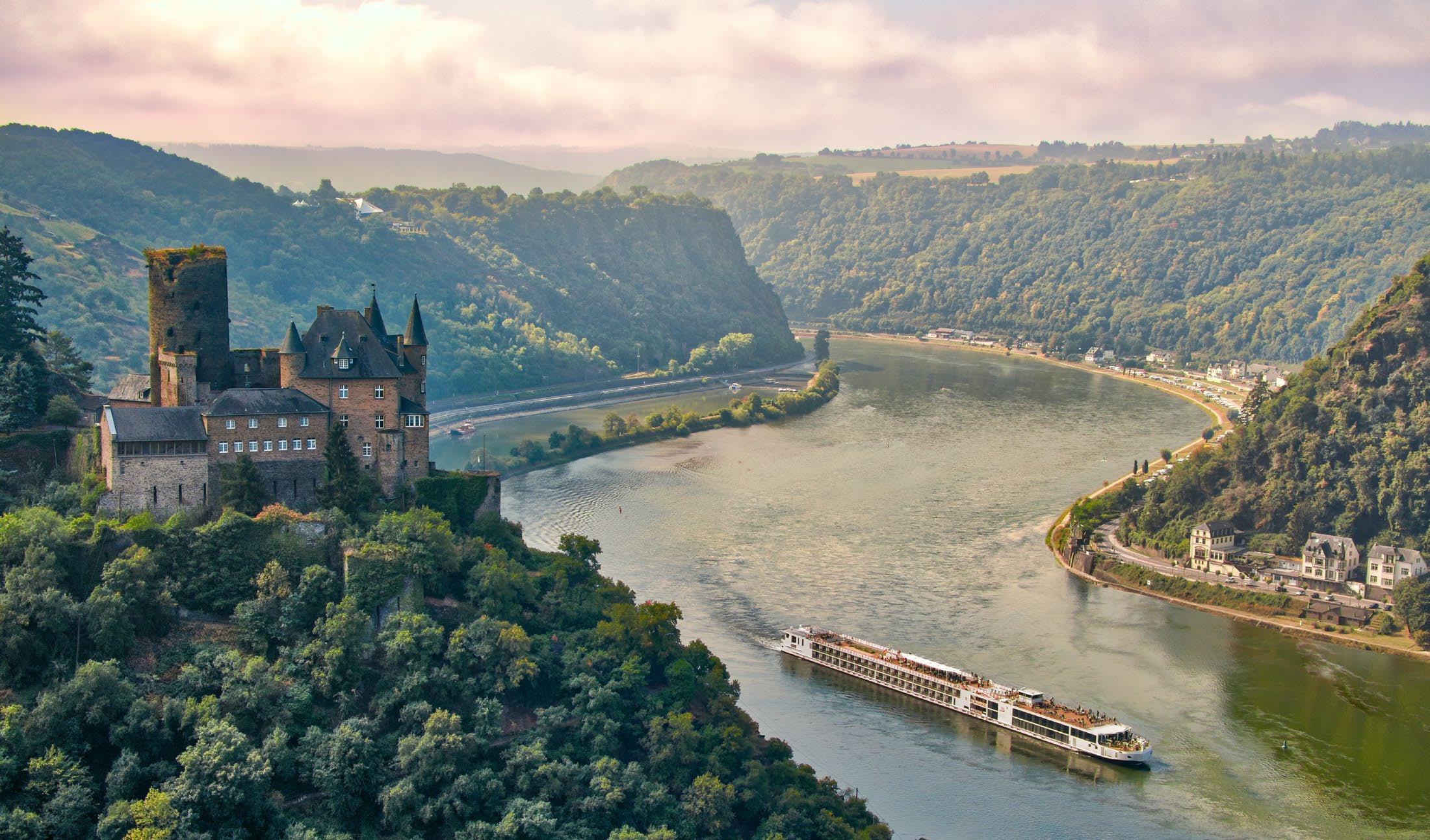
While picturepostcard sights, architectural delights and diving into new cultures are what make travelling the world exciting, it’s the promise of all the glorious edible discoveries that piques my interest the most. The local dishes you discover abroad; the ingredients you can pick up to evoke that holiday feeling back home. When that trip runs 1,280km along the Rhine from Basel to Amsterdam, through four countries, six cities and five towns, rich in wine and weissbier,
cheese and charcuterie, schnapps, schnitzel and stroopwafels, the anticipation dials up a notch.
My first Viking river cruise was a veritable spring feast for all senses: crisp April days offering blue skies and sunshine, technicolour tulips galore and sweet interactions with wildlife – the family of ducks that passed beneath our veranda balcony one morning in a neat little row, and the swans we met at almost every bank along the way.
Viking Eir, our comfortable home for the eight-day trip, delivered my partner and I
seamlessly from one Rhine-side destination to the next; the lowlevel Longship designed perfectly to dock near the heart of the action. Each day brought a new adventure, through a rich itinerary of inclusive excursions, opportunities to explore alone, aided by the handy maps conveniently handed out at guest services, and well-priced, optional activities that took us even deeper into the location.
The first stop after embarkation, 60km north of Basel, was the German town of Breisach. Here we hopped off the boat and onto
e-bikes to get a taste of the Black Forest and the eponymous gateaux. The next day, the French city of Strasbourg delighted with its picturesque old town of colourful, half-timbered medieval houses, winding canals, and waterside restaurants serving up boards of delicious mountain cheese and crisp Alsatian Rieslings.
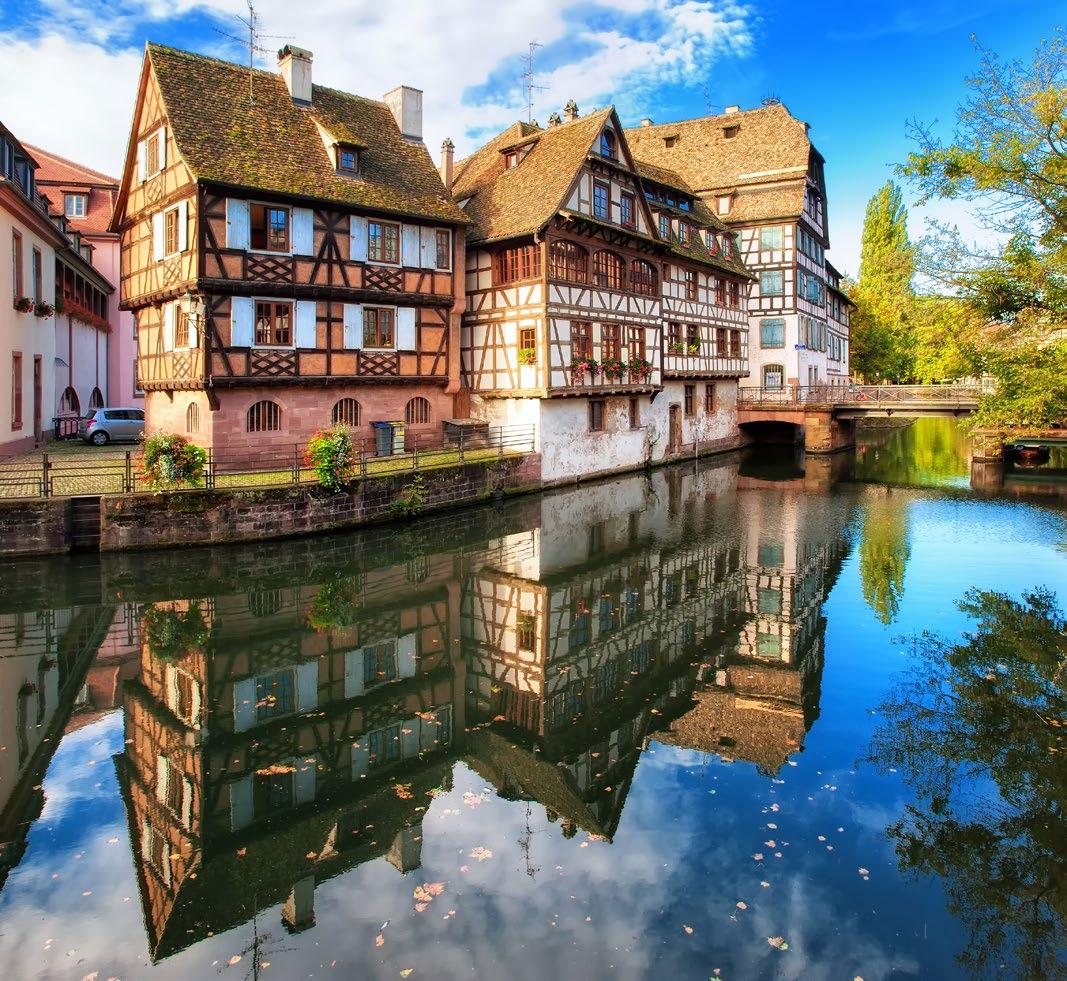
In Heidelberg, Germany’s oldest university town, the inclusive tour taught us interesting nuggets of local history, tales of the male-dominated fraternities housed in the grand baroque houses, and the story behind the red sandstone castle perched 330 feet at the top – the world’s largest wine barrel residing inside. Some free time at the end allowed for souvenir shopping, peoplewatching at one of the cafés lining the main square, and a hefeweizen at microbrewery, Kulturbrauerei.
Rüdesheim, in the heart of the Rheingau, marked the start of vineyard country, which stretched over the next three days in an endless patchwork of verdant stripes. Here we were introduced to the paper-thin flammkuchen, an Alsatian ode to the pizza, topped with lardons, crème fraiche and onions, and the brandyspiked Rüdesheim coffee, first via generous samples handed out during the onboard cookery demonstration,
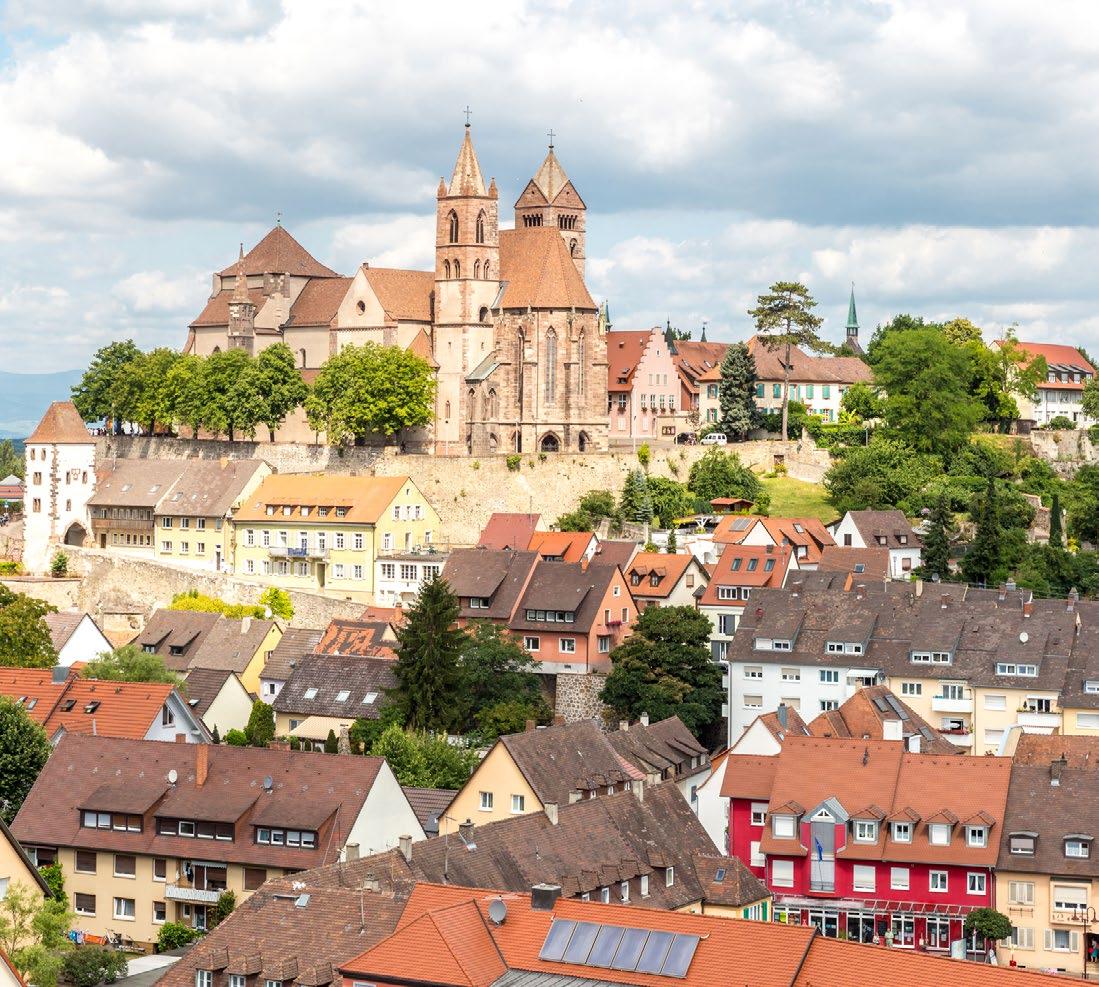
then at a restaurant in town, where we dined that evening.
Through the Upper Middle Rhine, we congregated on the top deck for a dazzling display of fairy tale, Romantic era castles, accompanied by homemade ice-cream and peach bellinis handed out by the crew. Steep vineyards melted into pretty sugared almond villages each with their own legend to tell, entertainingly regaled by cruise director, Ivan. The most famous was Lore Lay, the golden-haired maiden who mesmerised sailors to their shipwrecked demise, marked by the jutting Lorelei Rock, at the point where the Rhine curves at its deepest and narrowest towards Koblenz.
At Koblenz, we docked at the mouth of the Moselle river and joined an optional excursion into the 480km long valley, bordered by some of the world’s steepest vineyards. Our guide spoke of the 2,000-year-old viticulture traditions, the legend of the wine witch and the protected Apollo butterfly fluttering around these parts, before taking us to Winningen, a village where vines grow along and between the houses like telephone wires – their roots helping to keep the cellars dry. Following a tour of a family-run winery and tutored tasting of superb Riesling and Pinot Noir wines, we made our tipsy way back to the ship.
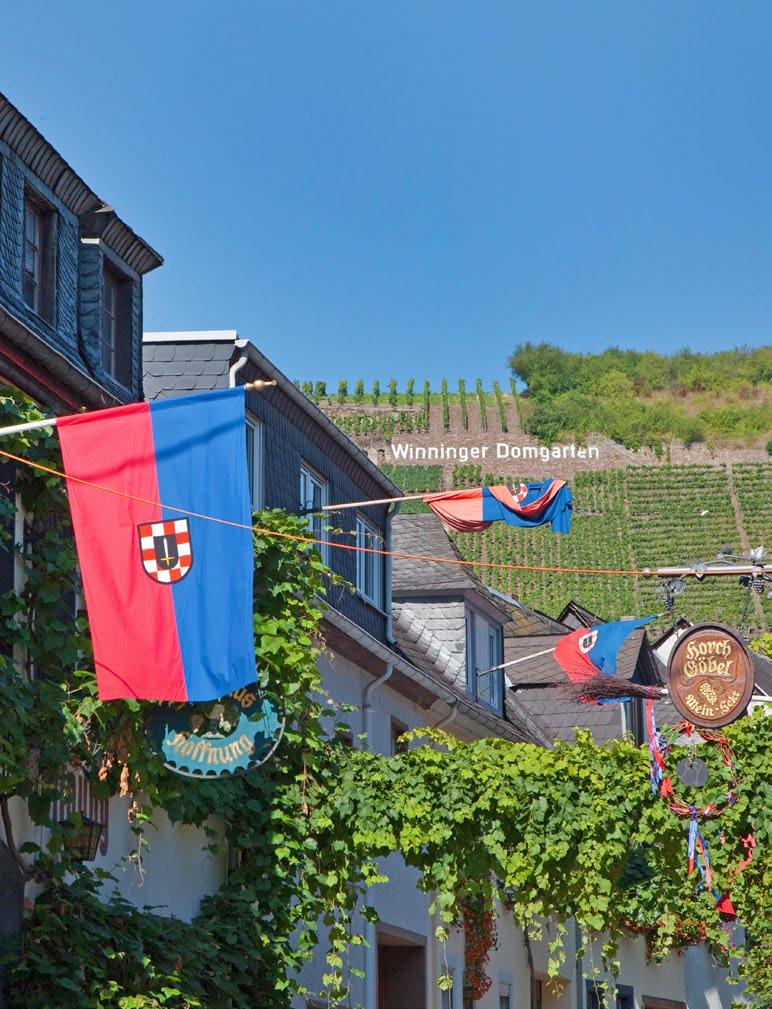
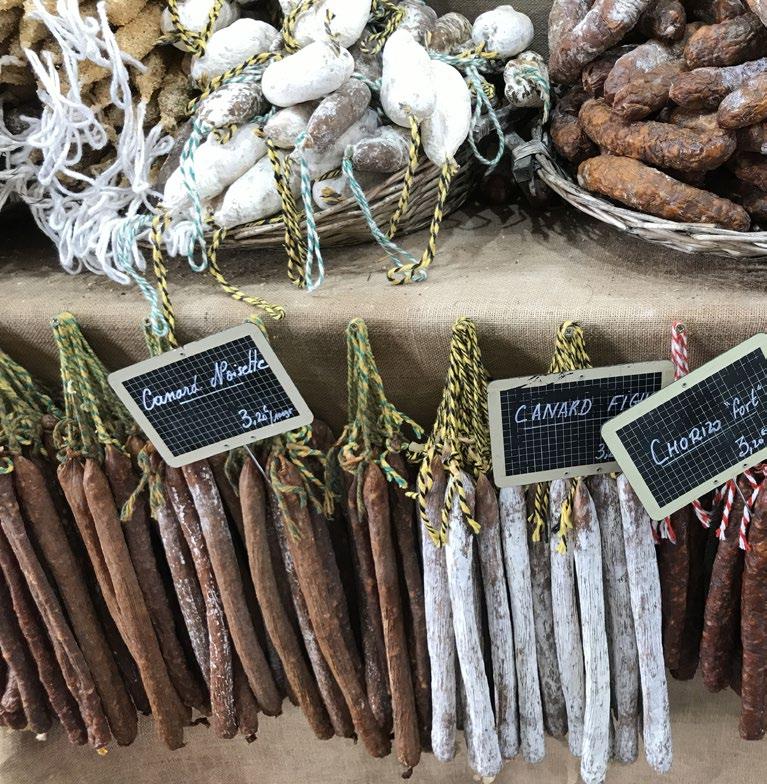
That evening, as we sailed towards Cologne, the ship laid on a Taste of Germany-themed feast. The Viking team, dressed in Lederhosen and Dirndls, delivered glasses of Kolsch, while a traditional bretzels, veal schnitzel and sugar-dusted kaiserschmarrn adorned the buffet. 24 hours later, after a day of solo sightseeing in Cologne enriched with sweet spicy currywurst and 360-degree vistas from the top of the Köln Triangle, we enjoyed a direct view of the Dom Cathedral and an onboard performance by the
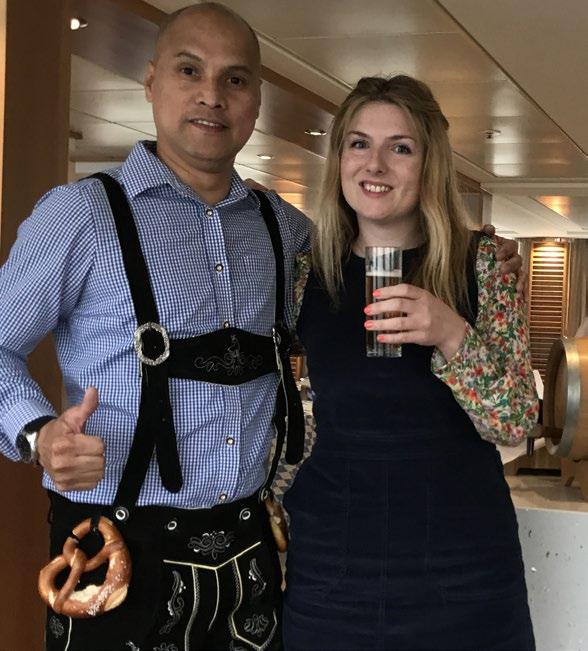
Cologne Symphony Orchestra.
After Germany came Holland, marked by the distinctly flat landscape dotted with wind turbines and Friesian cows, and stroopwafels at the coffee station. The optional excursion du jour took us to a cheese farm, where we ate creamy shards of Gouda, took selfies with the giant, wax-covered rounds and stocked up for home. We marvelled at the 19 windmills that make up the UNESCO World Heritage site, Kinderdijk.
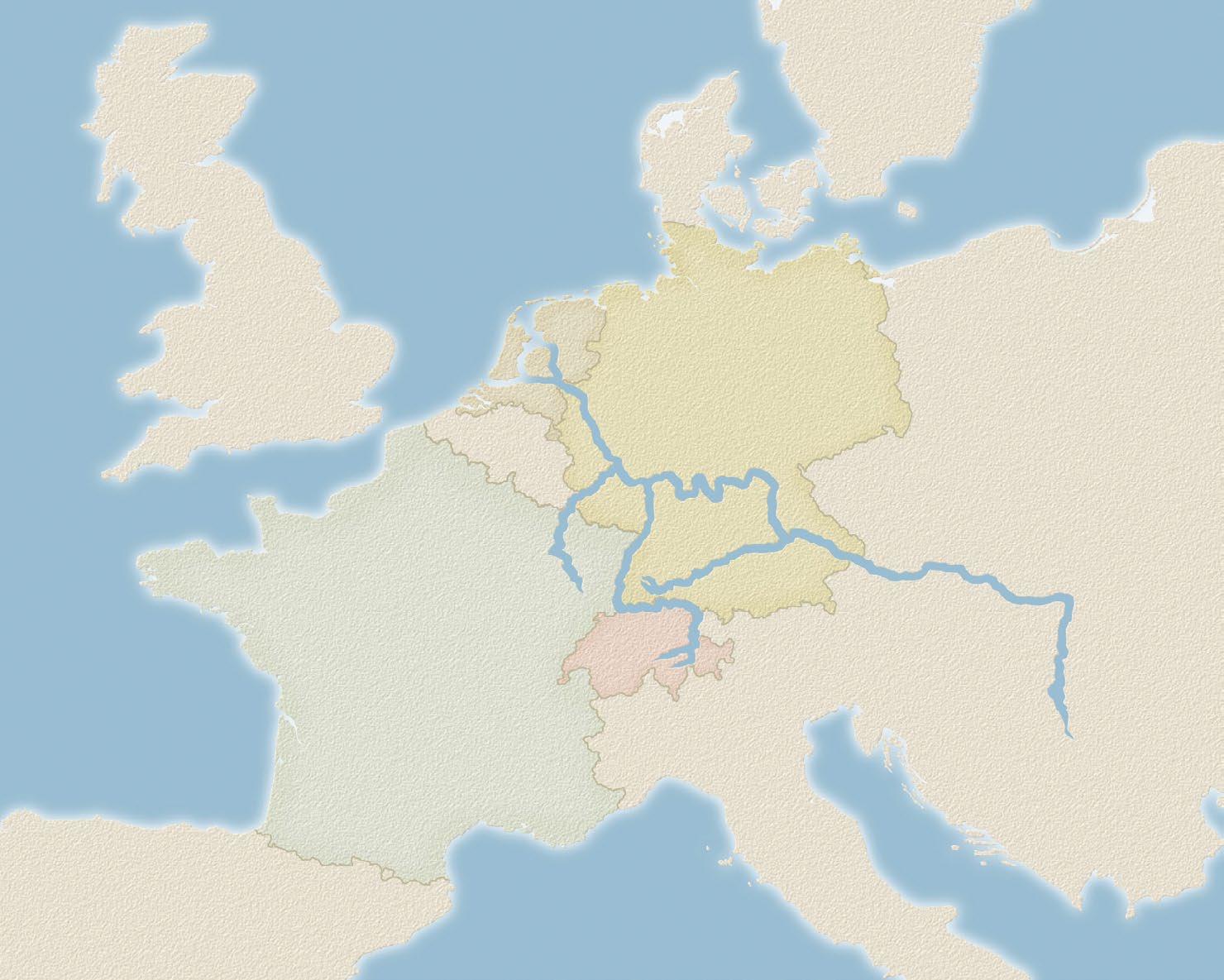

Then, just as soon as we’d fallen hook, line and sinker for the river cruising way of life, it was time to disembark at Amsterdam and head home. But not before exploring the characterful capital: to the tulip market for spring bulbs, dodging bicycles along the 165 canals, window-shopping the independent boutiques lining De Negen Straatjes, and tucking into sweet and savoury treats at one of the many pancake houses.
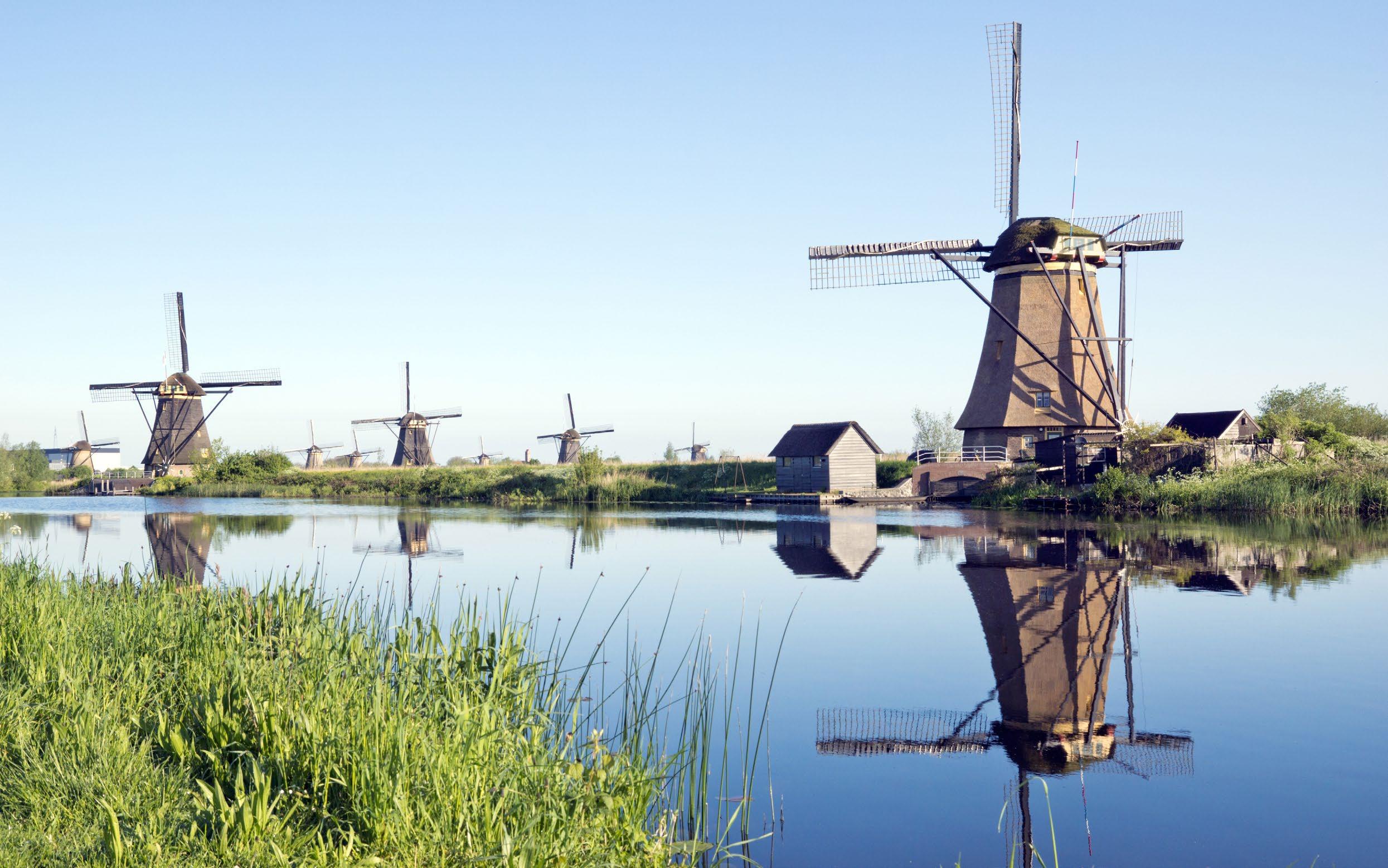
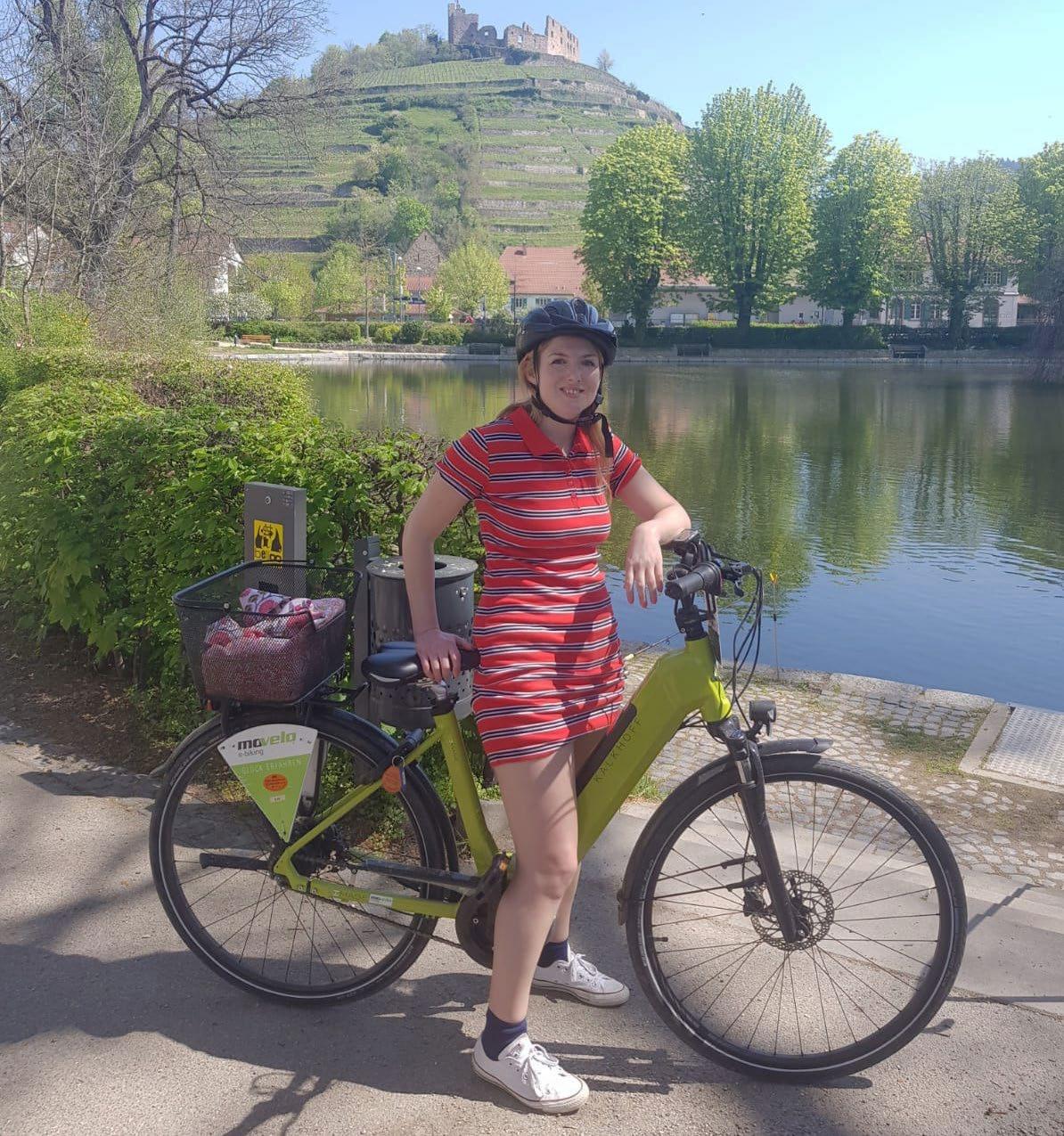
When I spied the Black Forest e-bike ride in the list of optional activities at Breisach, it sounded like the perfect way to stretch my legs, get off the beaten track and explore an area of southern Germany known for its beauty: an eight-hour route through landscapes that inspired the Brothers Grimm tales, and a chance to tuck into the famous gateau.
I selected and adjusted my bike to the right height and took a test ride to check I hadn’t defied the old ‘you never forget to ride a bike’ adage. Then, helmet clasped, listened attentively as our guides, Lydia and Nick, talked through the plan for the day, took our lunch order and explained the bike settings.
It was a wonderful start, following a traffic-free trail along the banks of the Rhine which sparkled beneath the cloudless sky; swans casually gliding and preening and red kites scouting with predatory intent overhead. We ducked off the path and onto a woodland track, keeping eyes peeled for
the wild pigs, deer and woodpeckers we were told roamed these parts. Wild garlic scented the air, while the sound of wood pigeons, and crunch of wheels over twigs provided the soundtrack.
We popped out the other end to meet a babbling brook and weaved through sprawling farmland, where young strawberry plants grew under the warm comfort of plastic and asparagus protruded from earthy mounds. After an hour, we pulled into a little village farm shop, where a glass cabinet of homemade bakes were laid out for us to select from. It had to be a giant slab of Black Forest gateau for me, which was by far the best I’ve ever had.
By 1pm, we’d zipped through many a picturesque village, past a community garden bursting with tulips, a 12th-century castle bordered by vines, and settled into the 14th-century former laboratory of Dr Faust (the protagonist of many a local legend).
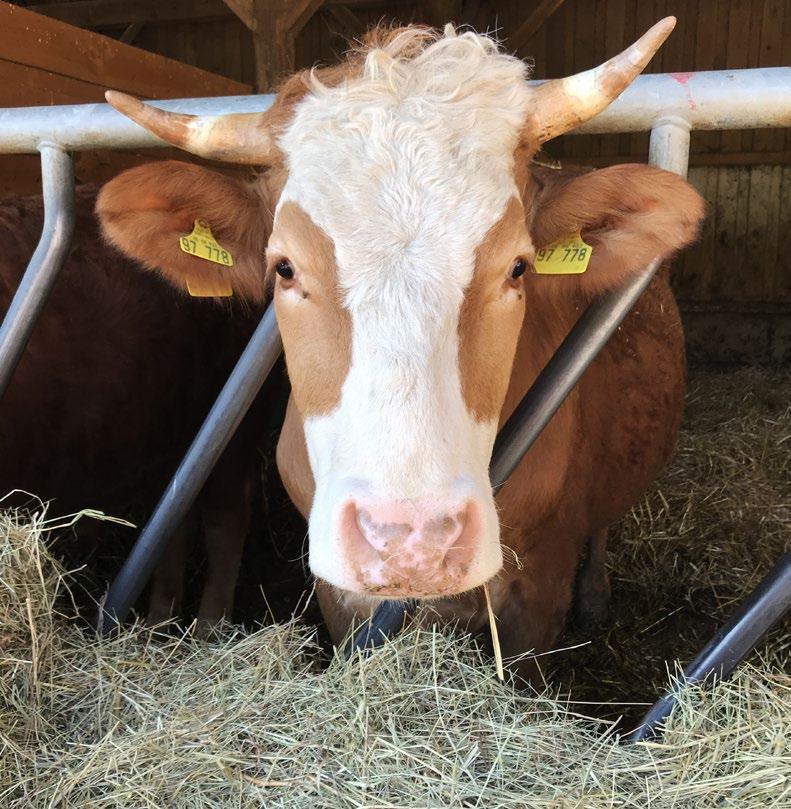
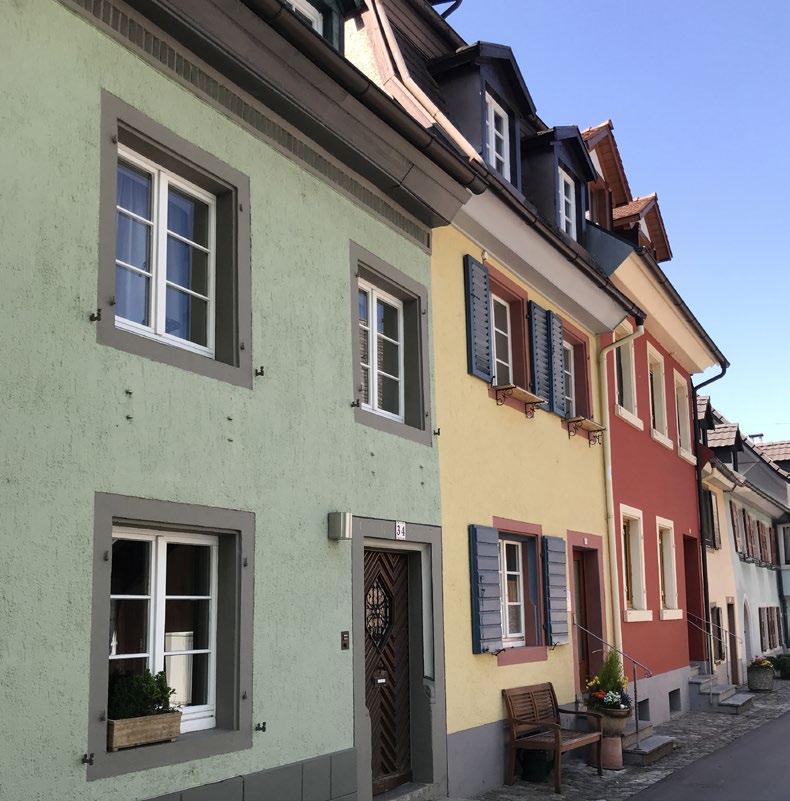
Sufficiently-fuelled we embarked on the
second half of the ride, starting as we were warned it was going to continue, with a steadily growing ascent until we reached a tiny village marking the start of Black Forest proper. Up and up we went, through the Black Forest magic I’d envisioned: curvaceous green hills dipping down to winding streams hugged by stone bridges. Fairytale farmhouses, goats grazing, and birds twittering melodically, I half-expected to pass brightly coloured toadstools and a wolf in red clothing. We continued along an interchanging mix of quiet roads and forest-lined tracks, following our guides like the children of Hamelin, captivated by the landscape. The feeling when we pulled into our final destination, a family farm and restaurant, was one of giddy accomplishment. 41km, with or without the e-push, is a good distance. Homemade schnapps were poured and we clinked glasses to the fantastic journey we’d ridden together.
8
FROM $2,995PP IN STANDARD STATEROOM SAVE UP TO $2,000 PER COUPLE
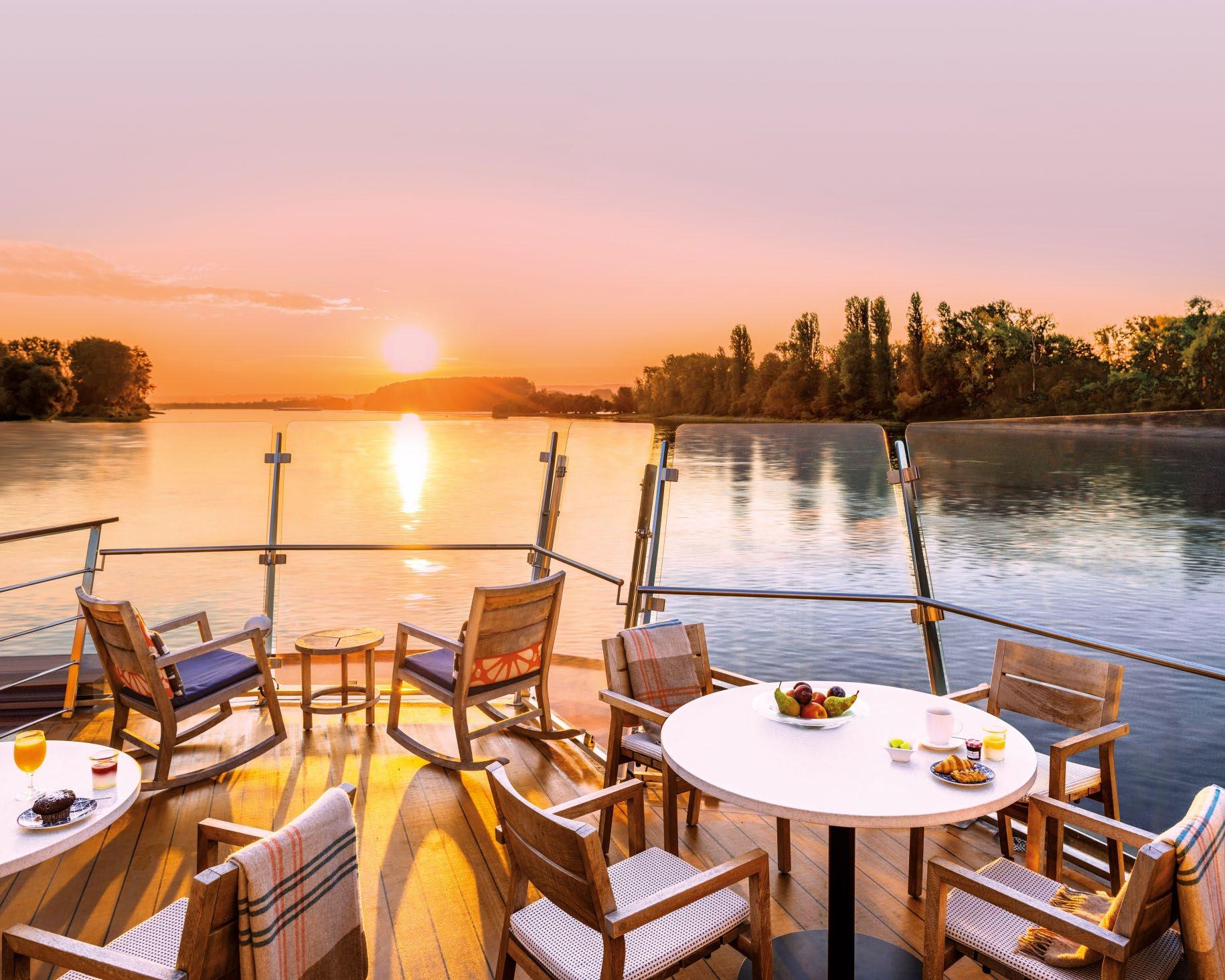
PARIS TO THE SWISS ALPS
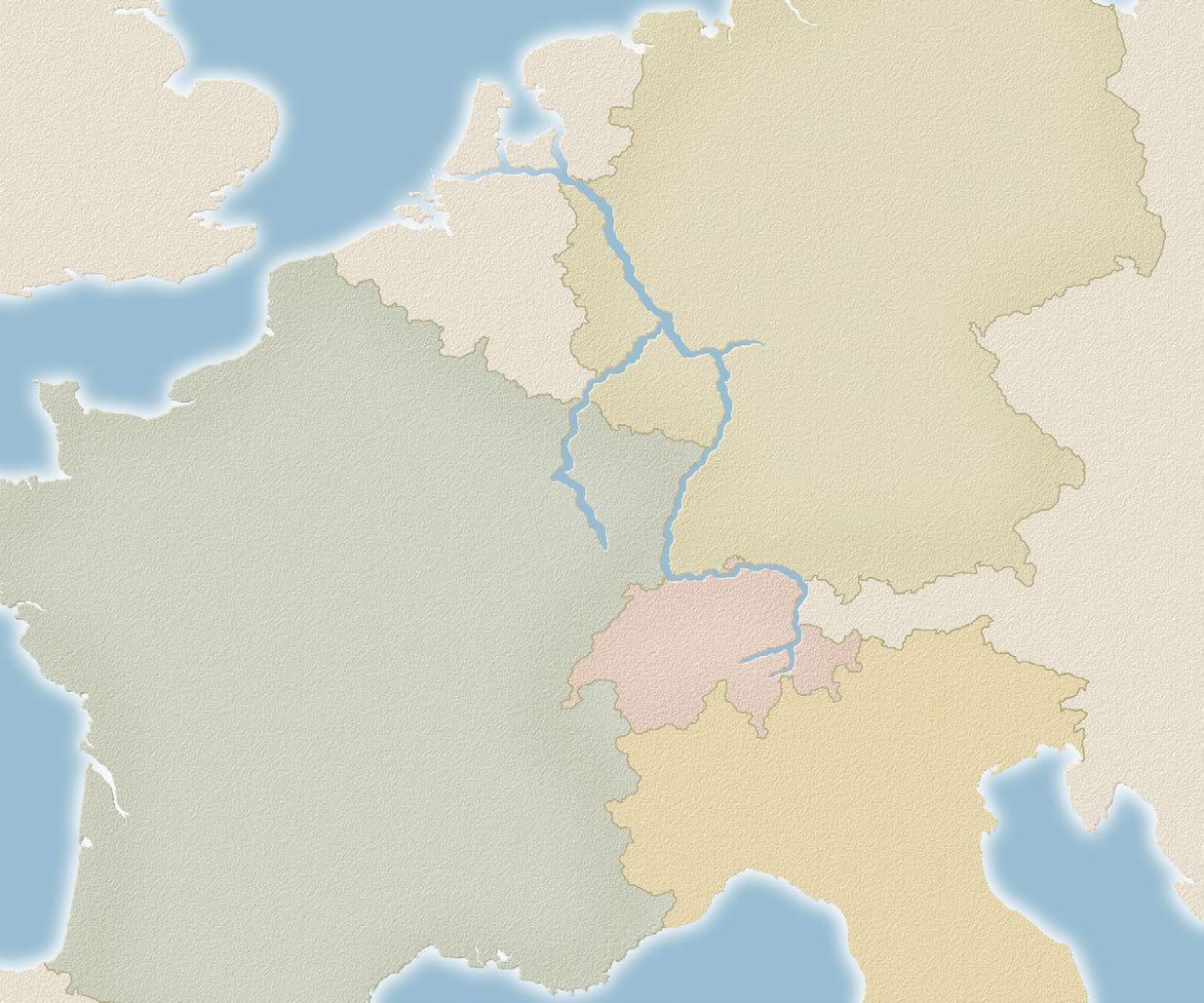
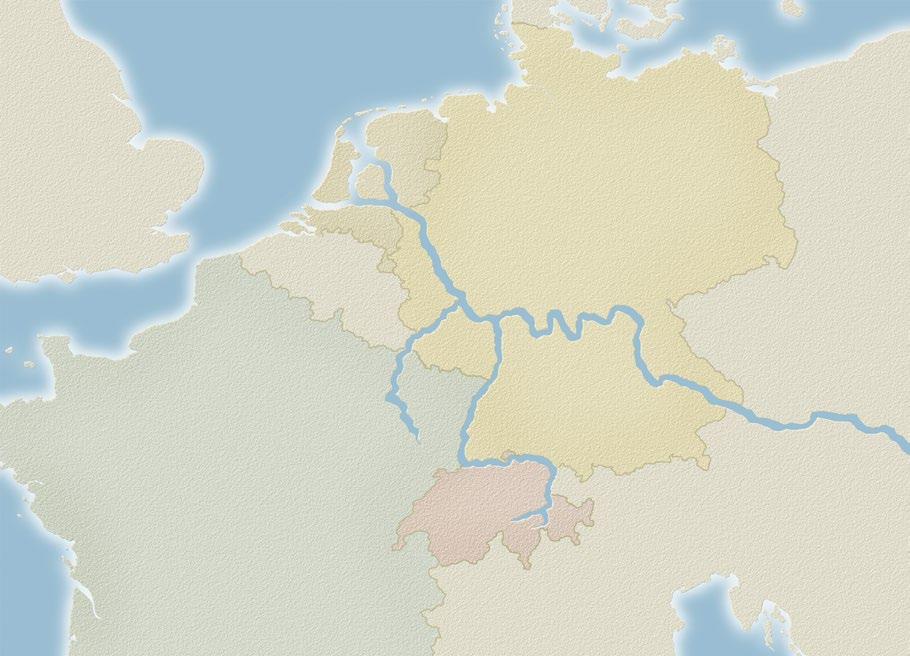
Paris to Zurich or vice versa
12 DAYS | 4 COUNTRIES
10 GUIDED TOURS
SET SAIL: MAR – NOV 2024; 2025
FROM $5,495PP
IN STANDARD STATEROOM SAVE UP TO $2,000 PER COUPLE
Basel or vice versa
8 DAYS | 4 COUNTRIES
9 GUIDED TOURS
SET SAIL: NOV–DEC 2024; 2025
FROM $3,795PP
IN STANDARD STATEROOM SAVE UP TO $2,000 PER COUPLE
LYON, PROVENCE & THE RHINELAND
Amsterdam to Avignon or vice versa
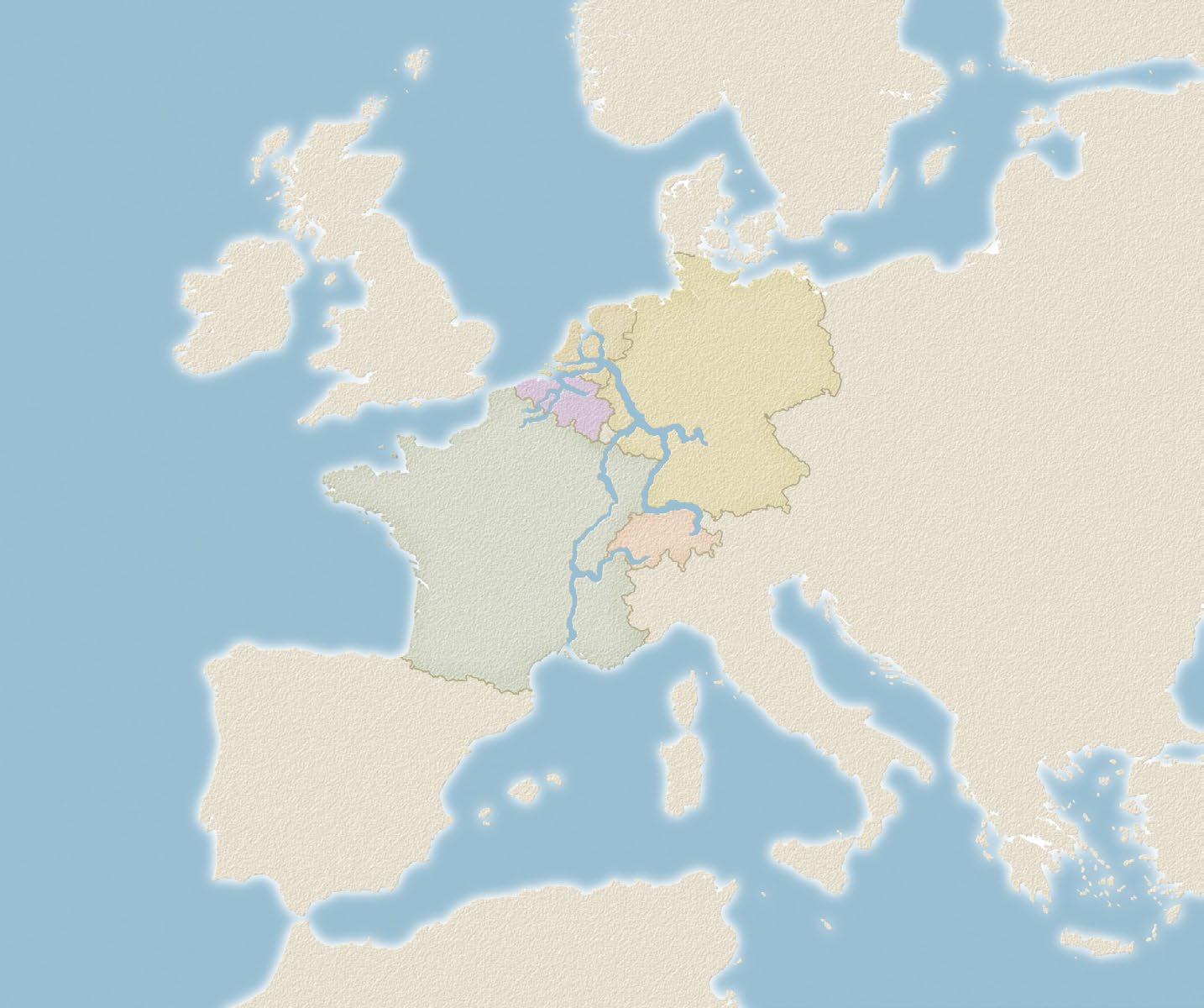
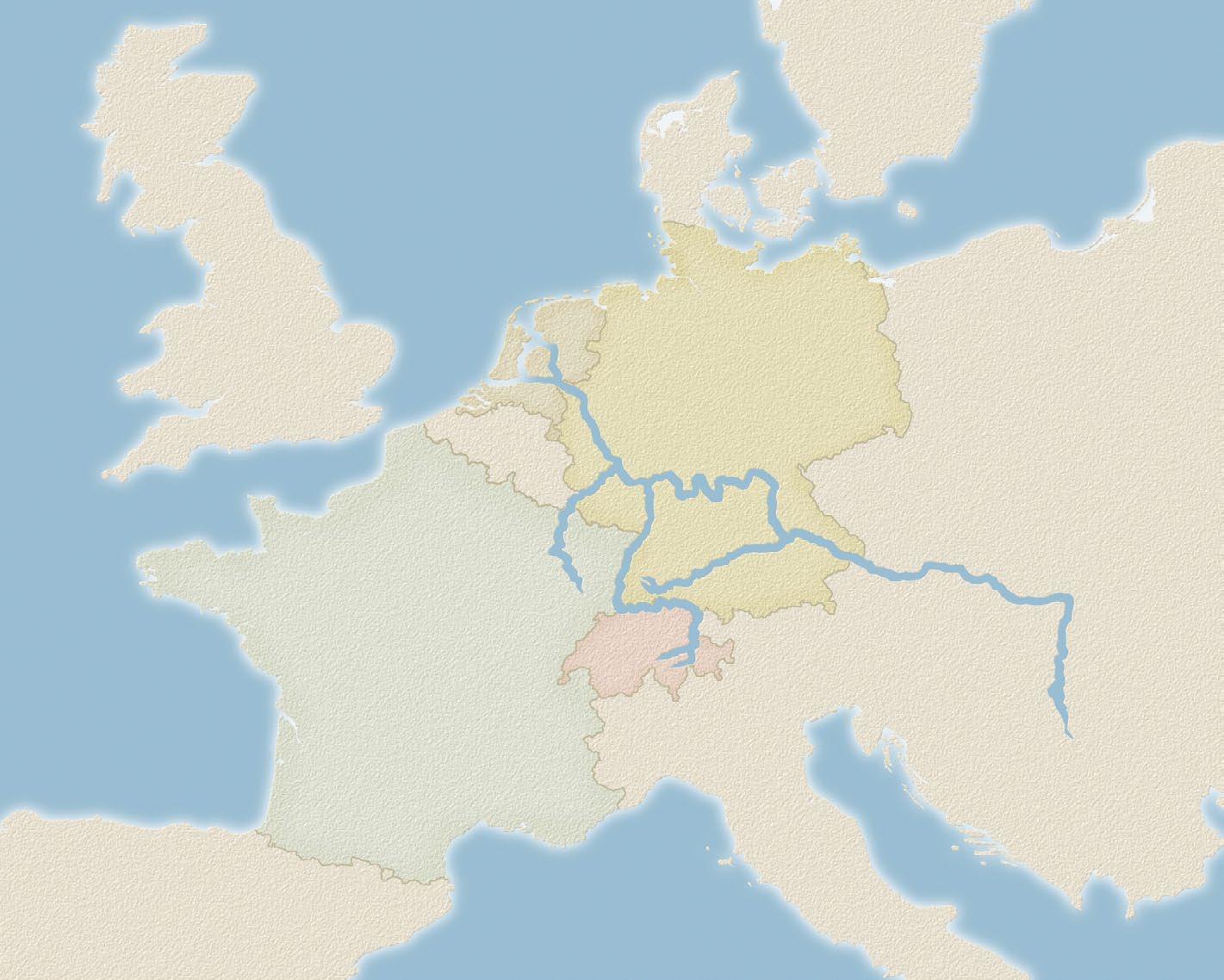

15 DAYS | 4 COUNTRIES
14 GUIDED TOURS
SET SAIL: MAR – NOV 2024; MAY– NOV 2025
FROM $6,895PP
IN STANDARD STATEROOM SAVE UP TO $4,600 PER COUPLE
GRAND
EUROPEAN
Amsterdam to Budapest or vice versa

15 DAYS | 4 COUNTRIES
12 GUIDED TOURS
SET SAIL: 05 NOV 2024; 26 NOV 2025
FROM $4,995PP IN STANDARD STATEROOM SAVE UP TO $6,600 PER COUPLE
EUROPEAN

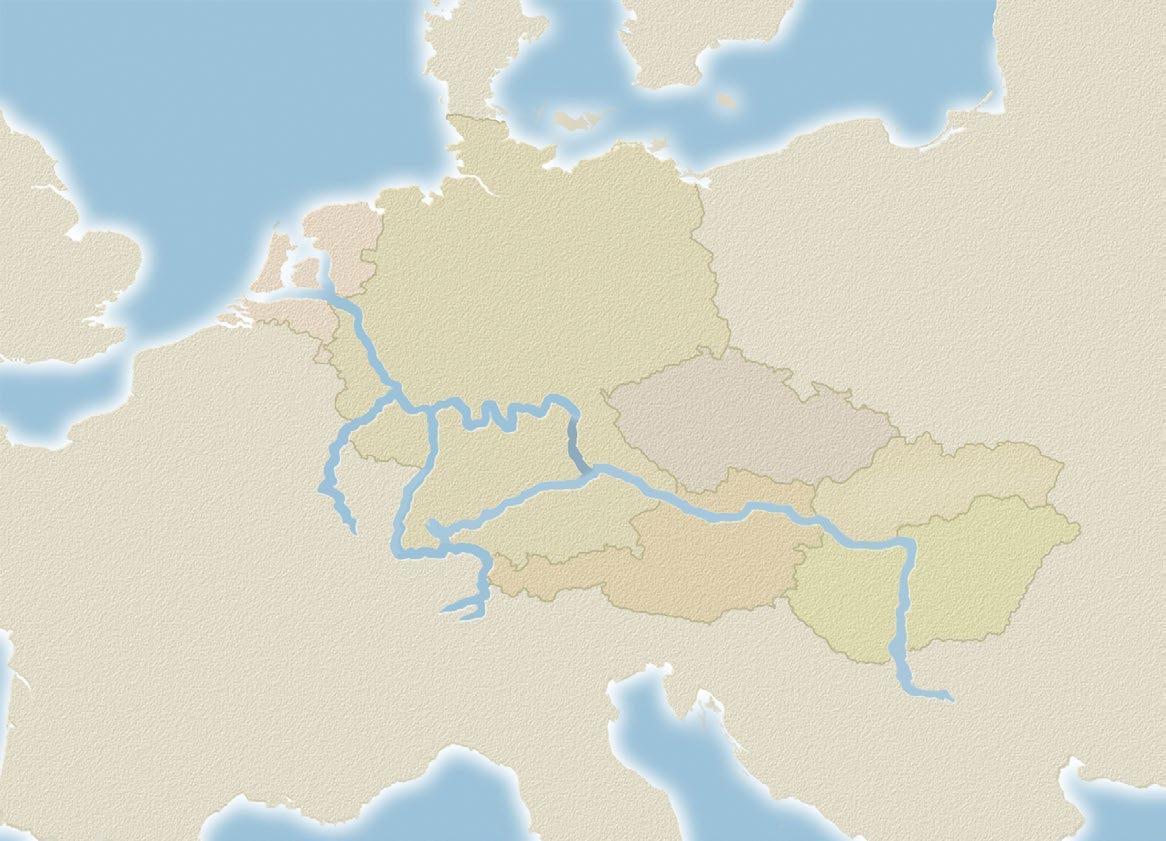
Amsterdam to Bucharest or vice versa
23 DAYS | 8 COUNTRIES
19 GUIDED TOURS
SET SAIL: APR – OCT 2024; 2025
FROM $10,995PP IN STANDARD STATEROOM SAVE UP TO $4,600 PER COUPLE viking.com
Join
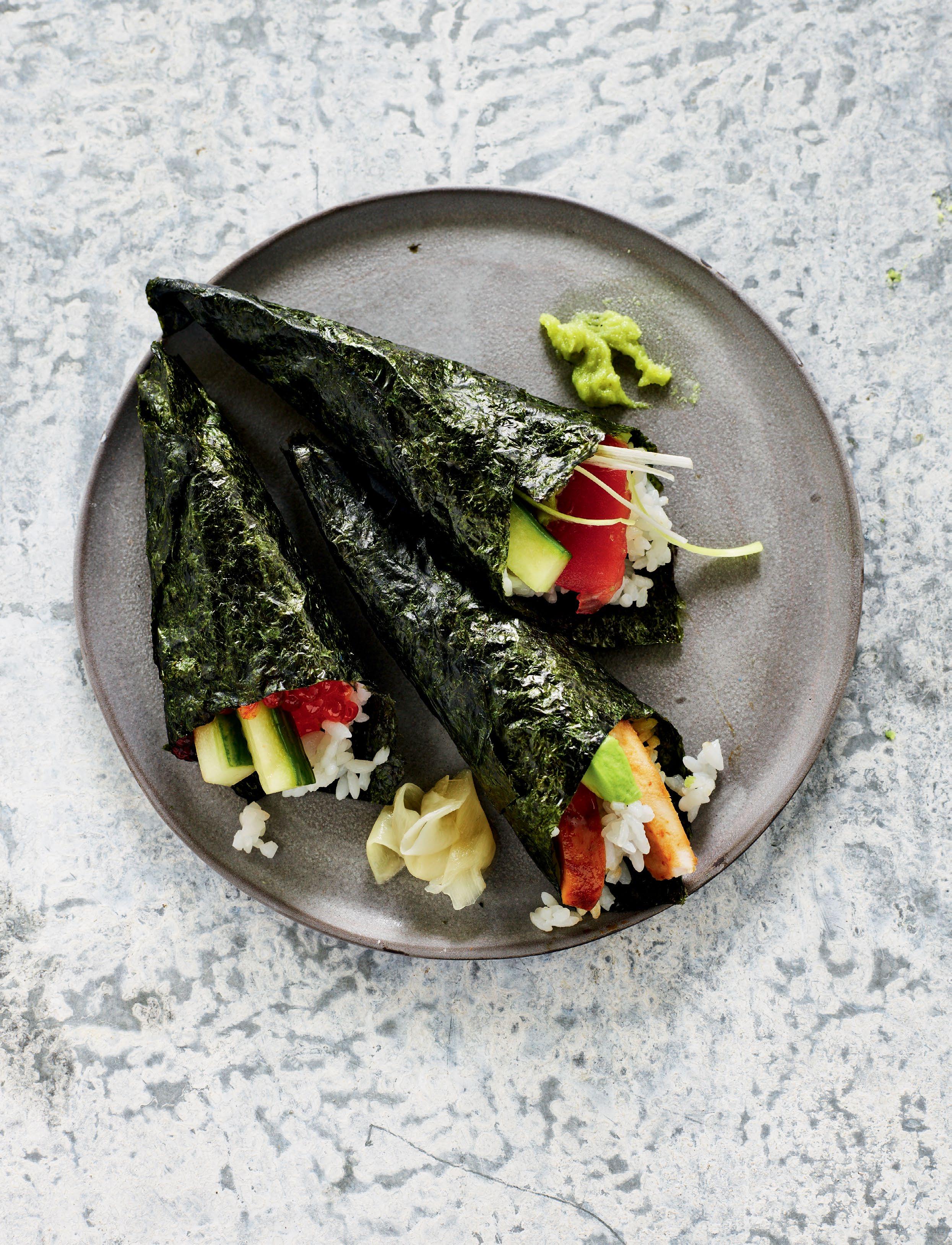
Serves 4
INGREDIENTS:
200g (7oz) sushi rice
60ml (2 fl oz) rice vinegar
1 tbsp sugar
½ tsp salt
1 pack sushi nori sheets
FOR THE FILLINGS:
Sushi grade fresh tuna
Salmon roe
Teriyaki chicken
Avocado
Cucumber
Shrimp
Wasabi
Sushi ginger
1. Cook the rice according to the packet instructions. Mix the rice vinegar, sugar and salt and stir through the rice. Allow to cool.
2. Cut the nori sheets in half and assemble all the fillings, cut into small 10cm (4 inch) strips.
3. To assemble the temaki, spread a layer of rice over each nori sheet, then add fillings to taste. Roll into a cone shape, and moisten one edge before pressing to seal.
Serves 4
INGREDIENTS:
2 egg whites
6 tbsp lingonberry jam
1 tsp vanilla extract
1 tsp caster sugar
TO GARNISH:
Lingonberry jam
1. Place all the ingredients into the bowl of a food mixer (make sure the bowl is really clean).
2.Whisk on the highest setting until the mousse increases in volume and forms soft peaks.
3. Serve piled into individual glasses and garnish with some extra lingonberry jam.

Serves 4
INGREDIENTS:
450g (1 lb) cherry tomatoes
2 tbsp olive oil
2 cloves garlic, crushed
450g (1 lb) squid, prepared and sliced
2 tbsp olive oil
2 cloves garlic, finely chopped
1.2l (2 ½ pints) fish stock
2 tbsp butter
1 small onion, chopped
355g (12 ½ oz) Carnaroli risotto rice
150ml (5 fl oz) white wine
Salt and pepper
1 x 4g sachet squid ink
1. Prepare the cherry tomatoes. Blanch briefly in boiling water, then remove with a slotted spoon, peel and chop.
2. In a frying pan, heat the olive oil, then add the crushed garlic and the squid. Sauté really fast and remove from the pan as soon as the squid starts to curl. Reserve and keep warm.
3. In the same pan, add a further 2 tbsp of olive oil and the chopped garlic. Fry the garlic until golden and then add all of the chopped cherry tomatoes. Cook gently until reduced and thickened, then add in the squid. Season with salt and pepper, then keep warm.
4. For the risotto, heat the fish stock in a saucepan, then in a heavy-based pan melt the butter, add the onion and cook for five minutes until soft without colouring the onion. Add the rice and stir well, coating in the oil, then add the white wine. Cook the rice until all the wine has been absorbed, stirring all the time.
5. Begin to add the warm fish stock, a ladle at a time, stirring the risotto constantly and never allowing it to dry out. Add the squid ink to the risotto and keep stirring, then keep adding the stock until the rice is just tender and the risotto is slightly runny. This should take approximately 15 minutes or so.
6. Serve the risotto and top with the squid in tomato sauce.
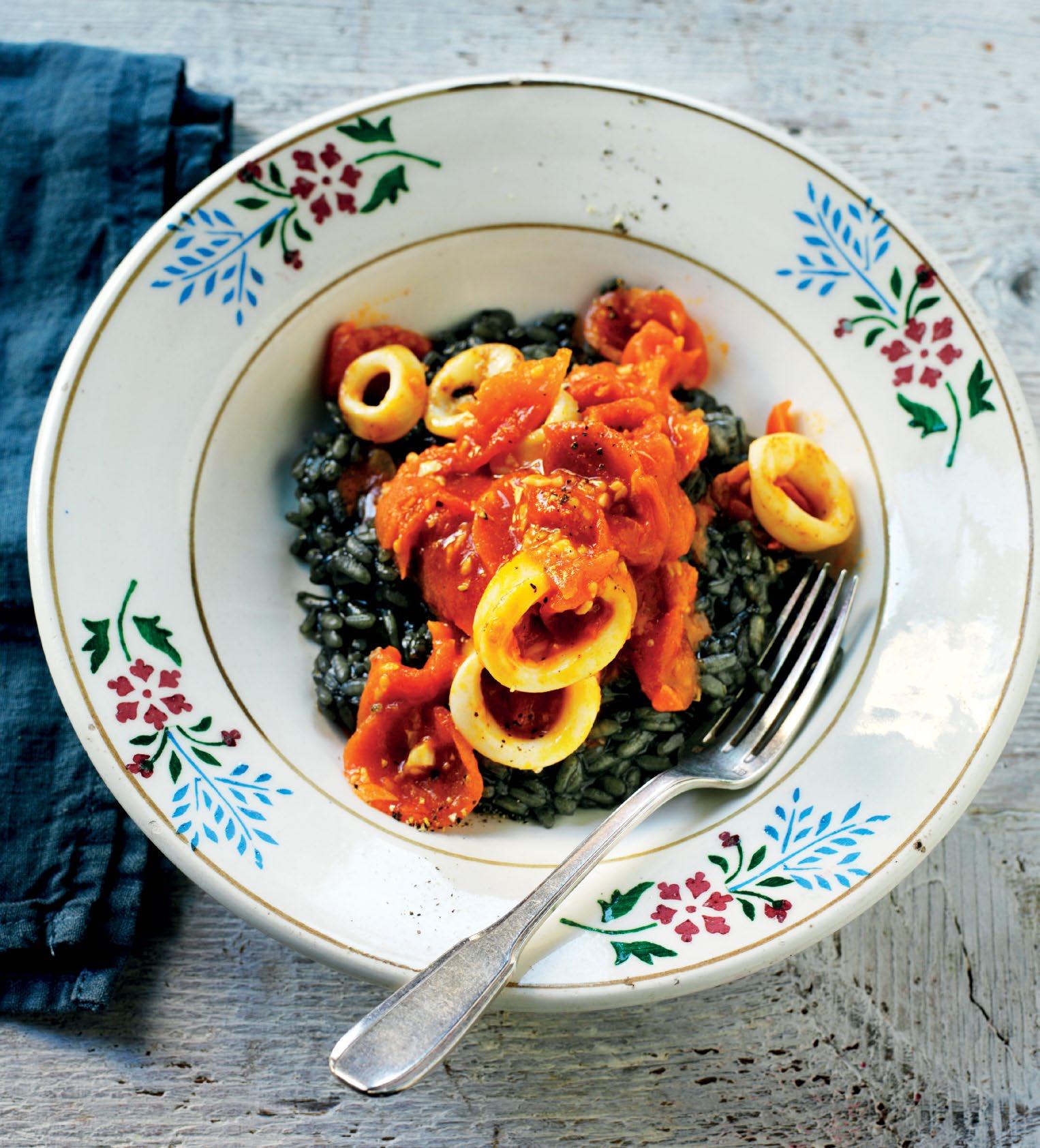
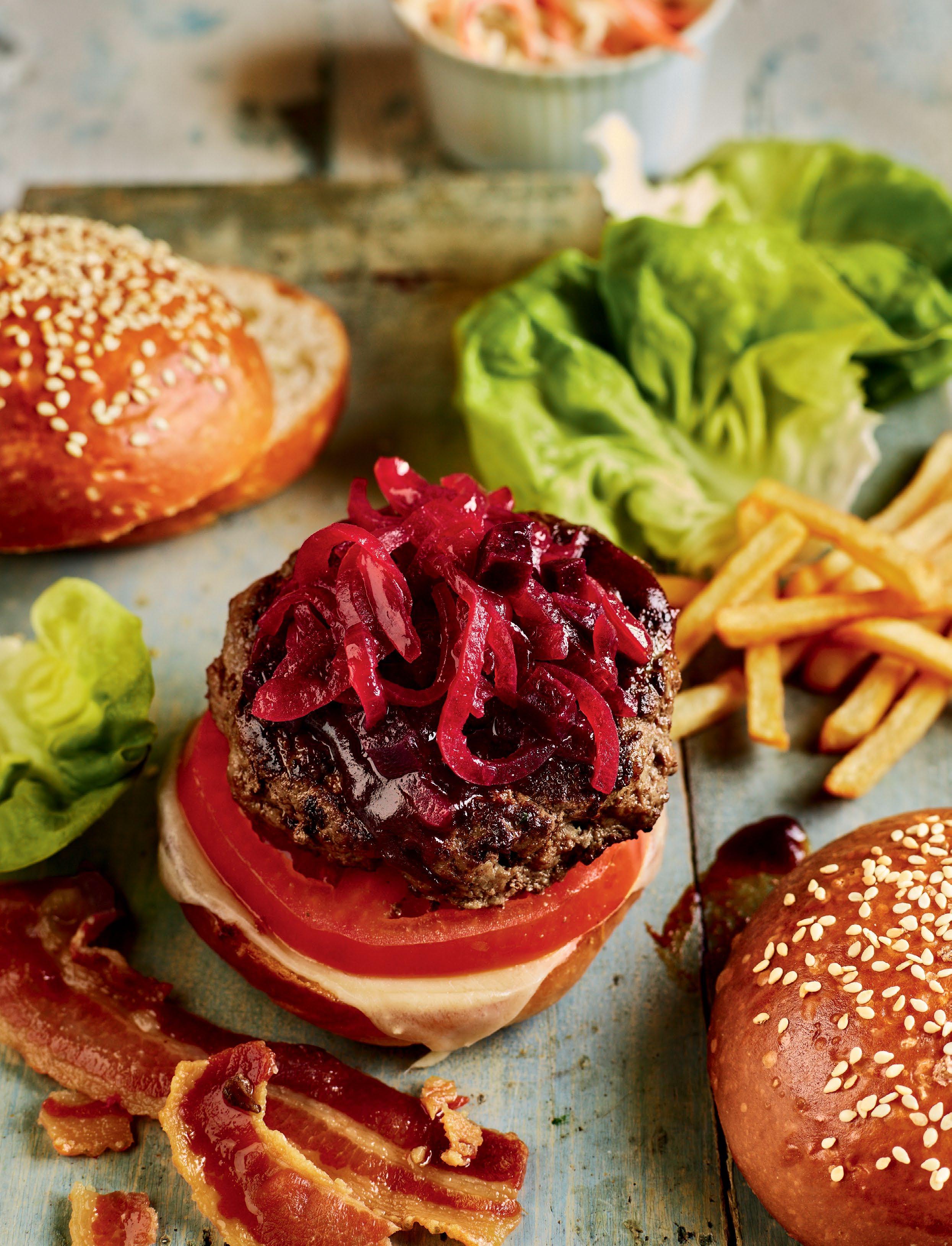
Serves 6
INGREDIENTS:
6 sesame-seeded buns
6 slices cheddar cheese
6 slices pancetta
Smoky barbecue sauce
FOR THE BEEF PATTIES:
900g (2 lb) minced beef
1 egg, beaten
1 tbsp Worcestershire sauce
70g (2 ½ oz) dry breadcrumbs
FOR THE ONION RELISH:
4 tbsp butter
Pinch salt
6 red onions, sliced
175ml (6 fl oz) orange juice
100ml (3.5 fl oz) red wine vinegar
2 tbsp rice wine vinegar
4 tbsp honey
1 small beetroot
TO SERVE:
French fries
Coleslaw
Lettuce and tomato
Sweet pickled gherkins
1. To make the burger patties, mix the minced beef, egg, Worcestershire sauce and breadcrumbs together in a large bowl. Shape into six generous burgers, then chill until required.
2. For the red onion relish, melt the butter in a heavy-based pan and add in the onions. Sprinkle over the salt, then cook gently until soft and translucent, but not coloured. Add in the orange juice and both vinegars, then stir in the honey and the thinly-sliced beetroot.
3. Continue to cook gently until all the excess liquid has evaporated and the mixture has thickened. Allow to cool.
4. Season the burger patties with salt and pepper, then grill for about 3-5 minutes on each side (depending on your preferences).
5. Meanwhile, toast the burger buns and add a slice of cheddar to the bottom half. Place the cooked burgers onto the cheese. As you remove the burgers, add the slices of pancetta to the grill to crisp up.
6. Top each burger with a spoonful of the onion relish and a squeeze of barbecue sauce. Finish with the crispy pancetta before adding the top half of the bun. Serve with French fries, coleslaw, crunchy lettuce and slices of tomato, and a few sweet-pickled gherkins.
TARTE TATIN

Serves 6
INGREDIENTS:
100g (3 ½ oz) caster sugar
55g (2 oz) butter
6 dessert apples
2 tbsp butter
320g (11.2 oz) puff pastry
1. Preheat the oven to 175°C. Heat the sugar and butter over a medium heat until it turns a deep golden brown. Don’t allow the caramel to burn.
2. Peel and halve the apples, scooping out the seeds with a spoon. Place all the apples in the caramel and cook, moving them around in the caramel,
for approximately 10 minutes. Next, in a 23cm (9 inch) diameter oven proof dish or pan, arrange the apple halves, rounded side down.
Fill in any gaps with cut apples and dot with small pieces of butter.
3. Roll the pastry out into a circle, slightly larger than the pan and about 5mm (0.2 inch) thick. Place the disc of pastry over the caramelized apples, tucking the edges in all around the dish. Brush with melted butter.
4. Bake for around 30 to 40 minutes, or until the pastry is golden brown and the caramel is starting to ooze from the tart. Leave to cool for an hour before serving.
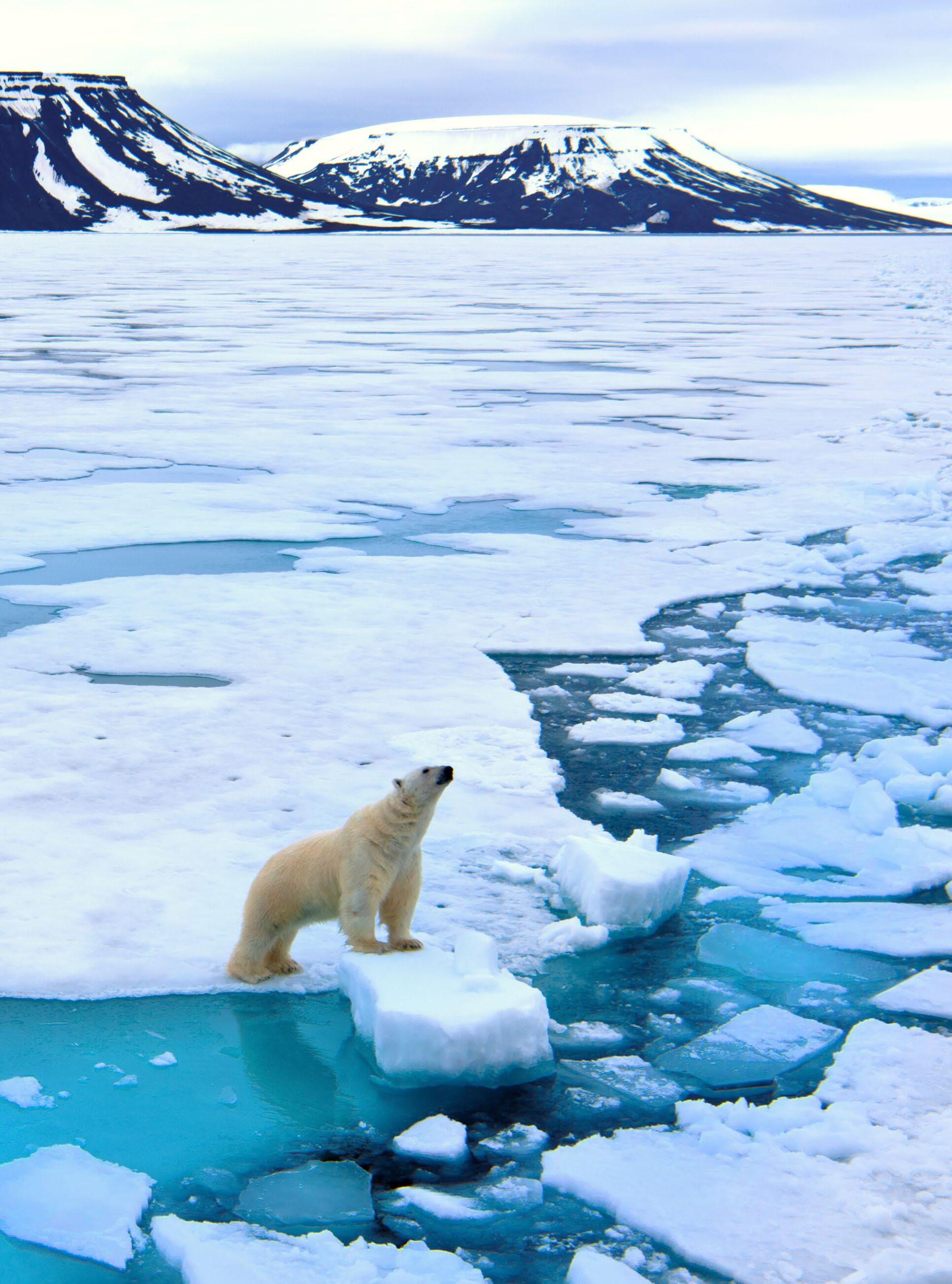
The planet’s northernmost body of water, the Arctic Ocean is characterised by floating icebergs, otherworldly icy landscapes and freezing temperatures. A seemingly stark and inhospitable part of the world, this magical ocean is home to an array of wildlife and is of fundamental importance to the rest of the planet. This somewhat bleak and remote region plays a crucial role in keeping the world’s climate in balance, controlling the temperature and weather systems across the world.
The Arctic consists mainly of the Arctic Ocean, as well as portions of land belonging to Canada, Greenland, Russia, Norway, Sweden, Finland, Iceland and the US. The North Pole is right at its heart, permanently covered in sea ice and located 690km north of the northern tip of Greenland.
An enduring fascination with the Arctic has driven explorers to the North Pole for decades, with man attempting to take on nature and reach the top of the world, risking life and
limb in doing so. Records suggest that the Arctic Ocean was first explored around 325BC, when the ancient Greek sailor Pytheas reached a frozen sea while trying to find the source of tin metal.
Ever since, stories have regaled of pioneers, adventurers and explorers attempting to reach polar regions, with European and American explorers particularly engaged in the 19th and 20th centuries. Some intrepid explorers – John Cabot, Henry Hudson and James Cook to name a few – attempted to navigate the frozen tundra in search of the Northwest Passage, connecting the Atlantic and Pacific Oceans, whilst Wally Herbert became the first confirmed person to walk to the Pole as part of an incredible 6,115km crossing.
Despite its freezing and barren landscape, the Arctic is home to around four million people, including indigenous groups with rich cultures that have thrived there for nearly 30,000 years. These include Inuit of North America, the Sami of Northern Europe and the Yakuts of Siberia who
have long inhabited this part of the world and successfully so. Visitors to the Arctic have the opportunity to experience life in remote communities based around historic Viking and Inuit settlements. There are many cultural activities to discover, such as watching locals performing throat singing – a traditional type of music performed amongst Inuit communities – and a wide range of Indigenous art on offer at local galleries.
Arctic wildlife has evolved over thousands of years to cope with the extreme polar temperatures. Diving down into the thick sea ice, much of the Arctic Ocean is pitch black, closed off from sunlight by ice cover, but photographers diving further with equipment and lights are able to expose the reality of wildlife in the Arctic, which is rich and varied. At the bottom of the food chain in the dark Arctic depths lurks plankton – a food group that makes up the base of the Arctic food chain and consists of organisms like algae and bacteria, which in turn feeds creatures as large as bowhead whales.
The coldest and northernmost of the world’s seas, the Arctic Ocean enchants with majestic icebergs and mystical frozen waters
Clockwise, from top left: An aerial view of icebergs in Greenland; a traditional building in Barentsburg, Svalbard, Greenland; reindeer herding is a way of life for many communities; seals are a common sight in Arctic waters; a Humpback whale tail fin in the Arctic Ocean; a traditional summer house of the Yakuts; the Arctic fox is hidden amongst the snowy landscape; wooden drinking cups crafted by Sámi artisans in northern Scandinavia
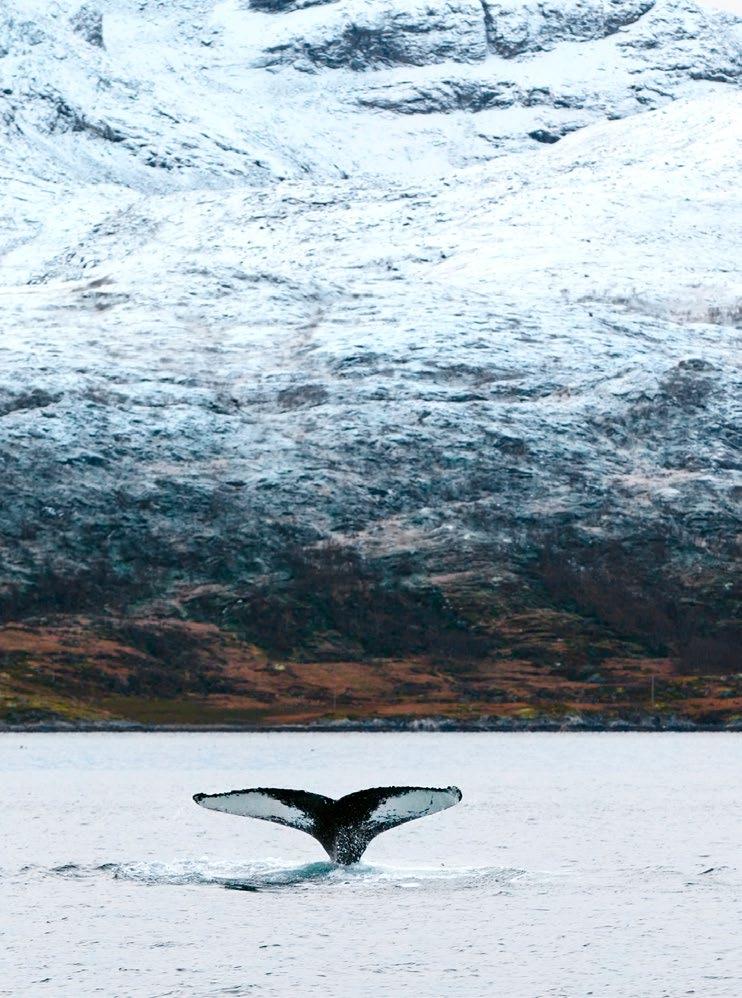
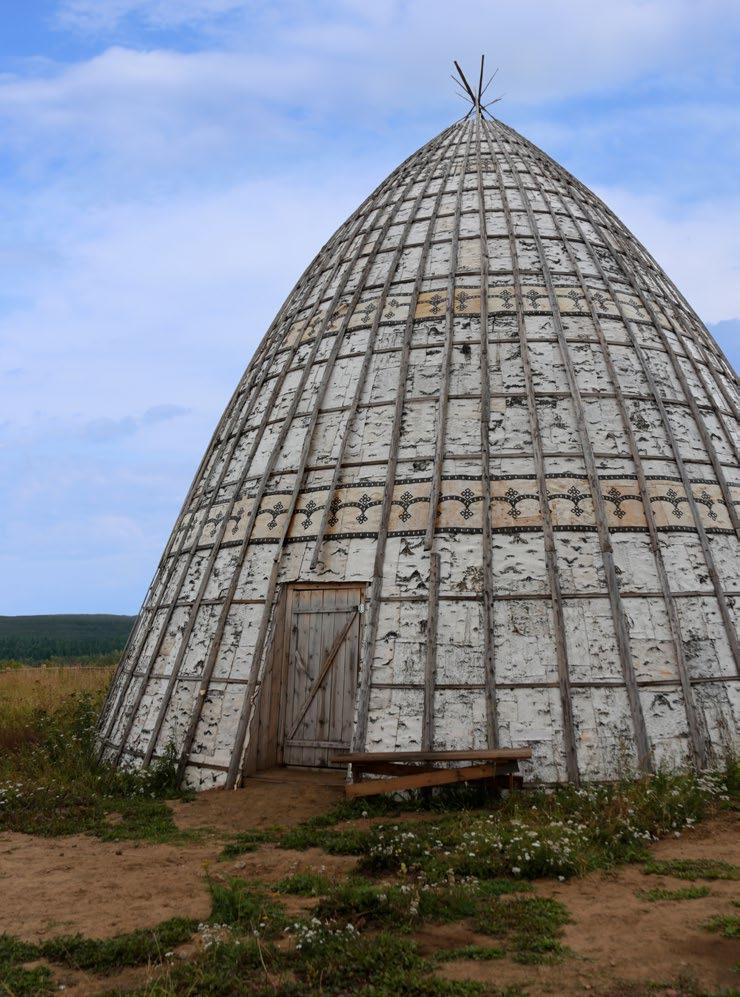
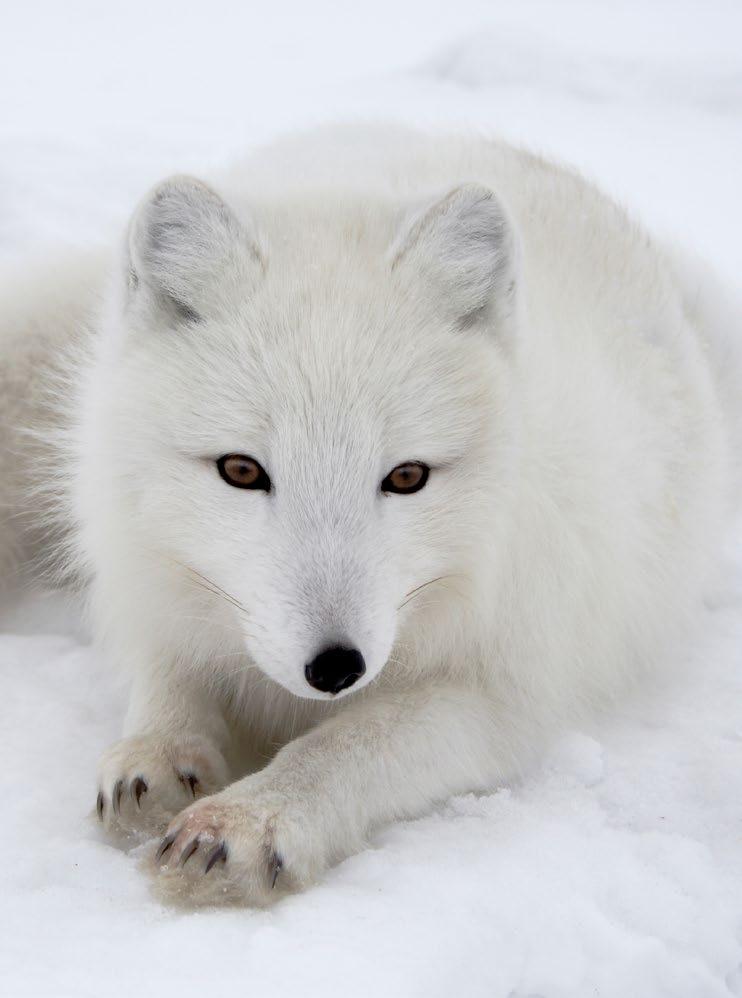
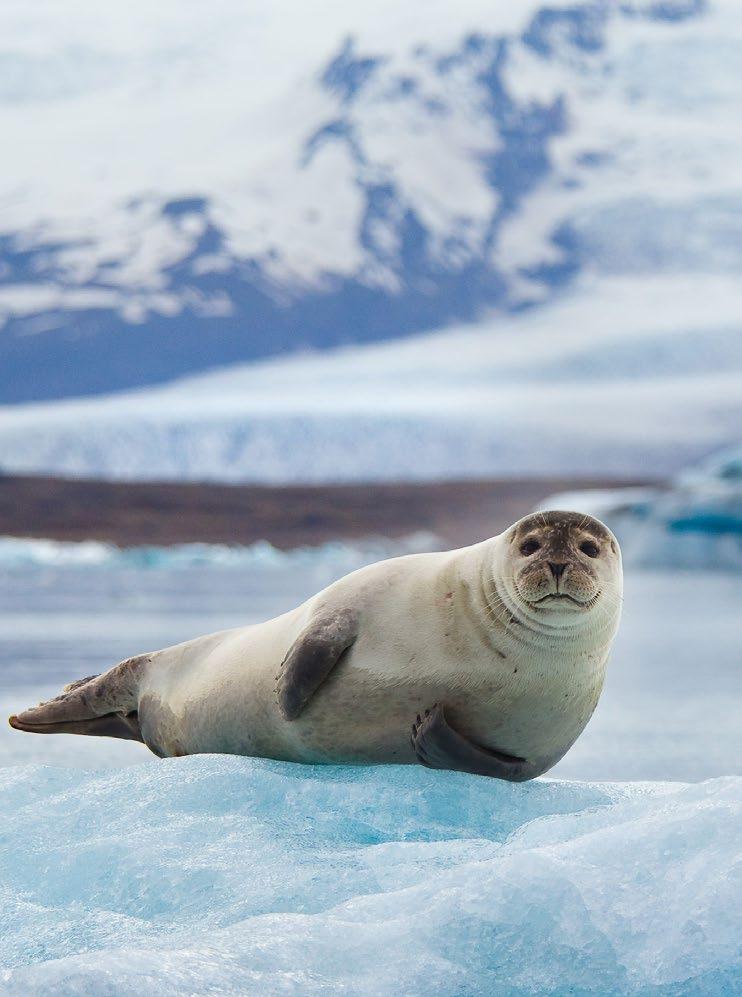
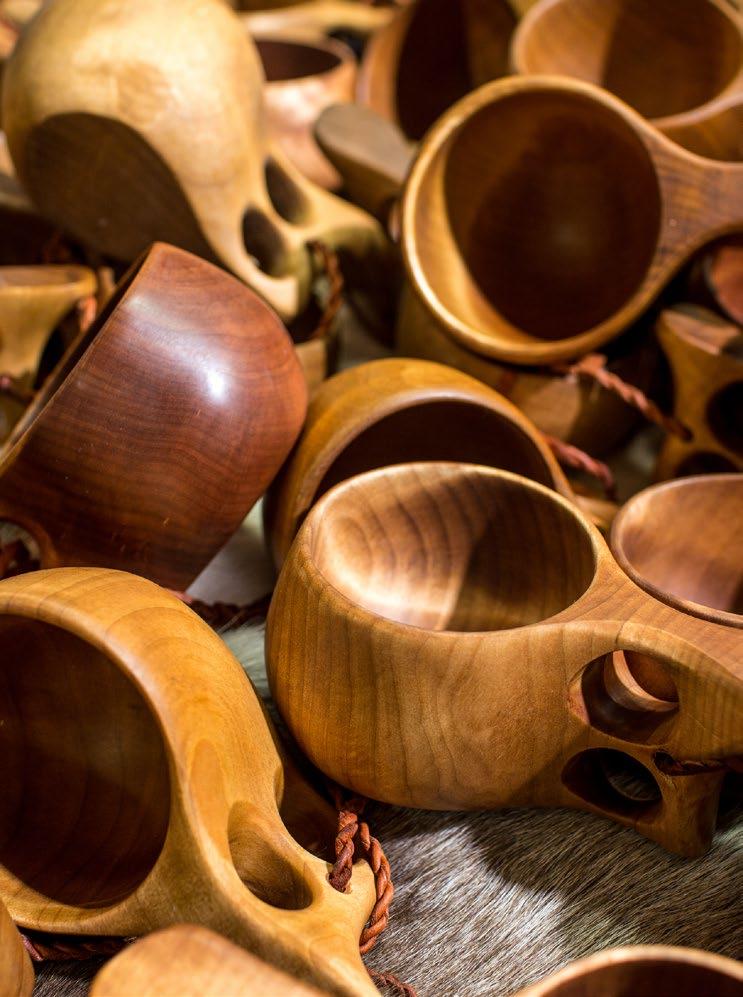
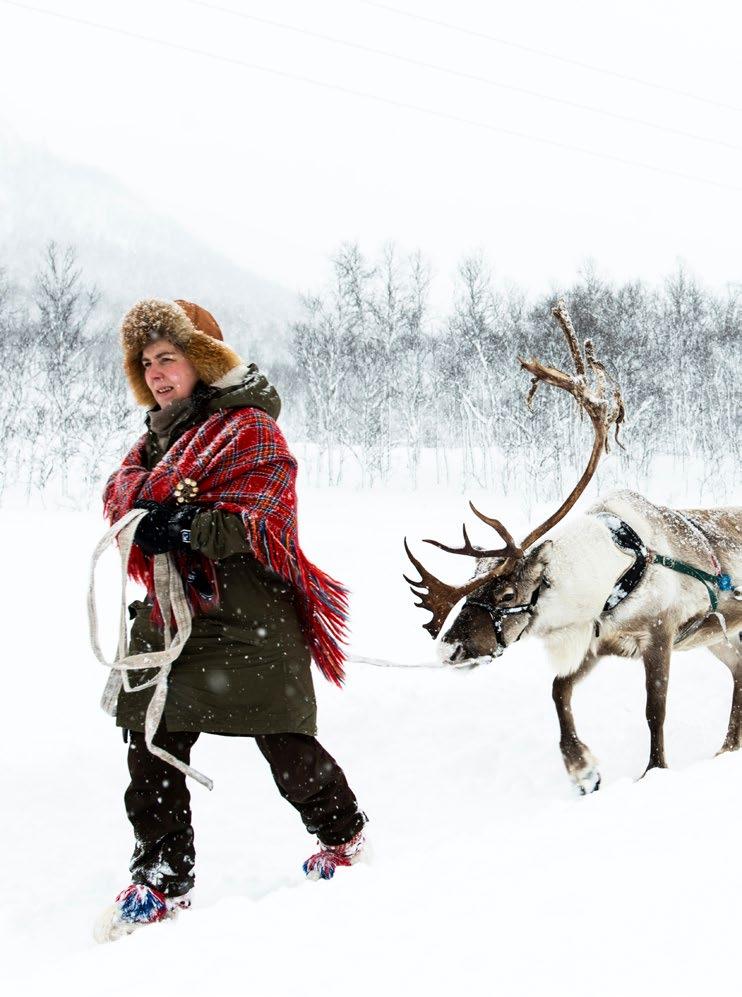
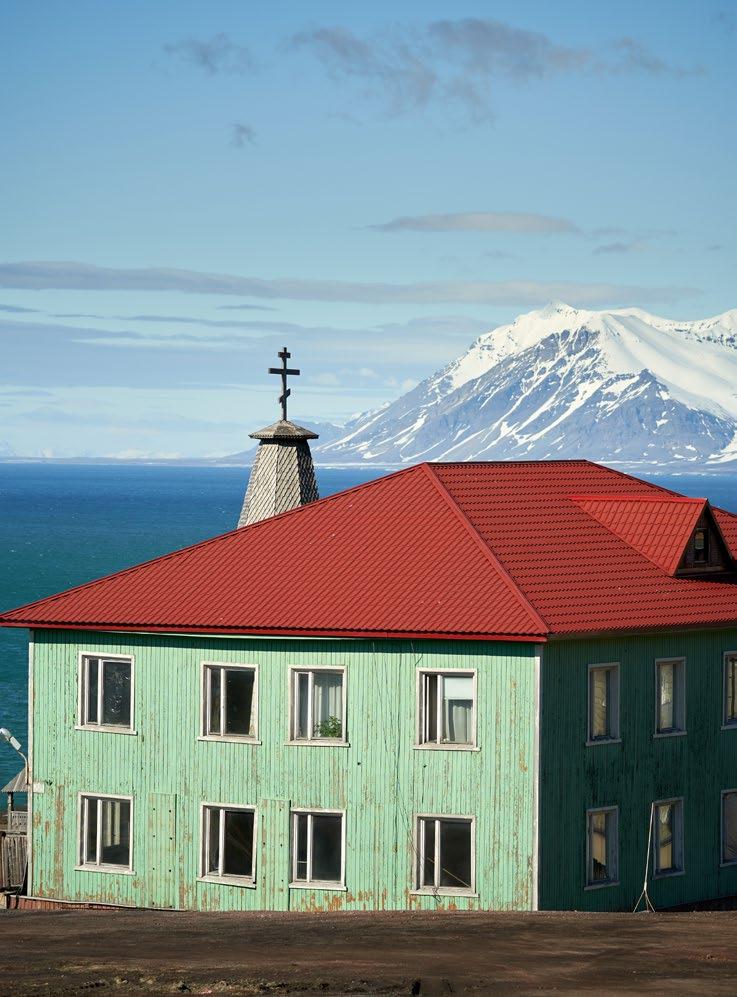
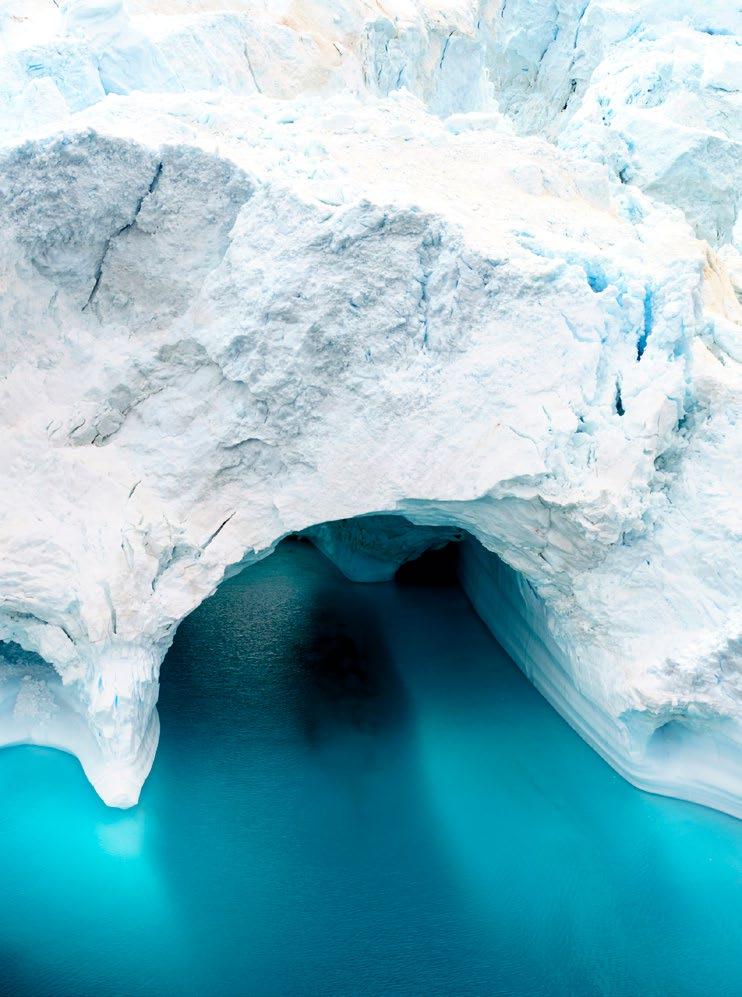
The larger creatures who have evolved to live in these remote climes include polar bears – with paddle-like paws and thick white fur that disguises them against a snowy backdrop. Walruses too can be found here, with large tusks that help propel their vast bodies along the ice. Other creatures you might find roaming the landscape include Arctic foxes, seals, orcas and reindeer, while the narwhal is one fascinating species found only in the northern hemisphere, often referred to as the ‘unicorn of the sea’ because of its straight tusk projecting from its head that can grow to over 3 metres in length.
Though it is the smallest of the world’s oceans, spanning a meagre 9.8 million square km, the Arctic Ocean is one of the most significant areas on our planet. The ice of the Arctic contains around 10 percent of the world’s fresh water, and it’s the white frozen land mass reflected under sunlight that helps keep the region cool, and in turn the seasons and weather systems across the world. The waters are warming faster than anywhere else on Earth, and scientists are constantly looking to make sense of why this is, and how warming sea temperatures will change the Arctic Ocean waters and the world.
Studies have predicted all sorts of outcomes, from colder and more extreme winters to one 2016 study even predicting that ships would be able to sail through open water to the North Pole by 2040. The loss of ice and changes in weather caused by climate change are raising new challenges for wildlife – forcing animals that rely on ice, like polar bears and seals, to traverse the landscape in search of food. Climate change in the Arctic also raises important questions for those who live there, with local populations seeking new ways of living in harmony with their changing environment.

Clockwise, from above: Jørn Henriksen; the Arctic landscape; a polar bear with her three cubs spotted by Jørn at Wilhelmøya in Svalbard; Jørn’s great grandfather, Gustav Johannes, is the little boy in the upper left, alongside a group of Dutch tourists in Gibostad, North Norway, in 1893
Jørn Henriksen, Director of Expedition Operations at Viking Expeditions, discusses his relationship with the Arctic – the place he calls ‘home’
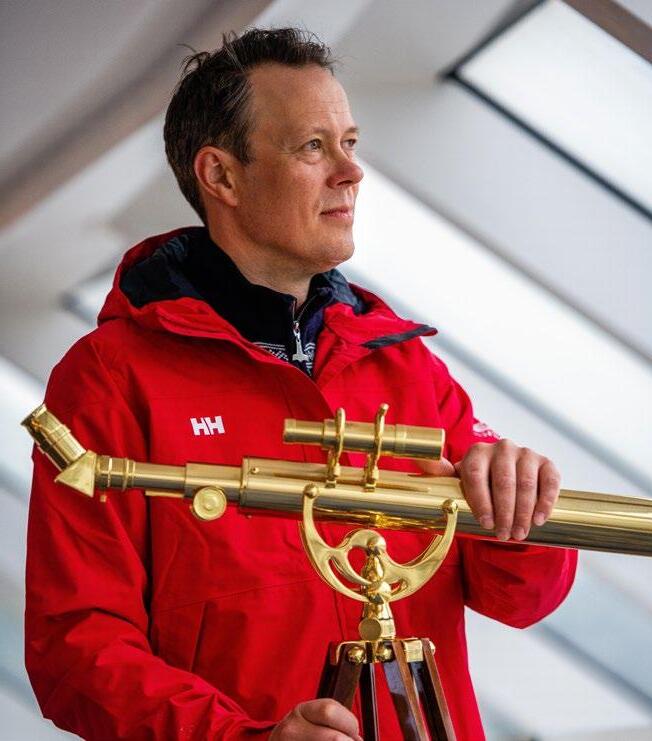
I’m Norwegian, born and bred in the city of TromsØ. Whilst many people consider the Arctic a romantic area – full of mysticism, legends and struggles in harsh conditions, expressed by phenomena like the Northern Lights, Santa Claus and stories about explorers attempting to reach an extremity – I call the Arctic home. It is the foundation both for my work and for my family. I have previously headed many expeditions across the Arctic throughout my career, and it is a real privilege to be part of the
Viking Expeditions team. My family is embedded in the Arctic, and via a branch on my fathers side, rooted in the indigenous Sámi people. The Sámi populate Fenno-Scandinavia (the northern part of Norway, Finland and Sweden) and they are perhaps best known for being reindeer herders. My great grandfather was Sámi, but during his lifetime his community was under an immense, state-driven pressure to assimilate and become ‘Norwegian’. As a result, he was given the name
Henriksen instead of taking the family name of Omma.
This part of my family history was ‘watered out’ and our Sámi identity became more distant with each passing generation. However, I’m immensely proud of my ancestors – they were Arctic experts, living in harmony with nature and exercising their ancient traditions, whilst the rest of the world was speeding into the Industrial Revolution.
If there is one thing that stands out for me about the Arctic, it must
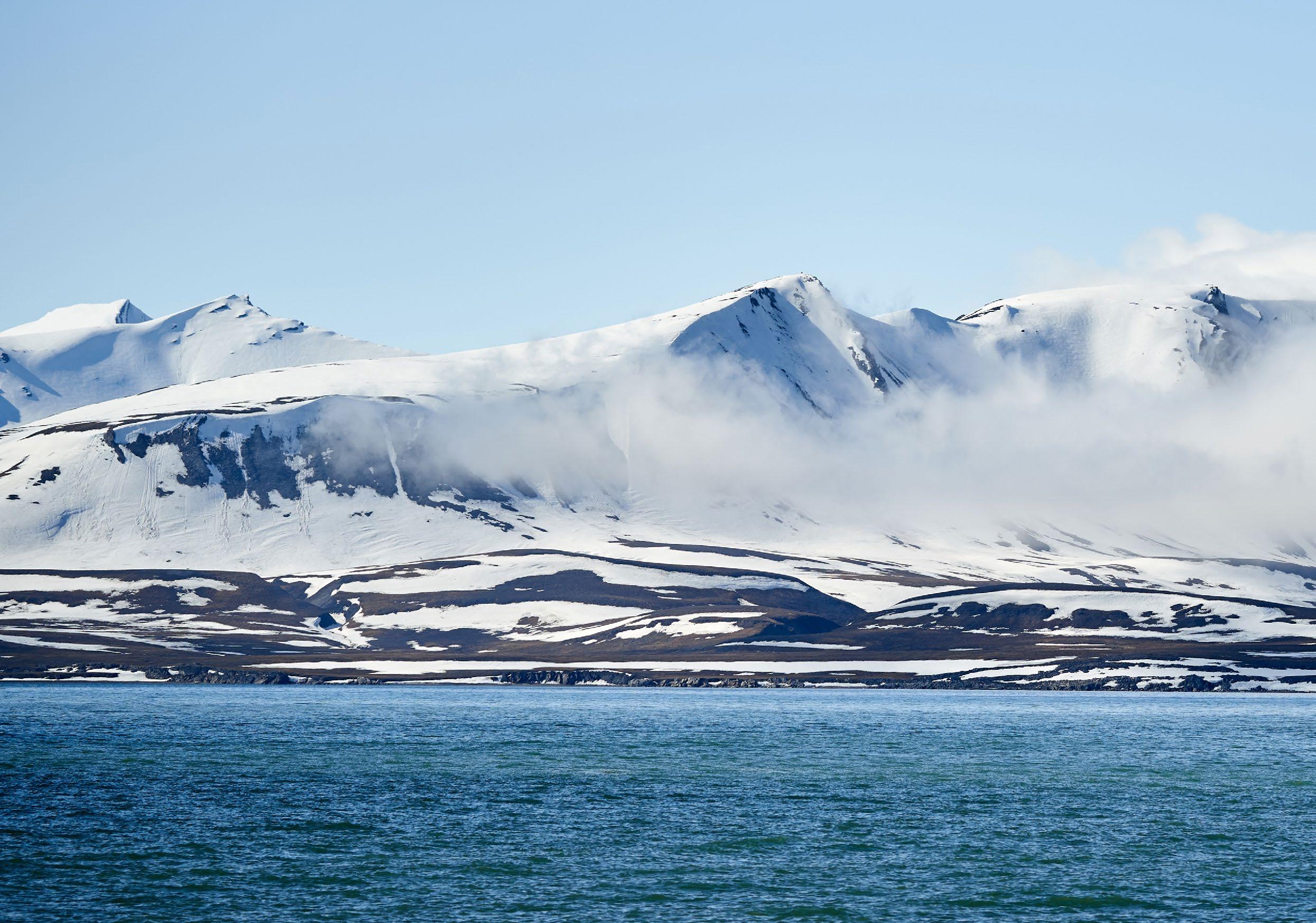
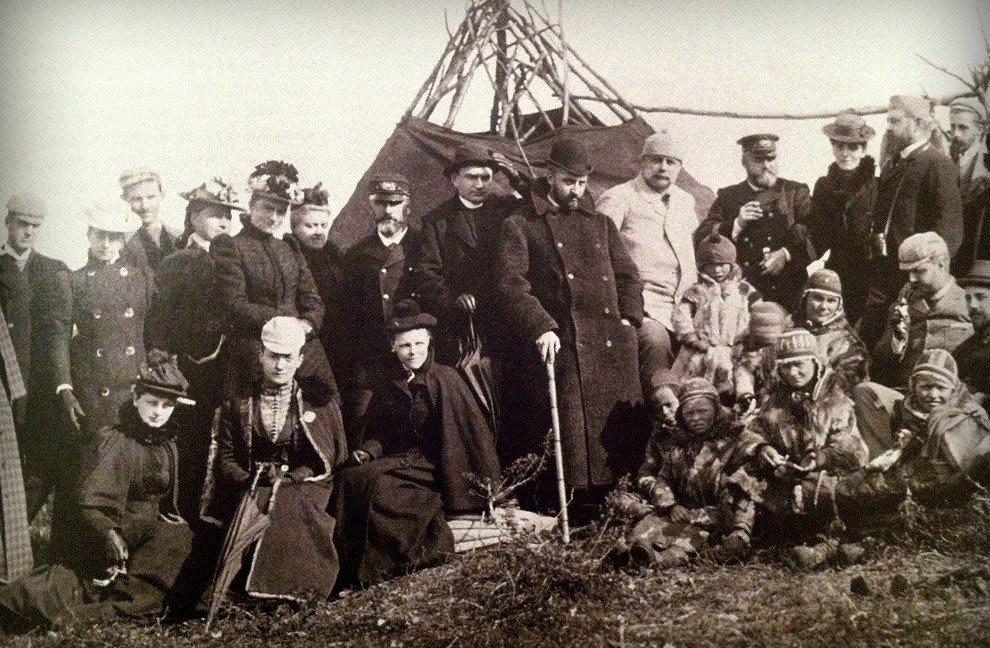
The Sámi are an indigenous people inhabiting Sápmi, which encompasses northern parts of Finland, Sweden, Norway and the Kola Peninsula of Russia. Descended from nomadic groups that once roamed northern Scandinavia, the Sámi are known for their close relationship with the natural world, in which reindeer herding, fishing and farming are all important traditional ways of life. Today, Sámi parliaments protect and promote the cultural autonomy and political interests of the Sámi at an international level.
be the midnight sun and the endless days of summer, when I can wander into nature without thinking of it getting dark. I also love the pitchblack mid-winter days when the sun is below the horizon, even at noon, and the aurora borealis dance across the sky in the evening.
These seasonal variations really dictate how I spend my spare time. They also make it a fantastic place to visit, both in summer and winter. I love the treeless tundra, featuring colourful high-alpine flora – a place that is so robust, yet subtle and delicate at the same time.
I have been so lucky to spend parts of my professional life as an expedition leader in what I call ‘The High Arctic’ – areas between 74° and 81° North. The archipelago of Svalbard and the north-eastern part of Greenland have really been etched into my mind. As opposed to the Arctic part of the Norwegian
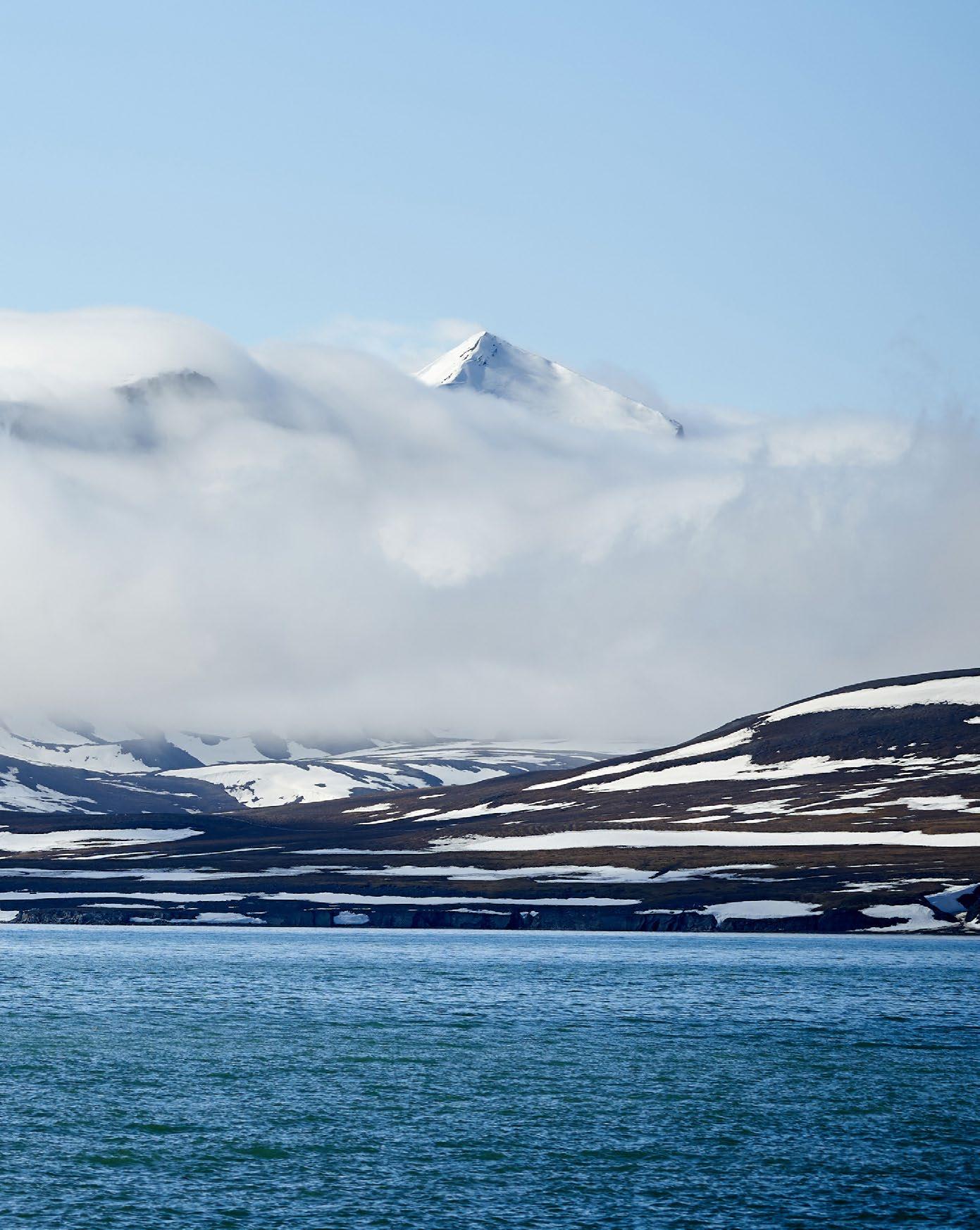
mainland, these are areas where polar bears, muskox, polar wolves, arctic fox and the allwhite version of peregrine falcon roam. These are extreme places where travelling in nature requires particular skills, places where you quickly learn that, if you attempt to defy nature, you may put your life in danger. For many inhabitants of the Arctic, being in the wilderness is second nature and nothing to talk about. However, I believe
that my appreciation of the fact that I come from a place that is inhospitable to many is something I have been able to harness in my choice of profession. Above all, I love seeing visitors mesmerised by the immense beauty of the Arctic.
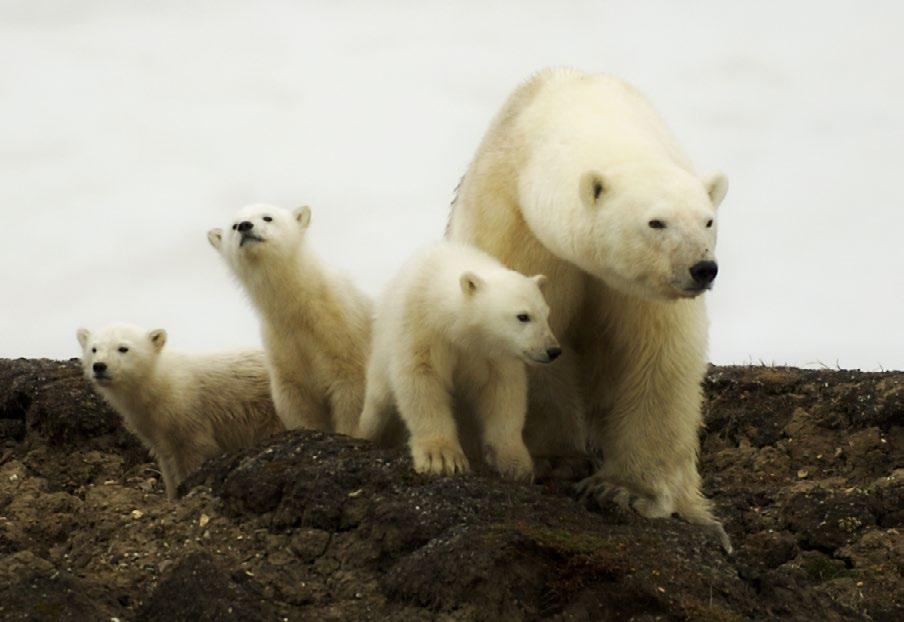
The wildlife of the Arctic region is a testament to the resilience and adaptability of nature, embodying a delicate balance between survival and harmony in one of the harshest environments on Earth. Each creature that inhabits this region has its own story to tell, weaving a rich tapestry of life and adaptation in one of the planet’s most extreme environments.
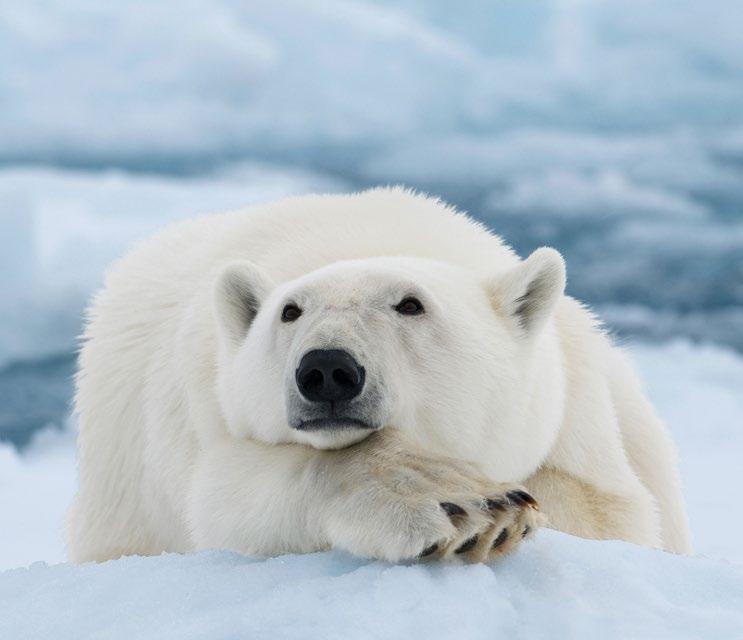
Within the Arctic waters, majestic whales command attention with their graceful presence. Polar bears, the iconic symbol of the Arctic, are perfectly adapted to survive the harsh conditions of the Arctic. Migratory birds grace the Arctic skies, embarking on incredible journeys across continents. Other notable wildlife in the Arctic includes the Arctic fox, the elusive Arctic wolf and the musk ox.
A marine mammal, they are the largest bear in the world and superbly adapted to survive in the Arctics harsh conditions. They spend most of their time on sea ice hunting for food.
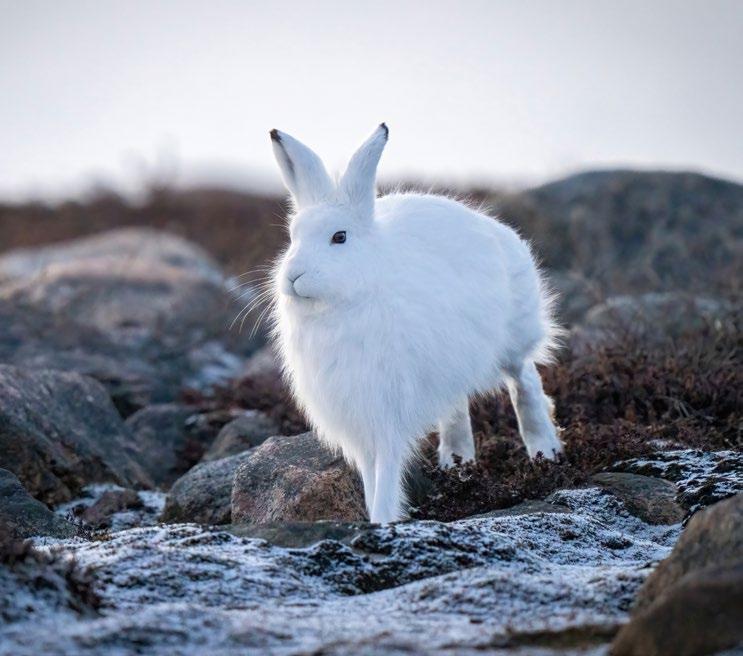
Their long hind legs allow them to travel at speeds of more than 60 km an hour. In some areas of the Arctic they shed their fur changing colour from white to brown with the seasons.
See black-legged kittiwakes, greater snow geese and the Arctic tern who embark on incredible journeys, flying from the Arctic to the Antarctic and back.

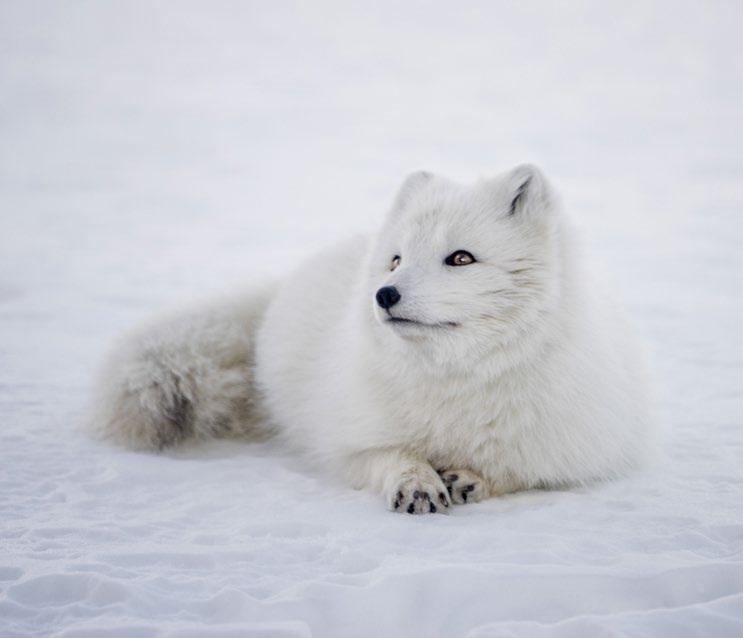
Camouflaged against the snow, the Arctic fox is a marvel of adaptation, their thick fur coat and fluffy tails keep them warm allowing them to thrive in extreme conditions.
Home to 17 species including humpback, fin and minke whales who migrate to the region, while beluga and bowhead whales reside almost entirely in the Arctic year round.
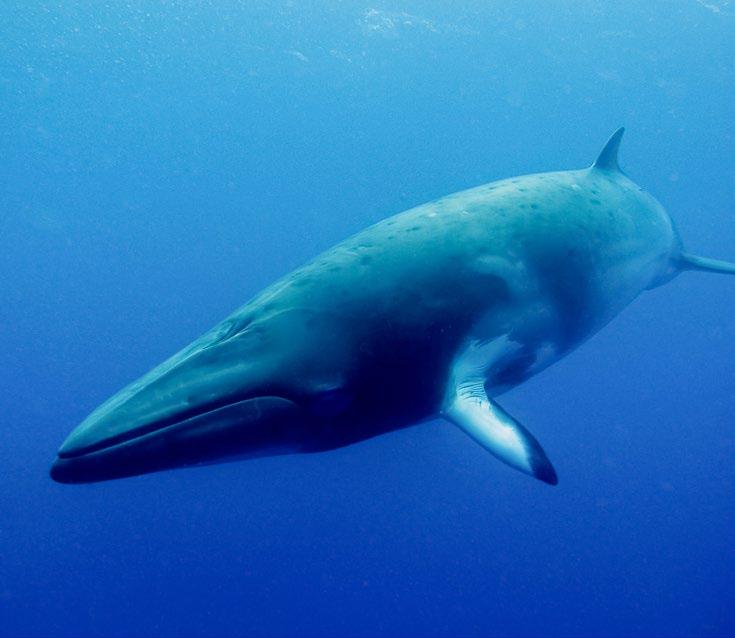
With their shaggy coats and imposing horns, these Arctic natives roam the tundra in search of lichens and vegetation. As their name suggests, males emit a musky odour during mating season.
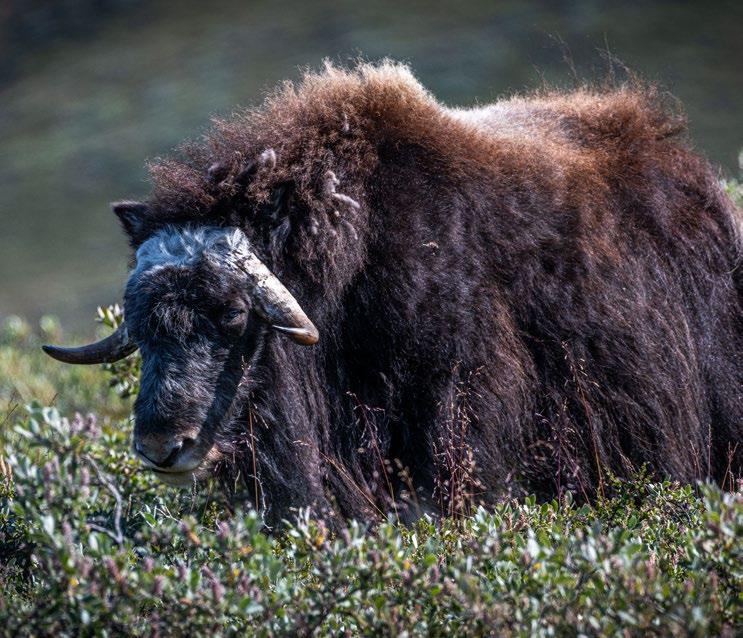
Discover the diverse landscapes and rugged shores of the world’s largest island. Immerse yourself in Inuit traditions as you explore towns dotted with colorful wooden houses. Head out kayaking on the fjord or partake in a Zodiac landing and witness stunning displays of nature, from towering peaks to blue-tinged glaciers. Join Viking on a fascinating voyage to undiscovered territories beneath the skies of the midnight sun.
NORDIC BALCONY SAVE UP TO $2,000 PER COUPLE
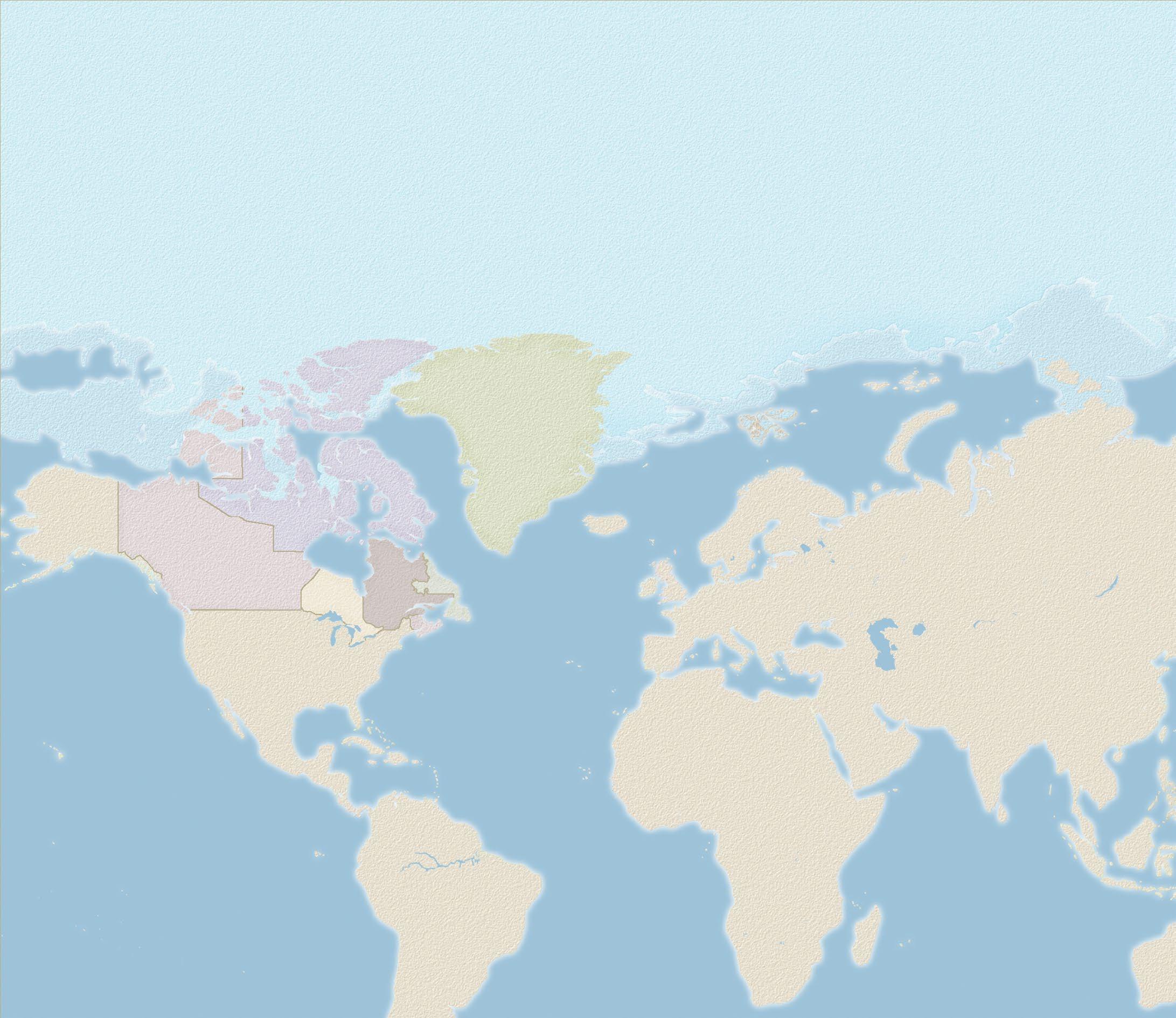

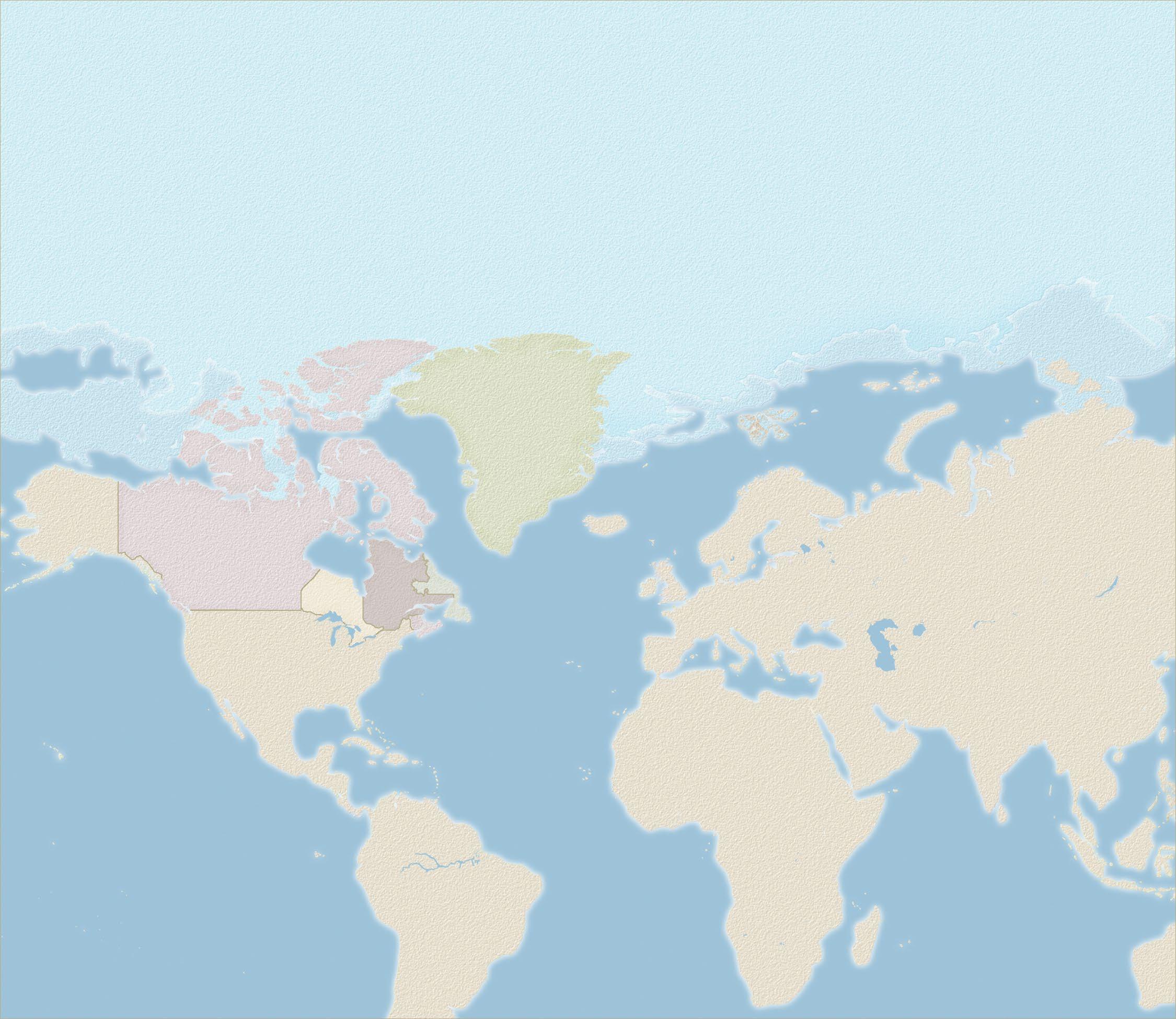
Explore Canada and Greenland’s rugged shores on an awe-inspiring journey through one of the most fascinating corners of the world. Sail amid floating icebergs as they drift in blue-tinged waters and witness the wonders of Mother Nature as you immerse yourself in dramatic landscapes. Learn about the Inuit traditions that still thrive in remote communities and experience the stark beauty of the Arctic beneath the skies of the midnight sun.
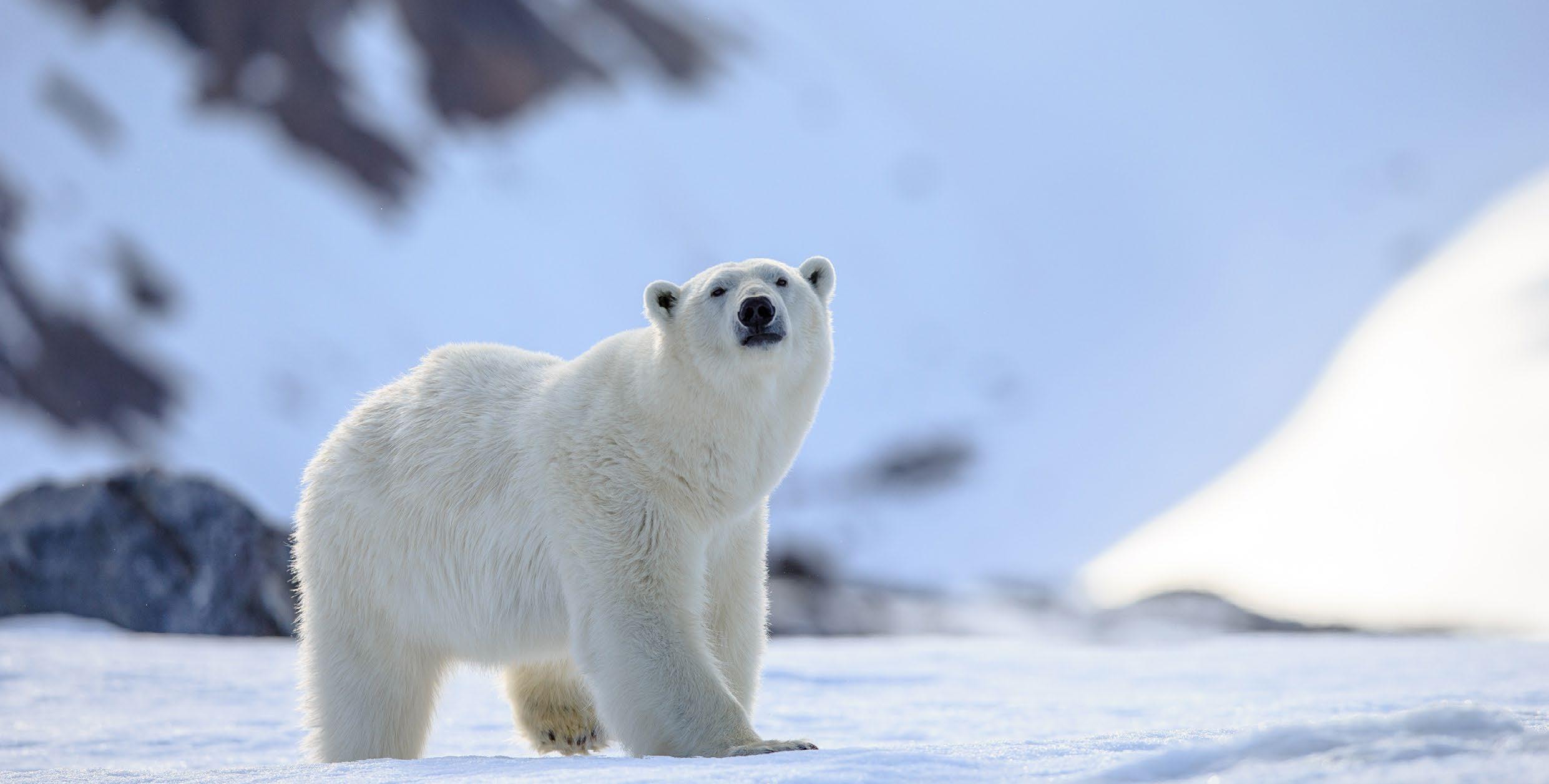
Witness the majesty of floating icebergs and rugged lands as you embark on a journey to the Canadian High Arctic and Greenland. View towering icebergs, expansive icefields and deep-blue fjords that are rich in marine life. Get a glimpse of life in Inuit communities and learn about traditions that have sustained for generations. Bask beneath the skies of the endless midnight sun as you join us on a voyage of discovery to far-flung lands.
FROM $34,995PP IN NORDIC BALCONY SAVE UP TO $2,000 PER COUPLE
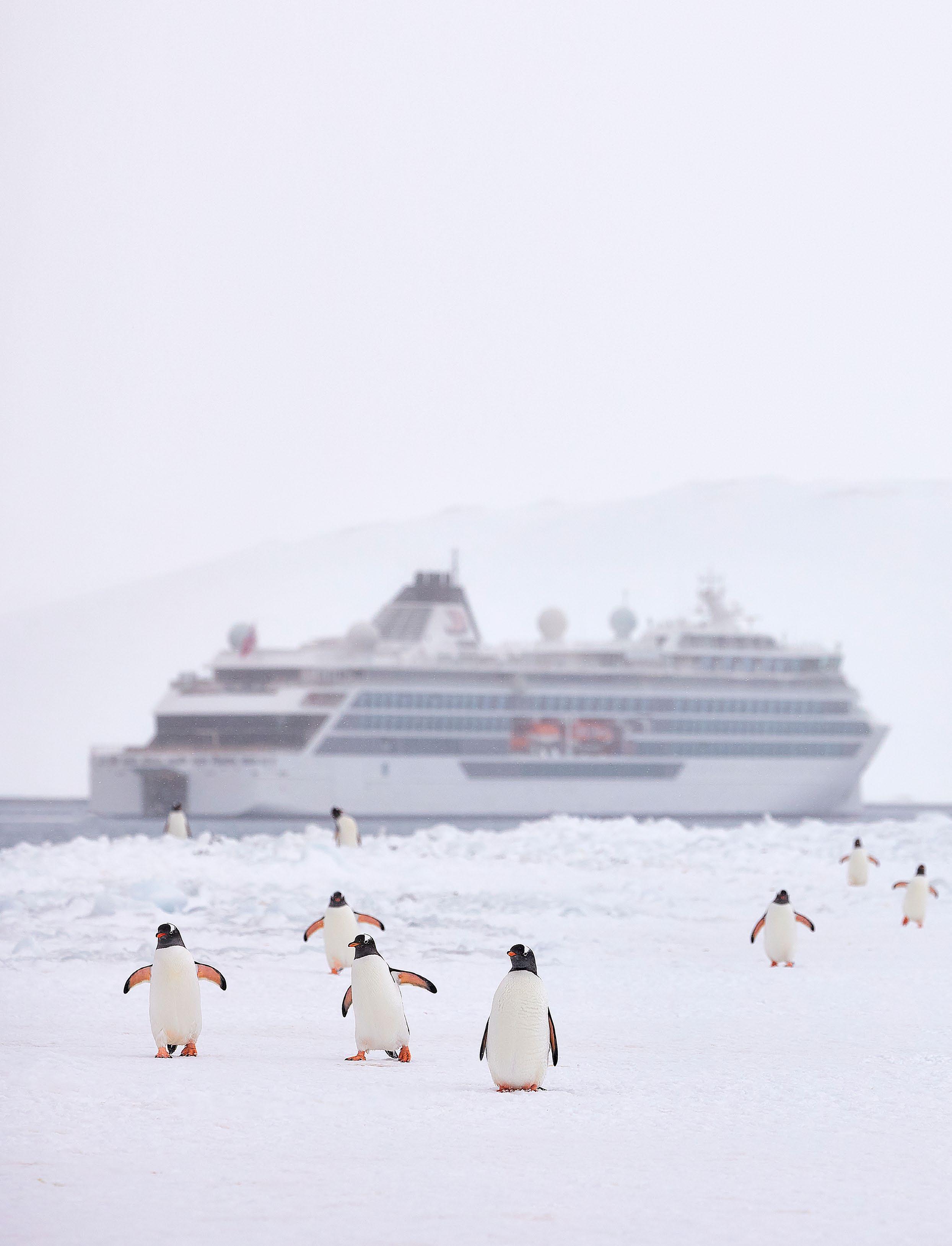
The luxury cruise ship that doubles as a science vessel
BY KRISTIE KELLAHANInever enjoyed science classes at school, couldn't understand the point of Bunsen burners and looking at boring rocks under a microscope when there was a rich world of literature to explore.
Yet here I am in Antarctica onboard the brand-new Viking Polaris, rushing back from a penguin colony visit to an ornithology lecture, happily risking frostnip to watch the release of a weather balloon and tracking whales with the sort of laser focus I normally apply to tracking down online shopping bargains.
Buoyed by the idea that the research we participate in on this 11-night cruise will contribute real data to real scientific discoveries - could possibly even inform the way people look at and understand the world - I am a citizen scientist convert. It is as thrilling as it is surprising to me, and it's all part of Viking Cruises founder Torstein Hagen's plan.
Viking's river and ocean cruises minus casinos, kids and butlers have always focused on cultural enrichment and learning, albeit on beautiful ships with all the luxury comforts. With the inaugural season of Viking Expeditions to Antarctica
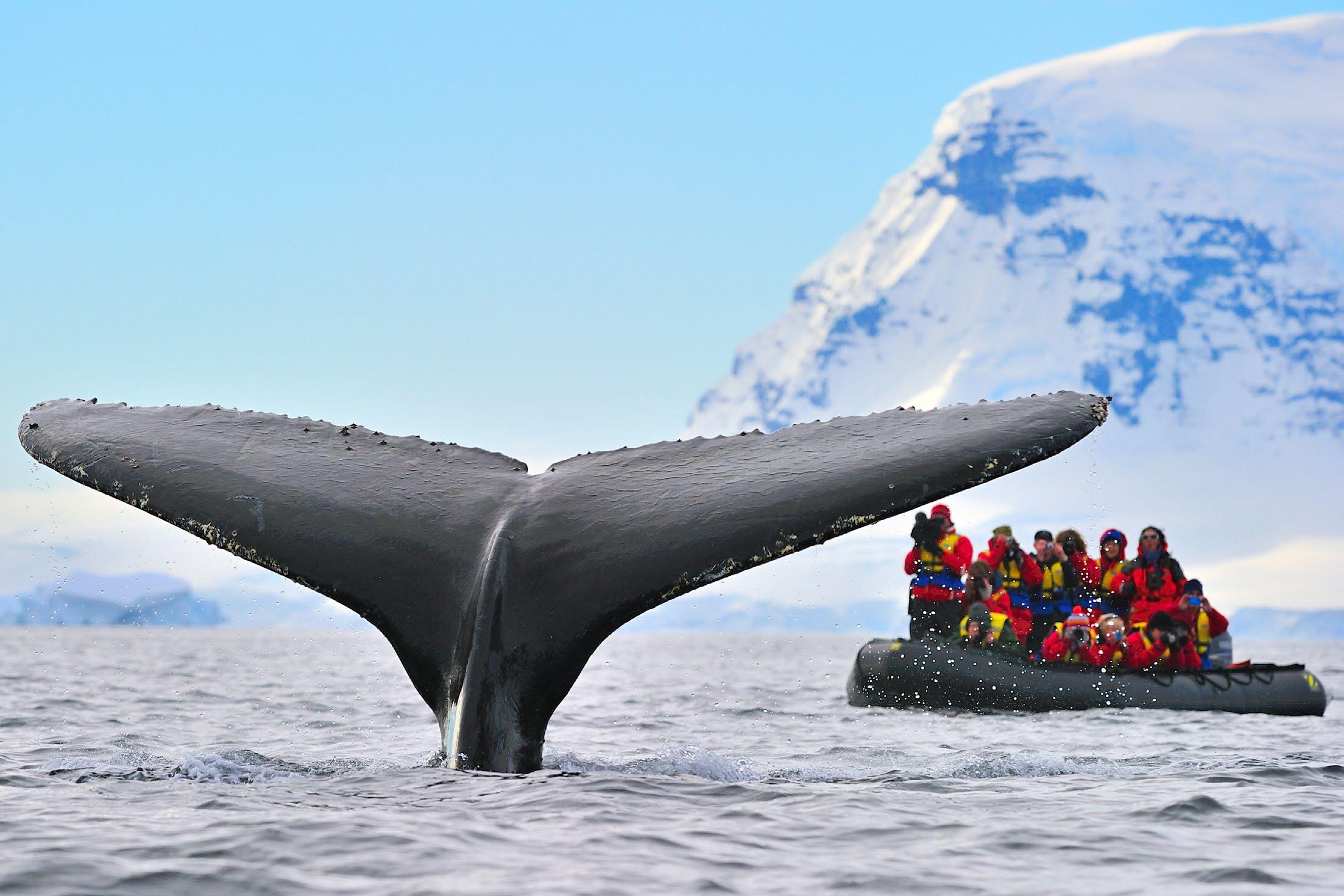
and the Great Lakes of the United States, there's an even sharper focus.
From a family of modest means in Norway, Hagen's early wanderlust had to be satisfied by airmailed exchanges with penpals. What he wanted most of all was a stamp from the end of the world. In 1957, the 14-year-old Hagen devised a clever plan, writing to his sister at a fictional address in Ushuaia, Argentina, the gateway to Antarctica. Unable to locate the addressee, the post office returned the registered letter, stamped in that faraway land, to sender. Hagen has been fascinated by Antarctica ever since.
Today, the 80-year-old billionaire founder and chairman of Viking Cruises has a new dream: To put scientific exploration and discovery at the heart of cruising to Antarctica and the Great Lakes. A physicist by training and a scientist by self-identification, Hagen handpicked a team of the experts to bring his dream to life, in partnership with a constellation of world-class science organisations including University of Cambridge and Scott Polar Research Institute.
Two new purpose-built ships, Viking Polaris and Octantis, are up to the
challenge. In addition to 189 luxurious staterooms, each ship carries a submarine (yellow, naturally), onboard research labs, Special Operations Boats built to military specs and the best expedition equipment that money can buy.
The hardware is essential, but it's the human resources - senior scientists in fields as diverse as glaciology, whale genetics, volcanology and oceanography - that bring hundreds of combined years of scientific knowledge onboard. Lectures in the Aula, the panoramic state-of-the-art auditorium, are so well-attended it's sometimes a challenge to find two empty seats together. One presentation on whales is repeatedly interrupted by actual whales cavorting in the waters surrounding the ship.
In between dips in the pool, Nordic spa treatments and lobster dinners, guests are encouraged to ask countless questions and to get their hands dirty, if they wish, collecting plankton from the sea or mashing up bait in the lab. While some are content with Zodiac rides to shore and close encounters with curious penguins (we see thousands), many relish the opportunity to learn even more about the natural world
in the most spectacularly pristine location imaginable.
"We want to totally transform marine science," says Dr Damon Stanwell-Smith, Head of Science & Sustainability for Viking Expeditions. "We have the ability to do world-class research on our ships."
The former executive director of International Association of Antarctic Tour Operators, Stanwell-Smith is a marine scientist who has conducted research for the British Antarctic Survey, as well as the NGO sector and the United Nations. He knows just how important institutional partnerships are to Viking's success in making an impact.
When Viking ships send weather balloons to the stratosphere for the US National Weather Service, they are the first civilian vessels in the world to be harnessed in this way. Balloons are released simultaneously from hundreds of locations worldwide, gathering data that is used for research and next-day weather forecasts from Sydney to Siberia. On the snowy morning I climb out of bed early to attend the balloon release on the upper deck, cuppa in hand,
1. Make it count
If you're making the trip, go all-in, says Dr Damon Stanwell-Smith. Invest time in researching, reading and watching Antarctica documentaries before you depart so you'll have a deeper appreciation when you get there. Sign up for all the excursions, bring a good camera, savour the experience.
2. Follow the rules
They're there for a reason. Responsible travel to Antarctica isn't just a suggestion, it's compulsory. Pay close attention to safety briefings and instructions from the expedition team. Don't approach wildlife, don't even think about leaving behind rubbish or picking up a souvenir rock.
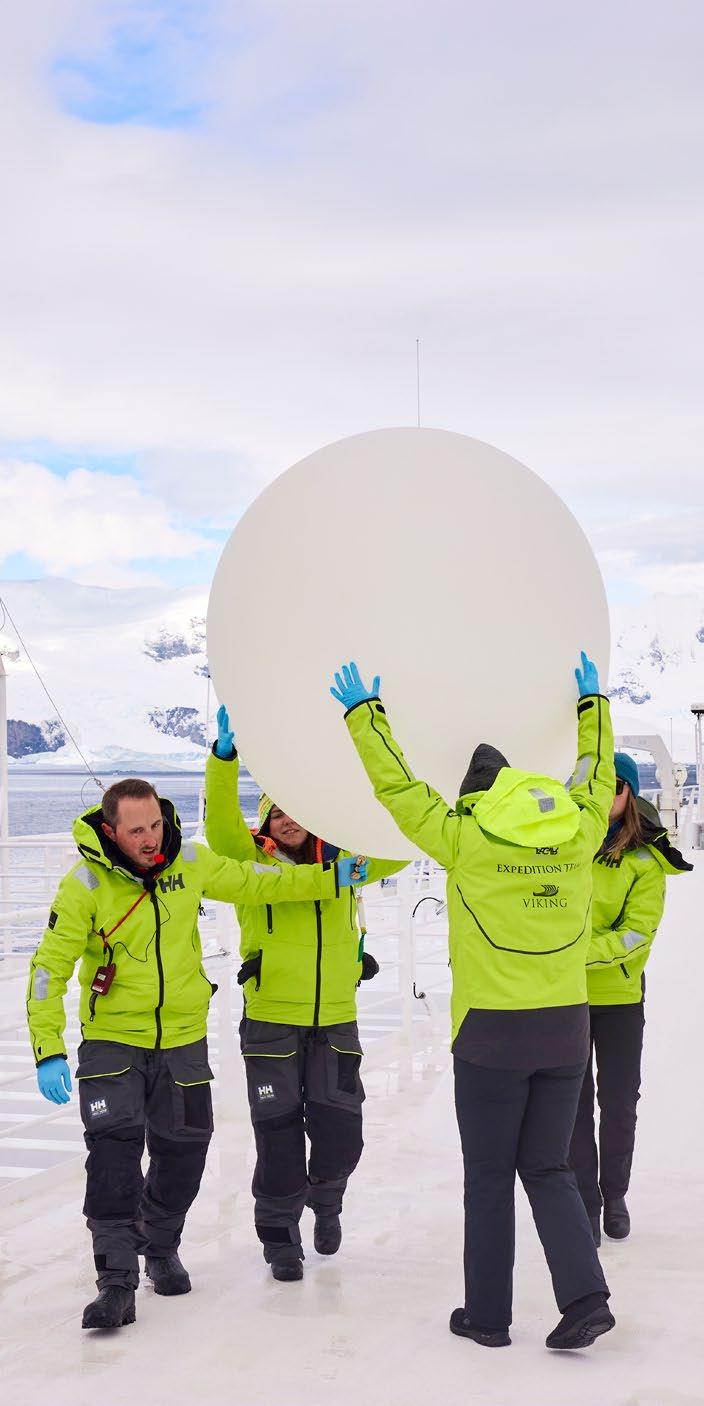
3. Become a citizen scientist
Viking partners with leading global scientific institutions, giving ordinary travellers the opportunity to participate in field research that has real-world impact. Get your hands dirty collecting plankton, release a weather balloon, spot whales and record their coordinates.

There are actions you can take to limit and remedy the environmental impact of flying and cruising to Antarctica. For starters, opt for an airline that offers carbon offset programs and pay the offset fee. Qantas, for example, has a Fly Carbon Neutral program larger than most airlines.
5. Go home an ambassador
To quote Senegalese conservationist Baba Dioum, we will conserve only what we love and we will love only what we understand. Spending time on the great white continent and seeing its magnificence up close has the power to turn anyone into an advocate of the natural environment.
there are hundreds of passengers already up there.
"At that moment you're connecting to the understanding of how all global weather is tracked and then forecast," Stanwell-Smith says. "It's become one of our most popular events, something people get really emotional about."
From the stratosphere to the deep sea, fascinating discoveries have already been made from Viking submarines. At up to 10 metres long, giant phantom jellyfish are so rare, they've been seen less than 100 times since 1899 when they were first collected. A handful of those sightings have been in the past year by Viking guests and crew, now the subject of Viking's first scientific publication.
"There's still an awful lot to look for and find in a world that at times we might be tempted to think we already know everything about," he says.
GETTING THERE: The 13-day Antarctic Explorer expedition from Buenos Aires to Ushuaia to Buenos Aires, starts from $16,995pp in Nordic Balcony stateroom.
Highlights from Antarctica
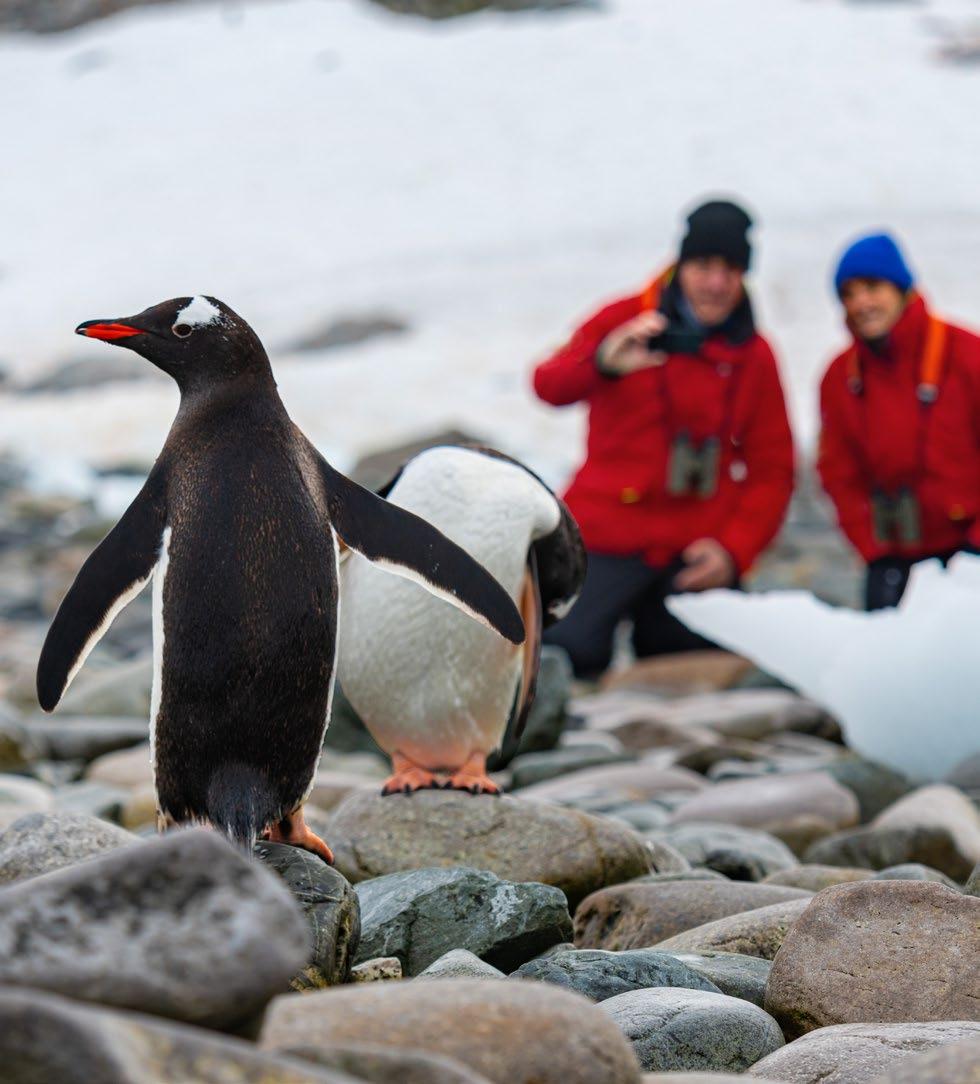
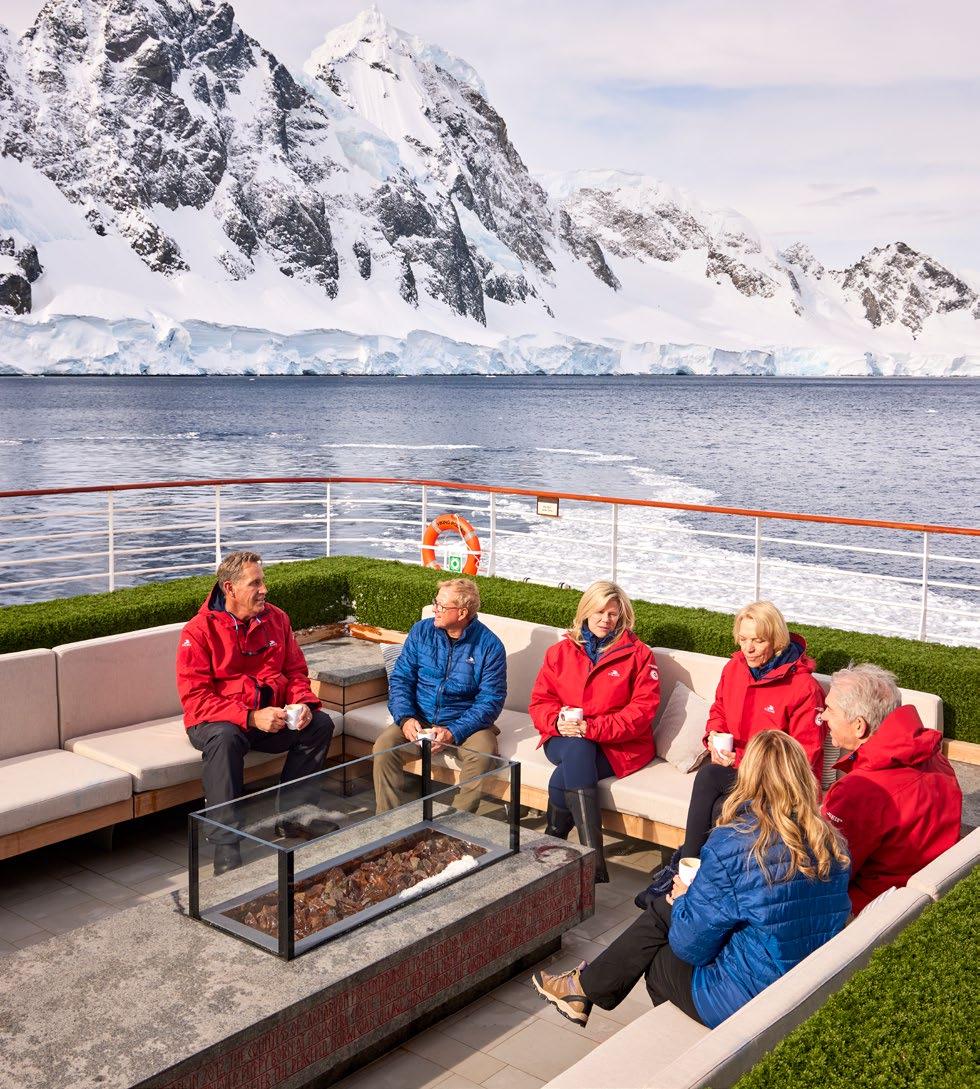
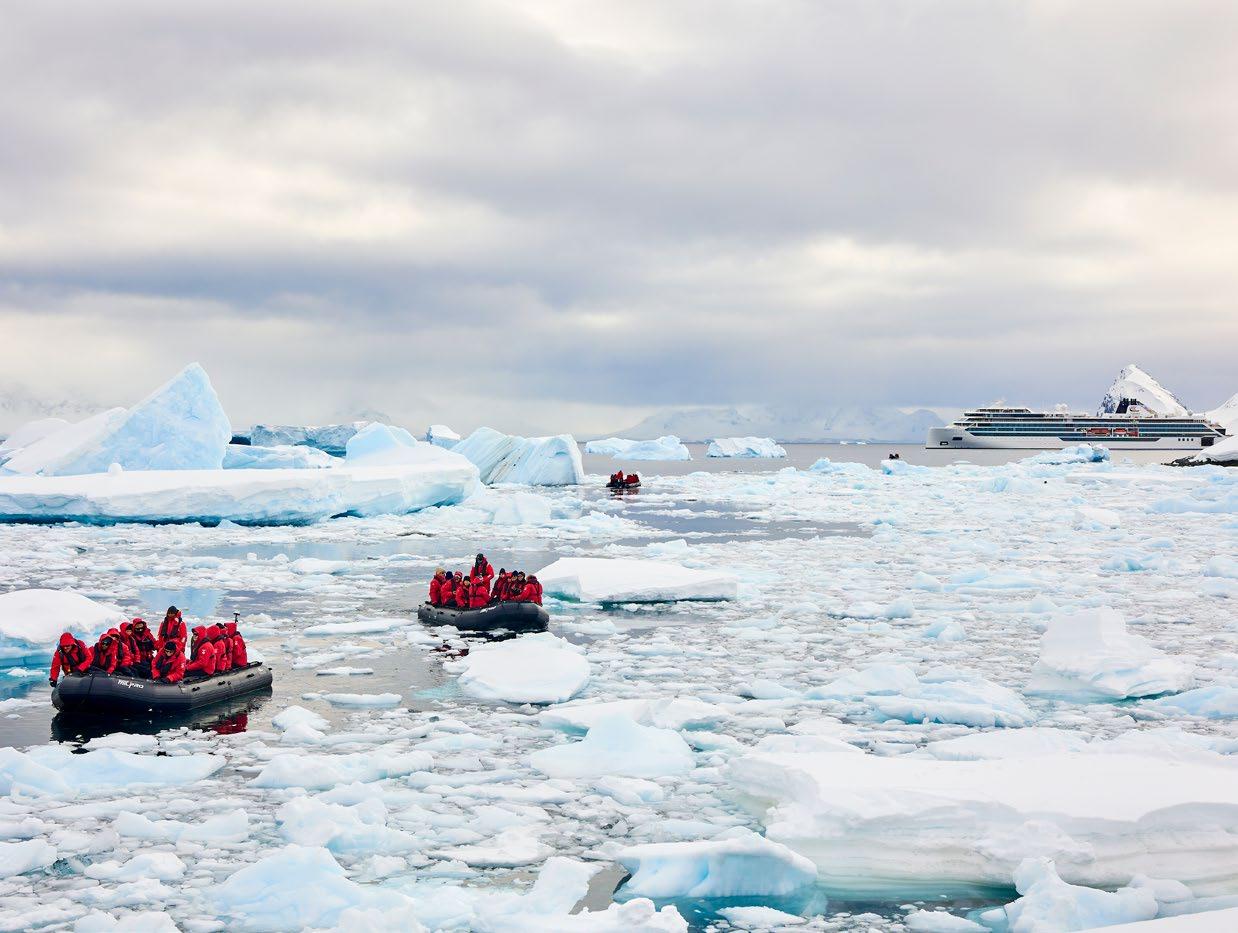
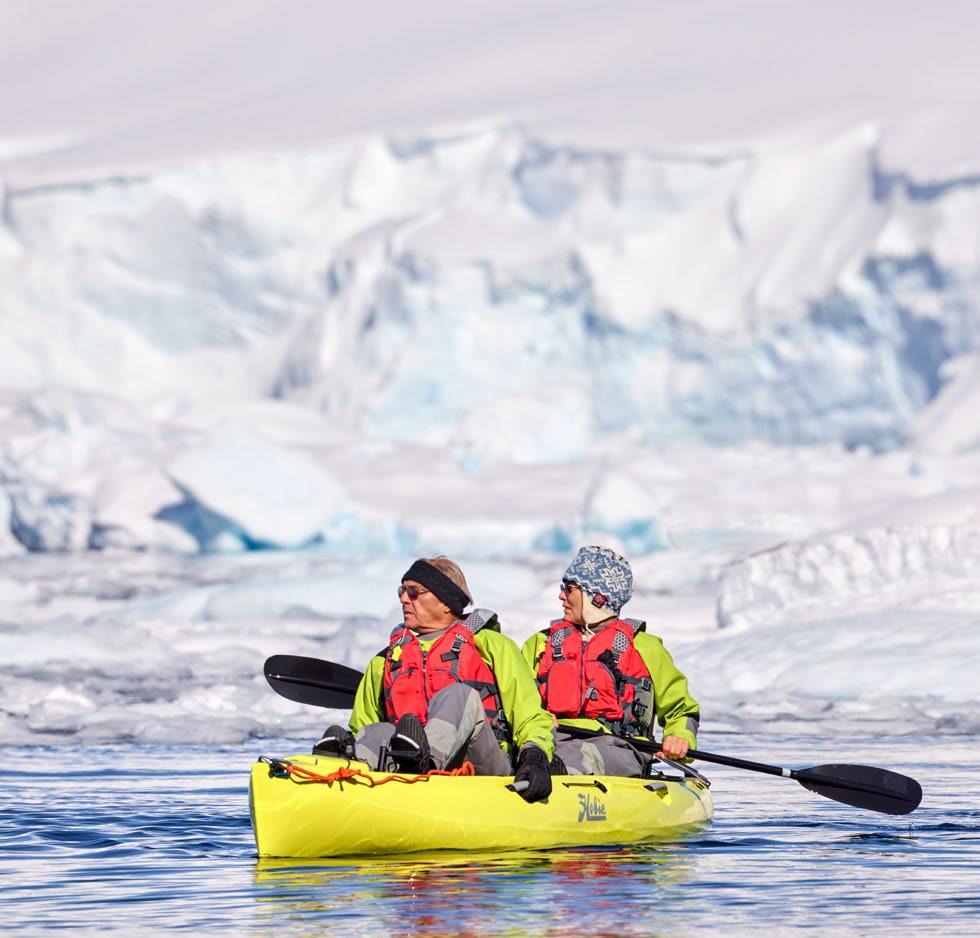
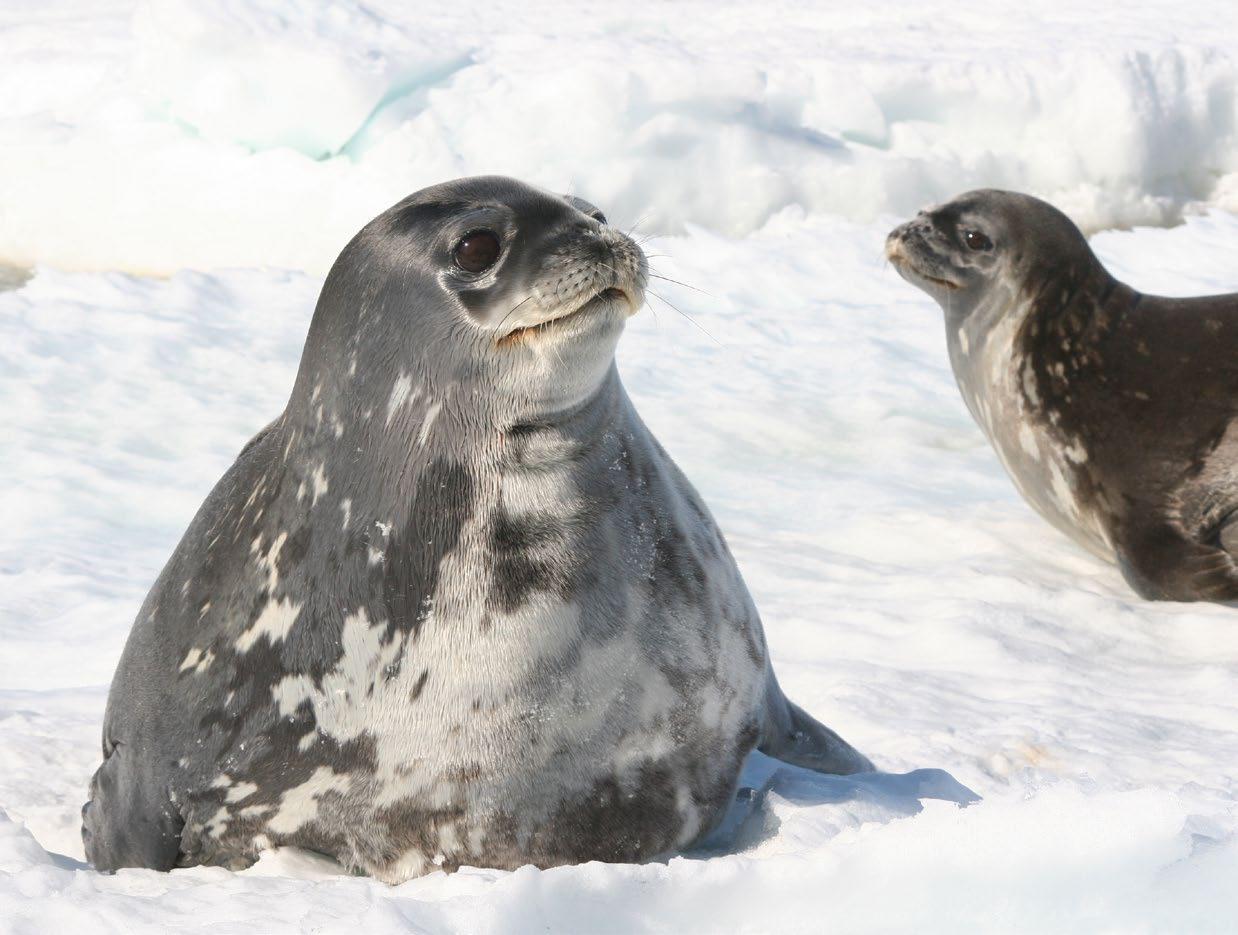
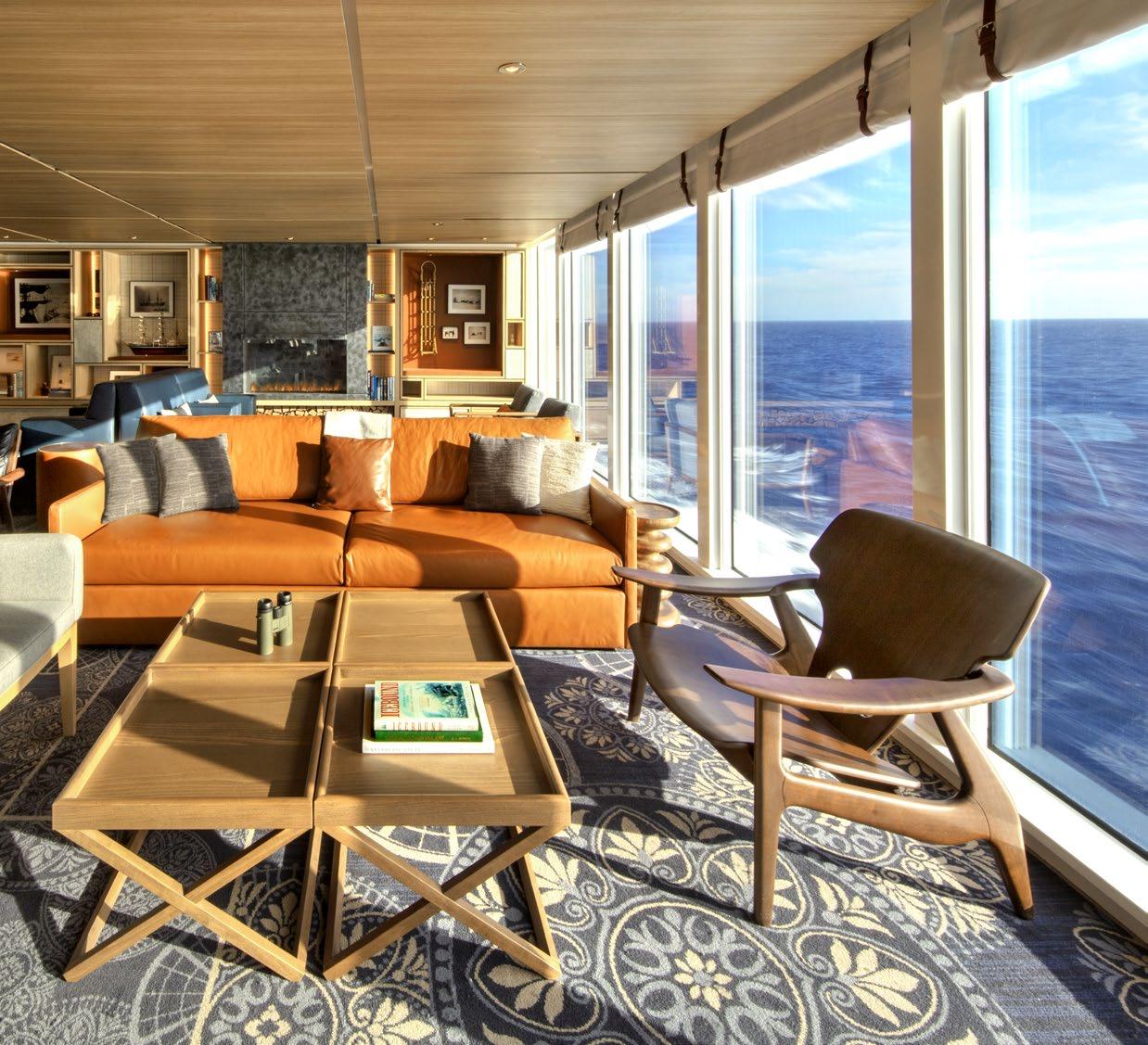 Clockwise, from top left: Zodiacs exploring near the Polaris; Observing wildlife; Viking Guests Kayaking; Enjoying the Finse Terrace; Crabeater Seals; Explorers' Lounge
Clockwise, from top left: Zodiacs exploring near the Polaris; Observing wildlife; Viking Guests Kayaking; Enjoying the Finse Terrace; Crabeater Seals; Explorers' Lounge